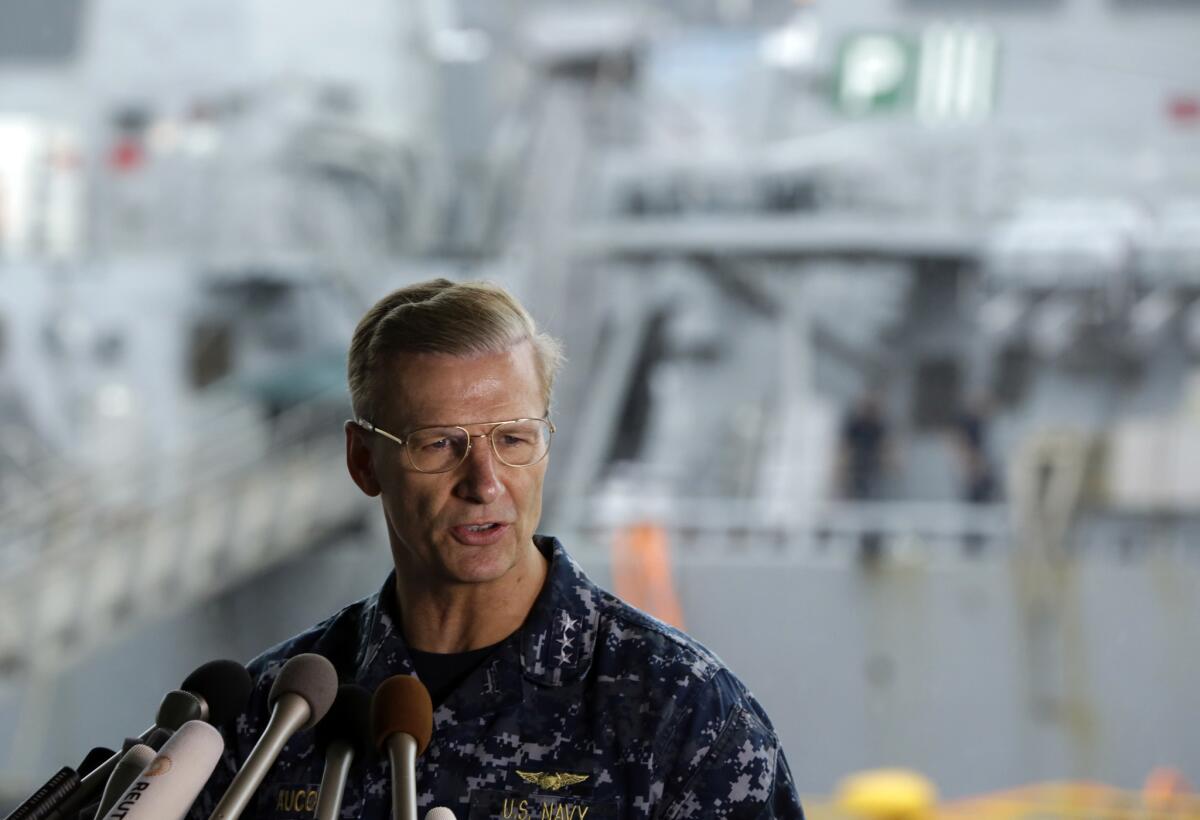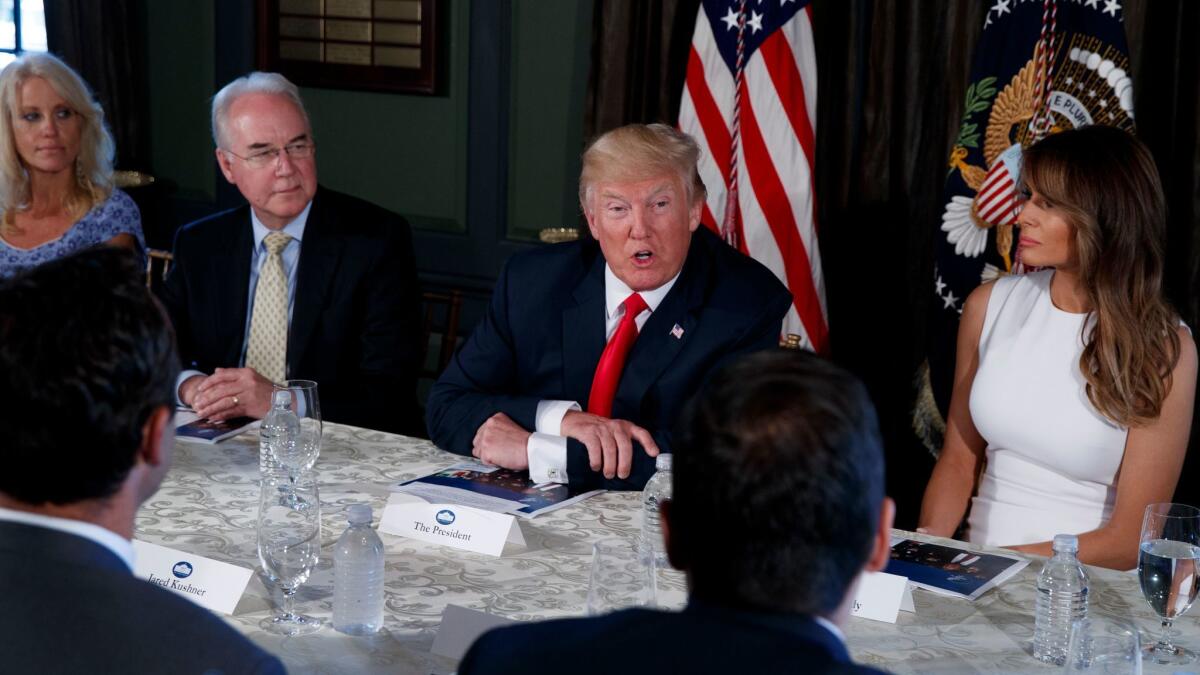Trump could pay a price if he hands out pardons in the Russia inquiry as he did for Joe Arpaio
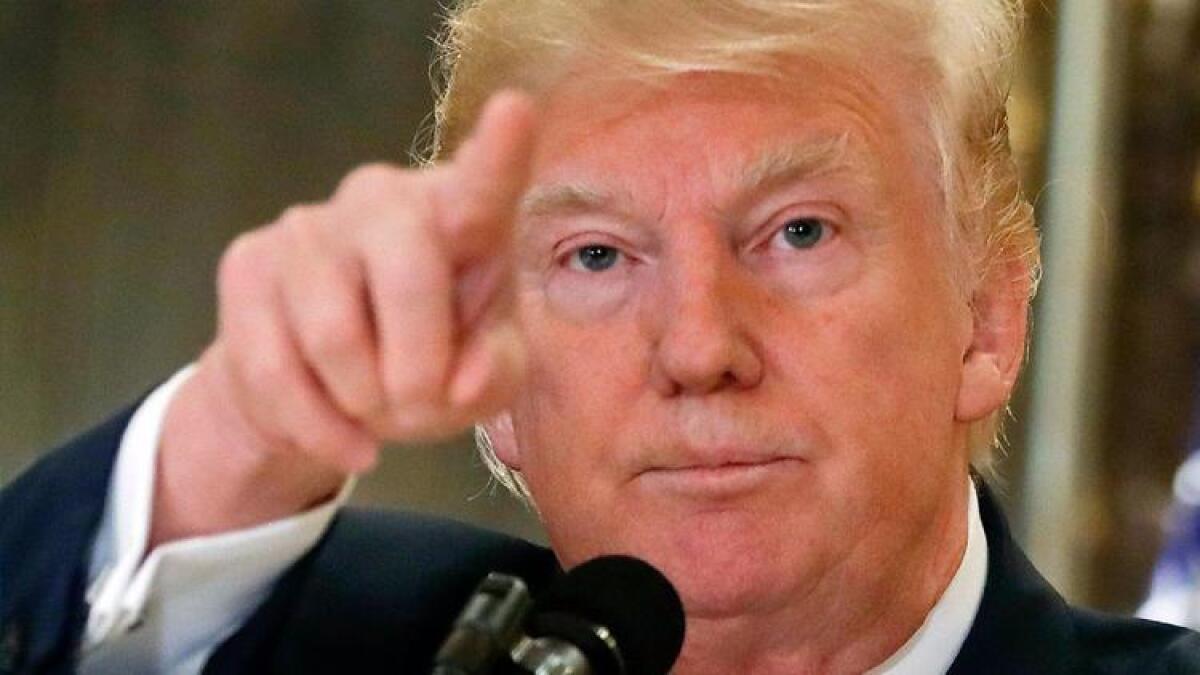
President Trump’s granting of a full pardon to former Sheriff Joe Arpaio was seen by many legal experts as a sign of what may come in the special counsel’s inquiry into Russia’s meddling in last year’s presidential race and possible collusion with the Trump campaign.
Trump has insisted the investigation led by former FBI Director Robert S. Mueller III is a “witch hunt” and should be shut down, the sooner the better. Some predict that the president will use his power to pardon anyone at any time for nearly any reason to make the investigation moot.
“Kim Jong Un was not the only leader testing his weapons” last week, said Bill Yeomans, a veteran Justice Department lawyer now working with the liberal Alliance for Justice, referring to the North Korean leader’s missile launch a day after Trump pardoned Arpaio, the former sheriff of Maricopa County in Arizona.
“Trump launched a warning pardon that announced the weaponization of the pardon power,” Yeomans said.
Trump insiders who might benefit include Jared Kushner, Donald Trump Jr., Paul Manafort, Michael Flynn and anyone else targeted by Mueller.
Trump is considering ending DACA, but hasn’t decided, aides say

President Trump is still reviewing whether to end the Obama-era program that has protected from deportation more than 750,000 people brought to the country illegally as children, senior White House officials said on Thursday.
The officials denied the president had decided to end it, in response to press reports that Trump would announce the decision perhaps Friday.
“My position here today is that the administration is still reviewing the policy,” Trump’s homeland security advisor, Tom Bossert, told reporters.
White House Press Secretary Sarah Huckabee Sanders said a decision to end the program “has not been finalized,” adding that it is being reviewed “from a legal perspective.”
Administration lawyers are studying whether the program, known as Deferred Action for Childhood Arrivals, or DACA, could withstand an expected legal challenge from conservative state attorneys general that could be filed in court as soon as Sept. 5.
Senior officials from the departments of Justice and Homeland Security met last week to discuss ways to end the program — whether to do so immediately, phase it out or decline to defend it in court.
Trump said repeatedly on the campaign trail he would end the program and called it “unconstitutional.” But as president, he has said in interviews that he is sympathetic to people who were underage when they came into the country illegally and had nothing to do with the decision to come.
When Trump took office in January, aides had written an executive order that would have phased out the program by halting the renewal of two-year work permits issued to those who had submitted to a federal background check. Trump balked at signing the order.
But pressure on the president to act against DACA has continued to mount from hard-line supporters who see it as part of his promise to crack down on illegal immigration.
Congress expected to approve first Harvey relief funds as soon as next week, with more to follow
Congress will likely need to address Tropical Storm Harvey relief aid as soon as next week, with the Federal Emergency Management Agency quickly spending down its main disaster account.
Lawmakers already face a full September agenda when Congress resumes. But the fallout from Harvey and the need to swiftly provide assistance to disaster victims now tops the agenda.
“FEMA will likely run out of money before there’s a comprehensive number to address the entirety of the disaster response, so immediate action is needed,” said a senior Democratic aide.
As of early Wednesday, FEMA’s Disaster Relief Fund had $2.3 billion, including $1.4 billion in the major disaster account, which was projected to fall to $830 million with outlays for temporary housing and other pending obligations, according to internal reports.
A FEMA spokesman declined to say how quickly funding would be depleted.
But Tom Bossert, the White House Homeland Security advisor, said an initial request for funding from Congress was coming soon.
“We’re going to go up and ask for a disaster supplemental shortly,” Bossert said.
Bossert said he expected a multi-phase process, with a first request for supplemental funds coming quickly. A second, more substantial funding request would likely come later.
“I will make that request shortly,” he said. “What we’ll do is come back later for a second supplemental request.”
President Trump is set to convene congressional leaders at the White House on Sept. 6, but already House and Senate leaders are talking among themselves about what will be expected.
House Minority Leader Nancy Pelosi reached out to Speaker Paul D. Ryan on Monday and spoke with White House Chief of Staff John F. Kelly on Tuesday, pressing for emergency funds.
Congress has tangled over disaster funds in recent years, most markedly when Republicans voted in large numbers against relief for Hurricane Sandy victims, saying it should be paid for with funding cuts elsewhere. Even though Republicans held the majority in Congress, GOP leaders relied on Democrats for passage of that measure.
Both parties, though, appear poised to quickly approve disaster funds after Harvey swept through Texas and Louisiana, leaving more than 30 dead. Rain and floodwaters continue to menace the region.
The first tranche of funding may likely be proposed as a separate stand-alone bill, unclouded by other issues, to help ensure quick passage, despite the other must-pass measures requiring attention this fall.
Congress will have a dozen working days in session as it races to meet a Sept. 30 deadline to fund the government, averting a federal shutdown, and raise the debt limit to prevent a financial crisis, among other issues.
Conservatives, who have been reluctant to allow additional spending, warned against linking the relief to other measures.
Both the House and Senate appropriations committees have vowed to quickly address the needs.
“The Senate Appropriations Committee continues to monitor the situation in Texas and Louisiana and remains in contact with FEMA and other relevant authorities,” said Stephen Worley, a spokesman for the panel chaired by Sen. Thad Cochran (R-Miss.). “Chairman Cochran is prepared to respond quickly to any requests for supplemental appropriations for Hurricane Harvey response and recovery.”
Pentagon chief says he’s been ‘widely misinterpreted,’ denies any rift with Trump
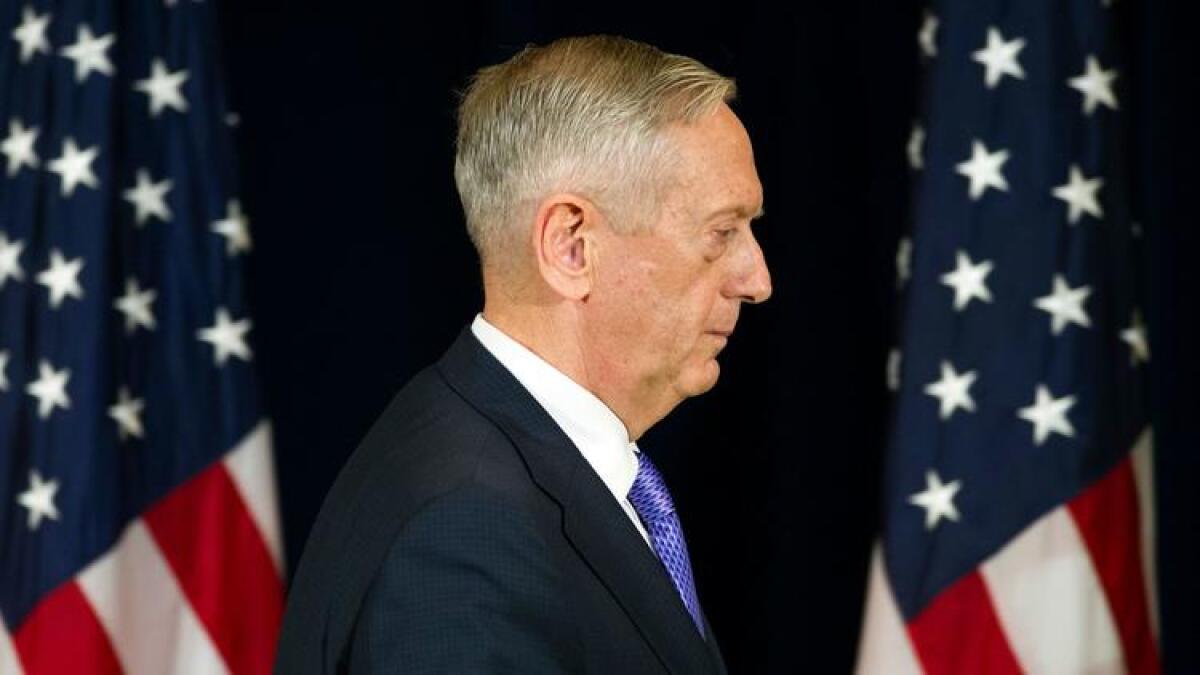
Defense Secretary James N. Mattis moved Thursday to knock down speculation that he was at odds with the White House, less than a week after a video of him talking to troops about American values led to widespread speculation that he was criticizing President Trump.
In the impromptu speech to U.S. forces deployed in Jordan, which was surreptitiously recorded on cellphone video, Mattis talked about political divisiveness in the wake of the racially inspired violence in Charlottesville, Va.
“Our country, right now, it’s got problems that we don’t have in the military,” Mattis said. “You just hold the line until our country gets back to understanding and respecting each other and showing it.”
When the video became public and circulated widely on social media, many interpreted the remarks as a slight against Trump’s leadership.
Speaking to reporters at the Pentagon on Thursday, Mattis called that interpretation “ludicrous.” He was reiterating what the president had said about the need for unity, he said.
“If I say ‘six’ and the president says ‘half a dozen,’ they’re going to say I disagreed with him,” Mattis said during the unscheduled appearance at the Pentagon press room.
The video, however, was not the only instance in which Mattis appeared to be saying something different from the president.
On Wednesday, Mattis publicly emphasized diplomacy as the path forward in the increasingly tense situation with North Korea. The statement came just hours after Trump tweeted that “talking is not the answer” to the problems with the defiant communist country.
Pyongyang has fired 21 missiles during 14 tests since February. The latest missile test, which flew over northern Japan on Monday, had triggered Trump’s tweet.
Even though Mattis said the “solutions” to the North Korea problem were likely to be found through diplomatic channels, he emphasized Thursday that he did not disagree with the president.
“There was no contradiction,” he said. “I agree with the president that we should not be talking to a nation that’s firing missiles over the top of Japan, an ally.”
Mattis acknowledged, however, that there are issues on which he and Trump disagreed.
In one example that was widely publicized, Trump reconsidered his calls for resuming the practice of waterboarding of terrorism suspects after talking to Mattis. The president also warmed to the North Atlantic Treaty Organization alliance, which he had previously called “obsolete,” following consultation with Mattis.
“First time I met with President Trump, we disagreed on three things in the first 40 minutes I met with him — on NATO, no torture and something else — and he hired me,” Mattis said. “This is not a man who is immune to being persuaded if he thinks you’ve got an argument.”
Despite the initial disagreements with Trump, Mattis agreed to serve as Defense secretary even though that meant coming out of retirement and back into the public spotlight.
“When a president of the United States asks you to do something ... I don’t think it’s old-fashioned or anything, I don’t care if it’s a Republican or Democrat, we all have an obligation to serve,” he said Thursday. “That’s all there is to it. And so, you serve.”
More recently, Trump settled on a new military strategy in Afghanistan, largely shaped by Mattis’ advice, after months of bitter internal debates within his national security team.
Trump said in announcing the strategy that his initial instinct had ben to “pull out.”
Ultimately, he was persuaded by his generals — Mattis, national security advisor Lt. Gen. H.R. McMaster, and Gen. Joseph F. Dunford, chairman of the Joint Chiefs of Staff — to provide U.S. commanders with additional troops and broader authority to pursue militant forces in Afghanistan.
Mattis confirmed that he has signed the first deployment orders to send additional U.S. troops to Afghanistan, but would not specify how many were being sent.
A highly respected four-star Marine general before his retirement, Mattis is a hard-charging but scholarly figure who issued heavy reading lists to subordinates and who carried “Meditations” by Marcus Aurelius on his deployments.
Trump likes to call him by the nickname “Mad Dog,” even though Mattis dislikes the moniker, dismissing it as something a “reporter came up with years ago on a slow news day.”
Former DeVry University official chosen by White House to head Education Department student aid enforcement unit

The Trump administration announced Thursday that a former official at for-profit DeVry University has been picked to head an Education Department unit that polices colleges for student aid fraud.
Last year, DeVry paid $100 million to settle federal claims it misled students.
Julian Schmoke Jr., who was an associate dean at DeVry from 2008 to 2012, will lead federal student aid enforcement activities, Education Secretary Betsy DeVos said.
“In addition to a track record of successfully advocating for students for more than 20 years, he brings experience in higher education leadership, instruction and accreditation, including serving in an academic capacity at DeVry University, where he ensured the delivery of a quality education to students,” the Education Department said in a news release.
“Dr. Schmoke will lead a team focused on identifying, investigating and adjudicating statutory and regulatory violations of the federal student aid programs and on resolving borrower defense claims,” the release said.
The move drew criticism given DeVry’s troubles and the Trump administration’s efforts to reverse an Obama administration crackdown on for-profit colleges.
U.S. orders Russia to close three diplomatic offices
Responding to a Russian government demand to drastically slash its diplomatic staff in Russia, the Trump administration Thursday ordered Moscow to close three of its consular offices in the United States.
Russia will be required to close its Consulate General in San Francisco, the chancery annex in Washington and the consular annex in New York, the State Department announced.
The move was the latest tit-for-tat action in worsening relations between Washington and Moscow, despite President Trump’s expressions of friendliness toward President Vladimir Putin.
Angered over a package of congressionally mandated economic sanctions, Russia had ordered the U.S. to cut its staff in Russia by around two-thirds, to 455.
Trump called him “my African American.” But he condemns the president’s treatment of black America
On the day that changed his life, Gregory Cheadle almost stayed in bed.
He was tired — he traveled a lot in his long-shot bid for Congress — but asked himself: How often does a candidate for president come to the far reaches of Northern California? And why pass up a crowd and the chance to hand out more fliers?
So Cheadle roused himself that June 2016 morning and secured a spot up close when Donald Trump swooped in for a rally at Redding’s municipal airport.
It was hot, the atmosphere was loose and Trump’s patter seemed more stand-up comedy than campaign spiel. He went into one of those sidelong digressions, about protesters and an African American — “great fan, great guy” — and, by the way, whatever happened to him?
It was then, Cheadle said, he raised his hand and jokingly shouted, “I’m here.”
Trump looked and pointed, his voice a throaty rumble. “Look at my African American over here!” he exclaimed. “Are you the greatest?”
In the days and weeks that followed Cheadle was attacked on social media and harassed by people who dug up his phone number and email address. For a time he stayed home, too nervous to venture outside.
All, he said, because the media portrayed him as something he was not and never has been: a Trump sycophant.
Lobbyist who attended Trump Tower meeting with Trump Jr. speaks to grand jury, reports say
A grand jury used by Special Counsel Robert Mueller has heard secret testimony from a Russian-American lobbyist who attended a June 2016 meeting with President Trump’s eldest son, the Associated Press has learned.
A person familiar with the matter confirmed to the AP that Rinat Akhmetshin had appeared before Mueller’s grand jury in recent weeks. The person spoke on condition of anonymity to discuss the secret proceedings.
The revelation is the clearest indication yet that Mueller and his team of investigators view the meeting, which came weeks after Trump had secured the Republican presidential nomination, as a relevant inquiry point in their broader probe into Russian interference in the 2016 election.
The meeting included Donald Trump Jr.; the president’s son-in-law, Jared Kushner; and his former campaign chairman, Paul Manafort. Emails released by Trump Jr. show he took the meeting expecting that he would be receiving damaging information about Hillary Clinton as part of what was described to him as a Russian government effort to aid the Trump campaign.
The Financial Times first reported Akhmetshin’s grand jury appearance. Reached by the AP, Akhmetshin declined comment. Peter Carr, a spokesman for Mueller, also declined comment Wednesday night.
The confirmation of Akhmetshin’s grand jury testimony comes after he spoke at length about his involvement in the Trump Tower meeting in an interview with the AP last month.
Akhmetshin, a former Soviet military officer who served in a counterintelligence unit, is also a well-known Washington lobbyist. He has been representing Russian interests trying to undermine the story of lawyer Sergei Magnitsky, who died in a Russian prison and is the namesake of a U.S. sanctions law.
Akhmetshin has been reported to have ties to Russian intelligence but he has denied that, calling the allegations a “smear campaign.”
Mueller and his team first signaled their interest in the Trump Tower gathering last month by contacting an attorney for at least some of the Russians who attended.
The meeting at issue was disclosed earlier this year to Congress and first revealed by the New York Times.
Trump Jr. has offered evolving explanations for the circumstances of the meeting, initially saying that the purpose was to discuss adoption and later acknowledging that he anticipated receiving information that he thought could be damaging to Clinton.
In addition to Akhmetshin, other attendees at the meeting included Russian lawyer Natalia Veselnitskaya, music publicist Rob Goldstone — who helped arrange the gathering — and a translator. Ike Kaveladze, who also goes by the name Irakly Kaveladze, also attended the meeting. Kaveladze works for a Russian developer who once partnered with Trump to bring the Miss Universe pageant to Moscow.
An email exchange posted to Twitter by Trump Jr. showed him conversing with Goldstone, who wanted him to meet with someone he described as a “Russian government attorney,” who supposedly had dirt on Clinton as “part of Russia and its government’s support for Mr. Trump.”
“If it’s what you say I love it especially later in the summer,” Trump Jr. wrote in one email response.
U.S. has more troops in Afghanistan than previously disclosed, Pentagon reveals

The Pentagon revealed Wednesday that roughly 11,000 U.S. troops are currently deployed in Afghanistan, 2,600 more than the U.S. military had previously disclosed to the public.
Pentagon spokeswoman Dana W. White and Lt. Gen. Kenneth F. McKenzie Jr., director of the U.S. military’s Joint Staff, blamed the significant undercount on head-counting rules the Obama administration had devised.
The Obama-era policies did not include troops deployed for less than six-months -- a stint the military considers a “temporary basis” -- as part of the military’s total for Afghanistan. Because the Obama administration had set caps on the number of troops allowed to be deployed to active war zones in Afghanistan, Iraq and Syria, U.S. commanders found ways to supplement their forces by “temporarily” adding additional troops who would not be counted.
Defense Secretary James N. Mattis expressed frustration with the approach and ordered a comprehensive review to give a more accurate picture of the U.S. military footprint, following last week’s announcement by President Trump of a new military strategy in Afghanistan.
“The secretary has been clear about his commitment to transparency in our public reporting procedures and increasing commanders’ ability to adapt to battlefield conditions in countering emergent threats,” White told reporters at the Pentagon.
“Following a comprehensive review of our South Asia strategy, the secretary has determined we must simplify our accounting methodology and improve ... the public’s understanding of America’s military commitment in Afghanistan.”
The new policies “will balance informing the American people, maintaining operational security and denying the enemy any advantage,” White said, adding that the Pentagon is also reviewing its practices for disclosing troop numbers in Iraq and Syria.
“The fight is different in Iraq and Syria than it is in Afghanistan,” McKenzie said. “But in both theaters, eventually we’ll apply the same two pillars: balancing transparency of reporting with a requirement to protect the forces on the ground”
The Pentagon is still examining how many additional troops to deploy to join the 11,000 U.S. and 5,000 North Atlantic Treaty Organization troops now in Afghanistan. The U.S. and allied militaries train and advise Afghan security forces as they seek to quell a resurgent Taliban, Islamic State militants and other militias that have kept much of the country at war.
Trump has given Mattis the authority to send up to 4,000 more troops to the battlefield. U.S. warplanes already have stepped up the Afghan war, dropping 1,984 bombs and missiles so far this year -- more than twice as many as in the same period a year ago, according to Air Force statistics.
1:55 p.m.: This post was updated with additional Pentagon comments.
Pentagon to convene panel on implementing Trump’s ban on transgender personnel in U.S. military
Defense Secretary James N. Mattis says the Pentagon won’t change its policy of allowing transgender people to serve in the U.S. military until he receives recommendations from a panel that is supposed to report back on the impact of a ban.
The panel will be drawn from the Departments of Defense and Homeland Security, but its members have yet to be named. They will examine how the Pentagon can implement President Trump’s directive banning transgender individuals from entering the armed forces.
Mattis’ statement Tuesday night came in response to Trump’s memo last Friday that directed Mattis, in consultation with secretary of Homeland Security, to submit a plan to him by Feb. 21. Trump has yet to appoint a new Homeland Security chief to replace John Kelly, who became White House chief of staff.
“As directed, we will develop a study and implementation plan, which will contain the steps that will promote military readiness, lethality, and unit cohesion, with due regard for budgetary constraints and consistent with applicable law,” Mattis said.
He said the panel will be made up of people with “mature experience, most notably in combat and deployed operations, and seasoned judgment to this task.”
In the interim, currently serving transgender troops will remain in the armed forces under existing policy, he said.
That policy, which was begun by President Obama last year after a lengthy Pentagon review, placed protection of gender rights in the military on par with race, religion, color, sex and sexual orientation. The move was part of a broader initiative to bring the military in line with shifts with social attitudes.
For the first time, transgender service members could serve openly, and several thousand people in the Army, Air Force, Navy, Marines and Coast Guard did so. The services had to provide medical and training plans, and arrange full implementation by July 1, 2017.
Mattis had pushed that deadline back six months before Trump unexpectedly announced on Twitter on July 26 that he planned to reverse Obama’s policy entirely, saying the military would neither accept nor allow transgender people to serve.
Mattis says U.S. still aiming for diplomacy with North Korea despite Trump’s tweets to the contrary

Hours after President Trump tweeted that “talking is not the answer” in regards to the increasingly tense situation with North Korea, Defense Secretary James N. Mattis emphasized diplomacy as the path forward.
“We’re never out of diplomatic solutions,” he told reporters Wednesday while greeting South Korea’s defense minister, Song Young-moo, at the Pentagon
“We continue to work together, and the minister and I share responsibility to provide for the protection of our nation, our populations and our interests, which is what we are here to discuss today,” he said.
Trump had taken to Twitter less than three hours earlier to respond to North Korea’s latest missile test, which flew over northern Japan on Monday, and to subsequent threats from the isolated nation’s leader, Kim Jong Un.
“The U.S. has been talking to North Korea, and paying them extortion money, for 25 years. Talking is not the answer!” Trump tweeted Wednesday morning.
The statement raised questions about what the president meant, if diplomacy was not the way forward. Trump’s Cabinet members, including Mattis and Secretary of State Rex Tillerson, have repeatedly advocated for dialogue to ease tensions with the defiant communist country.
North Korean state media quoted Kim saying that Monday’s test of a Hwasong-12 intermediate-range missile was “the first step of the military operation” to target Guam, a U.S. territory that’s home to U.S. Navy and Air Force bases.
North Korea has fired 21 missiles during 14 tests since February, including three on Saturday, with many landing in the Sea of Japan, also known as the East Sea.
Last month, North Korea successfully test launched two intercontinental ballistic missiles — weapons in theory capable of striking the U.S. mainland, including California.
Kremlin confirms it received email from Trump lawyer but never responded
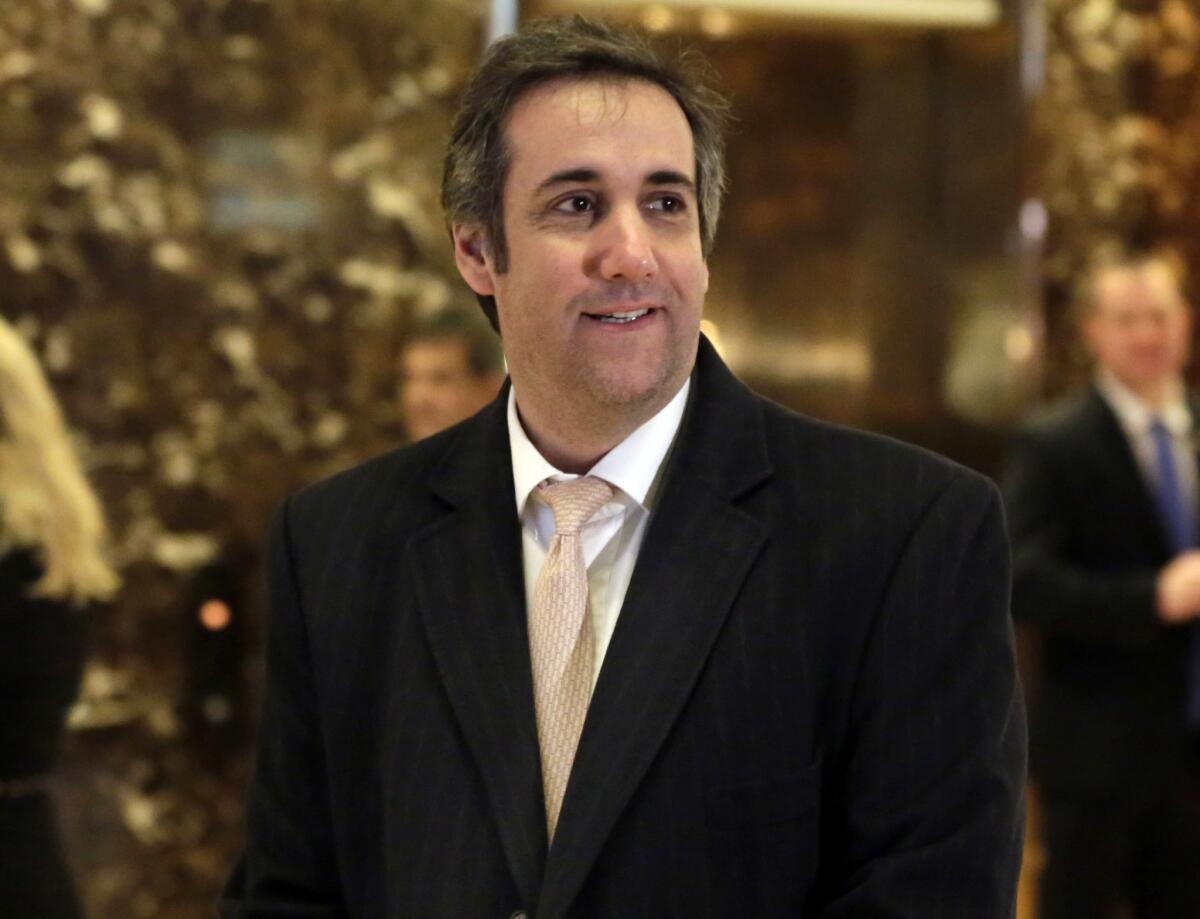
The Kremlin on Wednesday confirmed it received an email from President Trump’s personal lawyer during the 2016 U.S. presidential campaign in which the lawyer asked for help with a potential skyscraper project in Moscow.
Dmitry Peskov, spokesman for Russian President Vladimir Putin, said he did not respond to lawyer Michael Cohen’s email because the Kremlin does not address “such business requests.”
“It is not our job,” Peskov told reporters in a conference call Wednesday.
The Washington Post reported Monday that a Cohen statement to a House Intelligence Committee indicated that the president’s company pursued a project in Moscow during the Republican primary. The company later abandoned the project for unspecified reasons. The committee is investigating Russian interference in the 2016 U.S. presidential election and possible collusion between the Trump campaign and the Kremlin.
The email specifically asked for help with plans to build a Trump Tower skyscraper in Moscow, a plan which Cohen said he was working on with Felix Sater, a Russian-born New York businessman who claimed to have deep connections in Russia. The New York Times reported that Sater told Cohen Russian government approval was required for the project to move forward and suggested that Cohen reach out to Peskov directly for assistance.
“Buddy our boy can become President of the USA and we can engineer it,” Sater wrote in an email to Cohen. “I will get all of Putins team to buy in on this, I will manage this process.”
Peskov said his office had located a copy of Cohen’s 2016 email, which was sent to a general address for the Kremlin press office. The address can be easily found online, he told reporters.
Cohen’s email said “the business had been stalled and they were asking for help or some kind of recommendation about how to advance the issue,” Peskov said.
“We left it unanswered,” Peskov said.
The issue was never discussed with the Russian president, because it would be “impossible to discuss with President Putin the hundreds and thousands of requests of all kinds from a variety of countries” that are received in that general Kremlin address, Peskov said.
The Kremlin spokesman said he did not know Cohen personally.
“No, we never met, sadly … or thankfully,” Peskov said.
AFL-CIO president: ‘Calling the president names, even if they’re accurate, gets you nowhere’
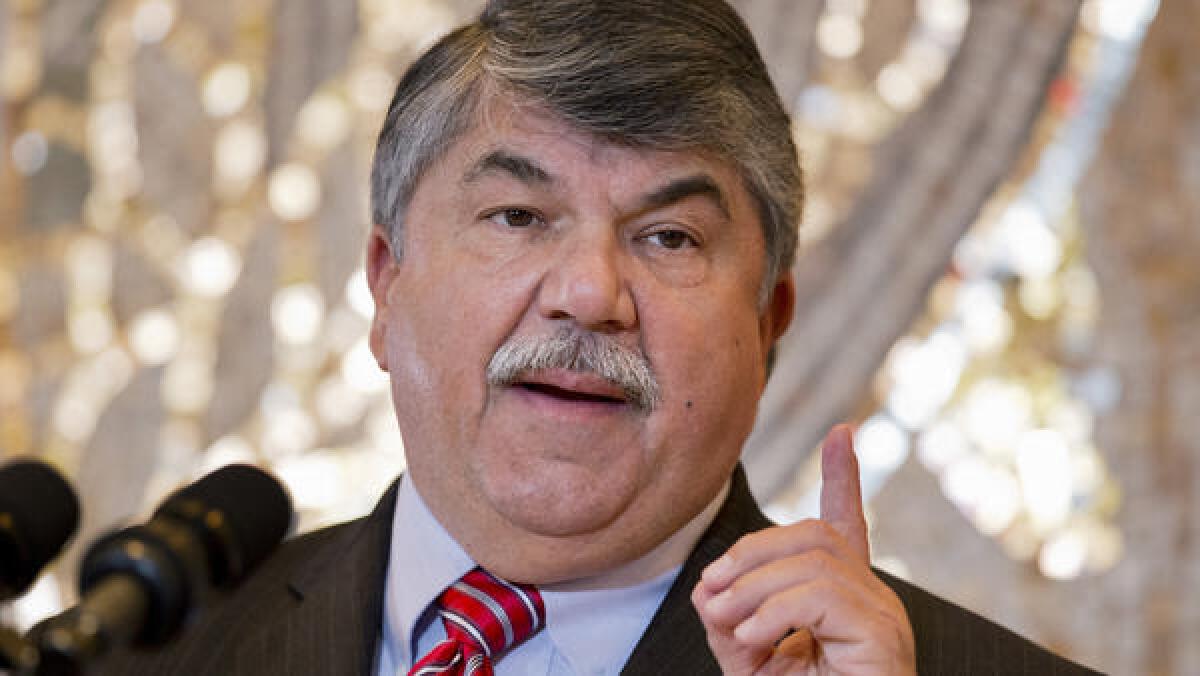
The nation’s most powerful labor union chief, still reeling from Democrats’ big losses in 2016, has a message for them as they work to win back working people.
“Calling the president names, even if they’re accurate, gets you nowhere,” Richard Trumka, president of the AFL-CIO, told reporters Wednesday at a breakfast sponsored by the Christian Science Monitor.
Trumka, reared in one of the Pennsylvania coal towns that Trump swept in the election, said that telling voters who supported him that they were stupid to do so is also a strategy for failure. Instead, he said, Democrats need to make the case to those who gave him the benefit of the doubt that Trump has not done what he promised.
“He hasn’t done any of these ‘do this and do that,” Trumka said.
Even as the labor chieftain cautioned against name-calling, he was not averse to criticizing Trump’s administration as he recounted his struggle to find common ground with the populists in the White House.
“The difficulty that you had was you had two factions in the White House,” Trumka said. “You had one faction that actually had some of the policies that we would have supported on trade and infrastructure but they turned out to be racist. On the other, you had people that weren’t racist. But they were Wall Street.”
Trumka, who was a strong supporter of Hillary Clinton, faulted the Democratic nominee for not delivering a “kitchen table message” to win over working-class voters. He also distanced organized labor from her defeat: “I wasn’t running. The union wasn’t running. It was him and Hillary.”
After the election, Trumka met several times with administration officials and was named to a White House advisory council on manufacturing. But he recently left the council, along with its corporate members, in protest of Trump’s handling of the racial violence in Charlottesville, Va., and the president dissolved it.
If GOP scales back the mortgage interest deduction, Californians would be hit hardest

For decades, the home mortgage interest deduction has been one of the most sacred of cows in the U.S. tax code.
It is particularly revered in Los Angeles and other areas with high real estate prices, where the annual tax savings can be the difference between being able to afford a house or continuing to rent.
Now, Republicans crafting legislation to overhaul the federal tax system and cut rates are considering placing new limits on the home mortgage interest deduction.
And thousands of Californians could feel the pain.
‘Disappointed’ and ‘let down’: Trump voters in focus group voice discontent
With each crisis of the young Trump administration, reporters and pollsters have documented the steady support he continues to get from his most ardent backers, the roughly one-in-four Americans who consistently tell pollsters that they approve of his performance in office, agree with him on most issues and like his personality.
Tuesday night at a focus group in Pittsburgh, a group of reporters heard from a different slice of Trump voters — ones he’s lost for now.
“Outrageous,” “disappointed,” “not ready” were among the adjectives that focus group members who had voted for Trump tossed out when asked for a single word to describe the president.
“He has got to be his own worst enemy,” said Tony Sciullo, a lifelong Pittsburgh resident and a registered independent who works for an insurance agency and described Trump as an “abject disappointment.”
Brian Rush, a registered Republican who works as a sales representative, voiced a slightly more supportive view.
“I’m still going to hold off judgment,” he said. “I’m hoping things can turn around.”
Trump “does want this country to be great,” Rush said. But he likened the administration to a recently bought car that now has several dents and is “not running the way it should” while the mechanics “don’t know exactly why.”
Their disappointment, the Trump voters present made clear, focused mostly on the president’s behavior and personality as opposed to his positions on particular issues.
Polls have documented Trump’s slide among voters like this — those who backed him with reluctance, not fervor, generally favoring other candidates in the GOP primaries and voting for Trump in the end largely as a reaction against Hillary Clinton, the Democratic nominee. The focus group, conducted by veteran pollster Peter D. Hart, provided an opportunity to hear their views in more detail.
The session was not originally designed to elicit such views: It’s part of a project Hart is conducting for Emory University in Atlanta to probe voter attitudes on major issues. Tuesday night’s group was primarily intended to look at views toward immigration. The 12 Pittsburgh-area residents who took part were divided roughly equally between Trump and Clinton voters.
Missile Defense Agency says it successfully tested system against a medium-range ballistic missile
The Pentagon’s Missile Defense Agency says it has successfully completed a missile defense flight test -- intercepting a medium-range ballistic missile target from a warship off the coast of Hawaii.
The agency said the John Paul Jones detected and tracked a target missile launched from Kauai with its onboard AN/SPY-1 radar. The destroyer fired SM-6 missiles to intercept the test missile.
“We are working closely with the fleet to develop this important new capability, and this was a key milestone in giving our ... ships an enhanced capability to defeat ballistic missiles in their terminal phase,” Lt. Gen. Sam Greaves, who heads the missile defense agency, said in a statement. “We will continue developing ballistic missile defense technologies to stay ahead of the threat as it evolves.”
The test marks the second time an SM-6 missile has successfully intercepted a medium-range ballistic missile target, the agency said
It comes a day after North Korean leader Kim Jong Un’s government flew a medium-range ballistic missile over northern Japan, sparking alarms there. The missile was unarmed but officials said it was designed to carry a nuclear warhead
Trump to kick off tax-cut push with speech devoid of details, White House says
President Trump will kick off a weeks-long effort to sell Americans on tax cuts with a speech on Wednesday in Missouri that aides said will not contain any details on a Republican plan that is still being drafted.
Trump will use the event at the Loren Cook Co. manufacturing plant in Springfield, Mo., to explain why Congress should cut corporate rates and make other changes to the federal tax code, said senior White House officials, who spoke on the condition of anonymity to provide a preview of the president’s remarks.
“This is not a ‘how’ speech,” said one official.
Trump will talk about the need to make America more globally competitive and the tax code more equitable, by cutting the rates paid by businesses and individuals as well as by eliminating special interest loopholes that benefit the wealthy, the officials said.
The goal is to relieve what Trump will call “the crushing tax burden on American industry,” they said, adding that he will describe a new “American model” of taxes that puts workers and their families first and calls for business to grow domestically and hire U.S. employees.
A look on the sidelines of Trump’s visit to storm-ravaged Texas

As President Trump arrived in Texas on Tuesday to witness the damage from Tropical Storm Harvey, he was greeted in Corpus Christi by a microcosm of a divided nation: a mix of well-wishers and protesters, both thrilled and furious he was here.
Dozens of people stood along Agnes Street, a quiet stretch of road just across a cotton field from the city’s airport. Some held up protest signs. Some held giant American flags. Some just held up their hands, waving hello.
Pentagon says up to 30,000 National Guard troops prepared to assist in response to Harvey
Pentagon officials said Tuesday that National Guard assets are at full readiness to assist in the unfolding disaster in Texas wrought by Tropical Storm Harvey.
Maj. Gen. James C. Witham, director of domestic operations for the National Guard, told Pentagon reporters that up to 30,000 guardsmen as well as a U.S. naval amphibious assault ship could be called upon to help out in rescue efforts on the ground.
There are 30 National Guard helicopters flying in Texas in support of relief efforts surrounding the hurricane and subsequent tropical storm, with 24 more requested, he said.
Witham said that could increase to 100 helicopters in the days ahead as the Guard prepares for a sustained, phased response -- a departure from what the Guard has done in the past.
“This will be a long-term effort,” Witham said. “When the Guard responds to hurricane-type events, normally we talk about that first 72 to 96 hours for the lifesaving and life-sustainment that takes place. Then, we’re into the recovery effort.
“Due to the nature of this storm as it spun across southwest Texas for days and dumped historic levels of rainfall, our response has been very different than what we’ve looked at before,” he said. “And the planning associated had to be different because of the nature of it.”
The Guard has alerted thousands of forces across the nation for possible deployment. It has already sent elite special operations para-rescuers from California and New York to aid in the effort, he said.
“We are leaning as far forward as we possibly can to ensure that military assets are postured to support the needs of Texas and potentially Louisiana,” Witham said.
Texas Gov. Gregg Abbott has ordered the entire Texas National Guard, which numbers around 12,000 troops, to assist those affected by the storm. Only about 3,500 Texas guardsmen are now involved, which raised questions as to whether U.S. commanders in Washington had identified a bigger demand than Texas officials were willing to request.
Witham said, “Texas has been given everything that they’ve asked for” and that the Pentagon expects “more forces will be requested.”
“If you look at the magnitude and duration of this storm, we are just trying to anticipate additional needs on behalf of Texas,” he said.
The California Air National Guard from the 129th Rescue Wing in Mountain View had deployed about 90 guardsmen on Monday night.
The wing sent a team of Guardian Angel para-rescuers, a U.S. special operations search-and-rescue unit. The wing also sent two HH-60G Pave Hawk rescue helicopters and an MC-130 transport aircraft.
“This is their wheelhouse,” said Capt. Will Martin, a California National Guard spokesman. “They carry out over-water rescue throughout the year and they have been in Texas before.”
The Bay Area wing was deployed to Texas in disaster response to Hurricane Rita in 2005, Hurricane Ike and Hurricane Gustav in 2008.
Trump on Texas response: ‘We’ll congratulate each other when it’s all finished’
Trump lands in Texas with promise of help to residents battered by Harvey
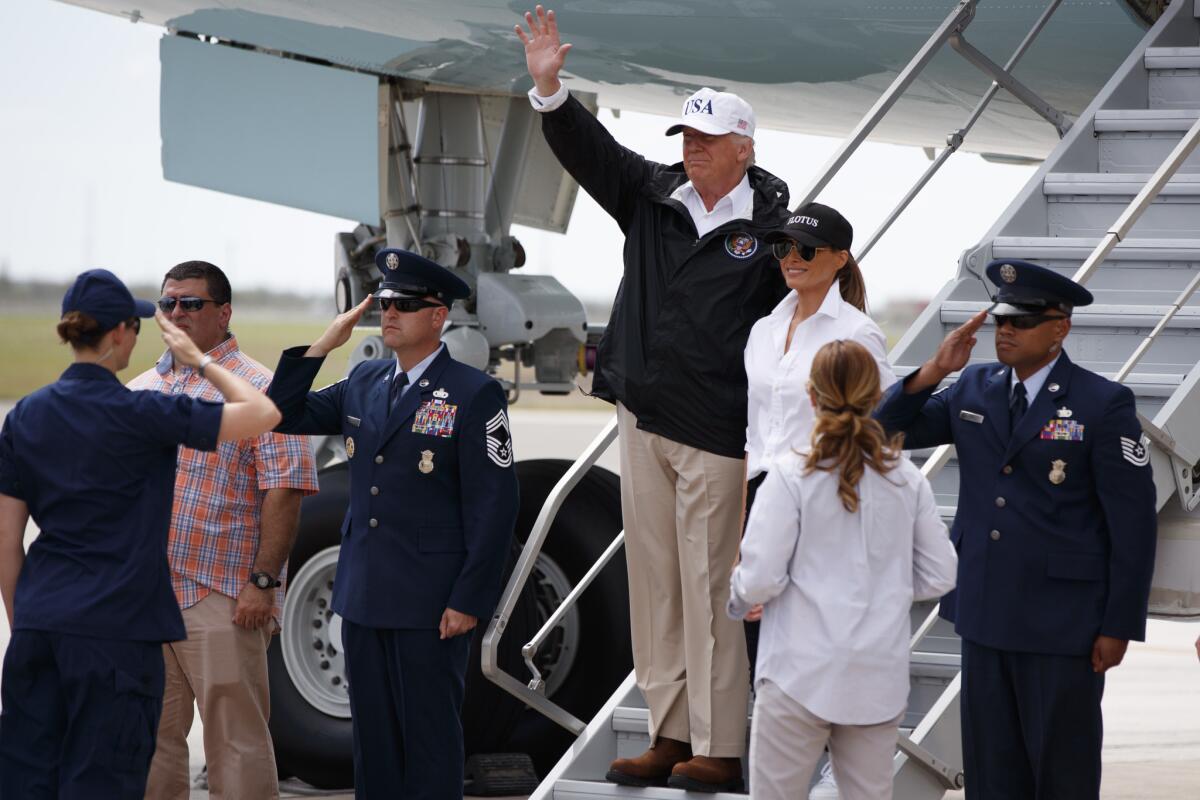
President Trump landed in Texas late Tuesday morning with plans to tour the state’s emergency operations center and get briefed on the state’s worsening flooding crisis while rescuers are still pulling people from submerged homes.
The trip to Corpus Christi and Austin comes a day after Trump promised to bring swift financial help for a “long and difficult” recovery from the storm’s devastation, which he said would cost billions.
“We think you’re going to have what you need, and it’s going to go fast,” he said.
Congress has not outlined a plan to tackle the needs of Texas and Louisiana, the two states that took the brunt of Harvey, a hurricane now downgraded to a tropical storm.
State and local officials are still responding to the immediate safety threat and have not begun to fully assess the long-term costs of the epic storm, which has turned large parts of Houston, the nation’s fourth-largest city, into a lake.
Sen. Ted Cruz defends his ‘no’ vote on disaster relief funds for Sandy in light of damage from Tropical Storm Harvey
Texas Sen. Ted Cruz was among a group of Republicans who voted against a $50.5-billion relief package for victims of 2012’s Superstorm Sandy when it came before them in January 2013. The measure passed anyway.
Now that his own state is likely to need a federal relief package totaling $40 billion or more due to a storm still pummeling the Gulf Coast around Houston, critics are calling out Cruz for what they say is hypocrisy for his decision to oppose Sandy relief while presumably supporting it now for Texas.
In an interview with NBC’s Katy Tur, Cruz defended his vote, saying the Sandy relief bill was filled with “unrelated pork.”
“Two-thirds of that bill had nothing to do with Sandy. And what I said then, and still believe now, is that it’s not right for politicians to exploit a disaster when people are hurting to pay for their own political wishlist,” he said.
Lawmakers from the New York-New Jersey region, which sustained the heaviest damage from Sandy, have signaled that they won’t let their anger over Cruz’s and other Republicans’ opposition to Sandy aid cloud their decision on Harvey relief.
Trump says ‘all options are on the table’ after North Korea flies test missile over Japan
President Trump said Tuesday that “all options are on the table” in terms of a U.S. response to North Korea’s launch of a missile over Japan.
In a terse, written statement, Trump said that with the missile launch North Korea has “signaled its contempt for its neighbors, for all members of the United Nations, and for minimum standards of acceptable international behavior.”
“Threatening and destabilizing actions only increase the North Korean regime’s isolation in the region and among all nations of the world,” Trump said. “All options are on the table.”
Trump later told reporters, “We’ll see, we’ll see” when asked what he would do about North Korea. Trump, accompanied by First Lady Melania Trump, was departing the White House for a trip to survey storm damage in southeastern Texas.
In a first, North Korea on Tuesday fired a midrange ballistic missile designed to carry a nuclear payload that flew over U.S. ally Japan and splashed into the northern Pacific Ocean, officials said. The aggressive launch over the territory of a close U.S. ally sent a clear message of defiance as Washington and South Korea conduct war games nearby.
Trump’s statement implies that military action remains an option in resolving the standoff over North Korea’s development of nuclear weapons that could threaten the United States. But a U.S. military strike against North Korea is considered highly unlikely. Even Trump’s own strategic adviser, Steve Bannon, dismissed the threat as a bluff shortly before he was dismissed earlier this month.
North Korea has the world’s largest standing army and a massive conventional weapons arsenal that can easily target the South Korean capital of Seoul and its metropolitan area of about 25 million people.
While Democrat and Republican presidents have routinely offered the “all options on the table” formulation, U.S. officials have long assessed that the North would likely respond to any U.S. strike by attacking its neighbor or nearby Japan. The result could be a war with the risk of mass casualties on both sides. Hundreds of thousands of Americans in northeastern Asia, military and civilians, would be endangered.
In recent weeks the administration has been emphasizing it wants to use economic and diplomatic pressure to achieve a negotiated solution.
Trump and Prime Minister Shinzo Abe of Japan conferred by telephone over the latest missile test.
The White House said the leaders agreed that North Korea poses “a grave and growing direct threat” to the United States, Japan, South Korea and countries around the world.
“President Trump and Prime Minister Abe committed to increasing pressure on North Korea, and doing their utmost to convince the international community to do the same,” the White House said.
Abe said in a statement that “Japan’s and the U.S. positions are totally at one.”
The prime minister added that both nations were in “total agreement” that an emergency meeting was needed at the U.N. Security Council to step up pressure on North Korea after what he called an unprecedented threat. He also said Trump expressed his “strong commitment” to defending Japan.
Read MoreUPDATES
6:40 a.m.: This article has been updated throughout with additional details and background.
Trump calls pardoned ex-sheriff ‘a patriot,’ renews call for closer ties to Russia
President Trump seemed eager to field questions during a Monday news conference, defending his decision to pardon former Arizona sheriff Joe Arpaio, still insisting Mexico will pay for his promised border wall and again refusing to criticize Russia.
The defense of Arpaio came amid a longer than expected news conference with Finnish President Sauli Niinistö in which Trump took more questions than either man planned.
Trump pushed back against accusations that he had tried to hide the controversial pardon of Arpaio by releasing it on a Friday night as Hurricane Harvey headed toward Texas. Instead, Trump asserted that he believed the television ratings would be higher than normal because so many people were monitoring the storm.
“Sheriff Joe is a patriot,” Trump said. “Sheriff Joe loves our country. Sheriff Joe protected our borders.”
The president said his pardon was no more controversial than other presidents. He pulled out a list of notes from his pocket, reading the names of figures pardoned by his past two Democratic predecessors, Presidents Clinton and Obama.
Apraio was convicted of violating a federal court order to stop his practice of racial profiling Latinos.
The pardon was criticized by Arizona Sen. John McCain among other Republicans, but Trump pointed to a boisterous rally in Arizona last week as evidence that the people of Arizona stand with him.
In fact, Arpaio, a high profile Trump campaign supporter, lost a popular election in Maricopa County in November, which Trump attributed to “unbelievably” unfair treatment
In a moment of levity, as Trump continued to take questions, he good-naturedly chided the Finnish president for calling upon the same female Finnish reporter twice. In fact, Niinistö had called upon different women.
“We have a lot of blond women in Finland,” the reporter joked.
Trump also remained defiant on two other issues that have come up frequently in his presidency — the proposal to build a larger border wall with Mexico and his relationship with Russia.
“I say it loud and clear, I’ve been saying for years,” Trump said. “I think it’s a good thing if we have great relationships, or at least good relationships, with Russia. That’s very important and I believe some day that will happen.”
Asked if he viewed Russia as a security threat, Trump demurred, saying he views many nations as security threats, but declining to mention Russia by name.
The comments came amid new revelations about his campaign’s ties to Russia, the subject of a federal investigation into election meddling.
On the wall, Trump declined to back down from recent threats that he would allow the government to shut down if Congress refuses to provide more money for the wall. During the campaign, Trump said that Mexico would pay for the wall, something Mexican officials have repeatedly dismissed as a nonstarter.
“We may fund it through the United States but ultimately Mexico will pay for the wall,” Trump said.
Hillary Clinton will go to Wisconsin, this time
California will be among the first stops for Hillary Clinton’s upcoming tour touting her new book, “What Happened,” a memoir about her loss to Donald Trump.
Clinton’s only scheduled appearance in California is at UC Davis on Oct. 9, although more stops could be added during her swing through the U.S. and Canada.
The book tour map at the moment looks a lot different from, say, Clinton’s campaign trail schedule one year ago, when she was hopscotching between swing states. She didn’t visit Wisconsin, one factor her aides have admitted probably contributed to her loss in the state after 32 years of Democratic presidential victories there. She lost reliably Democratic Michigan to Trump, too, in the first win for Republicans there since 1988. It’s a safe bet she’ll express regret in both states when she speaks in the college town of Ann Arbor on Oct. 24 and in Milwaukee on Nov. 9, one year and one day after the 2016 election.
The remaining U.S. stops are almost entirely in states she won. Clinton’s California victory was her largest — she beat Trump here by more than 4.2 million votes.
Clinton’s tour kicks off at the Warner Theater in Washington, D.C., on Sept. 18. Other stops include Chicago, New York, Atlanta, Boston, Philadelphia, Seattle, Portland, Ore., and Montreal and Vancouver in Canada.
A book tour website states that other cities will be added once they are confirmed.
To attend one of Clinton’s book tour events, it’ll cost. Ticket prices range from a low of $55 for the event in Washington, which includes a ticket and a book, to $3,000 for a “VIP Platinum ticket” for the stops in Canada.
The platinum ticket includes front-row seating, admission for two, a backstage meet-and-greet with a photo and a copy of “What Happened.” Tickets prices for some of the events, including the one at UC Davis, have not been released.
Publisher Simon & Schuster told the Associated Press in July that Clinton’s book will be a personal memoir of her campaign as well as a “cautionary tale” about Russian interference in the election. The book’s publication date is Sept. 12.
“In the past, for reasons I try to explain, I’ve often felt I had to be careful in public, like I was up on a wire without a net,” Clinton writes in the introduction, according to Simon & Schuster. “Now I’m letting my guard down.”
3:45 p.m.: This post was updated with details about the cost of the tour.
Now embroiled in Trump-Russia inquiry, Felix Sater once was an FBI informant
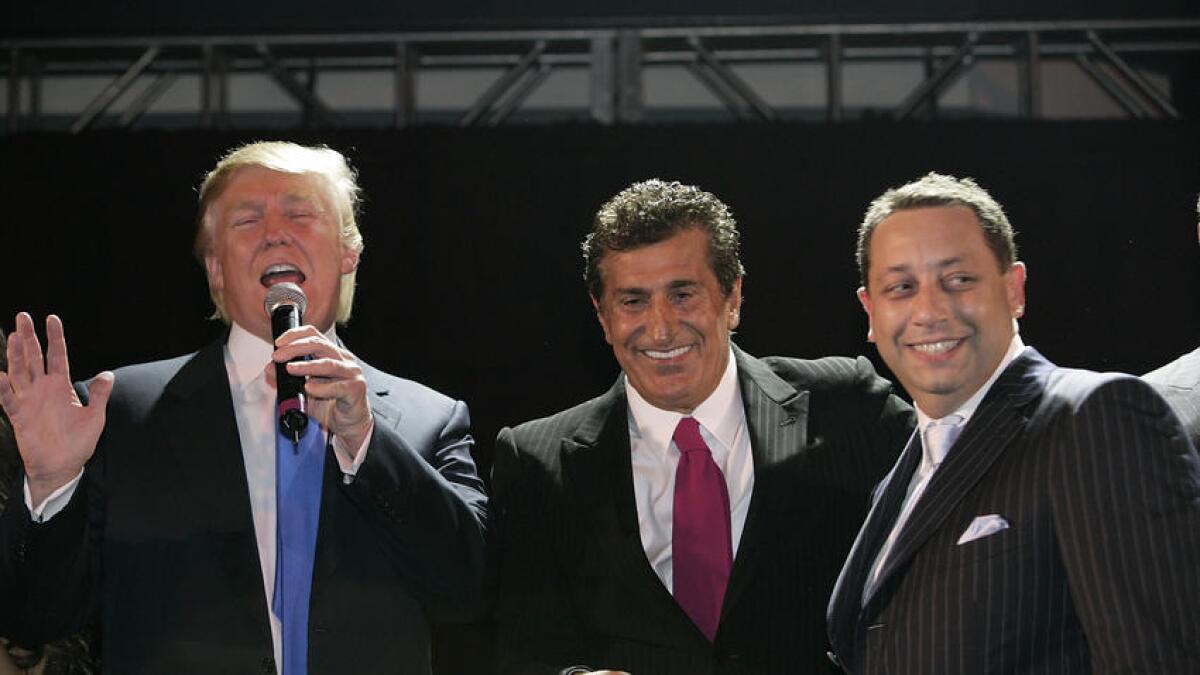
On Monday, the New York Times and Washington Post reported about Felix Sater, one of Donald Trump’s business associates, and the role he allegedly played during the presidential campaign in connecting Trump’s lawyer, Michael Cohen, to Russian government officials to facilitate approval of a proposed Trump Tower to be built in Moscow.
The Times spoke to Sater earlier this year about his work with the Trump organization and his claim to also be working with the FBI.
Working from a 24th-floor office in Manhattan’s Trump Tower, Felix Sater spent years trying to line up lucrative deals in the United States, Russia and elsewhere in Europe with Donald Trump’s real estate organization.
For much of that time, according to court records and U.S. officials, Sater also worked as a confidential informant for the FBI, and — he says — U.S. intelligence.
“I was building Trump Towers by day and hunting Bin Laden by night,” Sater, now 50, told the Los Angeles Times in a phone interview from New York.
As managing director of Bayrock Group LLC, a real estate development firm, the Russian-born businessman met Trump in 2003, court records show, when Trump was looking to expand his business and branding organization around the globe.
Although few projects were built, Sater worked on hotel and condominium deals with the Trump Organization through 2010 in New York, Florida, Arizona, London, Moscow and elsewhere even as he secretly helped the FBI infiltrate and take down organized crime figures, according to court records.
Trump has denied they were close, but Sater had access to Trump’s inner circle as recently as this year.
In January, Sater and Trump’s personal attorney, Michael Cohen, met in a New York hotel with a Ukrainian lawmaker who asked them to bring the White House a pro-Russian peace deal for Ukraine.
“I was only trying to stop a war,” Sater said of his role linking the lawmaker, Andrei Artemenko, with Cohen.
Trump pledges quick federal aid to those hit by Harvey
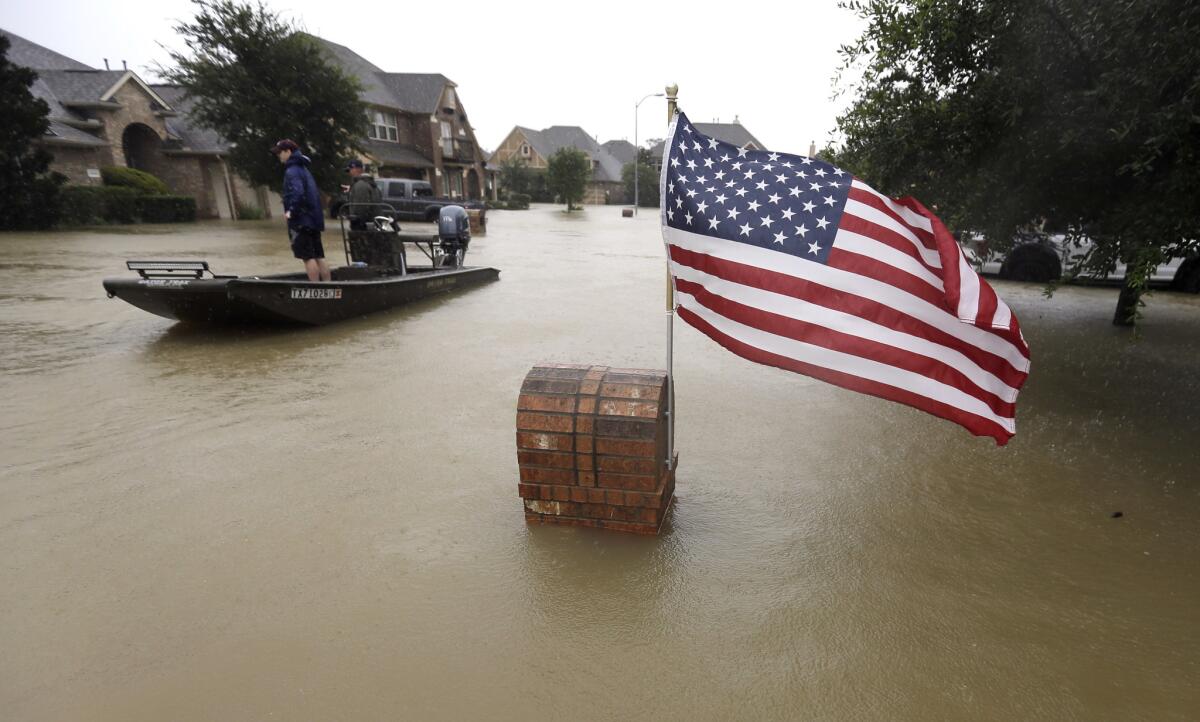
President Trump predicted that federal aid would be delivered quickly to those affected by Tropical Storm Harvey.
“You’re going to see very rapid action from Congress, certainly from the president.... We think you’re going to have what you need and it’s going to go fast,” Trump said at a news conference with the Finnish president in Washington today.
But he cautioned that the extent of the disaster is still unknown.
“It’s a long road. Still pouring. Nobody’s ever seen anything like it. I’ve heard the word epic. I’ve heard historic. That’s what it is,” he said.
Lawyer says proposal for Trump Tower in Russia was abandoned
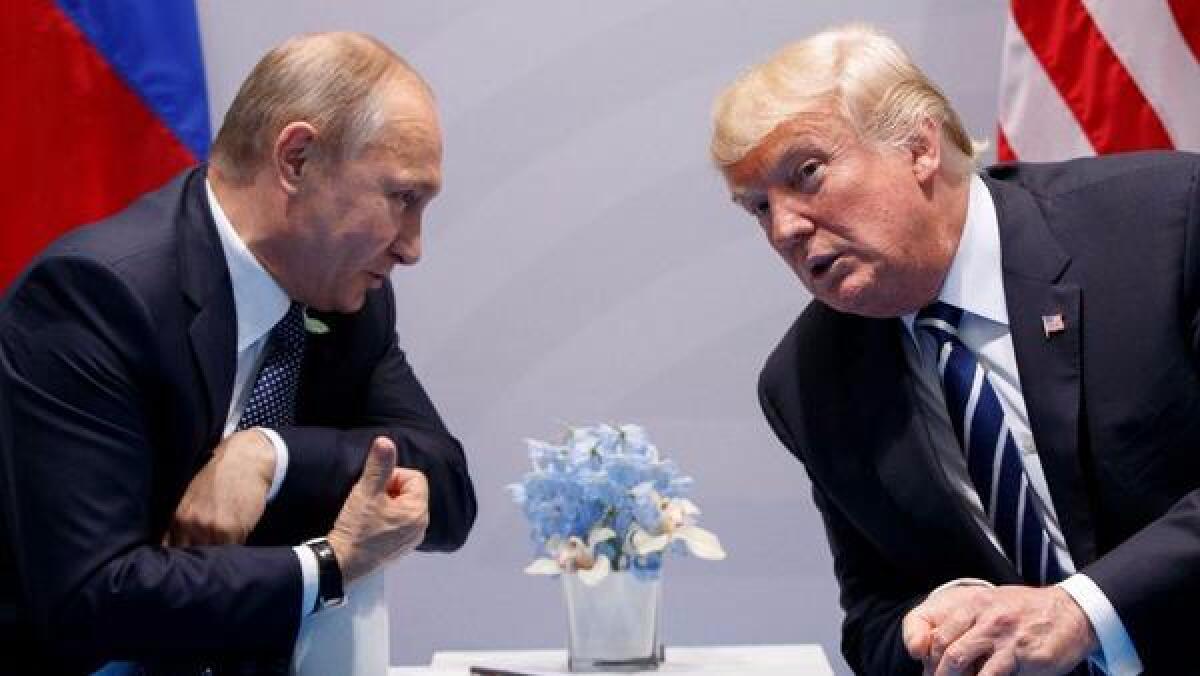
President Trump’s personal lawyer is acknowledging that the president’s company considered building a Trump Tower in Moscow during the Republican primary, but the plan was abandoned “for a variety of business reasons.”
The attorney, Michael Cohen, disclosed the details Monday to the House Intelligence Committee. The committee is looking into potential Russian interference in the 2016 presidential election. The statement was subsequently obtained by the Associated Press.
Cohen says he worked on the proposal with Felix Sater, a Russia-born associate who claimed to have deep connections in Moscow.
The story was first reported Monday by the Washington Post. The New York Times reported on emails in which Sater boasted to Cohen that the real estate deal could help get Trump elected.
UPDATES
12:05 p.m.: This post has been updated with a response from President Trump’s lawyer.
This post originally published at 5:58 a.m.
ACLU sues Trump over transgender military ban
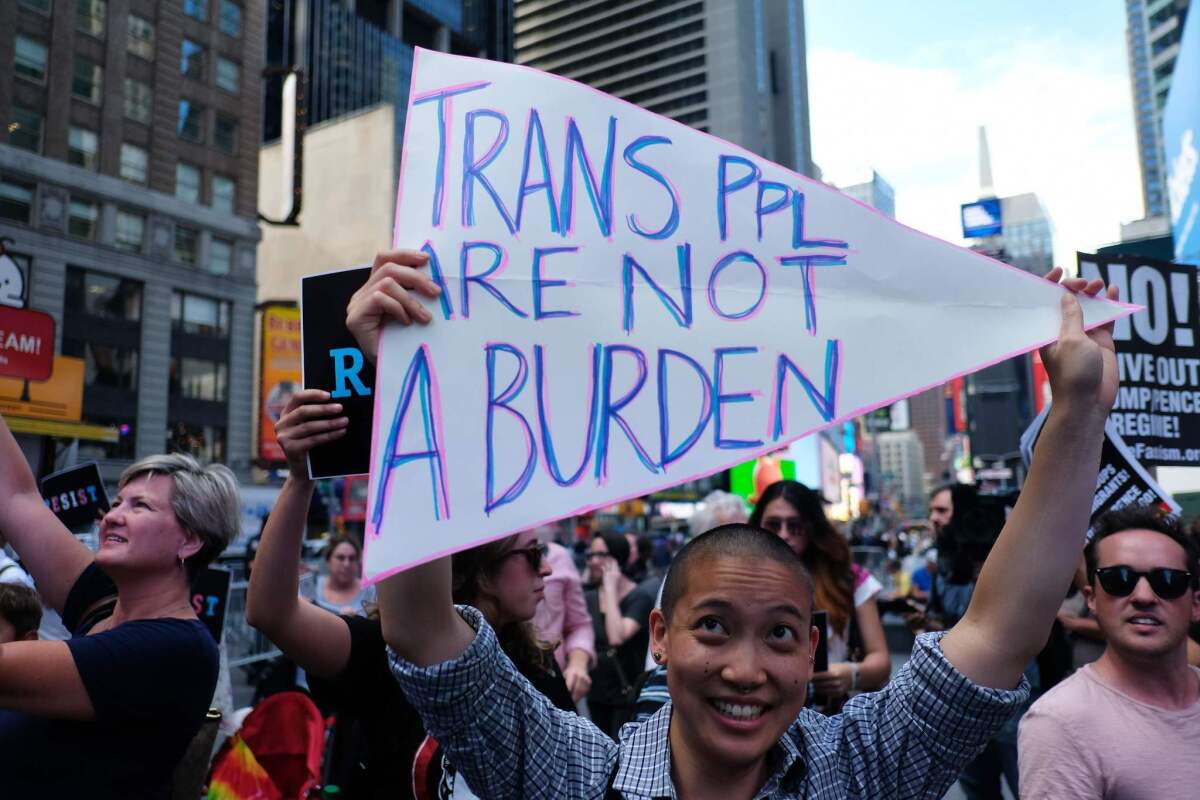
The American Civil Liberties Union on Monday filed a lawsuit challenging President Trump’s ban on transgender individuals joining the military.
The federal lawsuit was filed in Maryland by the ACLU of Maryland on behalf of several service members who are transgender.
Trump directed the Pentagon on Friday to implement the ban on transgender individuals joining the military, which he first announced in a tweet. He also gave the Pentagon the authority to decide the future of openly transgender people already serving.
The lawsuit says Trump’s policy violates the equal-protection rights of transgender service members who now have “grave reason to fear for their careers.”
Trump travel to Texas now set for Tuesday, with promise to avoid hampering rescue efforts
The White House said Sunday that President Trump would travel to storm-battered Texas on Tuesday – although the president said earlier his travel would be planned so as not to disrupt rescue efforts.
The updated travel plan was announced by White House Press Secretary Sarah Huckabee Sanders as Trump returned to the White House by helicopter from Camp David, in Maryland, with his wife, Melania, and son Barron.
Daughter Ivanka Trump, her husband, Jared Kushner, and their three children had also traveled to the presidential retreat and returned with the first family on the short helicopter flight.
“We are coordinating logistics with state and local officials, and once details are finalized, we will let you know,” the White House statement said of Trump’s upcoming trip to Texas. “We continue to keep all of those affected in our thoughts and prayers.”
As Houston was hit by catastrophic flooding, Trump repeatedly tweeted praise for rescue workers and others trying to help those who were stranded by high waters.
The president also raised some eyebrows, though, with Twitter commentary on Sunday that had little to do with the onging disaster. One took aim at Sen. Claire McCaskill (D-Mo.), predicting Republican gains in the state and calling attention to his own margin of victory in the state in last year’s election.
Another tweet castigated Mexico as crime-infested and renewed Trump’s vow that Mexico would pay for his border wall. The Mexican government has said it will not.
Speaker Ryan ‘does not agree’ with Trump’s pardon of Arpaio
House Speaker Paul D. Ryan became one of a few top Republicans to publicly disagree with President Trump’s pardon of former Arizona Sheriff Joe Arpaio, as lawmakers in Congress have become more willing to distance themselves from the White House, especially on issues of race.
“The speaker does not agree with this decision,” said Ryan spokesman Doug Andres. “Law enforcement officials have a special responsibility to respect the rights of everyone in the United States. We should not allow anyone to believe that responsibility is diminished by this pardon.”
Republicans tread carefully when leveling criticism of Trump or his administration’s approach to issues, fearful of turning off their supporters who back the president. Few Republicans in Congress spoke publicly after Trump’s pardon Friday of Arpaio, the former sheriff convicted of defying a court order to stop his department’s racial profiling of Latino residents suspected of illegally immigrating to Arizona.
The state’s two senators, John McCain and Jeff Flake, both expressed their disapproval. But they both have already endured Trump’s high-profile rebukes for their differences with the administration.
Only after Trump’s handling of the white supremacist rally in Charlottesville, Va., did larger numbers of Republicans in Congress publicly break from their party’s president. Lawmakers could not withstand having their party linked to any equivocation over the neo-Nazi groups.
Ryan spoke up against Trump last week, stating the president “messed up” in responding to Charlottesville.
But criticizing Trump carries risks as evident in Ryan’s statement on the Arpaio pardon. It was not disseminated broadly, through a press release or on social media or Twitter, but only given upon request.
Trump sends message with Arpaio pardon: The federal government expects local help enforcing immigration laws
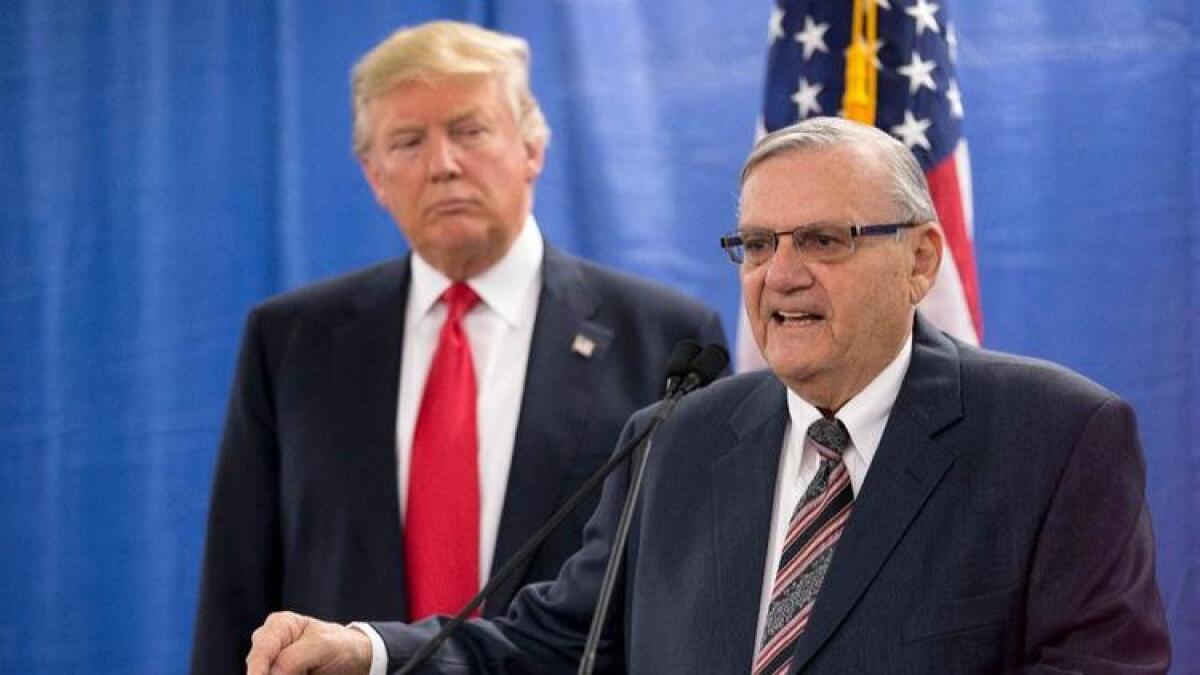
To President Trump and many of his supporters, Joe Arpaio is a national hero whose aggressive pursuit of people in the country illegally and cooperation with federal immigration authorities should be a model for cities and counties around the country.
“Was Sheriff Joe convicted for doing his job?” Trump asked at a raucous campaign-style rally in Phoenix last week, three days before pardoning the 85-year-old former Arizona sheriff.
The pardon of Arpaio — who was convicted of criminal contempt in July for flouting a court order to stop racial profiling of Latinos while he was sheriff — has galvanized Trump’s political base around an issue that was at the center of his presidential campaign.
But for civil rights advocates, who believe that local authorities should not enforce federal immigration laws, the pardon was an endorsement of illegal tactics and will only serve to deepen racial tensions.
“Arpaio built his work on terror and fear,” said Alejandra Gomez, co-executive director of the Arizona-based Living United for Change in Arizona, or LUCHA, an immigrant rights group. “Arpaio targeted the immigrant community, separating thousands of families. Arpaio built the foundation for Trump’s agenda.”
Tillerson appears to distance himself from Trump on racism and ‘values’
As criticism of President Trump’s views on race has continued to mount, his secretary of State appeared – unusually -- to distance himself from “values” expressed by the chief executive in the aftermath of a white-supremacist march in Charlottesville, Va., earlier this month.
Appearing on “Fox News Sunday,” Rex Tillerson was asked about a U.N. panel’s recent criticism over failure at “the highest political level” of the U.S. to “unequivocally reject and condemn…racist violent events.” The panel, which normally confines its expressions of concern to the actions of dictatorial regimes or groups like Islamic State, did not mention Trump by name.
A 32-year-old paralegal, Heather Heyer, was killed when one of the Charlottesville marchers plowed a car into a crowd of counter-protesters. An Ohio man described as a Nazi sympathizer has been charged in the killing.
Asked about the statement earlier this month by the U.N. Committee on the Elimination of Racial Discrimination, TIllerson told interviewer Chris Wallace that he did not believe “anyone doubts the American people’s values” with respect to combating racism.
Pressed by Wallace whether Trump shared those values, Tillerson replied: “The president speaks for himself, Chris.”
When his interviewer followed up by asking the secretary whether he was separating himself from Trump’s views, Tillerson once again offered distancing language, saying “I have made my own comments” as to American values on racism.
Trump places a premium on personal loyalty, and in general, aides staunchly defend him even under the most controversial circumstances. But his homeland security advisor, Tom Bossert, declined Sunday to directly support the president’s contention that there had been “very fine people” among the white supremacist marchers.
Asked about that characterization, Bossert said: “I think you’ll have to ask the president how he wanted to parse” characteristics of march participants.
“I’d ask you to ask the president for clarification,” he said on ABC’s “This Week.”
Asked for his own views about those marching with Confederate banners and Nazi symbols while hurling racial invective, Bossert said: “I don’t think anyone chanting those things is a ‘very fine person’ – period.”
He did defend the overall tenor of Trump’s remarks condemning racism, however.
“I can’t be clearer,” he said after repeatedly attempting to return the conversation to the White House response to the hurricane that hit Texas. “I think the administration’s been clear.”
After Charlottesville, Trump drew fire when he initially failed to specifically denounce white supremacists and neo-Nazis as instigators of the violence, saying that the blame lay with “many sides.” Under pressure, he named the groups days later, but then made a series of statements appearing to walk back his initial response and slamming the unfairness of critics and the news media.
Virginia Gov. Terry McAuliffe, who has accused the president of fomenting disunity in response to the Charlottesville violence, criticized him anew on Sunday. Appearing on CNN’s “State of the Union,” the Democratic governor was asked about Trump’s contention that his initial response had been “perfect.”
“Those people came to do harm; they brought their hatred here,” he said of the white supremacists and their allies. “There is no moral equivalence…he needs to call that out for what it is.”
Trump says he’ll visit hurricane-hit area when possible to do so without disrupting rescue efforts
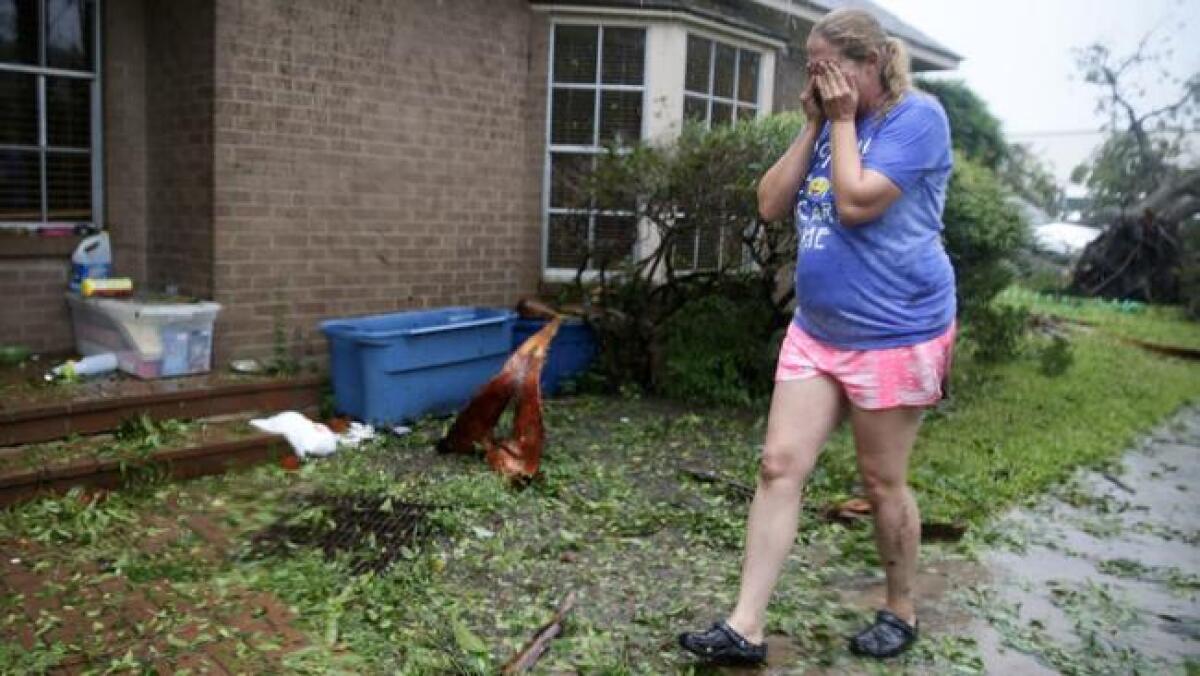
President Trump said Sunday he would visit hurricane-hit Texas as soon as it was possible to do so without interfering with rescue efforts.
The state’s Republican governor, Greg Abbott, praised the response of federal authorities to the deadly storm, saying Texas was getting “absolutely everything we need” from the White House.
Hurricane Harvey made landfall Friday night and has since been downgraded to a tropical storm. It is blamed for at least two deaths, more than a dozen injuries, and widespread heavy flooding that has struck major cities such as Houston and Corpus Christi.
“We could not be more appreciative of what the federal government has done, from the president on down,” Abbott said on ABC’s “This Week.”
Appearing on the same program, Tom Bossert, the White House homeland security advisor, said the president’s travel would be planned so as not to interfere with lifesaving activity.
“The president wants to go to show his support,” Bossert said. “He doesn’t want to go to get in the way, and he’s been very clear about that.”
Trump advisor Sebastian Gorka ‘no longer works at the White House’
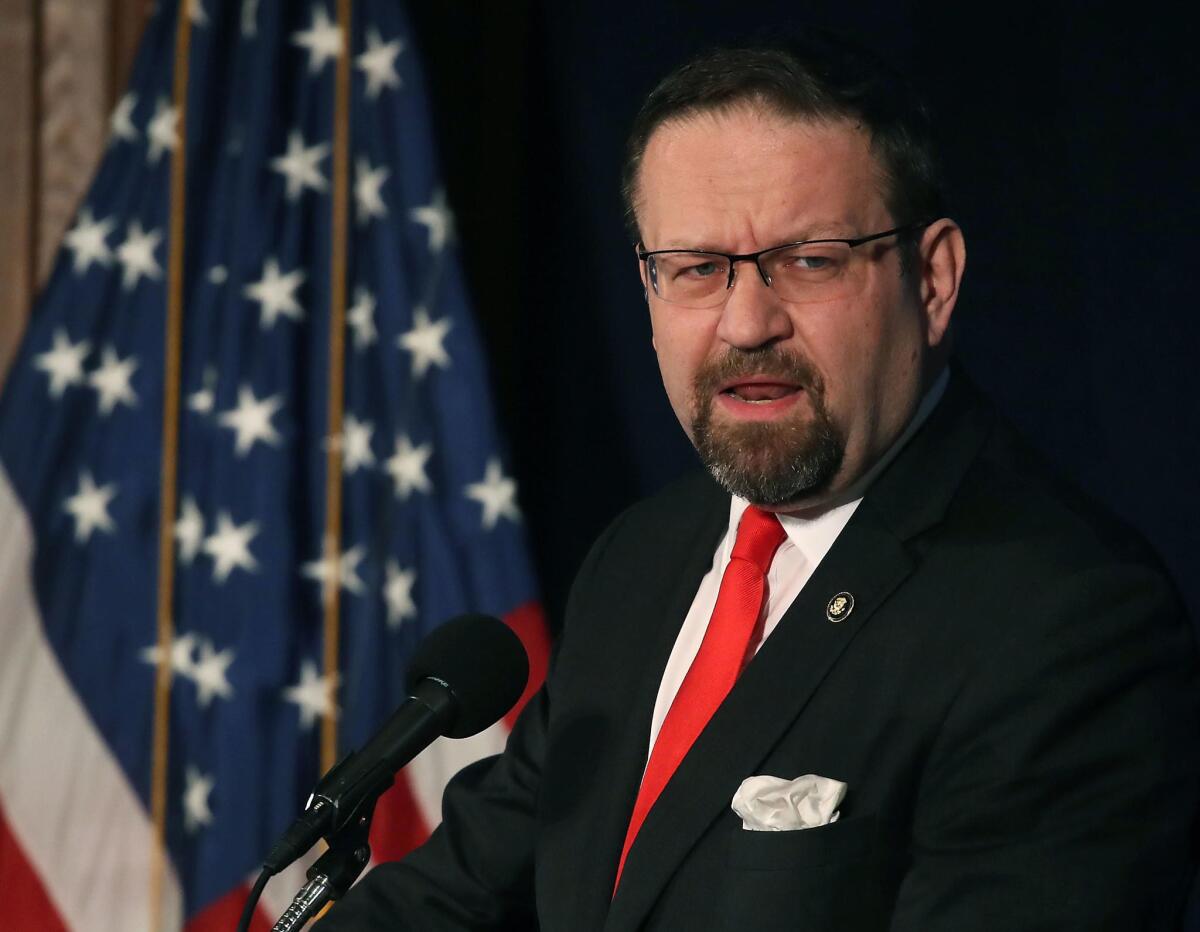
White House national security aide Sebastian Gorka has resigned from his position, according to the Associated Press.
A White House official, however, says Gorka did not resign but “no longer works at the White House.”
That official was not authorized to discuss the matter publicly and spoke on condition of anonymity.
Gorka is declining to discuss the reasons he has left the White House, but is pointing to excerpts from his resignation letter that were posted Friday evening by the Federalist website.
Gorka wrote that “the individuals who most embodied and represented the policies that will ‘Make America Great Again,’ have been internally countered, systematically removed, or undermined in recent months.”
Gorka’s departure comes a week after the exit of chief strategist Stephen K. Bannon from the White House.
6:25 p.m.: This story was updated with more information on the circumstances of Gorka’s resignation.
This story was originally posted at 6:12 p.m.
Trump under pressure to end deferred deportations for ‘Dreamers’
Hard-liners in the Trump administration appear to be trying to pressure President Trump to stop an Obama-era program that has granted work permits to thousand of people who entered the country illegally as children.
Officials this week have met to prepare options for Trump that range from ending the Deferred Action for Childhood Arrivals program immediately to phasing it out by ending renewals of the two-year work permits, allowing them to expire over time.
The president promised to end DACA during his campaign last year. But he has refused since January to sign a draft executive order to halt the program.
The deferred-action program protects more than 750,000 people, known as Dreamers, from being deported.
Trump now is facing additional pressure from 10 Republican state attorneys general, from heavily Republican states, who have pledged to sue the Trump administration if the president doesn’t roll back the DACA program by Sept. 5.
U.S. Atty. Gen. Jeff Sessions, a hard-liner on immigration, is in favor of ending DACA. He has signaled internally that he would be reluctant to have Justice Department attorneys defend the program in court.
White House aides in favor of tighter immigration restrictions have privately hoped the litigation against DACA would move forward and provide a way to end protection for “Dreamers” while shielding Trump from the blowback of simply ending the program.
White House Press Secretary Sarah Huckabee Sanders refused to say Friday if Trump was close to ending DACA.
“The administration has indicated several times before that the DACA program is under review,” Sanders said. “It continues to be under review.”
Acting Secretary of Homeland Security Elaine Duke and Sessions discussed DACA with officials at the White House in a meeting Thursday, an administration official said, speaking on condition of anonymity to describe internal deliberations.
That followed a Monday meeting at Homeland Security between Duke and Thomas Homan, the acting head of Immigration and Customs Enforcement, the official said.
Since taking office, Trump has shown sympathy for people brought to the country illegally as children, a view encouraged by his daughter Ivanka Trump.
In recent months, he has indicated repeatedly he wouldn’t put recipients of the work permits in jeopardy of being removed from the country.
In April, Trump said in an interview with the Associated Press that people protected from deportation under DACA could “rest easy.”
Trump orders Pentagon to reinstate ban on transgender people in the military
President Trump has directed the Pentagon to “return to the long-standing policy and practice” barring military service by transgender individuals, guidance that the Pentagon previously said was needed before it could act on the president’s Twitter messages on the issue.
The three-page memorandum allows Defense Secretary James N. Mattis to determine whether self-declared transgender members of the military can continue to serve.
The guidance reverses a year-old Obama administration policy that ended a ban on transgender people in the armed services and the Coast Guard, which comes under the Homeland Security Department. It gives those departments until Jan. 1 to implement the policy.
Trump’s memo also directs the Pentagon to stop providing sex-reassignment surgical procedures for military personnel – unless it would hurt the person in the midst of transition.
“In my judgment, the previous administration failed to identify a sufficient basis to conclude that terminating the departments’ long-standing policy and practice would not hinder military effectiveness and lethality, disrupt unit cohesion, or tax military resources, and there remain meaningful concerns that further study is needed to ensure that continued implementation of last year’s policy change would not have those negative effects,” Trump wrote.
He said he therefore had decided to return to the policy that was in place prior to June 2016, when President Obama changed it.
The guidance follows Trump’s announcement on Twitter in June that the military “will not accept or allow” transgender service members “in any capacity.”
The Pentagon was caught flat-footed by the tweets. Top U.S. commanders publicly said there would be no change until the White House issued formal guidance.
Defense officials and White House have worked to draw up the guidance so the Pentagon could reverse course on allowing transgender individuals into the military in such a way that the changes would stand up in court.
House Minority Leader Nancy Pelosi condemned the decision Friday.
“Prejudice, not the national defense, is behind President Trump’s cruel decision to kick transgender troops out of the military,” she said in a statement.
She said that a study commissioned by the Defense Department had found the cost of providing medical care for transgender troops would be miniscule.
“In fact, every year, the Pentagon spends five times more on Viagra than they would for transition-related care,” she said.
Trump, she added, “should have more respect for the transgender men and women who had the patriotism and bravery to serve our country in uniform.”
Trump’s declaration drew rebuke from many war veterans and LGBT advocacy groups, who vowed to challenge the president in federal court if self-identified transgender service members were forced out of the military.
A federal lawsuit was filed on Aug. 9 on behalf of five transgender service members who seek to block implementation of the ban while the suit proceeds.
Attorneys representing those service members from the National Center for Lesbian Rights and GLBTQ Legal Advocates and Defenders called Trump’s memo “shameful.”
“Our military is strongest when all people who are fit to serve have the opportunity to do so,” Jennifer Levi, GLAD Transgender Rights Project Director, said in a statement. “This unprecedented policy amounts to a purge of qualified, contributing troops, and will serve only to undermine unit cohesion and weaken military readiness.”
Several powerful Republican lawmakers — including Sens. John McCain of Arizona, Richard C. Shelby of Alabama and Orrin G. Hatch of Utah — expressed outright opposition, suggesting the policy might get slow-rolled in hearings and studies.
The White House memo says the Pentagon should submit final plans on implementation to the White House by Feb. 21.
The document is addressed to the Department of Defense and the Department of Homeland Security. The Army, Navy, Air Force and Marine Corps fall under Defense, while the Coast Guard is part of Homeland Security.
The Pentagon keeps no figures on transgender personnel in the military. Outside groups estimate there are between 1,300 and 15,000 transgender troops in the military, which has an active-duty force of about 1.3 million.
Trump will monitor Hurricane Harvey from Camp David, may visit Texas early next week
The White House is considering having President Trump declare a federal emergency before Hurricane Harvey makes landfall on the Gulf Coast, officials said Friday, to assure that state and local responders have adequate resources.
The potentially devastating storm is confronting Trump with the first natural disaster of his administration, posing a test of leadership and governing competence at a time when he is being widely criticized on that score, even within his own party.
Trump departed the White House on Friday afternoon for a weekend at Camp David in Maryland after being briefed by officials from the Federal Emergency Management Agency and the Department of Homeland Security, along with other emergency management officials.
Aides said Trump’s main questions were whether emergency responders had what they need to protect residents in Texas, Louisiana and anywhere else in the storm’s path that could experience the torrential rains projected for days in its aftermath.
“This is right up President Trump’s alley,” Tom Bossert, the Homeland Security advisor, said at a news briefing.
“His questions were: Are are you doing what it takes to help the people,” he said. “What we’ve done has gotten a lot better as a government.”
The administration is especially mindful of the slow and bungled response of the George W. Bush administration to Hurricane Katrina in 2005. Questions of competence raised by that episode hobbled President Bush for the remainder of his term.
Longtime Sen. Charles Grassley (R-Iowa) warned Trump in a morning tweet, “keep on top of hurricane Harvey dont mke same mistake Pres Bush made w Katrina.”
As Trump strode to his helicopter for the departure to Camp David, reporters shouted to ask what message he had for those in Texas; Trump said either “Be strong” or “Be safe” — the words were unclear over the noise of the helicopter. With him were his wife, son Barron, daughter Ivanka and son-in-law Jared Kushner and their three children.
The president will be able to monitor the situation from the weekend retreat, aides said, and might address the nation later.
Trump is likely to visit Texas early next week, said Press Secretary Sarah Huckabee Sanders.
Federal officials urged Gulf Coast residents not to ignore advice from local authorities, including evacuation orders. Bossert warned that residents may be unaware of planned road closures or lane reversals if they depart too late, and that delays could endanger their lives and responders.
“You have nothing to lose but your life,” Bossert said. “So I want you to take it seriously. If they’re telling you to evacuate and do it now, listen to their advice.”
Bossert also sought to reassure immigrants who are in the region if they or family members are in the country illegally. Concerns have been raised that they may fear evacuating on routes near border control checkpoints, or avoid taking refuge in shelters at a time when the Trump administration is aggressively pursuing deportations.
Bossert insisted that immigrants would be safe.
“People shouldn’t be fearful of going to a shelter,” he said. “That’s not a problem.”
To Americans far from the storm, going about their summer weekends, Bossert had a separate message: “Let’s say a little prayer for those who are affected.”
U.S. imposes tough economic sanctions on Venezuela
The Trump administration on Friday slapped sweeping financial sanctions on Venezuela, barring banks from any new financial deals with the government or state-run oil giant PDVSA.
The sanctions Trump signed by executive order are bound to dramatically escalate tensions between Venezuela and the U.S. and exacerbate the country’s economic crisis.
The White House said in a statement that the measures “are carefully calibrated to deny the [President Nicolas] Maduro dictatorship a critical source of financing to maintain its illegitimate rule, protect the United States financial system from complicity in Venezuela’s corruption and in the impoverishment of the Venezuelan people, and allow for humanitarian assistance.”
The new actions prohibit dealings in new debt and equity issued by the government of Venezuela and its state oil company. It also prohibits dealings in certain existing bonds owned by the Venezuelan public sector, as well as dividend payments to the government of Venezuela.
Trump again bashes the Republican leaders in Congress he needs to pass his agenda
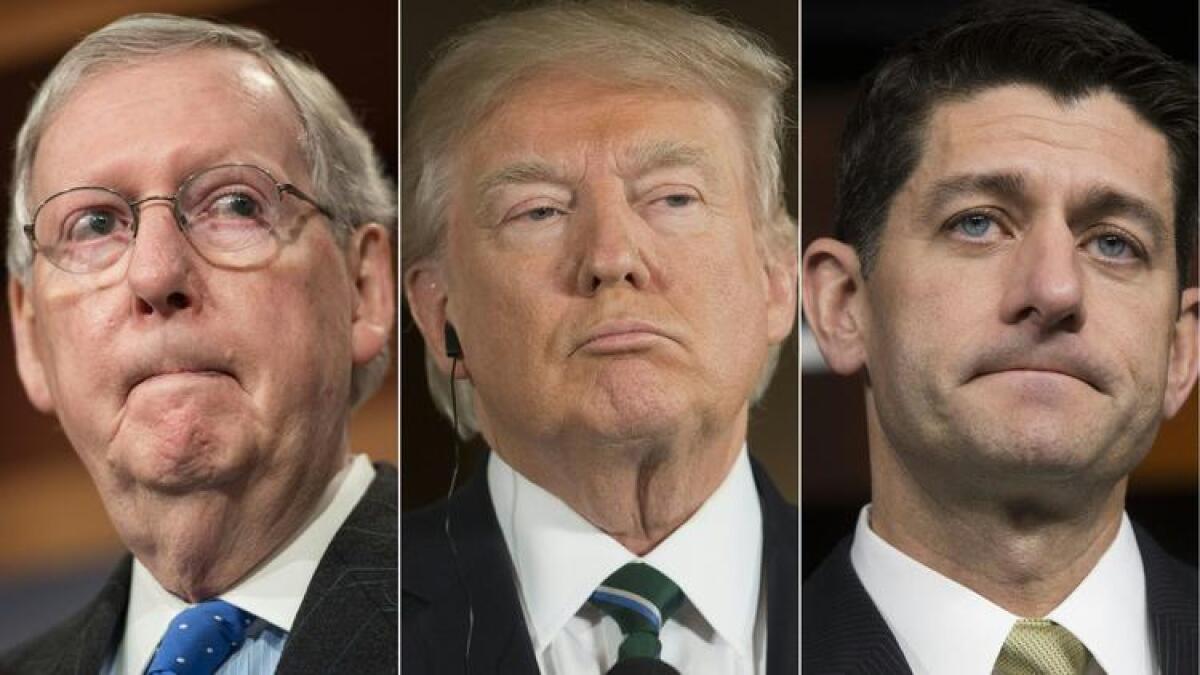
Senate Majority Leader Mitch McConnell (R-Ky.) tends toward restraint in public comments, but his observation that President Trump, as a newcomer to politics, had “excessive expectations” about the legislative process provoked an unexpected war with the White House that shows no signs of easing.
Trump, in tweet after scalding tweet, has turned on McConnell, attacking the Republican Senate leader — and at times House Speaker Paul D. Ryan (R-Wis.) — in a relentless barrage that continued Thursday, long after each sides’ offices had tried to put the matter to rest by pledging to work together on shared GOP priorities.
The outbursts from the president have not only driven a wedge between the White House and its Capitol Hill allies, but they have also exposed the limits of the president’s understanding of how to interact with Congress and how the legislative branch works.
In many ways, Trump’s escalating retorts have only proven McConnell’s initial criticism correct.
Former CIA agent starts crowdfunding campaign to buy Twitter in order to kick Trump off

Former undercover CIA agent Valerie Plame Wilson is looking to raise enough money to buy Twitter so President Trump can’t use it.
Wilson launched the crowdfunding campaign last week, tweeting: “If @Twitter executives won’t shut down Trump’s violence and hate, then it’s up to us. #BuyTwitter #BanTrump.” The GoFundMe page says Trump’s tweets “damage the country and put people in harm’s way.”
As of Friday morning, she had raised about $63,000 of the $1-billion goal.
In an emailed statement, White House Press Secretary Sarah Huckabee Sanders said the low total shows that the American people like Trump’s use of Twitter.
“Her ridiculous attempt to shut down his 1st Amendment is the only clear violation and expression of hate and intolerance in this equation,” the statement read.
The 1st Amendment, however, forbids only the government from curtailing free speech; it does not obligate private companies to provide a platform for users to say whatever they want.
Wilson wrote on the GoFundMe page that she hopes to raise enough money to buy a controlling interest of Twitter Inc. stock. If she doesn’t have enough to purchase a majority of shares, she said, she will explore options to buy “a significant stake” and champion the proposal at Twitter’s annual shareholder meeting.
Gary Cohn publicly criticizes Trump’s Charlottesville response and reportedly came close to resigning over it
Top White House economic advisor Gary Cohn publicly criticized President Trump’s response to the violence in Charlottesville, Va., and reportedly came close to resigning over it.
In his first public comments on the matter, Cohn told the Financial Times in an interview published Friday that the Trump administration “can and must do better in consistently and unequivocally condemning” white supremacists, neo-Nazis and the Ku Klux Klan.
Cohn, who is Jewish, plays a key role in the administration and his departure would be a blow to Trump’s economic agenda. In addition to directing the White House National Economic Council, the former Goldman Sachs Group Inc. executive is helping lead the administration’s push to overhaul the tax code.
Trump also has said he’s considering nominating Cohn to chair the Federal Reserve. The four-year term of Fed Chairwoman Janet L. Yellen expires in February.
Cohn stood by Trump’s side during an impromptu news conference in New York last week in which the president said there were “some very fine people” marching alongside neo-Nazis in Charlottesville.
Cohn said he had “come under enormous pressure both to resign and to remain in my current position.”
The New York Times reported Friday that Cohn had seriously considered resigning and even drafted a resignation letter, citing two unnamed people familiar with the draft.
But Cohn said he was not leaving his White House job.
Trump foes, questioning his mental fitness, are citing the 25th Amendment. So how does that work?
Is President Trump crazy?
Not can-you-believe-he-really-said-that? crazy. Certifiably-mentally-unfit-to-serve-as-president crazy.
It’s an outlandish assertion — insulting, really — and a measure of the antipathy of Trump’s critics that some, including members of Congress, have seriously raised the subject. Which brings us to the 25th Amendment.
Born of the Cold War and enacted after the assassination of President Kennedy, the language amounts to a bit of technical housekeeping appended to the Constitution. It outlines the presidential line of secession, including procedures in the event, as the amendment states, the chief executive “is unable to discharge the powers and duties of his office.”
With impeachment of Trump an exceeding long shot — given the GOP’s firm grip on Congress — a small chorus of Democrats has suggested an even less likely antidote to a presidency they cannot and will not abide: removing Trump on the grounds he is mentally unsound.
White House calls GOP Sen. Corker’s criticism of Trump ‘ridiculous and outrageous’
Sen. Bob Corker ventured further than most Republicans in Congress who’ve criticized President Trump when he suggested recently that Trump had not shown the “stability” or “competence” needed in the White House.
Yet Trump, who has taken to Twitter to lambaste other Republican Senate leaders, initially kept quiet about Corker, an ally who was once under consideration to be secretary of State.
On Thursday, Trump’s press secretary did not hold back.
Asked about Corker’s criticism, Sarah Huckabee Sanders said, “That’s a ridiculous and outrageous claim and doesn’t dignify a response from this podium.”
By Friday, Trump weighed in with his own tweet calling Corker’s statement “strange considering that he is constantly asking me whether or not he should run again in ’18.”
The Tennessee senator’s striking critique of the president, which has been replayed repeatedly on cable television, and now the White House’s rebuke of him, captured as well as anything the disintegrating relationship between Trump and his party in Congress.
Corker, chairman of the Foreign Relations Committee, may have felt more at liberty to speak up last week, in the aftermath of Trump’s much-criticized response to a violent white supremacist rally in Charlottesville, in part because he has maintained a relationship with the president.
Their ties also may explain Trump’s apparent reluctance to tweet against Corker afterward, and his willingness to let his press secretary fire back instead.
Sanders’ reprimand of Corker was itself remarkable, and perhaps was a warning to others. Rarely has a White House aide so publicly attacked a senator of the president’s own party. Corker, moreover, is up for reelection next year.
Updated 9:10 a.m.: This article was updated to include the president’s reaction on Twitter on Friday.
Israeli and Palestinian leaders meet separately with Trump son-in-law and advisor, Jared Kushner

Israeli Prime Minister Benjamin Netanyahu met Thursday with President Trump advisor and son-in-law Jared Kushner, who arrived in Jerusalem to try to restart stalled peace talks between Israelis and Palestinians.
Later, Kushner and his delegation headed to Ramallah in the West Bank to meet with Palestinian leaders including Palestinian Authority President Mahmoud Abbas.
Kushner led a delegation including special envoy Jason Greenblatt, Ambassador to Israel David Friedman and Dina Powell, deputy national security advisor for strategy.
Netanyahu, who has known Kushner since he was a teenager, received the U.S. delegation in Jerusalem.
“I’m very pleased to see you again, Jared,” he said. “We have a lot of things to talk about: how to advance peace, stability and security in our region, prosperity too. And I think all of them are within our reach.”
According to a statement issued by Netanyahu’s office, Kushner said, “The president is very committed to achieving a solution here that will be able to bring prosperity and peace to all people in this area, and we really appreciate the commitment of the prime minister and his team to engaging very thoughtfully and respectfully in the way that the president has asked them to do so.”
“The relationship between Israel and America is stronger than ever, and we really thank Prime Minister Netanyahu for his leadership and his partnership.”
Netanyahu’s office issued a news release saying “the talks were constructive and substantive and the prime minister looks forward to continuing those discussions in the weeks ahead.”
Before the start of the meeting Trump posted a message to Netanyahu on social media: “There is no doubt that our relationship with you is stronger than ever! See you soon.”
In a series of morning tweets, Trump fires at familiar targets and a new one: Former intelligence chief James Clapper
The president returned late Wednesday from a two-day trip to the West and was back on Twitter first thing this morning, going on the attack against Republican leaders.
The tweets about the Senate majority leader came in as McConnell offered mostly praise for the administration in a speech at the Kentucky Farm Bureau’s annual ham breakfast, CNN reported.
Trump also attacked the media, and Democrats — again:
He also fired back at the former director of national intelligence under President Obama, James R. Clapper, who this week on television called Trump’s caustic remarks at a Phoenix rally “scary” and questioned his fitness to serve and to have power over the nation’s nuclear codes.
White House reportedly will send guidance to the Pentagon on military transgender ban
The White House is close to finishing guidelines for the Pentagon to implement President Trump’s call for banning transgender people from military service, according to media reports.
The Wall Street Journal reported on Wednesday that the guidelines were in the “final stage,” though the policy could still change. The paper cited an unnamed senior administration official.
Trump announced his ban on Twitter last month, writing that transgender people would be prohibited from serving “in any capacity” in the military.
Contrary to Trump’s claim in his tweet, military leaders were blindsided by his posting for a ban. In an unusual show of independence, they declined to carry it out without more specific guidance from the commander in chief.
Following the president’s unorthodox announcement, Marine Gen. Joseph F. Dunford Jr., chairman of the Joint Chiefs of Staff, issued a memo saying there would be “no modifications” to the Obama-era policy unless a directive was issued through proper channels.
Again breaking ground, Trump takes the permanent campaign to new heights
The permanent campaign has been a fixture of the modern presidency for more than a generation — ever since Jimmy Carter, eyeing reelection, shucked his suit coat in favor of a more casual cardigan.
But President Trump, in yet another break with convention, has scaled new heights when it comes to politicizing and, especially, personalizing the workings of the White House.
Unabashedly proclaiming his desire for a second term, Trump filed the paperwork establishing his 2020 reelection committee the day he took office and has already started fundraising, years before his predecessors began raking in cash.
He has trampled protocol and turned explicitly nonpolitical events, like the Boy Scouts’ national jamboree, into replicas of his roisterous campaign stops.
Perhaps most significantly, Trump has transformed the bully pulpit — the president’s ability to rally the country in pursuit of his goals — into a sort of vanity project, staging events not to advance any substantive agenda but to vent and, as aides admit, bask in the adulation of supportive audiences.
Joe Arpaio appreciates Trump’s hint of a pardon, but the ex-sheriff’s opponents are not impressed

The words of President Trump, spoken to a roaring crowd at a campaign-style rally here, came as sweet relief to Joe Arpaio, who was at home watching on television.
“Was Sheriff Joe convicted for doing his job?” the president said to heavy applause Tuesday night at the Phoenix Convention Center.
“I’ll make a prediction,” Trump added. “I think he’s going to be just fine.”
It was a clear indication from Trump that he plans to pardon Arpaio, the former sheriff of Maricopa County who was convicted last month of criminal contempt for flouting a judge’s orders to stop racial profiling.
Don’t forget about coal, new Energy Department report says

Coal should remain an important source of electricity in the U.S. despite the growth of renewable energy, the federal government has recommended in a highly anticipated report commissioned by Energy Secretary Rick Perry.
Clean energy advocates feared that the overdue report, which was produced by experts at the Energy Department and national laboratories and released Wednesday night, would be slanted to undercut the push to phase out fossil fuels in favor of solar, wind and other renewable energy sources.
On that front, the report was a mixed bag.
It notably undercut a central premise of President Trump’s energy agenda: that the coal industry be resuscitated by slashing regulations.
The blame for coal’s decline rests with the low price of natural gas, a cleaner alternative.
“The biggest contributor to coal and nuclear plant retirements has been the advantaged economics of natural gas-fired generation,” the report says.
But the report also recommends that more be done to increase the reliability of the U.S. electricity grid because the growing solar and wind industries produce power only when the sun shines or the wind blows.
That conclusion upset some clean-energy advocates.
“This report seriously overstates the challenges associated with new energy resources,” said Graham Richard, CEO of Advanced Energy Economy, an association of clean energy companies.
Because coal plants can generate power constantly, the report says they should be valued as a reliable contributor to the electricity grid. It also says the federal government should loosen regulations for power plants, including coal.
Don Furman, who leads a campaign seeking more clean energy cooperation among Western states, said the recommendations were misplaced. He noted that coal plants have been shutting down without problems maintaining the electricity grid.
“If those plants were needed for reliability, then why didn’t the lights go out when they retired?” he said.
Perry said in a letter that the report would provide “the starting point for an important conversation.”
“We must utilize the most effective combination of energy sources with an ‘all of the above’ approach to achieve long-term, reliable American energy security,” he wrote.
Michael Wara, a Stanford environmental law professor, called the report a “very balanced response” to Perry’s “very unbalanced request” for an analysis of how regulations were hurting dirtier sources of energy.
Trump calls for healing ‘the wounds that divide us’
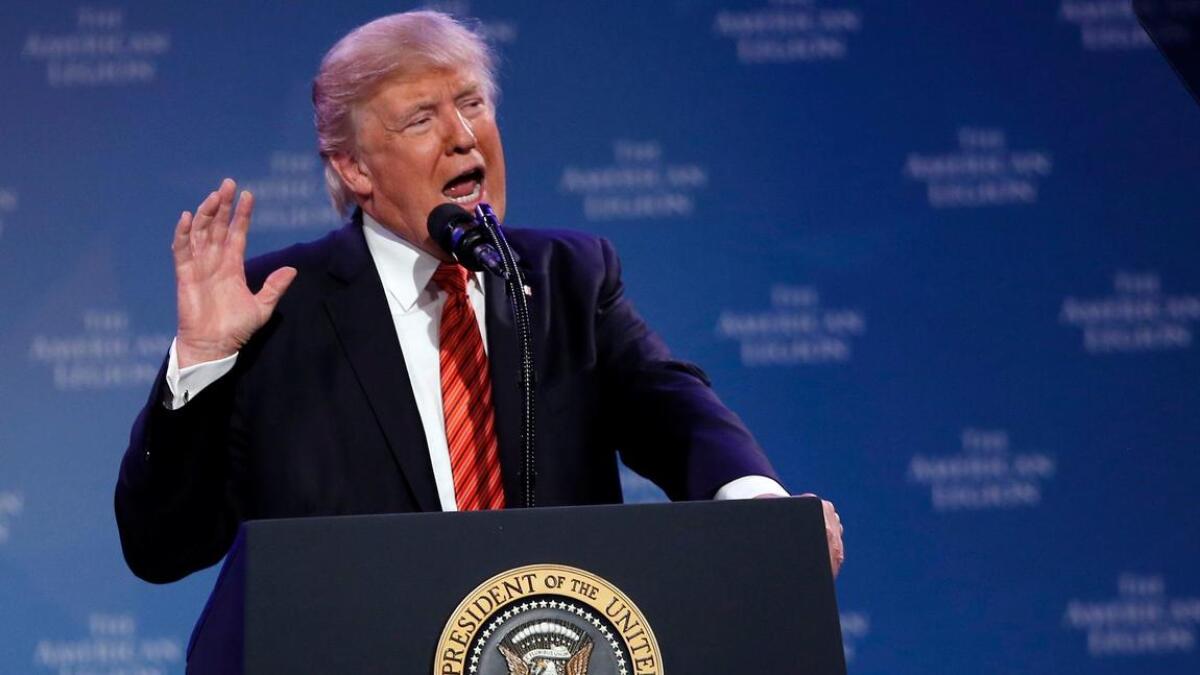
A day after stoking the nation’s racial tensions at a political rally in Phoenix, President Trump set aside his anger and called for healing “the wounds that divide us.”
“We are not defined by the color of our skin, the figure on our paycheck or the party of our politics,” Trump told an American Legion convention Wednesday in Reno. “We are defined by our shared humanity, by our citizenship in this magnificent nation and by the love that fills our hearts.”
Trump’s subdued speech, read from a teleprompter, contrasted sharply with his ad-libbed tirade Tuesday night in Phoenix, where he told cheering supporters that the news media had misreported his reaction to the recent deadly violence at a neo-Nazi and white supremacist protest in Charlottesville, Va.
McConnell pushes back on reports of discontent with Trump; Ryan doubts shutdown over border wall
Senate Majority Leader Mitch McConnell on Wednesday sought to dispel reports of a deteriorating relationship with President Trump, insisting they remain in “regular contact” over shared Republican Party goals.
Issuing such a statement was uncharacteristic for the GOP leader. The quiet Kentuckian rarely responds publicly to Beltway banter, especially stories about political intrigue and intraparty fighting.
But a report in the New York Times, which said the two men had not spoken since Trump berated McConnell in a phone call earlier this month after the collapse of the healthcare bill, provoked a response. The report also said Trump complained that the Senate leader was not doing enough to shield the president from the Russia investigation. The call, made from the president’s golf resort in Bedminster, N.J., reportedly devolved into a profane shouting match.
“The president and I, and our teams, have been and continue to be in regular contact about our shared goals,” McConnell said in the statement.
“We have a lot of work ahead of us, and we are committed to advancing our shared agenda together and anyone who suggests otherwise is clearly not part of the conversation.”
While the two men may be patching up differences, it is clear that Republicans in Congress are no longer looking to Trump for leadership to advance their legislative agenda.
Lawmakers have come to see Trump as unwilling, or unable, to commandeer the traditional presidential role of party leader, failing to utilize the bully pulpit of the White House to power public support around the Republican agenda.
At Trump’s rally Tuesday night in Phoenix, he barely mentioned a top priority on the congressional to-do list -- tax reform -- at the end of a rambling, combative speech that mostly aired old grievances against the media and even Democrat Hillary Clinton.
Instead, Trump promised to go to the mat for federal funding for his own campaign promise, the U.S-Mexico border wall, even threatening a government shutdown for money he previously said would come from Mexico. It is not a priority widely shared by members of his party in Congress.
House Speaker Paul D. Ryan said Wednesday he saw no need for a federal shutdown over the border wall funds, which the House has already approved, as Congress works to secure the money through the fiscal year appropriation bills.
“I don’t think a government shutdown’s necessary and I don’t think most people want to see a government shutdown, ourselves included,” Ryan told reporters at an event in Oregon.
Republicans, who have the majority in Congress, desperately want Trump to help shape their legislative initiatives and bring his hardcore supporters behind their goals.
But they have resigned themselves to the new political reality that Congress must take the lead for an isolated president.
Lawmakers are typically wary of criticizing Trump given his willingness to turn on those in his own party, but many have become more emboldened. They had almost no choice but to speak out after the white supremacist rally in Charlottesville, when Trump suggested the supremacists and those protesting them were equally to blame for the violence. Some Republicans were willing to create distance from Trump for the first time.
McConnell’s office did not respond to a request to clarify when the leader and president last spoke directly.
Sensing the fallout, the White House also pushed back, dismissing reports of the disintegrating relationship, according to talking points being circulated.
“We’re not going to get into the president’s private conversations,” said a statement from the White House. “He looks forward to signing legislation that reforms our tax code, invests in rebuilding our military and constructs a border wall, all goals Senate Republicans share.”
3:30 p.m.: This story was updated to include Ryan’s comments.
Lots of noise, no fireworks, at Trump protest in Reno

Just over 1,000 angry, boisterous, yet largely peaceful protesters on Wednesday welcomed President Trump to Reno, a city thankful to be spared the kind of clashes that erupted the day before during the president’s visit to Phoenix.
The protests on the streets outside the Reno-Sparks Convention Center broke up just under two hours after Trump’s relatively concise speech at the American Legion convention, with police reporting no arrests of serious incidents or any kind.
“I was very happy but not surprised,” Reno Police Chief Jason Soto said.
Soto said more than 100 police officers were stationed on the streets and inside the convention center, an overwhelming show of force to help keep a lid on things. Police officials also met with the main protest organizers over the past week, including Indivisible Northern Arizona, to help avoid any flare-ups, he said.
“It turned out exactly how we planned for it to turn out,” Soto said.
Anti-Trump protesters started pouring into downtown Reno around 10 a.m., an hour before Trump was scheduled to speak, and were penned in on West Peckham Lane, which had been closed off by police.
A much smaller group of pro-Trump supporters were corralled on a separate street, keeping the two sides apart.
Katie Dills clutched a Trump sign as she spent the morning screaming at protesters 20 feet away, calling them a “bunch of baby killers.”
“They believe in abortion and homosexuals, everything that is against God,” said Dills, 40, a homemaker from Reno. “Their eyes are closed to the truth. God put [Trump] there. They’re full of hate.”
Trump supporter John Franklin Smith was a little less hostile, but just as loud. Draped with an American flag, he spent a half-hour screaming at protesters.
“We just came here to support the president,” said Smith, an Army veteran from Reno. “None of us are white supremacists; none of us are Nazis. We’re American citizens.”
But Silke Pflueger, a retired engineer and member of the activist group Indivisible in Truckee, Calif., said the fervor whipped up by Trump has some disturbing similarities to what happened in her native Germany during the mid-20th century.
“I think it’s very much the same situation,” Pflueger said, and then took a jab at Trump’s “Make American Great Again” campaign slogan. “Hitler came into power to make Germany great again after World War I.”
She said her own grandparents never spoke out when Hitler rose to power, and she promised herself never to make that mistake.
Protest organizer Laynette Evans of Indivisible Northern Nevada said she doubts the protest will have much of an impact on Trump. But she said she hopes it will influence Republicans representing Nevada. That includes U.S. Sen. Dean Heller, who was a target of Trump’s wrath when he opposed the GOP’s initial effort to repeal and replace the Affordable Care Act.
“We want Trump to go,” Evans said. “We would like Heller to hear our message. He’s got to stand up.”
After Trump’s speech, Ron Abbe, an American Legion member who now lives in Puerto Vallarta, Mexico, said the president received a warm welcome inside. Abbe, a Trump supporter, didn’t mind seeing all the protests when he walked outside the hall.
“They have a right to say what they like,” said Abbe, a Marine Corps veteran. “They’re not burning flags. They’re not stepping on flags. They’re respectful.”
By early afternoon, traffic was flowing on Reno streets that had been blockaded with giant dump trucks all morning.
Media report says U.S., Canadian diplomats in Cuba may have suffered brain damage
The mystery over why U.S. and Canadian diplomats in Cuba have developed hearing loss and other symptoms deepened Wednesday after a media report suggested they may have suffered brain damage.
Some officials believe the diplomats were injured by sonic waves from listening devices hidden in their homes or workplaces in Havana, but that has not been confirmed.
It is still not clear who planted the devices, and whether they were intended to cause harm.
“This is unprecedented,” State Department spokeswoman Heather Nauert said. “We have not seen this anywhere.”
Cuba has denied any responsibility and is cooperating with U.S. and Canadian investigators, she said.
CBS News reported Wednesday that it had reviewed medical records of some of the people affected. It said doctors had diagnosed mild traumatic brain injury and damage to the central nervous system.
The diplomats began reporting health problems, including hearing loss and dizziness, in December. Several cut short their assignments in Cuba because of the symptoms.
Secretary of State Rex Tillerson has cited the “health attacks” on diplomats but has not provided details. The State Department will not say how many Americans were affected.
U.S. withholding aid to Egypt over human rights issues
Despite President Trump’s warm embrace of Egyptian President Abdel Fattah Sisi, the United States has held back a substantial amount of foreign aid because of the country’s human rights abuses.
State Department officials said Wednesday that around $195 million was held in abeyance and another $100 million redirected to other entities.
Egypt is the world’s second-largest recipient of U.S. aid at about $1.3 billion annually.
“We were unable to certify” that Egypt had obeyed rules of human rights and democracy, State Department spokeswoman Heather Nauert said.
The money “will be held until we see progress on democracy,” she added. She cited, among other concerns, a law in Egypt that restricts the work of nongovernmental groups that often promote democracy and human rights.
It was not surprising to anyone who has followed Egypt that the country would be found to be an egregious abuser of human rights. It was more surprising that the Trump administration, which has at times chosen to overlook human rights issues in its dealings with strategic allies, would notice and take punitive action.
When Sisi in April became the first Egyptian leader to be received at the White House since 2009, Trump praised his “great friend and ally” who was doing a “fantastic job in a very difficult situation.”
Sisi’s government has been accused of killing, jailing or torturing tens of thousands of opponents.
Egyptian officials were furious at the U.S. action on aid, and briefly refused to receive a U.S. delegation that included President Trump’s son-in-law, Jared Kushner. The meetings eventually were rescheduled and took place, U.S. officials said.
Kushner is in the Middle East as part of his effort to promote peace between Israel and the Palestinians.
Nauert said the Egyptians were not caught off guard, as some seemed to suggest, and had been informed of the U.S. decision with ample warning.
That didn’t stop their anger, however.
“Egypt sees this measure as reflecting poor judgment of the strategic relationship that ties the two countries over long decades and as adopting a view that lacks an accurate understanding of the importance of supporting Egypt’s stability,” the foreign ministry said in a statement.
Fired FBI chief Comey joins Howard University for public policy lecture series
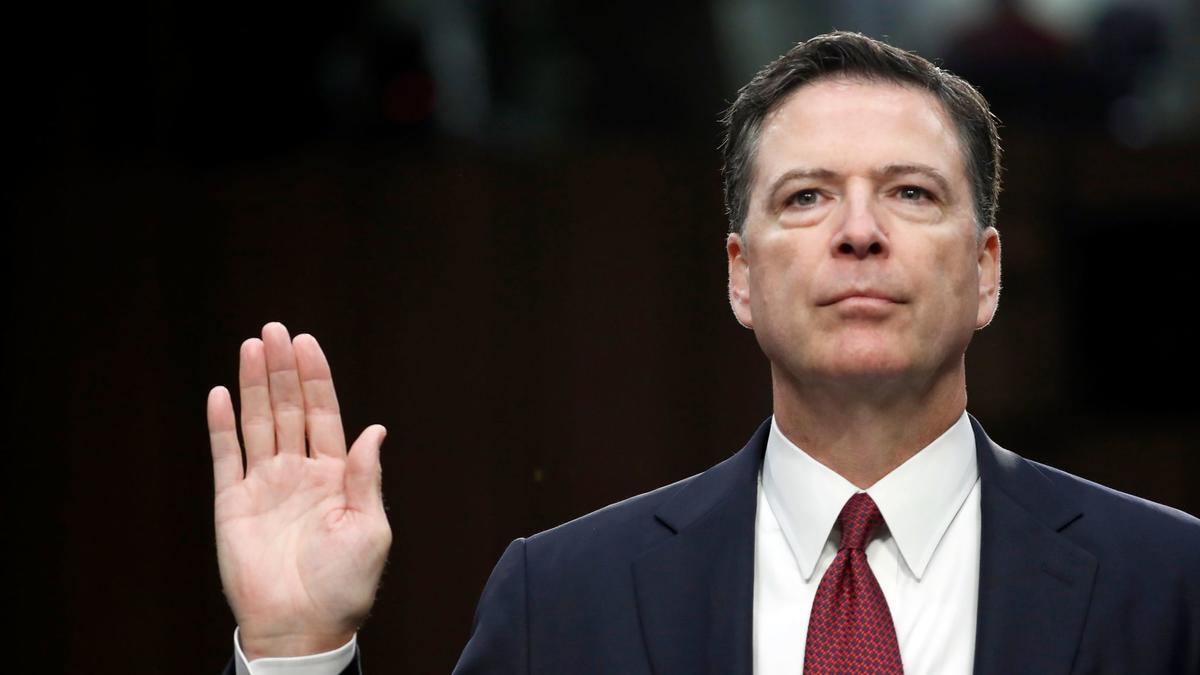
James Comey has a new gig not far from his old office atop the FBI headquarters.
Comey, who was fired as FBI chief in May, will deliver the convocation keynote address next month to students at Howard University, a historically black university in northwest Washington.
He also will give five lectures on public policy as the newly-appointed Gwendolyn S. and Colbert I. King Endowed Chair in Public Policy.
Howard will pay Comey $100,000 that he said he will donate to a scholarship fund for students from foster homes.
“Few in public life are better suited for this role than the experienced and esteemed Jim Comey,” the school said in a statement.
Comey is writing a book that is due for release next spring, but he has kept a relatively low profile since he testified before the Senate Intelligence Committee in June, a month after President Trump abruptly fired him.
In his testimony, Comey detailed five times when he said he had privately met with or spoken by phone with Trump. He said the president demanded “loyalty” from him and pressed him to end the FBI investigation of Michael Flynn, Trump’s former national security advisor.
Until his dismissal, Comey led the FBI’s investigation into Russian meddling in the 2016 election, and whether the Trump campaign had coordinated with Russian intelligence, allegations that Trump has fiercely denied.
The president’s decision to fire Comey caused such an uproar that the Justice Department appointed a special counsel, Robert Mueller III, to ensure the investigation would continue.
No word yet on what Comey will say during Howard’s convocation on Sept. 22.
Keeping protesters cool at Trump’s Reno rally. ‘Everyone deserves water’

Ian Bigely -- yes, he’s heard the jokes -- doesn’t like Donald Trump much, and when he heard last week that the president was coming to Reno, he decided he would bring water for everyone – even supporters of the man he loathes.
“I may argue with them, but I won’t turn them down,” Bigely said. “Everyone deserves water.”
So he and Eden Gutierrez set up a stand outside the Reno-Sparks Convention Center with a sparkling jug of water filled with cucumber, lemon slices and ice. As things heated up, the line started forming for cool relief.
“How much is it?” a woman asked.
“Free,” Bigely said.
The woman -- a Trump protestor -- looked startled. And then smiled.
“How un-American,” she said before grabbing a plastic cup and disappearing into the crowd. More and more came and quenched their thirsts before heading back to the crowd gathered in the street to chant their opposition to Trump.
Bigely said they hoped to keep protestors hydrated throughout the president’s appearance and until the last person was gone. He said they had plenty of iced coffee, but the water was disappearing fast. So far, he said he hadn’t seen a Trump supporter come to take advantage of their offer.
If they, did though, he said he might not be able to risk taking a jab at them.
“I’d let them know that this water was oil-free,” he said.
Reno streets remain fairly quiet shortly before Trump speech at American Legion convention

With President Trump’s speech to the American Legion convention less than an hour away, the streets of Reno remained relatively quiet Wednesday morning — nothing like the protests in Phoenix the day before.
Fewer than 100 protesters were gathered outside the Reno-Sparks Convention Center, where Trump was to deliver his address, but Reno police expect the crowd to swell to at least several hundred.
Jeffrey Mehoves, 61, a Vietnam veteran and retired deputy sheriff from Sparks, said he came out to voice his anger about Trump’s attempt to ban transgender soldiers from the military.
“I don’t believe Trump has the right to tell people they cannot serve this country, no matter if they’re gay, transgender or whatever,” Mehoves said. “Especially when he never served.”
Police used dump trucks to close the streets surrounding the convention center and used temporary barricades to keep protests away from the hall where Trump will speak. Authorities also plan to corral protesters and pro-Trump counter-protesters in separate areas to avoid any conflict.
Thus far, many protesters were denouncing Trump, shouting “No hate, not Trump” and “Impeach 45” at South Virginia Street and West Peckham Lane in the shadow of the Atlantis Casino.
American Legion members filing into the hall Wednesday morning said they had no problem with seeing people march in the streets.
“Happy protest day. That’s what we fought for,” said Tom Goodin of Jefferson City, Mo., a Marine Corps veteran who served in Vietnam.
Goodin declined to say if he voted for Trump, saying that’s his own business, but said he’s happy with the president’s record on military and veterans issues. At the American Legion convention, Trump is expected to sign reforms to improve care in the Veterans Administration healthcare system.
“As veterans, we respect and support the office,” Goodin said of the president. “I support anyone that takes care of the troops over there and veterans.”
Rick Johnson of Ft. Lauderdale, Fla., an Army tank officer who served in Iraq, said U.S. troops have been fighting in Iraq and Afghanistan far too long. Instead of increasing U.S. troops, he’d like to see America’s allies pick up the slack, he said.
“Trump’s right. We need to get other countries to help out and to finance this thing,” said Johnson, 61.
Trump said the government is doing a ‘phenomenal job’ on illegal immigration. Not really
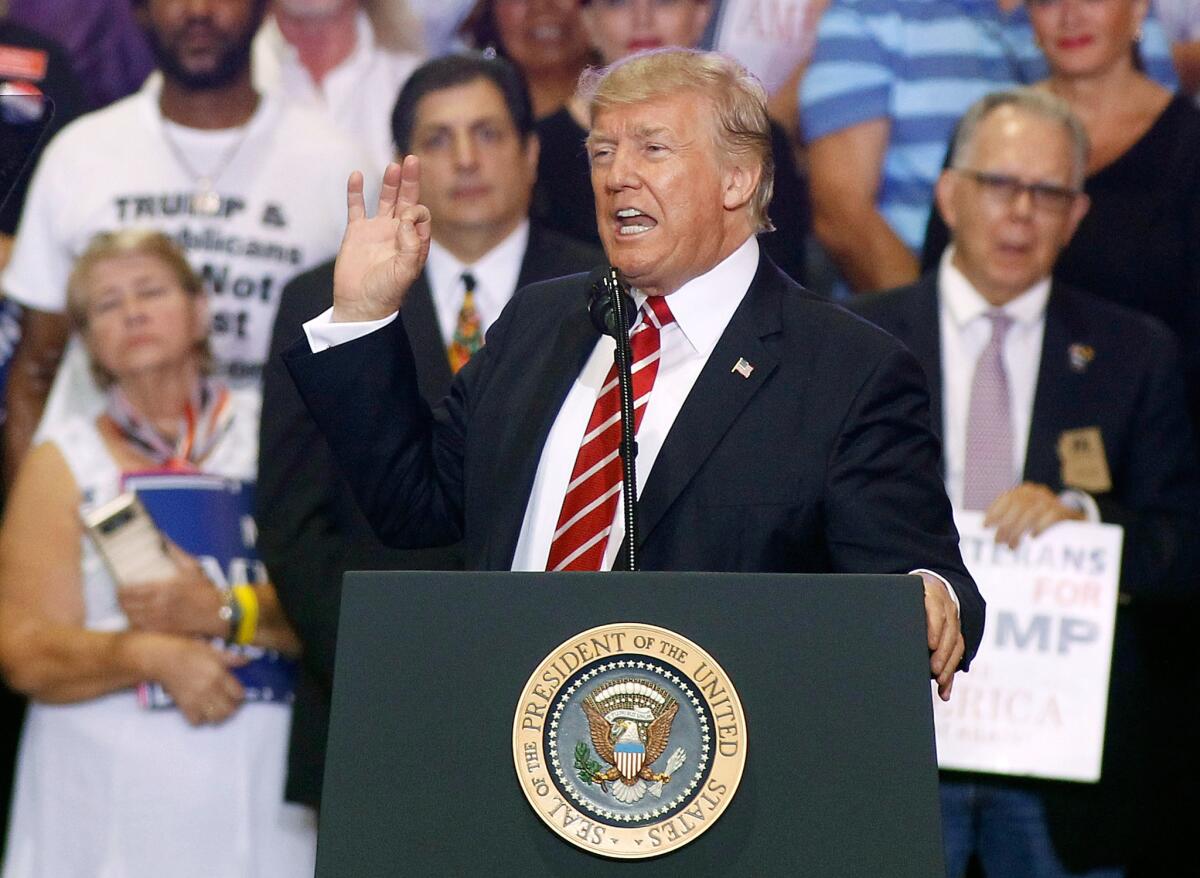
During his Tuesday night rally in Phoenix, President Trump brought up many of his campaign promises — including illegal immigration.
“We are doing a phenomenal job of putting a stop to it,” Trump told hundreds at the Phoenix Convention Center.
Actually, seven months later after Trump entered the White House, construction of his proposed wall on the U.S.-Mexico has yet to begin, the number of Border Patrol officers has dropped by 220, and immigration agents are on track to deport 10,000 fewer people this year than in President Obama’s last year in office, the latest figures show.
U.S. credit rating at risk if debt limit is not raised in a ‘timely manner,’ Fitch warns
The United States’ credit rating is at risk if the $19.9-trillion debt limit is not raised “in a timely manner” before the Treasury runs out of cash in October, Fitch Ratings warned on Wednesday.
“Brinkmanship over the debt limit could ultimately have rating consequences, as failure to raise it would jeopardize the Treasury’s ability to meet debt service and other obligations,” Fitch, one of the three leading credit-rating companies, said after President Trump on Tuesday raised the possibility of a government shutdown over funding a Mexican border wall.
Federal spending is only authorized through Sept. 30 as Congress works to pass a new budget and faces a potential showdown over funding for the wall, which Trump had vowed during his campaign would be paid for by Mexico.
A government shutdown “would not have a direct impact” on the nation’s AAA rating, “but it would highlight how political divisions pose challenges to the budgetary process,” Fitch said.
Failure to raise the debt limit, however, would threaten that top-level credit rating, even if the Treasury Department were to try to prioritize its debt payments, Fitch said.
‘My skin crawled’: Hillary Clinton says Trump’s debate shadowing made her want to shout, ‘Back up, you creep’
Hillary Clinton says Donald Trump’s pacing, hovering demeanor onstage during their October 2016 presidential debate made her so uncomfortable “my skin crawled.” She says in her upcoming book that Trump shadowed her so closely that she had to resist shouting out, “Back up, you creep, get away from me.”
In the book, the Democratic presidential nominee recounts her struggle to keep composed during that pivotal Oct. 9 faceoff in St. Louis, less than a month before the election. Two days earlier, their bitter campaign was rocked by the release of footage in which Trump bragged aggressively about groping women.
During the town-hall style debate, the 6-foot-3 Trump repeatedly hovered over Clinton, who’s closer to 5-foot-5, as she responded to questions.
“This is not OK, I thought,” Clinton says in her audio narration of “What Happened,” set for release Sept. 12. “It was the second presidential debate, and Donald Trump was looming behind me. Two days before, the world heard him brag about groping women. Now we were on a small stage and no matter where I walked, he followed me closely, staring at me, making faces. It was incredibly uncomfortable. He was literally breathing down my neck. My skin crawled.”
What the record shows on whether Steve Mnuchin and Louise Linton really ‘give more to the economy’ than they took
Louise Linton, the wife of Treasury Secretary Steve Mnuchin, already has apologized for a certain nasty Instagram post aimed at a citizen who criticized her for bragging about her designer wardrobe during an official trip with her husband.
We’re not as interested in the controversy over Linton’s Instagram posts per se, one of which was a childish outburst directed at Jenni Miller, an Oregon woman who had tagged Linton’s original post as “#deplorable.” We’re more interested in Linton’s comments about the economic contributions she and her husband make.
“Have you given more to the economy than me and my husband?” Linton asked Miller. “Either as an individual earner in taxes OR in self sacrifice to your country?...Pretty sure the amount we sacrifice per year is a lot more than you’d be willing to sacrifice if the choice was yours.”
These are substantive assertions subject to factual analysis. So let’s ask: How much have the Mnuchins “given” to the economy? Are they paying their fair share of taxes? Are they sacrificing?
Egyptian president to meet with Jared Kushner, but meeting with foreign minister is canceled
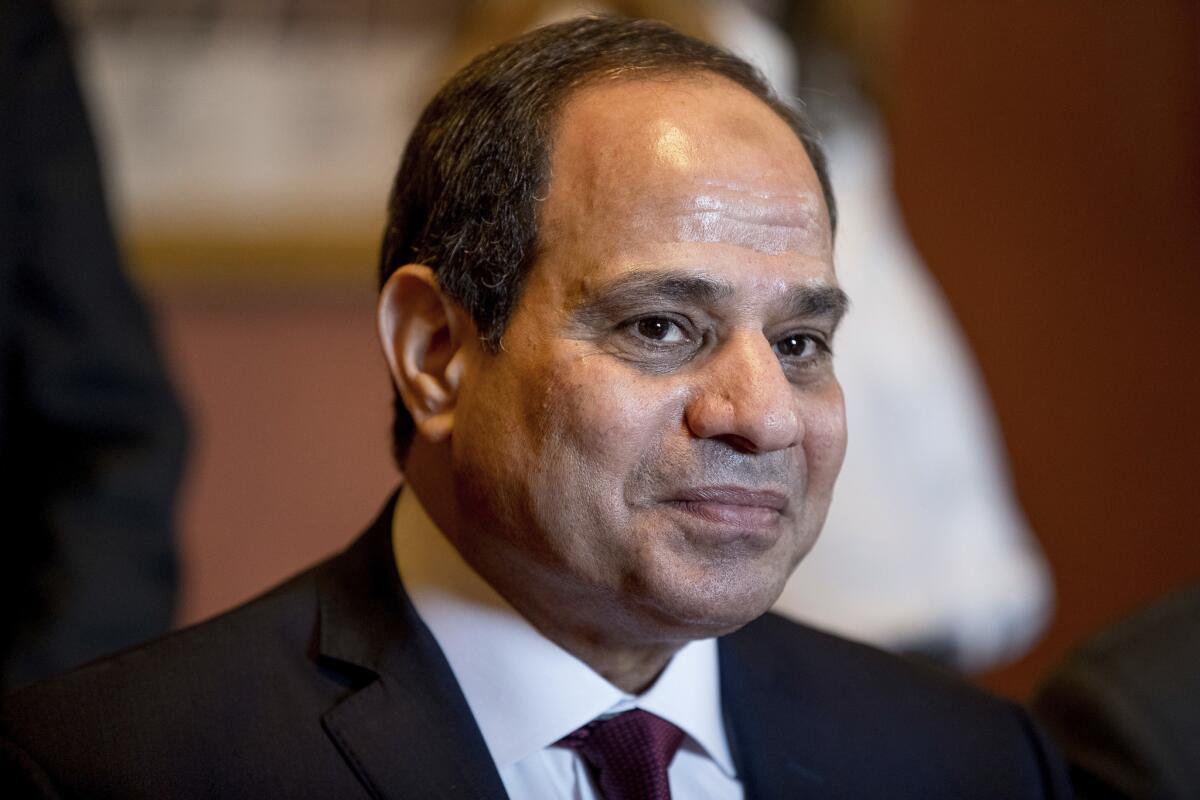
Egyptian officials said President Abdel Fattah Sisi would meet Wednesday with a U.S. delegation led by Jared Kushner, though a separate meeting with the country’s foreign minister was canceled after the Trump administration decided to withhold millions of dollars in aid.
Kushner, President Trump’s son-in-law and advisor, and others, expected to meet with Sameh Shoukry, Egypt’s foreign minister, but an updated version of Shoukry’s schedule distributed Wednesday made no mention of the meeting, with no explanation given regarding the change.
Kushner is on a Middle East tour aimed at reviving Israeli-Palestinian peace talks.
The schedule change followed a statement from Cairo indicating it regretted the U.S.’s decision to reduce funds given to Egypt.
“Egypt considers this step as a misjudgment of the nature of the strategic relations that binds the two countries over decades, and reflects the lack of understanding of the importance of supporting the stability and success of Egypt,” said the statement. “It… implies a mixing of cards that may have negative repercussions on achieving Egyptian-American common interests.”
The Trump administration on Tuesday cut almost $100 million in military and economic aid to Egypt and withheld nearly $200 million in aid.
Egypt’s military, seen as a crucial security partner by the U.S., receives $1.3 billion per year from Washington, second only to Israel. It also receives tens of millions of dollars in economic assistance.
Trump fills Phoenix speech with charged language, accusing media and fellow Republicans of failings
As protesters massed on the streets of Phoenix, President Trump on Tuesday unleashed a vitriolic 76-minute speech mocking those who considered his response to the Charlottesville white supremacist march racist, adopting racially charged language and hinting that he would pardon former Arizona Sheriff Joe Arpaio, long accused of brutality against Latinos.
He reread for more than 16 minutes the remarks he had uttered after violence in Virginia claimed the life of a woman protesting the white supremacists, omitting the remarks in which he said that both sides were to blame and occupied the same plane in his view.
“The words were perfect,” he said.
But even as he sought to dismiss one racially fraught controversy, he ignited another with words that seemed to promise a pardon to Arpaio, who last month was convicted of contempt of court for refusing to halt his habit of stopping Latinos based solely on a suspicion that they might be living in the United States without proper papers.
China denounces U.S. sanctions on North Korea trade
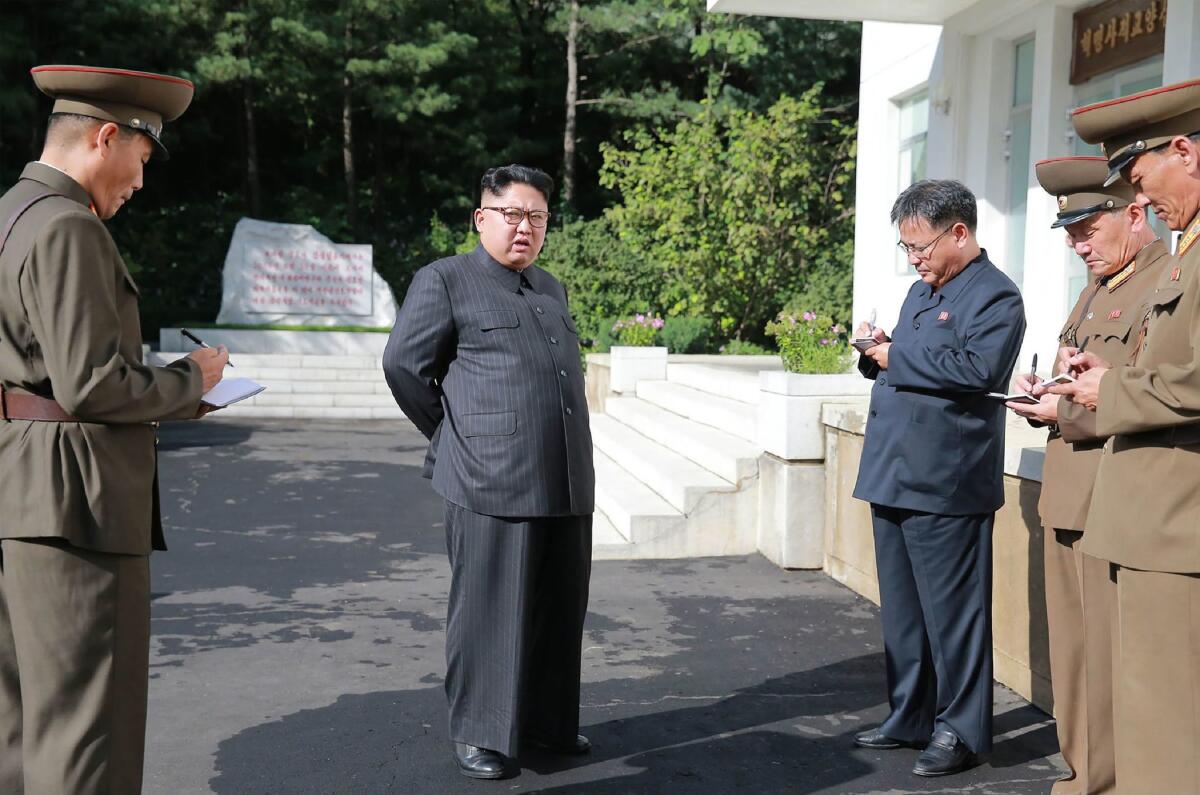
China on Wednesday denounced new U.S. sanctions linked to North Korea trade, accusing the Trump administration of “long-arm jurisdiction” that unfairly targets Chinese companies and threatens Beijing’s cooperation in reining in the rogue state.
The Treasury Department on Tuesday slapped sanctions on 10 firms and six individuals, mostly from China and Russia. U.S. officials aim to sever economic ties that allow North Korea to advance its weapons program.
“We urge the U.S. side to stop this wrongdoing and correct this immediately,” Chinese Foreign Ministry spokeswoman Hua Chunying told reporters.
The U.S. action follows a unanimous United Nations resolution last month to impose tougher sanctions on North Korea. The isolated nation recently tested its first two intercontinental ballistic missiles.
The latest sanctions largely target companies that allegedly buy or sell resources, such as coal or metals, which could aid in nuclear weapons development. A Chinese company in Africa was sanctioned for enabling the hires of North Korean workers; one in northeastern China was accused of facilitating financial transactions on behalf of North Korea’s proliferation network.
The Chinese government insisted it implements the Security Council resolutions and would punish companies that violate sanctions. Earlier this month, China suspended imports of coal, iron and lead ores, and seafood products.
China opposes unilateral sanctions outside the Security Council, Hua said, especially “long-arm jurisdiction over Chinese entities and individuals.” The U.S. actions “are not helpful in solving the problem and unhelpful to mutual trust and cooperation.”
The U.S. views China, North Korea’s economic lifeline, as key to preventing further missile development. China is responsible for about 90% of its neighbor’s international trade. And while Beijing has increased periodic bans on certain goods, its border has proved porous -- a quick drive over the Yalu River.
China fears Pyongyang’s economic collapse would trigger a refugee crisis on its border and a united, democratic Korea at its doorstep. It has repeatedly urged dialogue and negotiations.
“From the Chinese perspective, these sanctions are ridiculous because those enterprises engaged with North Korea before the Security Council resolution,” said Shi Yinhong, a professor of international relations at Renmin University in Beijing. “China will not accept this kind of punishment.”
The U.S. government has long used sanctions as a tool against the hermit kingdom’s nuclear ambitions, but the Trump administration has increased its urgency as North Korea inches closer to developing weapons capable of reaching California.
It’s unclear, once again, whether they will work. An editorial by Chen Weihua, deputy editor of China Daily’s U.S. edition, said these so-called secondary sanctions would have no effect on North Korea. Instead, they will “undermine cooperation” between the world’s two largest economies.
America’s “past track records have shown that the majority of sanctions not only failed but caused humanitarian disasters in other countries,” he said.
U.S. officials stopped short of previous threats to sanction Chinese banks, suggesting they still anticipate Beijing’s help with Pyongyang.
“Trump’s China strategy is that everything relates to China’s behavior on North Korea,” Shi said. “This could spoil the Sino-American relationship. It already has.”
Outside Trump’s rally, thousands take to the streets in mostly peaceful protests
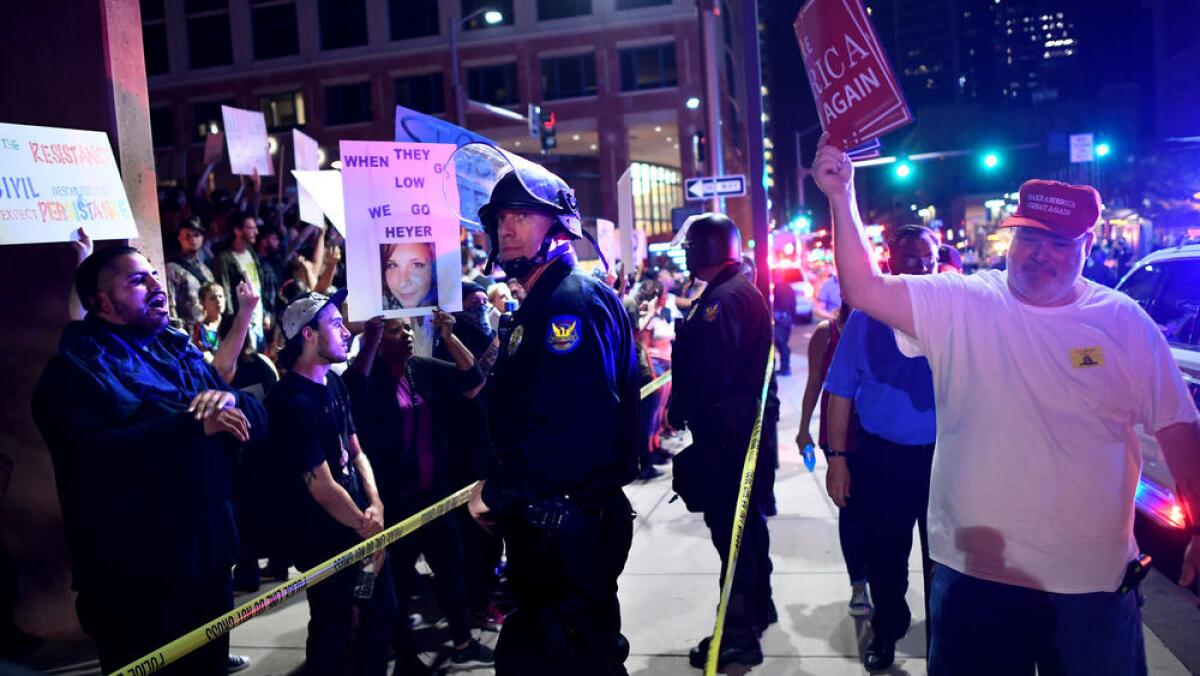
Thousands of protesters gathered here Tuesday outside a campaign-style rally by President Trump, engaging his supporters in shouting matches over whether he harbors racist views.
The demonstrations remained peaceful until the end of the rally, when some protesters tried to break through barricades near an entrance to the convention center where Trump was finishing his speech. Police, who said some protesters had thrown rocks and bottles at them, used tear gas to disperse the crowds.
Hanging over the city all day was the shadow of Charlottesville, Va., and Trump’s recent assessment that “both sides” were to blame for the violence at a recent rally there by white nationalists and his comments that “some very fine people” were marching alongside neo-Nazis.
In an effort to prevent the Phoenix demonstrations from turning violent, authorities called in extra officers and put the National Guard on the ready.
Phoenix police deploy tear gas on protesters as Trump rally ends
After hours of largely peaceful protests, clashes broke out Tuesday night between police and protesters at a rally held by President Trump in downtown Phoenix.
Once the president’s speech was done, some protesters attempted to move barricades that were holding back the anti-Trump crowds. Police issued a warning, then fired tear-gas canisters. Thick plumes of smoke filled the air.
“Some people in the crowd began fighting and throwing rocks and bottles at police,” said Phoenix police spokesman Sgt. Jonathan Howard, who said officers “reportedly dispersed gas into the area.”
In an earlier tweet, the Police Department said officers were “addressing criminal behavior near 2nd St. & Monroe,” which is the northwest corner of the convention center where Trump spoke.
American Civil Liberties Union lawyers offered to aid those who felt their rights had been violated.
“Between Trump’s attacks on the press and Phoenix PD’s attacks on protesters, this has not been a good night for the 1st Amendment,” tweeted the national ACLU deputy legal director, Cecillia Wang.
“This is crazy, so crazy. Everything was great until the end,” said Phoenix resident Mira Ramirez, 20, who came to protest against the president.
Some demonstrators donned gas masks as the air thickened with smoke.
After the initial round of tear gas, most protesters dispersed from the convention center area. However, several dozen remained and congregated in the street a few blocks away. A police helicopter circled overhead, warning them at least half a dozen times to leave. Finally, after about 45 minutes, the scene was clear.
Police said later there were four arrests.
UPDATE 10:59 p.m.: The post was updated with news of four arrests.
UPDATE 10:20 p.m.: The post was updated with the dispersal of most of the last protesters.
UPDATE 9:29 p.m.: The post was updated with statements from police and the American Civil Liberties Union.
Trump defends remarks on Charlottesville violence, slams ‘crooked media’ on race
President Trump blamed the news media Tuesday for the uproar over his equivocal reaction to the recent deadly violence at a rally of neo-Nazis and white supremacists in Charlottesville, Va.
Speaking at a campaign-style rally in Phoenix, Trump reviewed his public statements on the matter, but omitted the ones that sparked outrage across the political spectrum.
Trump read verbatim -- almost -- some of the remarks that he has made deploring right-wing extremists and accused the media of ignoring them.
“I hit ’em with neo-Nazi,” he said. “I hit ’em with everything. I got the white supremacist, the neo-Nazi. I got ’em all in there. Let’s see. KKK? We have KKK. I got ’em all. So they’re having a hard time. So what did they say, right? ‘It should have been sooner; he’s a racist.’”
But what actually offended many people were Trump’s statements faulting “many sides” for the violence in Charlottesville, along with his comment that some “very fine people” were among the white supremacists and neo-Nazis protesting the town’s removal of a Robert E. Lee statue.
Trump didn’t mention that part Tuesday night.
Trump told the cheering crowd that it was “time to challenge the crooked media deceptions.”
“By the way, they are trying to take away our history and our heritage,” he added, renewing his criticism of efforts to take down monuments to the Confederacy.
Turning to race relations in the United States, Trump said, “I have to say, they were pretty bad under Barack Obama, that I can tell you.”
Trump also hinted that he might pardon former Maricopa County Sheriff Joe Arpaio, whose harsh immigration enforcement tactics in Arizona have long drawn controversy.
“So was Sheriff Joe convicted for doing his job?” Trump asked the crowd, which burst into cheers.
Arpaio was recently found guilty of contempt of court for defying a judge’s 2011 order directing him to stop racially profiling Latinos during patrols and turning them over to federal immigration officials.
“I’ll make a prediction,” Trump told his supporters in Phoenix. “I think he’s going to be just fine, OK?”
Supporters pack Phoenix arena as Trump prepares to take stage
Justice Department drops bid to collect information on visitors to website involved with Inauguration Day protests
The Justice Department has dropped its request for digital addresses that could identify more than 1 million visitors to a website involved with organizing protests on President Trump’s Inauguration Day.
Government lawyers wrote in a court filing Monday they had “no interest in records relating to the 1.3 million IP addresses” of site visitors, but wanted information on the planning, coordinating and participation of the protests.
“The government values and respects the 1st Amendment right of all Americans to participate in peaceful political protests and to read protected political expression online. This warrant has nothing to do with that right,” the filing said.
The move marks a change in the Trump administration’s previous attempts to gather information on those who protested during Trump’s swearing-in on Jan. 20.
The Justice Department obtained a search warrant in July for information regarding the website disruptj20, hosted by DreamHost and associated with the Inauguration Day protests that led to more than 200 criminal cases.
DreamHost refused to comply with the warrant, saying it violated its 1st and 4th Amendment rights because it would require releasing contact information, email addresses and photos of people who had visited the website to “exercise and express political speech. That should be enough to set alarm bells off in anyone’s mind.”
An amended warrant specified that the government would only request information from July 1, 2016, to Jan. 20, 2017, the day of the protests, and that DreamHost should not include unpublished materials or records.
The government said it would seal any information it did not use and that it was not trying to “identify political dissidents of the current administration.”
DreamHost said in a statement that the Justice Department shift marked a “huge victory for Internet privacy,” but that there were still constitutional concerns with the warrant.
The government initially sought to compel DreamHost to release the information on July 28. A hearing is scheduled Thursday before District of Columbia Superior Court Chief Judge Robert E. Morin.
Undaunted by protests, Trump backers await president in Phoenix
‘No Trump, no KKK, no fascist USA!’ Protesters chant before Trump rally in Phoenix
Protesters numbering a few dozen in the morning have grown to the thousands in downtown Phoenix ahead of President Trump’s evening rally at the city’s convention center.
“No Trump, no KKK, no fascist USA!” a group chanted as it arrived at the city center in sweltering 107-degree weather just hours before the president was set to speak during his first major event in the West since his inauguration.
“Resist,” “Lock him up” and “Down with white supremacy,” read signs among demonstrators.
Trump supporters await ‘the greatest show on Earth’ in Phoenix — a Trump rally

Hours before President Trump was set to arrive here in Phoenix on Tuesday, several hundred supporters sipped water and sought out the shade of mesquite trees as they waited in a line that snaked down a side street of the convention center.
Ross Hubbard held his navy blue “Make America Great Again” hat as he fanned his face with a leaflet.

“This is America right here … a great day, what a time to be alive,” the 45-year-old Phoenix resident said as stood in the 105-degree heat. “This will be the greatest show on earth tonight.”
Hubbard owns his own company — Pur Beverage — and said that he’s never been more excited to be a Republican than right now.
“Trump has hit a lot of politicians in the mouth, and that’s refreshing,” he said.
He lauded the president’s Supreme Court pick — one of the president’s few major accomplishments in his first six months in office.
“Obstructionists are why the other stuff isn’t getting done,” Hubbard said.

Sharon Miller, 62, traveled from her home a short drive to the east in Mesa, Ariz.
“I’m so tired of everyone acting like they’re doing something so brave by standing up to our president ... they’re not,” she said. She was referring to pushback against Trump for, among other things, blaming “both sides” in the recent violence in Charlottesville, Va.
No pardon for Arpaio tonight, White House says
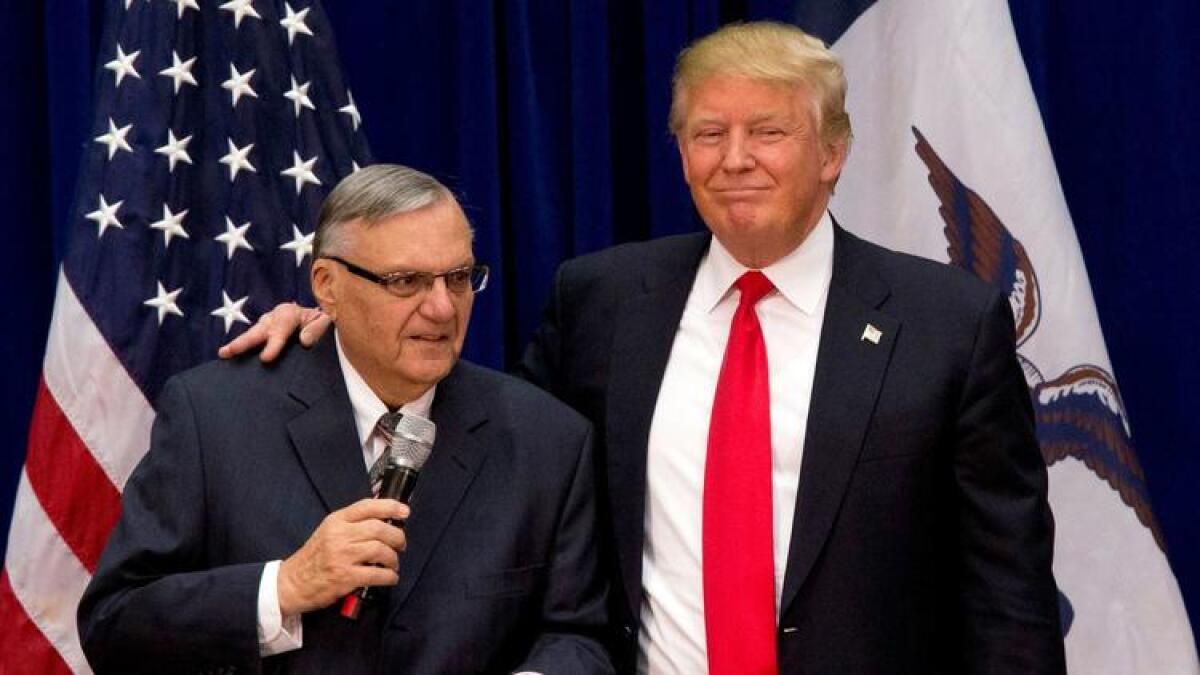
Former Maricopa County Sheriff Joe Arpaio won’t be getting a pardon tonight, the White House announced as President Trump flew to Arizona for a visit to the border and a campaign-style rally.
“There will be no discussion of that today at any point, and no action will be taken on that front at any point today,” White House Press Secretary Sarah Huckabee Sanders told reporters on Air Force 1 as Trump flew west.
Trump fueled speculation about a pardon earlier this month when he told a Fox News contributor that he was considering the step for Arpaio, whose immigration enforcement tactics drew legal and political scrutiny long before Trump’s rise in politics.
Arpaio recently was found guilty of contempt of court for defying a judge’s order, issued in 2011, which directed him to stop racially profiling Latinos during patrols and turning them over to federal immigration officials. He’s scheduled for sentencing in October.
Earlier this week, a White House official had said a pardon at this stage of the proceedings was “very unlikely.”
Tillerson notes signs of ‘restraint’ in North Korea and hints at dialogue
Secretary of State Rex Tillerson on Tuesday voiced a rare note of optimism in the North Korea nuclear crisis, saying ruler Kim Jong Un may be showing signs of restraint that could lead to dialogue.
Tillerson noted that North Korea had not launched a ballistic missile nor done other “provocative acts” since the United Nations Security Council voted unanimously on Aug. 5 to impose blistering economic sanctions on Pyongyang.
“I’m pleased to see that the regime in Pyongyang has certainly demonstrated some level of restraint that we’ve not seen in the past,” Tillerson said in a briefing with reporters at the State Department convened primarily to discuss the Trump administration’s plans for Afghanistan.
He expressed hope that such restraint was “the beginning of this signal that we’ve been looking for.”
“Perhaps we are seeing our pathway to some time in the near future to having some dialogue,” Tillerson said, adding that he still wanted to see more signs but also thought it important to acknowledge the steps taken.
Though sanctions have been used repeatedly to punish and isolate North Korea over the last two decades, the U.N. package was described as the most severe. If enforced, the penalties could cut that country’s export income by one-third, around $1 billion.
Before the U.N. Security Council’s action, North Korea had launched two intercontinental missiles within a few weeks of each other in July.
That led to particularly belligerent rounds of threats from North Korea state media and President Trump, who at one point vowed “fire and fury” against North Korea and then warned that U.S. military weapons were “locked and loaded.”
Earlier Tuesday, the United States had imposed a separate round of sanctions on 16 Chinese and Russian companies and individuals accused of working with North Korea.
More U.S. sanctions on Russian, Chinese firms accused of working with North Korea
The Trump administration on Tuesday imposed a new round of economic sanctions on Russian and Chinese companies and individuals who it said are working with North Korea.
Sanctions have served as the cornerstone of U.S. efforts to isolate North Korea economically and diplomatically over the last two decades as the country has developed and tested nuclear weapons and ballistic missiles.
The United Nations Security Council supports the efforts, voting unanimously this month for a package of additional sanctions after North Korea successfully tested two intercontinental ballistic missiles.
After North Korean media said the country’s autocratic ruler, Kim Jong Un, was considering a plan to send four ballistic missiles into waters off Guam, President Trump warned that he could unleash “fire and fury” if North Korea attacked the U.S. territory.
Kim shelved the plan, at least for now, and tensions eased. His government has denounced annual U.S.-South Korean military exercises that began Monday, but without adding a specific threat of attack.
The newest Treasury Department sanctions target 10 firms and six individuals, all from China or Russia. The sanctions mean U.S. authorities can freeze any assets the targets have in the United States, and U.S. companies and people are barred from doing business with them.
Among those blacklisted are a company based in Hong Kong accused of helping finance Pyongyang’s ballistic missile program; three Chinese coal companies that the U.S. says imported nearly $500 million in North Korean coal between 2013 and 2016; and a Chinese firm based in Africa that facilitates the employment of North Korean workers, whose wages go to Kim’s government.
Three Russians who run a company that exports oil to North Korea also were targeted, administration officials said.
“Treasury will continue to increase pressure on North Korea by targeting those who support the advancement of nuclear and ballistic missile programs, and isolating them from the American financial system,” Treasury Secretary Steven T. Mnuchin said in a statement.
“It is unacceptable for individuals and companies in China, Russia and elsewhere to enable North Korea to generate income used to develop weapons of mass destruction and destabilize the region,” he added.
Pentagon chief says new strategy for Afghanistan will replicate tactics used against Islamic State
U.S. Defense Secretary James N. Mattis said Tuesday that the new strategy for Afghanistan will try to replicate “a lot” of the tactics that have successfully pushed Islamic State from large parts of Iraq and Syria since 2014.
Key to those campaigns has been a willingness to embed U.S. advisors closer to the front lines to help ground assaults by Iraqi security forces and Syrian militias. The advisors help on battlefield strategy and coordinate airstrikes on enemy targets.
But Mattis said he is still awaiting a detailed plan from Gen. Joseph F. Dunford, chairman of the Joint Chiefs of Staff, for how to implement the strategy that President Trump announced Monday night.
Trump has given Mattis authority to send about 4,000 more troops, adding to 8,400 U.S. forces already deployed to Afghanistan. But during a previously unannounced visit to Baghdad, Mattis said he won’t decide a precise figure until he gets Dunford’s plan.
“When he brings that to me, I will determine how many more we need to send in,” Mattis said. “It may or may not the number that is bandied about.”
Trump disclosed few details about his plan to again deepen U.S. involvement in the nearly 16-year-old U.S. war against an array of Islamist insurgents who have gained ground against the central government in Kabul.
The Taliban now controls or contests more than 40% of Afghan territory — more ground than at any point since the U.S.-led invasion in 2001 toppled the militants from power, according to recent United Nations estimates.
Trump said he won’t provide a “blank check” for U.S. support to the Afghan government, but added he didn’t want to be hemmed in by timelines.
Mattis also refused to provide specifics on the military’s strategy, which has been deliberated for months by top U.S. military and government officials, or say how Pakistan figures in.
“There is a broader approach to this and it all comes down to the execution and we will have to stand and deliver on this,” Mattis said. “You’ll just have to watch it unfold to really get the answer to it.”
German police seize thousands of ‘Trump’ ecstasy tablets
German police say they have seized thousands of tablets of the party drug Ecstasy in the shape of President Trump’s head, a haul with an estimated street value of $45,900.
Police in Osnabrueck, northwest Germany, say they found the drugs while checking an Austrian-registered car on the A30 highway Saturday.
They say the people in the car, a 51-year-old man and his 17-year-old son, told officers they had been in the Netherlands to buy a vehicle but hadn’t succeeded so were returning home.
Officers said they found about 5,000 of the orange, Trump-shaped Ecstasy tablets along with a large, but unspecified quantity of cash.
A judge on Sunday ordered the father and son kept in custody. The car was seized.
ALSO:
Trump heads to Arizona to tout immigration crackdown and rally supporters
Afghans express hope for Trump’s new war strategy, while Pakistanis feel stung by criticism
Louise Linton, wife of Treasury Secretary Steven Mnuchin, slams Instagram follower after criticisms from several users
Louise Linton, the wife of Treasury Secretary Steven Mnuchin, blasted as “adorably out of touch” a person who criticized her Instagram post in which Linton depicted her designer-label outfit.
Linton posted the picture of herself Monday getting off a government plane in Kentucky with Mnuchin. In her post, she mentioned several designer labels for her all-white outfit, including Tom Ford and Valentino.
The commenter responded: “Glad we could pay for your little getaway. #deplorable.”
Linton, an actress, responded on Instagram by calling the commenter “adorably out of touch.” She suggested she and Mnuchin, a former Goldman Sachs executive and hedge fund investor, contributed more to the U.S. economy and paid more in taxes than her critic.
“Pretty sure the amount we sacrifice per year is a lot more than you’d be willing to sacrifice if the choice was yours,” Linton added.
She went on to call the commenter’s response “passive aggressive” and “nasty” before ending her retort with a suggestion that the critic, “go chill out and watch the new game of thrones.”
Linton’s Instagram account is private, but a screengrab of her response has circulated online. Linton and the Treasury Department didn’t immediately respond to requests for comment from the Associated Press on Tuesday.
Mnuchin was visiting Kentucky on Monday for an appearance with Republican Senate Majority Leader Mitch McConnell and a tour of Fort Knox.
The Scottish-born Linton apologized last year amid criticism of a self-published memoir of a year she spent in Africa as a teen, and withdrew the book. Critics deemed it inaccurate in its depiction of life on the continent. An excerpt was published online by the Telegraph, but taken down by the British newspaper “in light of the concerns raised by readers.”
Linton has also had small roles in films and television shows and more recently worked as a producer. Mnuchin produced several films before being tapped for the Treasury post by President Trump. The pair married in June in a ceremony attended by the president.
On eve of Trump’s Arizona rally, GOP Sen. Jeff Flake — a vocal critic — isn’t worried about blowback
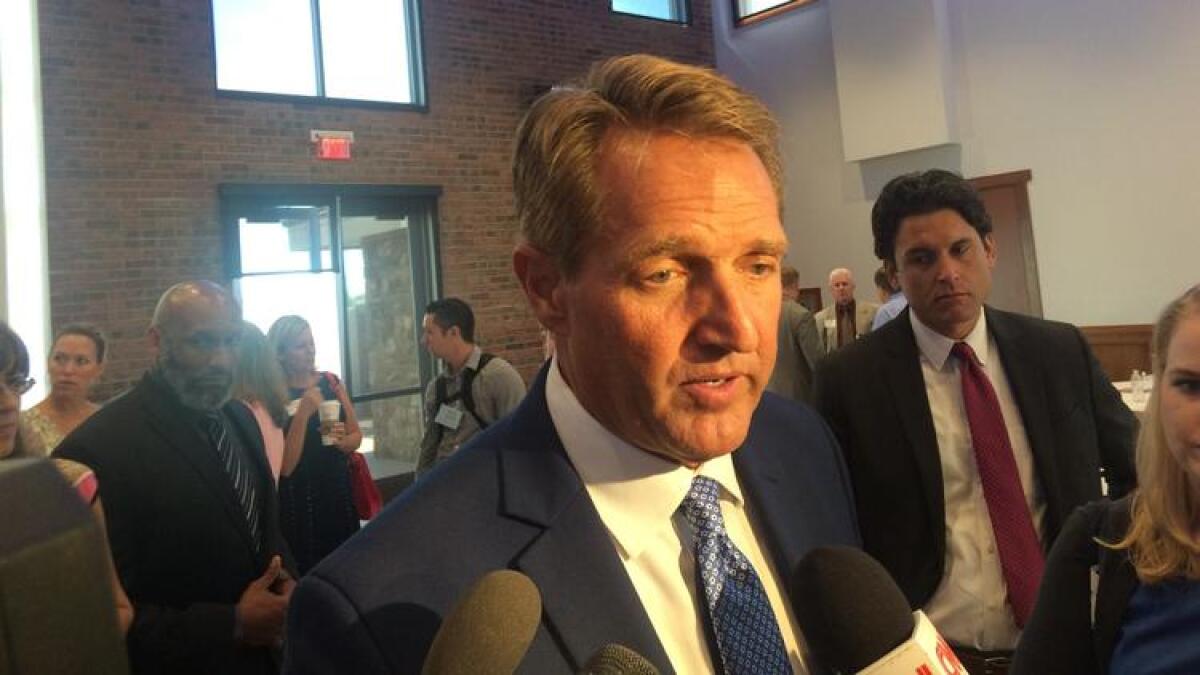
For Arizona Sen. Jeff Flake, the political climate around him is far from ideal.
In recent days, the president, a fellow Republican, has taunted Flake on Twitter and even praised his rival in the state’s Republican primary — a rare move in politics before Donald Trump came along.
But for a day at least, Flake ignored it all and let political bygones be bygones.
On Monday, reporters asked Flake — who spoke to a gathering of local business leaders — what he thought of Trump calling him toxic on Twitter.
“I don’t worry about it at all,” Flake said at an events center here in the suburbs east of Phoenix.
Is Trump right in offering aid and comfort to his primary challenger, former state Sen. Kelli Ward?
“That’s not my realm. That’s somebody else’s. I just — I’m running my own campaign. It’s going well. And what the president does, that’s his prerogative,” Flake said.
House Speaker Paul Ryan: Trump ‘messed up’ in response to Charlottesville violence
House Speaker Paul D. Ryan said President Trump “messed up” in responding to the neo-Nazi rally in Charlottesville, Va., by saying both sides were to blame for violence between white supremacists and groups protesting them.
“He could have done better,” Ryan said Monday at a CNN televised town hall.
“I do believe that he messed up in his comments.”
Pressed on Trump’s remarks, Ryan said that those marching with Nazi slogans and racist signs did not include, as Trump suggested in a combative news conference last week, “very fine people.”
“You’re not a good person if you’re there,” Ryan said.
Trump revisited the issue Monday evening during his speech to the nation on Afghanistan. Reading from prepared remarks, he called on Americans to find the courage to “heal our divisions.”
“I just think he needs to do better,” Ryan said after the speech, “and I think he just did today.”
Secret Service runs short of money to pay agents protecting Trump and his circle
The Secret Service is close to its annual caps for salary and overtime pay for more than 1,000 agents, partly because of President Trump’s large family, multiple properties and frequent travel, according to a report Monday in USA Today.
The Secret Service director, Randolph “Tex” Alles, told the newspaper that he is working to raise the combined salary and overtime caps for agents from $160,000 to $187,000 for the duration of Trump’s first term, but said he doesn’t see the problem changing “in the near term.”
In a CNN report, Alles said the issue cannot be attributed to the current administration but rather to “an overall increase in operational tempo” over nearly a decade.
Yet with Trump as president, the agency is responsible for protecting 42 people, compared with 31 people during the Obama administration. It also must guard several Trump-owned properties where the president stays, including Trump Tower in Manhattan, Mar-a-Lago in Florida and his private golf club in Bedminster, N.J., where Trump recently vacationed.
Also, among others, agents protect Trump’s two adult sons, who often travel internationally for business, and their families, as well as daughter Ivanka Trump and her family.
The Los Angeles Times reported in May that in the first 100 days of Trump’s presidency, the total cost of travel and protection for him and his family was about $30 million, compared with an annual cost of $12 million for President Obama, who did not travel as frequently but came in for criticism nonetheless from conservatives.
Congress allocated an additional $13 million to the Secret Service in May to cover unanticipated overtime for its agents and $61 million to reimburse New York and Palm Beach for their expenses during the election season.
Trump, in a statement in July marking the 152nd anniversary of the Secret Service, said he and First Lady Melania Trump were “especially thankful for those who selflessly stand by our side to safeguard our family every day.”
Speaker Paul Ryan on Charlottesville: ‘There are no sides’
House Speaker Paul D. Ryan kept a noticeably low profile in the aftermath of President Trump’s equivocating response to the white supremacist violence in Charlottesville, Va., on Aug. 12. On Monday he spoke up with more force.
In amplifying his views — and implicitly upbraiding the president — Ryan anticipated what is likely to be a top question during his nationally televised appearance Monday night, in a CNN town-hall-style broadcast immediately after Trump’s address to the nation on the Afghanistan policy.
“We all need to make clear there is no moral relativism when it comes to neo-Nazis. We cannot allow the slightest ambiguity on such a fundamental question,” Ryan wrote on Facebook.
“The immediate condemnations from left, right and center affirmed that there is no confusion about right and wrong here. There are no sides. There is no other argument. We will not tolerate this hateful ideology in our society.”
Republicans are coming under continued scrutiny for their own responses after Trump blamed “both sides” for the violence in Charlottesville — the neo-Nazis who rallied there and the counterprotesters opposing them — after one of the counterprotesters was killed in a car attack by an alleged white supremacist.
Ryan, like many Republicans, still did not directly criticize Trump by name. But his latest remarks more clearly implied criticism of the president’s rhetoric than last week’s reaction, before the onslaught of opprobrium of Trump.
“White supremacy is repulsive,” Ryan said last week. “This bigotry is counter to all this country stands for. There can be no moral ambiguity.”
Republicans in Congress continue to calculate the best way to interact with Trump and respond to him, especially as lawmakers begin their 2018 reelection campaigns without having achieved many of their biggest legislative promises, including repealing the Affordable Care Act or enacting tax reform.
Ryan, who has been trying to push ahead to tax reform this fall, after the failure of the Obamacare repeal, wrote that he was camping with his family last weekend when the white supremacist groups descended on Charlottesville, a quiet college town that is home to the University of Virginia.
“I felt the range of emotions that so many of us did. Anger, bewilderment, sadness,” the speaker wrote.
Republicans had hoped in the final weeks of the congressional recess to begin laying the groundwork for their legislative efforts this fall, with Ryan’s CNN appearance part of the campaign for public support. But Ryan was upstaged by Trump’s plans, announced Sunday, for the Afghanistan address.
Former Sheriff Joe Arpaio ‘very unlikely’ to appear with Trump at Arizona campaign rally

Former Maricopa County Sheriff Joe Arpaio, one of President Trump’s most loyal and most polarizing supporters, is “very unlikely” to be included in Trump’s campaign-style rally in Phoenix on Tuesday night, nor is he likely to receive word of a pardon during the event, according to a person familiar with the planning efforts.
The person, who requested anonymity to discuss the internal decision-making process, said a final decision has not been made, but that event organizers fear an appearance by Arpaio could cause an unnecessary distraction.
Since Trump announced the rally last week — part of his first trip to the West as president — Arpaio’s potential appearance has been the subject of speculation. He had introduced Trump in his home state during the campaign, ridden in his plane and formed what Arpaio described as a warm relationship.
Even if organizers do not plan for Trump to announce a pardon, Trump is known for going off script and may very well decide to talk extemporaneously about the possibility of one.
Arpaio said in a phone interview Monday that he did not know whether he would be invited to the event as a dignitary.
“If you hear anything, will you let me know?” Arpaio said.
He said he would not show up without an invitation.
“I don’t think I’ll be in the crowd these days,” he said. “I don’t want to cause any havoc, if you know what I mean.”
Trump told a Fox News contributor last week that he was considering a pardon for Arpaio, whose immigration enforcement tactics drew legal and political scrutiny long before Trump’s rise in politics.
Arpaio was recently found guilty of contempt of court for defying a judge’s order to stop racial profiling of Latinos and turning detainees over to federal immigration officials during his tenure in office.
Arpaio said he had not spoken with the president since before Trump took office. Trump called Arpaio’s wife before the inauguration to check on her health, he said. She has been battling cancer and Arpaio said Trump has checked in on her four or five times.
He said he does not know whether Trump will pardon him for what he calls “a miscarriage of justice.”
“I know that he’s sure got a good case to do that,” Arpaio said. “I don’t know what he’s thinking.”
Arpaio is due to be sentenced in October.
Bannon’s ouster could boost the powerful Koch network, which has surprising sway in Trump’s White House
During the presidential campaign, about the only common ground between Donald Trump and billionaire conservative Charles Koch was a colorful disregard for each other.
Koch called the choice between Trump and Hillary Clinton like opting for cancer or a heart attack. And Trump bashed big-money donors, deriding his Republican rivals as “puppets” who begged at Koch’s door.
Not surprisingly, Koch and his allies largely sat out the presidential election, and Trump won without them. Normally such a high-profile snub would carry a steep political price.
But Koch’s network of conservative advocacy groups has exerted surprising sway in the Trump administration, scoring some early victories and pushing its priorities to the top of the White House agenda.
Its influence is likely to grow after the ouster of Trump’s top strategist, Stephen K. Bannon, amid the White House turmoil over neo-Nazi violence in Charlottesville, Va. Bannon had clashed with several of Trump’s top aides, including those aligned with the Koch crowd, over his hard-right views.
Bannon’s populist agenda, with its nationalist, nativist and anti-immigration bent, found few fans among the business-oriented, small-government conservatives aligned with Koch.
With Bannon back at Breitbart News, a far-right website, the question is whether he will still have Trump’s ear from the outside while Koch and his cohorts retain strong allies in the White House.
U.S. will stop issuing nonimmigrant visas in Russia in deepening diplomatic standoff

In the latest tit-for-tat in the diplomatic standoff between the United States and Russia, the U.S. embassy in Russia announced Monday that it will suspend visa processing for Russian applicants beginning Aug. 23.
The move is a response to Russian President Vladimir Putin’s order for the U.S. to cut its staff at the U.S. embassy and three consulates by 755 people by Sept. 1. Russia also seized a warehouse and a resort complex in Moscow used by U.S. diplomatic staff.
The State Department hasn’t said how many U.S. diplomats will be forced to leave and how many Russian nationals and others who work at the U.S. government will be laid off.
Secretary of State Rex Tillerson has said he will respond by Sept. 1, but has not yet given a public assessment of how the cuts are likely to impact the vast array of embassy-backed services in Russia, from assisting U.S. businesses to enforcing arms control agreements.
U.S. relations with Moscow have nosedived since Putin’s government seized Crimea and backed separatists in eastern Ukraine in 2014, promping U.S. sanctions.
They worsened last year when U.S. intelligence agencies determined that the Kremlin interfered in the U.S. presidential race in a bid to help Donald Trump win.
President Obama retaliated in December by expelling 35 Russian diplomats who the White House said were spies, and seizing two Russian-owned waterfront compounds - one in New York and the other in Maryland - that it said were used for espionage.
Putin initially did not respond, but his order to cut the U.S. staff last month followed a near-unanimous vote in the U.S. Congress to impose additional sanctions on Russia for its meddling in the election. President Trump later signed the bill into law.
Trump has repeatedly praised Putin and called for improving relations with Moscow. But any attempts to do so have been hampered by the widening FBI investigation into whether his campaign cooperated with the Russian attempts to influence the U.S. election.
The U.S. embassy statement Monday cited the Russian order to cut staff as the reason it was suspending visa processing.
“As a result of the Russian government’s personnel cap imposed on the U.S. Mission, all non-immigrant visa operations across Russia will be suspended beginning August 23, 2017,” the embassy said on its website.
The move will affect Russians applying for tourist, business and other kinds of nonimmigrant visas to the United States.
The U.S. Mission in Russia issued 182,958 visas in 2016, according to the State Department. About 25% were issued at U.S. consulates in St. Petersburg, Ekaterinburg and Vladivostok, and the rest in Moscow.
The embassy said it would begin Monday to cancel appointments for visa interviews. No visas will be processed until Sept. 1, after which all applicants must undergo an interview in Moscow, it said.
Even before the announcement, interview schedules were backed up 45 days or more. After Sept. 1, the embassy warned, visa processing for Russian citizens will be conducted “on a greatly reduced scale.”
Russian Foreign Minister Sergei Lavrov said Moscow would respond after a closer examination of the U.S. announcement. He cautioned against a response that would similarly reduce applications of American applicants for Russian visas, saying that the Russian response would not be intended to punish American citizens.
“If someone hoped that in this case a bad example would be contagious, then he miscalculated,” Lavrov told a news conference Monday.
In Russia’s upper parliament, Andrei Klimov, the deputy head of the Committee on International Affairs, suggested that Russia should respond by reducing visas issued to U.S. citizens.
“The legitimate rights of our citizens must be defended, so if there are any infringements on our citizens, then mirror measures should also be introduced against the citizens of the United States,” Klimov said, according to Interfax, a Russian news agency.
Klimov’s counterpart in Russia’s lower house of parliament, called the Duma, blamed the United States for the nosedive in relations.
“It always comes from the American side,” Leonid Slutsky, who chairs the Duma’s international affairs committee, posted on the Russian social media site VKontakte. “We believe it is testament to Washington’s mood to further accelerate the deterioration of relations with Moscow.”
Putin names new Russian ambassador to U.S. to replace Sergei Kislyak
Russian President Vladimir Putin has appointed a new ambassador to the United States.
The Kremlin said on Monday that Putin has replaced Sergei Kislyak, whose tenure ended in July, with Anatoly Antonov, a deputy foreign minister and former deputy defense minister seen as a hardliner regarding the U.S.
The outgoing ambassador played a prominent role in the controversy over Russia’s possible involvement in the 2016 U.S. presidential election.
President Trump’s first national security advisor, Michael Flynn, resigned after lying about contacts with Kislyak. Atty. Gen. Jeff Sessions recused himself from the investigation into possible Russian interference in the 2016 election after reports that he hadn’t disclosed meetings with Kislyak.
Trump, who once backed withdrawal from Afghanistan, will try to sell the nation on deeper involvement
President Trump, who as a private citizen blamed “stupid leaders” for prolonging the war in Afghanistan, plans to make a prime-time speech Monday in an attempt to sell Americans on his proposal for deeper involvement there.
It’s another challenge for a president who rose to popularity as a sharp-elbowed commentator in the public arena, now being forced to confront the tough realities of war and peace through the lens of American security and interests in what has become the nation’s longest war.
Militants serving the Taliban, Islamic State and other militias have wrought more violence and instability in Afghanistan over the past year, increasing pressure on Western forces brought in to bolster overmatched Afghan security forces.
Trump delivers the speech, an important milestone in any presidency, as his temperament and focus have been criticized by influential lawmakers in his own party and by a public who, according to polls, has not been convinced of his leadership abilities.
Even as he prepared for the sobering task Monday night, he showed his penchant for distraction, tweeting a morning complaint about the “very dishonest Fake News Media.”
His long record on Twitter shows Trump’s quick transformation on the issue.
“We have wasted an enormous amount of blood and treasure in Afghanistan. Their government has zero appreciation. Let’s get out!” Trump tweeted in 2013, one of several similar statements he made that year.
Less than four years later, Trump is expected to authorize some 4,000 more U.S. troops for counter-terrorism missions, as well as U.S. advisors who will work on the front lines. That’s on top of 8,400 U.S. and 5,000 North Atlantic Treaty Organization troops already in the country, advising Afghan security forces.
On the campaign trail, Trump spoke more often about the need to win wars, while disdaining efforts at nation-building that have plunged past administrations into longer engagements.
Trump made the newest troop decision over the weekend after a meeting with his military advisors on Friday at Camp David.
Trump was presented with three options, according to a former national security official familiar with the internal administration deliberations: 1) Scale back to a skeletal presence 2) Deploy only a robust counter-terrorism operation headed by Joint Special Operations Command and the Central Intelligence Agency 3) Increase troop levels by 4,000 to 5,000 while at the same time increasing counter-terrorism operations.
Trump seems to have chosen the third option.
Calls for more troops or money will almost certainly run into a coalition of resistance from liberal Democrats and libertarian-leaning Republicans who reject a muscular military presence.
On Monday, Rep. Thom Massie (R-Ky.) was among those reminding the president of the opposition from the right.
Trump to outline new Afghanistan strategy in Monday evening address
President Trump on Monday evening will spell out a new U.S. strategy for the war in Afghanistan, where U.S. troops have been fighting for 16 years, and other parts of South Asia, the White House said Sunday.
Trump made his decision after meeting with his national security team at the presidential retreat at Camp David on Friday, capping months of deliberations on how to proceed in America’s longest war.
On Sunday, Defense Secretary James N. Mattis told reporters traveling with him in Amman, Jordan, that the new strategy is the result of a “rigorous” process. He declined to provide details on precisely what Trump will announce.
Trump will make a nationally televised statement from Ft. Myer in Virginia at 9 p.m. Monday, the White House said.
He will “provide an update on the path forward for America’s engagement” in Afghanistan and South Asia, the statement said.
Mattis was authorized in June to deploy about 4,000 additional troops to Afghanistan, but any significant buildup has been on hold pending the broad strategic review.
Trump’s advisors had offered competing visions for bolstering Afghan forces against a resurgent Taliban.
Ousted White House strategic advisor Stephen Bannon had supported the notion of hiring private mercenaries rather than sending in more U.S. troops, as Mattis and others have urged.
With American forces in Afghanistan now numbering fewer than 10,000, Afghan forces have been shouldering the brunt of fighting but have been struggling to hold ground against the Taliban.
U.S. commanders have said extra troops could be used to help train and advise Afghan units to make them a more effective fighting force in hopes of breaking what the U.S. commander in Afghanistan, Gen. John Nicholson, has termed a “stalemate.”
The plan is also expected to encompass U.S. dealings with other players in the Afghan conflict, including neighboring Pakistan, which has long sheltered insurgents and their allies.
Trump ran on a platform of reducing American foreign military entanglements, and during his first seven months in office, the president balked at authorizing more troops, deferring longer-term decisions on how to proceed.
On Saturday, Trump tweeted that “many decisions” had been made on how to approach the Afghan conflict.
Sen. John McCain tweets photos of the ‘three amigos’ together again as he undergoes cancer treatment in Arizona
Republican Sen. John McCain, undergoing his first week of chemotherapy treatment after being diagnosed with brain cancer, had a little help over the weekend from some friends.
Fellow travelers Sen. Lindsey Graham (R-S.C.) and former Sen. Joe Lieberman, the Democrat-turned-Independent from Connecticut -- who together with McCain were often called the three amigos -- reunited for a visit in Arizona.
The three became a close-knit trio of globe-trotting defense hawks, particularly during then-President George W. Bush’s administration, and disbanded only after Lieberman, who stunned his party when he backed McCain’s 2008 presidential bid, retired from the Senate.
Aides have said McCain is doing well as he starts cancer treatment.
McCain remains active at home, according to his social media posts, and is expected to return to the Senate.
Over the weekend he posted photos of the amigos, together again.
Treasury Secretary Steven Mnuchin says it’s ‘hard to believe’ he has to defend himself and Trump. Then he does
Treasury Secretary Steven Mnuchin issued a statement Saturday in response to comments from his Yale classmates and others that he “speak out” about President Trump’s response to Charlottesville.
An open letter signed by more 300 of members of his 1985 graduating class, said Mnuchin had a “moral obligation to resign.”
Mnuchin and Transportation Secretary Elaine Chao flanked Trump on Tuesday during what was supposed to be a news conference about infrastructure. Instead, the questions quickly turned to the president’s delay in directly condemning white supremacist groups who had marched in Charlottesville with tiki torches and carrying KKK and Nazi symbols.
Mnuchin, who is Jewish, said in his statement that he believed he understood the “long history of violence and hatred against the Jews (and other minorities.)”
Saying he found it “hard to believe I should have to defend myself on this, or the president, I feel compelled to let you know that the president in no way, shape or form believes that neo-Nazis and other hate groups who endorse violence are equivalent to groups who protest in peaceful and lawful ways.”
Mnuchin referenced his years at Yale as making him “familiar with the culture wars being fought in our country.”
He called those issues “more complicated than we have been led to believe by the mass media.”
He also said Trump “deserves the opportunity to propose his agenda” without efforts by others to “distract the administration and the American people from these most important policy issues -- jobs, economic growth and national security.”
Adding that he did not “believe the allegations against the president are accurate,” Mnuchin said “having highly talented men and women” serve the Trump administration should be “reassuring to you and all the American people.”
Trump tweets about ‘anti-police agitators’ as counter-protesters confront far-right rally in Boston
President Trump weighed in on the far-right rally held Saturday in Boston, describing “anti-police agitators” and complimenting the police.
Boston police said they had a tight security plan in place to ensure the violence that roiled Charlottesville, Va., last weekend did not take place in their city.
The large gathering ended as scheduled by 2 p.m. local time without any major incidents.
Trump followed that tweet by another that appeared to be quickly deleted, then posted again, then deleted again.
In that tweet, Trump said the country had been “divided for decade, but will come together again. Sometimes protest is needed in order to heel, and heel we will!”
Then he tweeted the sentiment again, with a spelling correction.
He also praised those who came out in Boston to oppose bigotry.
Trump has come under intense criticism from both Democrats and Republicans for his response to the events in Charlottesville.
He initially laid blame for the violence on “many sides” and walked away when reporters shouted questions about whether he specifically denounced white supremacism. After the backlash, he gave a scripted statement Monday that said racism was evil and called out the “KKK, neo-Nazis, white supremacists and other hate groups” as repugnant.
But in a news conference on infrastructure the following day, he again spoke about “blame on both sides.”
“What about the ‘alt-left’ that came charging at, as you say, the ‘alt-right’? Do they have any semblance of guilt?” Trump asked reporters. “They came charging with clubs in their hands.”
UPDATES:
1:54 p.m.: This article was updated with additional Trump tweets and information about the Boston rally as well as his previous comments about Charlottesville.
Trump thanks Steve Bannon - ‘it was great!’

President Trump thanked Stephen Bannon on Saturday, his first public comments since the controversial presidential advisor left the White House and returned to his perch at Breitbart News.
Bannon was an architect of Trump’s America First agenda during the campaign last year, but his fiery brand of nationalist rhetoric and economic populism sparked harsh criticism of the Trump’s response to last weekend’s white supremacist rally in Charlottesville.
Trump’s tweet Saturday morning thanked Bannon for helping take over his presidential campaign last summer when Trump was trailing in polls to Democratic rival Hillary Clinton. Trump did not mention Bannon’s work in the White House.
“I want to thank Steve Bannon for his service. He came to the campaign during my run against Crooked Hillary Clinton - it was great! Thanks S”
Later Saturday, as thousands of protesters rallied against a far-right group’s “free speech” rally in Boston, Trump tweeted again about the role he expects Bannon to play on the outside to counter what the president calls “Fake News.”
“Steve Bannon will be a tough and smart new voice at @BreitbartNews...maybe even better than ever before. Fake News needs the competition!”
A White House spokeswoman had no information Saturday about how Trump was spending his day or if he had spoken to Bannon since his exit.
The president, at his golf resort in Bedminister, had no public events on his schedule.
President Trump and first lady to skip Kennedy Center honors over concerns of ‘political distraction’
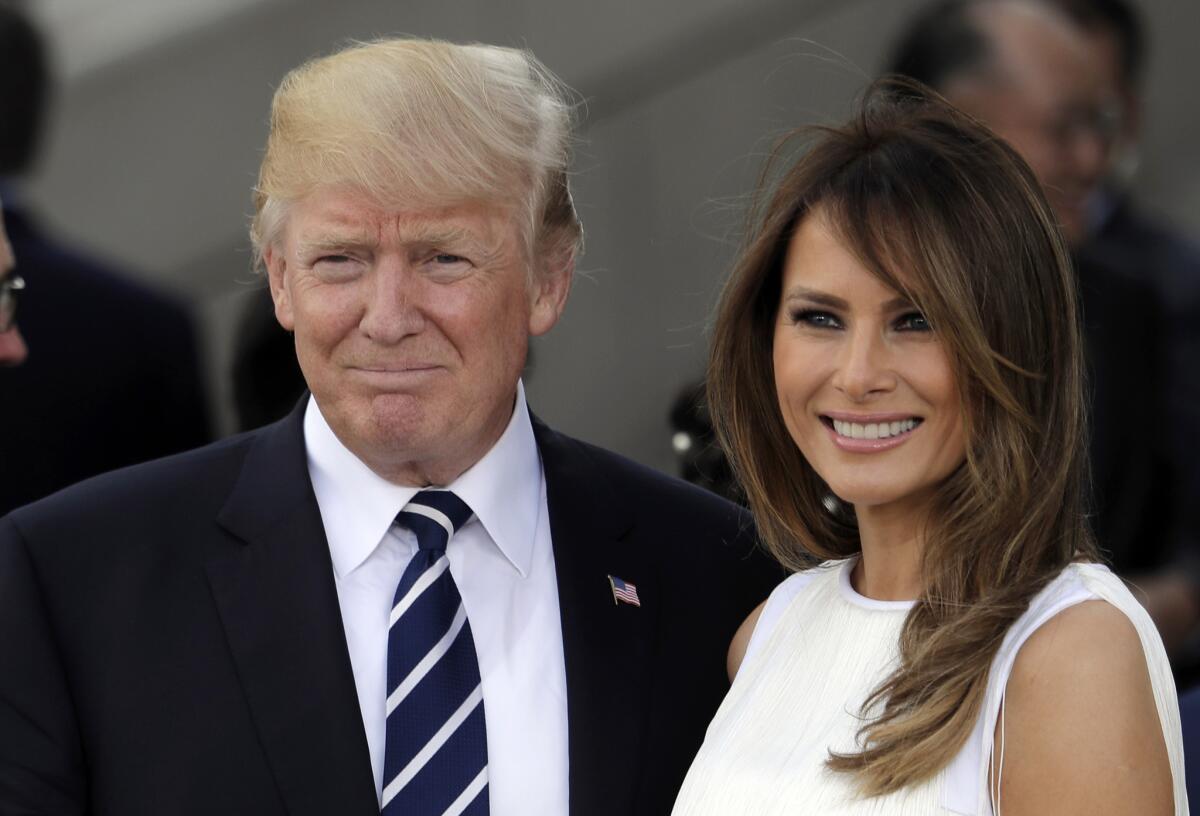
President Trump and First Lady Melania Trump will not attend the annual Kennedy Center honors in December, a traditional showcase of the nation’s arts, to avoid creating political distraction, the White House said Saturday.
Several honorees had said they would boycott a part of the high-profile ceremony to protest Trump’s policies, including proposed cuts in spending for the arts.
The White House decision comes a day after the president’s entire 17-member arts and humanities advisory council quit Friday to protest his response to the neo-Nazi rally that turned violent in Charlottesville, Va.
“The President and First Lady have decided not to participate in this year’s activities to allow the honorees to celebrate without any political distraction,” Press Secretary Sarah Huckabee Sanders said in a statement.
“First Lady Melania Trump, along with her husband President Donald J. Trump, extend their sincerest congratulations and well wishes to all of this year’s award recipients for their many accomplishments.”
This year marks the 40th anniversary of the ceremony at the John F. Kennedy Center for the Performing Arts, and the five honorees announced this month include top artists.
Some artists had said they would skip the reception with the president that is traditionally held at the White House before the event, according to the Washington Post.
Television producer Norman Lear, singer Lionel Richie and dancer Carmen de Lavallade said they would not attend the reception at the White House, the report said.
Another honoree, Cuban American singer Gloria Estefan, was planning to attend in hopes of influencing the president on immigration issues, while rapper LL Cool J has not said whether he would go.
That pre-gala event will no longer take place, the Kennedy Center said, and all honorees will attend the December ceremony as planned.
“The Kennedy Center respects the decision made today by the office of the President of the United States,” said Chairman David M. Rubenstein and President Deborah F. Rutter in a statement.
“In choosing not to participate in this year’s Honors activities, the Administration has graciously signaled its respect for the Kennedy Center and ensures the Honors gala remains a deservingly special moment for the Honorees. We are grateful for this gesture.”
The White House did not provide details about its concerns.
Other high-profile guests have declined invitations to the White House in protest of the president.
The collapse of the President’s Committee on the Arts and Humanities followed the departure of top business executives from his manufacturing and infrastructure council, which the White House later dismantled.
8:30 a.m. This post was updated with response from the Kennedy Center.
Leading Republican says Trump lacks the stability and competence needed for success
President Trump has drawn criticism from Republicans and Democrats alike over his response to the violence in Charlottesville, Va., between white supremacists and counter-protesters.
Sen. Bob Corker of Tennessee delivered one of the most stinging reviews Thursday when he said the president had yet to show the “stability” and “competence” needed to achieve success.
“The president has not yet been able to demonstrate the stability, nor some of the competence that he needs to demonstrate in order to be successful,” the Republican lawmaker told reporters in Chattanooga, Tenn.
Corker repeated himself later, as if to stress those words.
“We should hope that he aspires, does some self-reflection, does what is necessary to demonstrate stability, to demonstrate competence, to demonstrate that he understands the character of our nation and works daily to bring out the best of the people in our nation,” he said.
Corker did not stumble over those carefully chosen words.
“I will say we are at a point where there needs to be radical changes that take place at the White House. I think the president needs to take stock of the role he plays in our nation and move beyond himself, move way beyond himself, and move to a place where daily, he’s waking up and thinking about what’s best for our nation,” he continued.
Corker didn’t elaborate on what changes he was talking about. But he did indicate that he believes Trump pushes his personal agenda first, before thinking of the country as a whole.
Corker has been generally supportive of Trump. He’s voiced his approval of the president’s agenda on immigration reform, the fight against Islamic State and the decision to withdraw from the Paris climate agreement.
Even in October, when a now-infamous “Access Hollywood” tape was released showing Trump making lewd remarks about women in 2005, Corker criticized Trump’s comments then as “inappropriate.” But he was not one of the Republican senators who withdrew his support for Trump’s candidacy.
Now a new dilemma has arisen within the GOP over Trump’s responses to the violence in Charlottesville, Va. Two days after the deadly unrest, Trump gave a scripted speech that condemned white supremacists, the Ku Klux Klan and neo-Nazis. But the next day, he referred both to white supremacist protesters and counter-demonstrators who had confronted them, saying that “both sides” were responsible for the mayhem. The back-and-forth statements prompted many Republicans to publicly chastise Trump for not placing greater blame on the racist marchers.
When asked whether Trump had done enough to denounce these groups, Corker did not mince words.
“White supremacy groups, neo-Nazi groups, KKK groups are not what’s good about our nation. They are to be called out for what they are, and that is repugnant,” he said, adding, “I don’t think the president has appropriately spoken to the nation on this issue.”
Bannon’s foes welcome his departure but pressure Trump for further shift away from far-right nationalism
Foes of White House advisor Steve Bannon welcomed his abrupt departure Friday, but warned that the administration’s cutting of ties with the architect of President Trump’s populist agenda did not go far enough.
“There is one less white supremacist in the White House, but that doesn’t change the man sitting behind the Resolute desk,” said Michael Tyler, spokesman for the Democratic National Committee.
Republicans, though, remained largely silent. Even those lawmakers outside of Bannon’s circle of influence at the White House and with far-right groups declined to speak up.
Few Republicans seemed willing to risk retaliation for comments critical of Trump, or Bannon, who many expect will have an unbridled platform now that he will be removed from the administration.
House Speaker Paul D. Ryan (R-Wis.) and Senate Majority Leader Mitch McConnell (R-Ky.) both declined comment.
“He doesn’t typically comment on staff, but if he issues a statement tonight I’ll make sure you get it,” said a McConnell spokesman.
Sen. Ted Cruz (R-Texas) told reporters in Lubbock, Tex., that he prefers to “ignore the political circus” of Washington.
“You know, it’s easy for Washington to get consumed by the back and forth personalities, who’s up who’s down, who’s fighting with whom,” Cruz said. “My standard approach is that I don’t worry about that.”
Allies of Democrats, meanwhile, accelerated their campaign to expose others in the White House who they see as sharing Bannon’s nativist views, and to remind voters that the final tone of the administration rests with Trump and his actions.
“Personnel changes are fascinating and dramatic, but let’s just remember how little of a difference it makes with this president,” said Sen. Brian Schatz (D-Hawaii), an outspoken Trump critic. “It’s the president that matters.”
Kurt Bardella, a former House Republican aide who split with Bannon after a stint at Breitbart.com, suggested the advisor will continue to wield influence from outside the administration.
“Steve will do exactly what he has been doing from Day 1 — try to ‘bring everything crashing down,’” Bardella wrote.
“In many ways, I think Steve will feel liberated. Free from the limitations of ‘serving’ or ‘answering’ to somebody,” he added. “Now, he will be able to operate openly and freely to inflict as much damage as he possibly can on the ‘globalists’ that remain in the Trump Administration.”
Many Democrats, who had long called for Bannon to be dismissed, pressed for further action.
House Minority Leader Nancy Pelosi (D-San Francisco) announced her support Friday for a congressional resolution to censure Trump after his statements about the neo-Nazi demonstrations in Charlottesville, Va.
The Progressive Change Campaign Committee launched television ads saying one “is not enough” and calling for the dismissal of other White House aides it characterized as belonging to the far-right.
The Congressional Black Caucus released a list of 10 administrative policies, including the travel ban, immigrant deportations and voter fraud investigations, “that need to go, too.”
“Steve Bannon’s firing is welcome news, but it doesn’t disguise where President Trump himself stands on white supremacists and the bigoted beliefs they advance,” Pelosi said.
“Personnel changes are worthless so long as President Trump continues to advance policies that disgrace our cherished American values,” she said. “The Trump administration must not only purge itself of the remaining white supremacists on staff, but abandon the bigoted ideology that clearly governs its decisions.”
On both sides of the aisle, some lawmakers hoped the parting of ways shows that the recently appointed White House chief of staff, retired Marine general John F. Kelly, might be able to bring stability to the chaotic White House.
“Looks like general John Kelly is taking control of the White House,” tweeted Sen. Bill Nelson (D-Fla.). “That is a good thing.”
What do white nationalists want, anyway? Here’s one answer.
As President Trump continues to see fallout over his response to the violence in Charlottesville, Va., and as media coverage of last weekend’s protests seems to be a he said/he said, one question lingers: What is it that white nationalists want?
Last year The Times posed that question to three young members of the Traditionalist Worker Party over lunch in Cleveland.

They don’t actually support Donald Trump or the Republican Party.
We were at the Republican National Convention, and most people who saw white nationalists there might assume they were there to support Trump. But this group was there to convert GOP voters to their own party.
“If you think about it, most Trump supporters are working-class white Americans. Those are our constituents,” said Matthew Heimbach, the co-founder of the group.
There’s plenty he doesn’t like about Trump. The president wants to spend too much on the military. His stance on immigration doesn’t go far enough. He’s “still part of the establishment.”
Heimbach offered a simple analogy:
If you like Donald Trump, you might also like the Traditionalist Worker Party.
These particular white nationalists want to redraw state boundaries into “regions” with similar ethnicities, political views and values. Then, they want a full stop on immigration into their region.
This includes all immigration – legal and illegal.
“Zero net migration, I think would be fair,” Heimbach said.
But they don’t want to stop other regions of the country from welcoming diversity – if that’s what they want.
They really don’t want to call themselves extremists – and they don’t think they’re racist.
“We legitimately reject racial hatred and supremacism,” he said. “[Racism] is used in many cases just for a white person that advocates for their people and their community.”
Bannon ouster could be ‘beginning of the end’ for Trump, Breitbart warns
Stephen K. Bannon’s ouster as senior strategist at the White House “may turn out to be the beginning of the end for the Trump administration,” warned Breitbart, the conservative website that Bannon once ran and built into a major force on the right.
The article by Joel B. Pollak, the website’s senior editor-at-large, described Bannon as the “conservative spine of the administration” who “personified the Trump agenda.”
“With Bannon gone, there is no guarantee that Trump will stick to the plan,” he wrote, saying that the danger is that Trump would become a repeat of former California Gov. Arnold Schwarzenegger.
After voters defeated his initial, conservative ballot proposals, “Schwarzenegger gave up on his agenda, and abandoned the political base that had brought him into office,” Pollak wrote. “He re-invented himself as a liberal.”
Although that “gambit was a success” in terms of gaining reelection for Schwarzenegger, the California Republican party “still has not recovered,” he added.
The danger for conservatives now is that Trump might follow a similar path, he suggested.
Earlier in the day, before Bannon’s departure was announced, Breitbart declared in a headline that Bannon “fights for Trump agenda” against White House enemies.
The article listed as “Bannon’s enemies in the White House” national security advisor H.R. McMaster, deputy national security advisor Dina Powell and economic advisor Gary Cohn.
Trump announces plan to elevate U.S. military command that oversees cyber operations
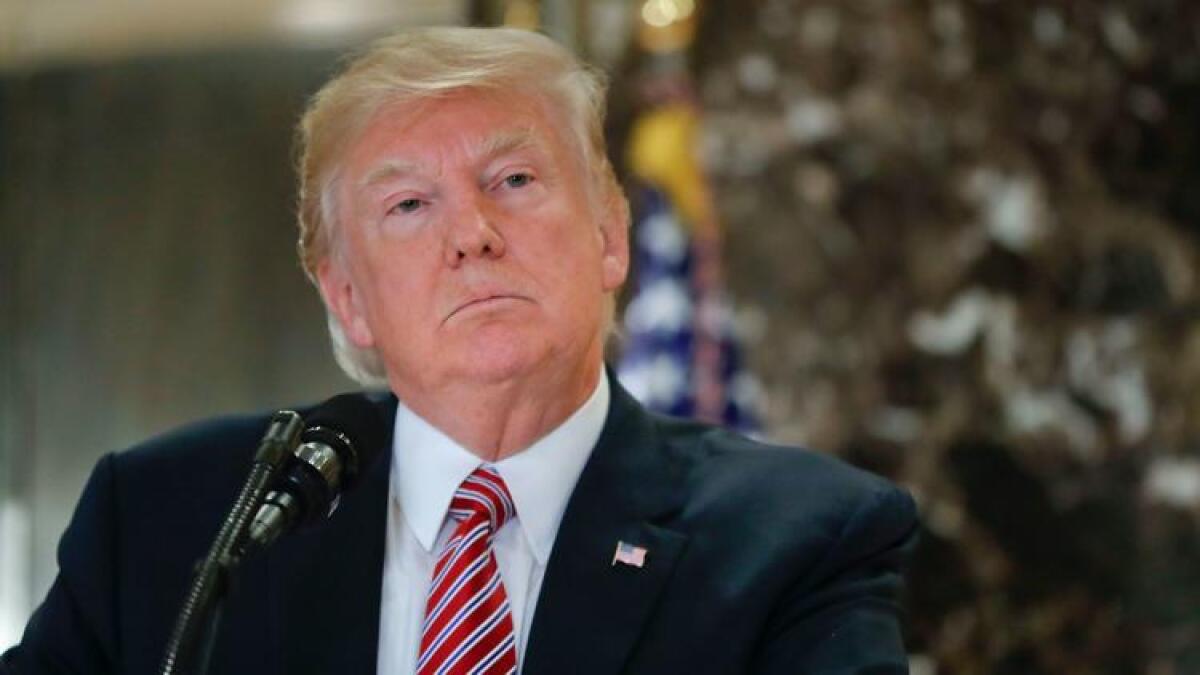
President Trump announced plans Friday to elevate the Pentagon’s Cyber Command to the status of a unified combatant command next year, part of a strategic shift to emphasize cyber offense for future combat and counterterrorism operations.
The move will place cyber operations on the same level as the Pentagon’s nine other combatant commands, which are all led by four-star generals or admirals.
It represents a historic expansion of America’s war-fighting strategy and power projection. No other nation has publicly acknowledged using cyber for operations, although U.S. officials say it is part of the military doctrine for Russia, China, Iran and North Korea.
The decision to create a separate cyber command “demonstrates our increased resolve against cyberspace threats and will help reassure our allies and partners and deter our adversaries,” Trump said in a statement.
It “will also ensure that critical cyberspace operations are adequately funded” by Congress, he said.
Other unified combatant commands are assigned to senior officers who oversee operations in a specific geographical area, such the Middle East, or a military function, such as special operations.
Cyber Command, known as Cybercom at the Pentagon, falls in the latter category. Defense Secretary James N. Mattis has not yet named a commander to head it.
Cybercom has operated since 2009 under U.S. Strategic Command, which oversees the nuclear arsenal. It operates closely with the National Security Agency, which is both a Department of Defense and an Intelligence agency.
Trump’s announcement said the shift to a separate command should be complete by October 2018.
Mattis will review whether to separate the new command from the NSA. His predecessor, Ashton Carter, as well as James Clapper, the former director of national intelligence, both favored breaking them apart.
Adm. Michael S. Rogers currently serves as head of both the NSA and Cybercom. Both are headquartered at Ft. Meade in Maryland.
Lt. Gen. William C. Mayville, who now serves as director of operations for the Pentagon’s Joint Staff, is likely to lead the new command, according to U.S. officials who weren’t authorized to speak publicly.
Kenneth P. Rapuano, assistant secretary of Defense for homeland defense and global security, emphasized that elevating Cybercom to a separate command is a “natural next step.”
Military-led digital assaults are regularly integrated in large battlefield operations. The Pentagon admitted for the first time last year that U.S. commanders had mounted cyber offensives against Islamic State in Iraq and Syria.
Sen. John McCain (R-Ariz.), chairman of the Armed Services Committee, praised the decision, but he cautioned that more effort is needed to confront the cybersecurity threat posed by foreign adversaries.
“We must develop a clear policy and strategy for deterring and responding to cyber threats,” McCain said in a statement. “We must also develop an integrated, whole-of-government approach to protect and defend the United States from cyberattacks.”
Trump chief strategist Steve Bannon exits White House
Stephen K. Bannon, President Trump‘s self-styled liaison to the far right, has departed the White House in the latest staff turmoil, according to the Associated Press.
Long-simmering speculation that he would be forced out intensified recently when retired Marine Gen. John F. Kelly became White House chief of staff, charged with restoring discipline and order. Among other things, Bannon is suspected of stoking right-wing opposition to national security advisor H.R. McMaster.
But by Friday, he had apparently also lost the support of the president for his combativeness, after months of alienating many others within the administration.
When asked about his strategist’s future during a news conference earlier this week, Trump declined to guarantee Bannon’s job. His remarks suggested a resentment that Bannon came in for any credit for Trump’s ascension to the White House.
“Well, we see,” Trump said. “I like Mr. Bannon. He’s a friend of mine. But Mr. Bannon came on very late, you know that. I went through 17 senators, governors, and I won all the primaries. Mr. Bannon came on very much later than that, and I like him. He’s a good man.”
Tillerson speaks out against racism; says tolerance a matter of ‘leadership’
Secretary of State Rex Tillerson made unexpectedly pointed remarks Friday on the scourge of racism and the need for diversity, saying tolerance demands “leadership.”
Tillerson did not mention President Trump or his widely condemned equivocation about the racist violence in Charlottesville, Va., last weekend. But Tillerson’s tone and words stood in stark contrast to those of his boss.
“Hate is not an American value,” he said. “Racism is evil. It is antithetical to America’s values. It is antithetical to the American idea.”
Tillerson was speaking at the State Department to this summer’s departing class of interns and student fellows, normally a routine delivery of comments of thanks and encouragement. He clearly chose to strike a theme of healing -- of “binding up the wounds” -- in the wake of Charlottesville and of promoting racial diversity, starting at Foggy Bottom and continuing throughout society.
The secretary of State said he was ordering the department to consider at least one minority candidate for every opening at the ambassadorial level and instructing officials generally to expand recruitment in the nation’s 100 historically black colleges and universities.
He noted that while a quarter of the U.S. civil service is African American, only 9% of specialists and 5% of generalists in the Foreign Service are black.
“All of this is a leadership issue. It’s the role of leadership, from the secretary of State and the assistant secretaries and directors of bureaus and everyone in between,” he said.
“We have to own this process” of fostering diversity, Tillerson said. “We have to manage this process and be held accountable for the results of this process.”
Bringing people of diverse “cultural background or life experiences” into the workplace “enriches the quality of our work,” Tillerson said.
“They will see things I do not see,” he added, and offer “experiences I do not know.”
With Trump and Congress increasingly at odds, hopes for a Republican legislative agenda fade
Republicans in Congress have tried to stick with President Trump in hopes that despite politically damaging outbursts from the White House, his pen ultimately would be able to sign their legislative agenda into law.
But in the aftermath of Trump’s controversial response to the neo-Nazi rally in Charlottesville, Va., that promise seems ever more distant.
Republicans are now coming to grips with the reality that they are increasingly on their own, unable to rely on the president to helm their party, but without having powerful enough congressional leaders to bring bickering factions together.
That has dimmed prospects of passing big-ticket items such as tax reform, an infrastructure package or a new healthcare law.
Trump grows more deeply dependent on his base, fueling cycle of anger and provocation
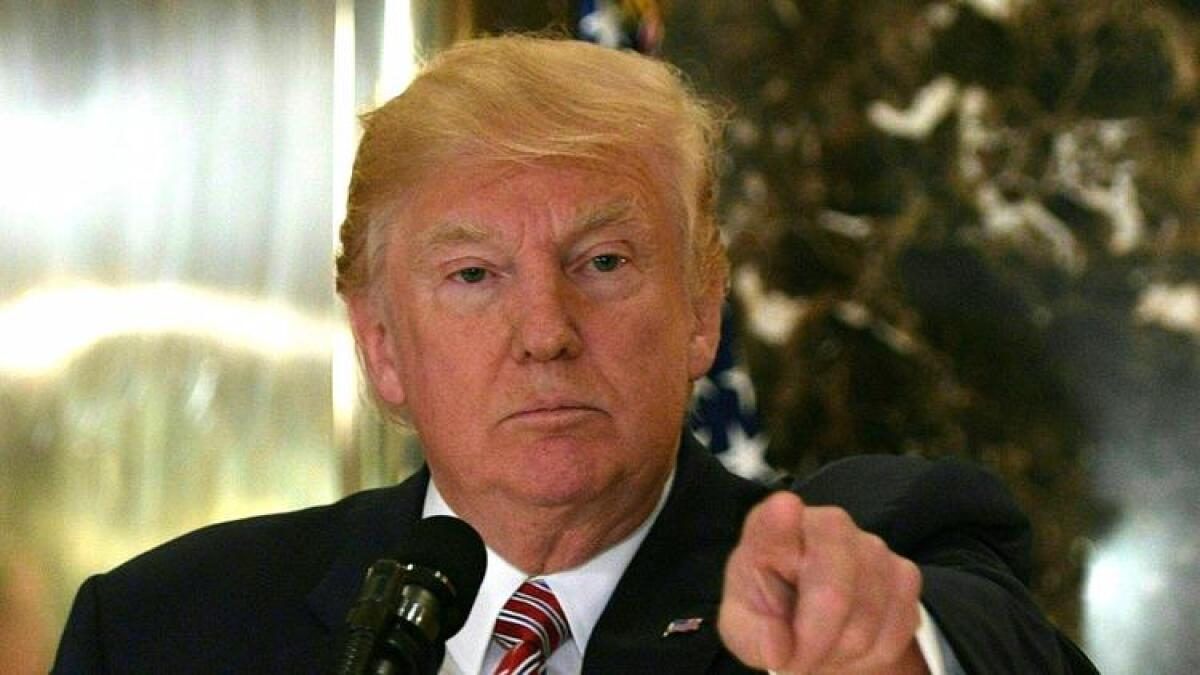
President Trump, increasingly isolated, appears caught in a cycle of anger and provocation as he pushes wider the nation’s longstanding racial and cultural divide to solidify his dwindling base of populist political support.
The latest examples came Thursday: Trump further inflamed the incendiary debate over the nation’s Confederate memorials, saying American culture was “being ripped apart” by their removal; lashed out at some perceived Senate enemies; and repeated a religiously offensive myth about an American general using bullets bathed in pigs’ blood to kill Muslim terrorists.
All 17 members of White House arts panel resign to protest Trump’s response to Charlottesville
All 17 members of a White House advisory panel on the arts and humanities resigned en masse Friday in response to President Trump’s divisive comments on the deadly violence in Charlottesville, Va.
The move follows the mass exodus of major business CEOs who quit two White House panels this week to protest the president’s response to last weekend’s clashes between far-right groups and counter-protesters.
“Reproach and censure in the strongest possible terms are necessary following your support of the hate groups and terrorists who killed and injured fellow Americans in Charlottesville,” the 16 wrote in a letter to Trump. “The false equivalencies you push cannot stand.”
“Supremacy, discrimination, and vitriol are not American values,” the letter said. “Your values are not American values.”
The President’s Committee on the Arts and the Humanities was created in 1982 under President Reagan, and acts as an advisory committee to the White House on cultural issues.
It draws from Hollywood, Broadway and the broader arts and entertainment community. First Lady Melania Trump is the panel’s honorary chairwoman. The White House did not immediately comment.
The committee works with the National Endowment for the Arts, the National Endowment for the Humanities and the Institute of Museum and Library Services, along with other federal partners and the private sector.
Among those who resigned were actor Kal Penn, painter and photographer Chuck Close; Jill Udall, the former head of cultural affairs for New Mexico; and entertainment executive Fred Goldring, who helped produce the “Yes We Can” video with musician Will.i.am in support of Barack Obama’s 2008 presidential campaign.
Penn posted the letter on Twitter:
The letter was initially released Friday morning with signatures from 16 of the 17 members. By afternoon, the 17th member, playwright George C. Wolfe, had also resigned.
Andrew J. Weinstein, a Democratic activist and donor, said he initially resigned before the inauguration but does not believe the Trump administration recorded that he had left the committee, so he signed the latest letter to send an additional message.
“Standing by while our president engages in the kind of hateful rhetoric and divisive language that he continues to unleash is unacceptable,” he said.
Weinstein said he and other members of the committee were also furious that Trump sought to eliminate funding for the National Endowment for the Arts and other cultural programs in his budget proposal.
--
UPDATE
11:11 a.m.: This article has been updated with the last member resigning from the council
U.S., Japan agree to boost defenses against North Korea
After a day of high-level meetings, U.S. and Japanese officials said they had agreed to boost defenses against North Korea’s growing military threat.
Japan will “augment its defense capabilities” while Washington “remains committed to deploying its most advanced capabilities to Japan,” the State Department said.
Secretary of State Rex Tillerson and Secretary of Defense James N. Mattis met their Japanese counterparts, Taro Kono and Itsunori Onodera, as part of an annual security review.
Most of the talks focused on North Korea’s rapid advances in developing nuclear arms and ballistic missiles.
“In light of the threat of North Korea, the four of us confirmed the importance of the unwavering U.S. commitment to extended deterrence,” Onodera told reporters.
Tillerson reiterated the U.S. interest in resuming a long-stalled diplomatic dialogue with Pyongyang in an effort to stop its nuclear development. North Korea has shown no sign of complying with the U.S. conditions.
“Our effort is to cause them to want to engage in talks but engage in talks with an understanding that these talks will lead to a different conclusion than talks of the past,” Tillerson said.
President Trump and North Korean leader Kim Jong Un exchanged inflammatory threats last week that stoked fears of war. But both sides seemed to back down this week, and renewed emphasis is being given to diplomatic efforts.
The meetings took place after Stephen K. Bannon, Trump’s strategic advisor, told a magazine that there was no military solution to the North Korea problem.
“They got us,” Bannon told the American Prospect.
Tillerson declined to comment on Bannon’s statements but said pressure on North Korea was stronger than ever and included Pyongyang’s ally, China. Beijing has banned most imports from North Korea to comply with United Nations sanctions.
“This kind of threat has to be backed by a strong military consequence if North Korea chooses wrongly,” Tillerson added.
Japan hosts more than 50,000 U.S. military personnel and is in range of North Korean missiles.
For Jewish Americans, echoes of the Holocaust and anger over Trump’s response to Charlottesville
Dina Chernick had just arrived for breakfast Thursday at a Jewish deli in the Pico-Robertson neighborhood, but she already had a bad case of indigestion. She could thank President Trump for that.
“Here’s this guy and he’s talking about uniting the country and then he makes these terribly divisive statements,” said Chernick, an attorney in West Los Angeles who likened Trump to a salesman peddling snake-oil instead of soothing balm.
Even at a distance, Chernick said, it was horrifying to see anti-Semitic, white nationalist demonstrators marching through the streets of Charlottesville, Va., their hard faces illuminated by blazing torch light. “It makes me terribly sad,” she said.
From a political standpoint, the criticism was hardly surprising. The overwhelming majority of Jewish Americans, like Chernick, voted for Hillary Clinton.
But even some Trump supporters and Jewish Republicans have condemned the president’s spread-the-blame response and statement that there were some “very fine people” mixed among the white supremacists and neo-Nazis who brought violence to the idyllic college town.
Trump dirty tricks man and Clinton mega-donor smoke a weed-filled peace pipe
Weird alliances always emerge in politics, but when marijuana gets thrown into the mix, the partnerships can get downright trippy.
Now, weed has brought together one of the right wing’s most notorious, flamboyant, conspiracy-slinging publicity hounds with an equally voluble trial lawyer from the left who was one of Hillary Clinton’s biggest financial benefactors.
On the right is Roger Stone, the boastful dirty tricks aficionado and sometimes guest host on the Infowars broadcast, a news staple for the fringe right.
Stone was a mastermind behind then-candidate Donald Trump’s rise and an enthusiastic promoter of some of Trump’s most vicious attacks against Hillary Clinton on the campaign trail. Stone often pushed the envelope much further than Trump himself, for example, publishing a widely discredited book accusing Hillary Clinton of helping her husband cover up rape.
Clinton’s campaign has charged that Stone coordinated with the hackers who broke into its computer system and published campaign emails on WikiLeaks. Stone was banned during the campaign from appearing on CNN and MSNBC after making racially charged and sexist attacks on fellow commentators on Twitter.
On the left is John Morgan, the deep-pocketed, publicity-seeking trial lawyer who is perennially rumored to be exploring a run for governor of Florida, the politically colorful state where Stone is also based at least part time.
Stone has a tattoo of Richard Nixon on his back. Morgan owns three thoroughbred race horses.
The only thing the two men seem to have in common, beyond their taste for publicity and good living, is revulsion at laws that ban marijuana.
For a while, that was not enough to bring them together. A few years ago, while Morgan was bankrolling an ultimately unsuccessful ballot measure to legalize medical pot in Florida, Stone accused him of nefarious scheming, suggesting it was all part of a plot to expand Morgan’s personal fortune and political power. (A separate Morgan-sponsored medical marijuana measure was passed by Florida voters in November.)
Now, Stone and Morgan are smoking the peace pipe. They have formed the United States Cannabis Coalition to pressure Trump to let states continue to pursue their own paths on marijuana. The group was created in response to warnings from the administration that a crackdown on pot may be coming.
“These Trump administration officials are disserving the president and ignoring the forthright position he took during the campaign,” Stone said in a statement. “It is our intention to identify, reach and mobilize millions of pro-cannabis voters to urge the president to keep his word.”
Trump repeats claim about Gen. Pershing’s treatment of Muslim prisoners that historians doubt ever happened
Hours after a van plowed through a crowd in Barcelona, Spain, and left at least 12 people dead, Donald Trump tweeted condemnation of the attack and quickly followed with a statement about U.S. Gen. John Pershing that historians describe as urban legend.
“Study what General Pershing of the United States did to terrorists when caught. There was no more Radical Islamic Terror for 35 years!” he tweeted.
The full claim, which Trump repeated several times during the 2016 presidential campaign, is that in the aftermath of the Philippine-American War of 1899-1902, Pershing had his men dip 50 bullets in pig blood and use them to kill 49 Muslim prisoners. The survivor was told to relay the experience to others.
The story claims that terrorism was kept in check for decades.
If true, the story would constitute a war crime under U.S. law, which prohibits execution of prisoners.
The tale has circulated across the Internet for years. Trump told it in February 2016 during a speech to supporters in North Charleston, S.C., in which he lauded the benefits of heavy-handed interrogation techniques.
“He took 50 bullets, and he dipped them in pigs’ blood. And he had his men load his rifles, and he lined up the 50 people, and they shot 49 of those people. And the 50th person, he said: ‘You go back to your people, and you tell them what happened.’ And for 25 years, there wasn’t a problem. OK? Twenty-five years, there wasn’t a problem,” Trump told the crowd.
The Council on American-Islamic Relations quickly denounced those remarks.
“Donald Trump’s inflammatory rhetoric has crossed the line from spreading hatred to inciting violence,” CAIR’s national executive director, Nihad Awad, said.
Two months later, during a speech that criticized President Obama’s acceptance of Middle Eastern war refugees into the U.S., Trump told the same story to supporters in Costa Mesa. This time, he altered the number of problem-free years from 25 to 42.
In a 2013 edition of Pershing’s memoir, a letter from Maj. Gen. J. Franklin Bell to Pershing was added in the footnote. The letter described a long “custom to bury [insurgents] with pigs when they kill Americans.” Bell called the tactic “a good plan.”
The letter does indicate that pig blood was at one time used, or at the very least discussed, as an intimidation tactic against Muslim fighters, since Islam considers swine unclean.
But there’s no evidence that Pershing – whom historians describe as less brutal than his predecessors – ever used such a technique.
“This story is a fabrication and has long been discredited,” Brian McAllister Linn, a Texas A&M University historian, told Politifact. “I am amazed it is still making the rounds.”
Even if the story about Pershing were true, the claim of 25, 35 or 42 years of peace and quiet would be false. Unrest continued long after the war, and the Philippines continues to have an active Muslim-based insurgency.
‘Art of the Deal’ writer predicts that Trump will resign by the end of the year
A writer who has known President Trump for three decades thinks his time in the White House is almost up.
Tony Schwartz spent 18 months ghostwriting Trump’s bestselling 1987 memoir “The Art of the Deal,” which was based on Schwartz’s interviews with the brash New York developer who dominated the tabloids.
After Trump’s insurgent presidential campaign gathered steam last year, Schwartz became one of his most outspoken critics. The author said he deeply regretted his role in shaping Trump’s public image.
Over the last two years, Schwartz has tweeted about what he learned while working with Trump in the 1980s. On Thursday, he took to Twitter to make a brash prediction of his own: Trump will resign from office before the year is over.
“Trump is going to resign and declare victory before Mueller and congress leave him no choice,” he tweeted. “Trump’s presidency is effectively over.”
Robert Mueller III, a former director of the FBI, is leading a criminal investigation of whether anyone in the Trump campaign cooperated with Russian intelligence during the race last year.
Four Congressional committees also are investigating Russia’s meddling in the 2016 election through hacking of Democratic Party emails and other tactics. U.S. intelligence agencies have concluded that Moscow’s goal was to help Trump win.
A day earlier, Schwartz gave his take on Trump’s comments since the violence in Charlottesville, Va.
Nancy Pelosi calls on House Speaker Paul Ryan to remove Confederate statues from the Capitol
The fight over Confederate statues is coming to the U.S. Capitol.
The marbled halls have long been home to memorials for leaders of the Confederacy, and opposition to them has flared from time to time.
But now, in the aftermath of deadly violence in Charlottesville, Va., and President Trump’s defense of what many see as nods to the country’s segregated and slave-holding past, some lawmakers want them out.
House Minority Leader Nancy Pelosi (D-San Francisco) on Thursday called on Speaker Paul D. Ryan (R-Wis.) to start the process for their removal.
“The Confederate statues in the halls of Congress have always been reprehensible,” said Pelosi.
“If Republicans are serious about rejecting white supremacy, I call upon Speaker Ryan to join Democrats to remove the Confederate statues from the Capitol immediately.”
A day earlier, Sen. Cory Booker (D-N.J.) announced he would file legislation to have the Confederate statues removed.
Ryan’s office did not immediately respond to a request for comment.
Removing the statues could allow Republicans in Congress to distance themselves from their uneasy relationship with Trump on the issue of race.
Republicans in Congress gave often tried to ignore Trump’s impolitic outbursts because they must rely on him to help advance their legislative agenda into law.
But Trump’s call for keeping Confederate statues in communities around the country -- he tweeted Thursday that the nation’s culture is being “ripped apart” by their removal -- after he had blamed “both sides” for the violence in Charlottesville, is forcing Republicans to respond.
Moving statues out of the Capitol may be politically easier for Republicans to consider than demands that they censure Trump himself.
Every state sends two statues to the Capitol’s corridors, including its stately Statuary Hall. Most of the statues represent noted historical figures.
California sent Ronald Reagan and Father Junipero Serra, Oklahoma has Will Rogers, Hawaii has among the most ornate towering figures, King Kamehmeha I.
No state has sent a statue of an African American. Congress has tried to remedy that in recent years by having statues of the Rev. Martin Luther King Jr., Frederick Douglass and others installed.
One analysis showed there are three times as many statues of Confederates as there are of black Americans in the Capitol halls, according to the Washington Post.
When Pelosi was House speaker, from 2007 to 2011, the Democratic-led Congress relocated Confederate Gen. Robert E. Lee’s statue from the hall and one of civil rights heroine Rosa Parks now has the spot.
“There is no room for celebrating the violent bigotry of the men of the Confederacy in the hallowed halls of the United States Capitol or in places of honor across the country,” Pelosi said.
Israeli Prime Minister Netanyahu criticized for response to Charlottesville, Va., violence
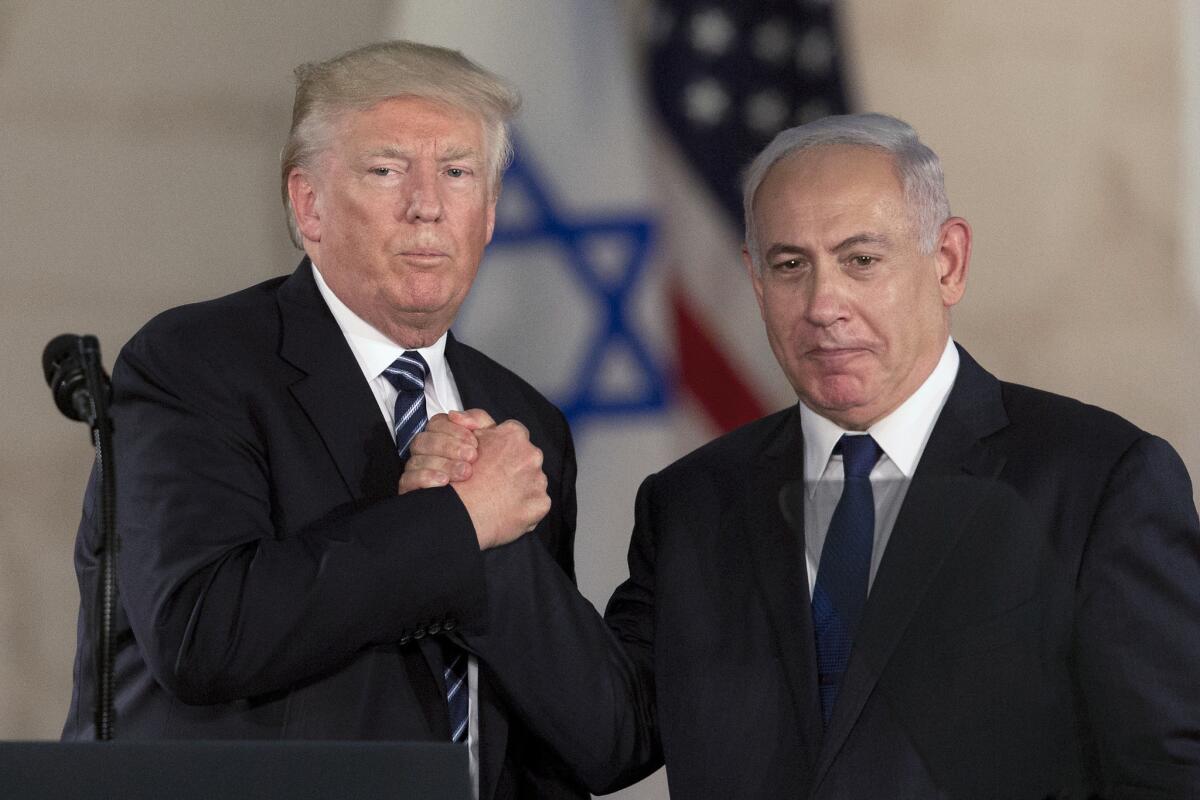
Israeli Prime Minister Benjamin Netanyahu on Thursday faced mounting pressure to make a formal statement critical of President Trump’s response to the anti-Semitism and violence displayed by weekend protesters in Charlottesville, Va.
Netanyahu issued no immediate statement following the weekend’s violence, which involved neo-Nazis, Ku Klux Klan and other racist groups. On Tuesday, in his only comment on the events so far, Netanyahu tweeted “Outraged by expressions of anti-Semitism, neo-Nazism and racism. Everyone should oppose this hatred,” but, as critics were quick to point out, the post was made only in English and not on the prime minister’s personal account.
Opposition figures have been quick to condemn the prime minister, who is known for public admonitions of expressions of anti-Semitism around the world.
In an op-ed published in the daily Haaretz, Labor Party parliamentarian Stav Shafir wrote “Even after U.S. President Donald Trump’s historic comments on Tuesday, where the president of the United States uttered statements that should never be said, Netanyahu stayed silent and shamed the Israeli people as a whole.”
Trump on Tuesday blamed last weekend’s violence in Charlottesville on anti-racism protesters as well as white supremacist groups. A day earlier he had condemned the racist groups widely seen as responsible for the violence.
Netanyahu allies who have spoken out have been reluctant to criticize Trump or Netanyahu by name.
On Saturday, Netanyahu’s Education Minister Naftali Bennett, a member of the right-wing Jewish Home party, said “American leaders must condemn and denounce the displays of anti-Semitism seen over the past few days.”
In a Wednesday “message to the American Jewish community,” Israeli President Reuven Rivlin, a member of Netanyahu’s Likud Party, said, “The very idea that in our time we would see a Nazi flag -- perhaps the most vicious symbol of anti-Semitism -- paraded in the streets of the world’s greatest democracy, and Israel’s most cherished and greatest ally is almost beyond belief.”
But Thursday newspapers in Israel reflected widespread shock. The front page of the mass distribution daily Yediot Ahronot was covered with a picture of Trump and the single word “SHAME.” Ma’ariv, a paper on the center right, led with the headline “Presidential Embrace for Extreme Right.”
Last February, during a visit to the White House, Netanyahu said “there is no greater supporter of the Jewish people and the Jewish state than Donald Trump.”
Late Thursday, in an apparent attempt to mitigate the damage for Netanyahu, Defense Minister Avigdor Lieberman said on Israeli radio that “it is unbearable to see Nazi symbols in the greatest democracy on Earth, the United States” but the “U.S. doesn’t need our advice on how to handle this.”
Rabbi that oversaw Ivanka Trump’s conversion joins chorus criticizing president’s Charlottesville response
President Trump has faced all manner of criticism for his comments blaming “both sides” for the violence at a white nationalist rally in Charlottesville, Va., that killed a counter-protester.
Business executives, military officers, Democrats (of course) and even some fellow Republicans have weighed in with their condemnation.
Now it’s getting personal.
The rabbi who oversaw the conversion of Trump’s daughter, Ivanka, to Judaism has issued an open letter to Congregation Kehilath Jeshurun, a Modern Orthodox synagogue on New York’s Upper East Side, in which he castigated the president for his remarks.
“We are appalled by this resurgence of bigotry and anti-Semitism, and the renewed vigor of the neo-Nazis, KKK and alt-right,” read the letter, published by New York Magazine and signed by rabbis Chaim Steinmetz, Elie Weinstock and Haskel Lookstein.
Lookstein presided over Ivanka Trump’s conversion ahead of her 2009 wedding to Jared Kushner, an Orthodox Jew.
“While we avoid politics, we are deeply troubled by the moral equivalency and equivocation President Trump has offered in response to this act of violence,” the letter said.
Neither Kushner nor Ivanka Trump have publicly addressed the president’s vacillating comments on the violent confrontations Saturday in Charlottesville. Trump’s daughter did issue a tweet on Sunday stating, “There should be no place in society for racism, white supremacy and neo-nazis.”
Trump’s defense of a neo-Nazi rally crossed a line for many Republicans. What will they do about it?
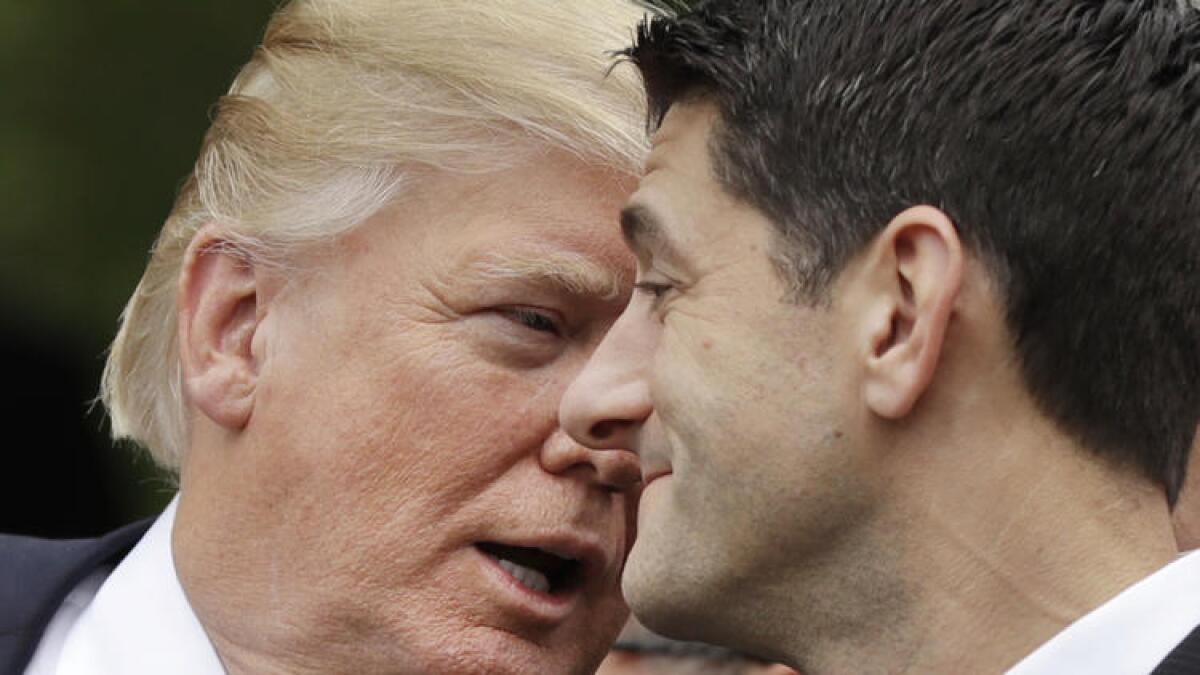
It took President Trump’s defense of a neo-Nazi rally for many Republicans in Congress to publicly distance themselves from the White House, after months of brushing off his impolitic behavior and tweets.
House Speaker Paul D. Ryan said white supremacist bigotry is “counter to all this country stands for.” Senate Majority Leader Mitch McConnell said, “There are no good neo-Nazis,” an apparent reference to Trump’s claim that there were some “very fine people” among the torch-carrying white supremacists in Charlottesville, Va., last week.
Rank-and-file Republicans churned out statements backing away from Trump, and outspoken voices in the party began wondering aloud Wednesday whether Republicans still carry the mantle of the party of Abraham Lincoln.
“We can’t claim to be the party of Lincoln if we equivocate in condemning white supremacy,” tweeted Sen. Jeff Flake (R-Ariz.).
After Trump’s remarks drew a thank-you tweet from former Ku Klux Klan leader David Duke, Sen. Lindsey Graham (R-S.C.) sounded off.
“Many Republicans do not agree with and will fight back against the idea that the party of Lincoln has a welcome mat out for the David Dukes of the world,” Graham said.
But the GOP-led Congress isn’t expected to respond with much more than impassioned statements and social media posts.
Fox News anchor: ‘We couldn’t get anyone to come and defend [Trump] here’
President Trump has doubled down on his beliefs that both sides were to blame for the violence last weekend at a far-right rally in Charlottesville, Va.
As white supremacists and neo-Nazis – who hosted the so-called “Unite the Right” rally in the college town – laud Trump’s assessment, most Republicans and even members of the president’s own family are keeping their distance.
And – at least for now – conservative media is taking note. Here are some of today’s stories:
Shepard Smith: “Let’s be honest, Republicans often don’t really mind coming on Fox News Channel” (Media Matters)
OK, Media Matters is not at all conservative media, but the group did catch these comments from Fox News anchor Shepard Smith shortly after Trump’s combative news conference earlier this week.
“Our booking team -- and they’re good -- reached out to Republicans of all stripes, across the country today. Let’s be honest, Republicans often don’t really mind coming on Fox News Channel,” Smith said. “We couldn’t get anyone to come and defend him here, because we thought, in balance, someone should do that. We worked very hard at it throughout the day, and we were unsuccessful. And of those that are condemning the president’s condemnable actions, I’ve not heard any prominent leaders, former presidents, members of the House or the Senate use his name while speaking in generalities.”
Congressional Republicans rebuke Trump on Charlottesville, again (Weekly Standard)
While Trump has doubled down on his comments that “many sides” were to blame, so, too, have Republicans in condemning the president.
This piece notes how Republicans continue to push back.
“Many members of Congress had already rebuked Trump days ago for not pointedly calling out the far-right groups behind the planned ‘Unite the Right’ rally Saturday. The president at the time denounced violence, hatred and bigotry on ‘many sides,’” writes the Weekly Standard. “In their second such censure since Saturday, GOP allies and critics took to Twitter following the president’s remarks.”
Whose side is he on? (American Spectator)
A lot of people seem to be asking that question.
Trump has been assailed in recent days for what many view as sympathetic comments toward the far right. (Trump has called neo-Nazis, the Ku Klux Klan, etc., “repugnant.”)
Ben Stein writes that Trump was correct in some of his assessment earlier this week.
“For Trump to point out that while the KKK and the Nazis are nauseating, they have free speech rights, is not only correct, but actually brave of him,” he writes. “As Mr. Trump said, the day in C-ville was agonizing. But for those who stood up for free speech, it was a glorious day.”
Phoenix mayor calls on Trump to halt campaign-style rally next week
The mayor of Phoenix has a message for President Trump: Please stay away.
Ahead of Trump’s planned campaign-style rally in the city on Tuesday, Phoenix Mayor Greg Stanton released a statement this week, calling on the president to halt his plans as the nation continues to grapple with fallout from the violence in Charlottesville, Va., last weekend.
“I am disappointed that President Trump has chosen to hold a campaign rally as our nation is still healing from the tragic events in Charlottesville,” Stanton, a Democrat, said. “It is my hope that more sound judgment prevails and that he delays his visit.”
On Wednesday, Trump used social media to urge supporters to show up at the Phoenix Convention Center for his first rally in the Western part of the country since his inauguration.
In recent days, reports also have surfaced that Trump is considering offering a pardon to former Maricopa County, Ariz., Sheriff Joe Arpaio. Last month, Arpaio — who has been sued several times by civilians who said he promoted racial profiling — was found guilty of criminal contempt. A U.S. District Court judge found Arpaio, 85, guilty of defying a judge’s 2011 court order to refrain from racially profiling Latinos during patrols and turning them over to federal immigration authorities.
Stanton also warned Trump against any pardon of the former sheriff.
“If President Trump is coming to Phoenix to announce a pardon for former Sheriff Joe Arpaio, then it will be clear that his true intent is to enflame emotions and further divide our nation,” Stanton said.
Trump says nation’s culture being ‘ripped apart’ by removal of Confederate monuments
Showing his characteristic refusal to back down in the face of criticism, President Trump deepened his defense of Confederate war memorials Thursday, sending out a series of messages on Twitter that adopted the language and arguments of white nationalists who have opposed their removal.
Trump’s equation of Lee and Jackson, who took up arms against the Constitution, with Presidents Washington and Jefferson adopted one of the major arguments that defenders of the Confederate monuments have made.
Monuments to leaders of the Confederacy were erected across the South, and in some other parts of the country, mostly starting in the early years of the 20th century, as whites fought to prevent black citizens from voting and increased the strictures of segregation that barred blacks from schools, hotels, restaurants and white sections of trains and other public accommodations.
The placement of the statues and monuments in public squares coincided with the rise of the Ku Klux Klan and the murder of thousands of blacks by lynch mobs in the early decades of the last century.
To blacks, and many white Southerners, the statues have long been a symbol of racial oppression. In recent years, the movement to take them down and, in some cases, put them in museums instead of public parks, has gained strength in many Southern cities.
Baltimore officials removed their Confederate monuments this week, and the mayor of Richmond, Va., the former Confederate capital, announced Wednesday that his city would begin reviewing its statues.
An embattled Stephen Bannon causes a storm with comments to liberal writer
The political world’s latest feast is chewing over the stunningly candid comments of Stephen K. Bannon, President Trump’s polarizing and already embattled chief strategist, trashing associates and policies on North Korea and China -- to a liberal writer, no less.
This dish isn’t quite as wild as last month’s phone call from Anthony Scaramucci to a New Yorker reporter. That one cost Scaramucci his job 10 days in for its combination of profanity, allusions to sex acts and backstabbing.
Still, Bannon knew that history when he decided to unload his opinions to the liberal co-editor of the American Prospect, Robert Kuttner, whom he had never met.
He is either very confident in his job status or wants to get a few things off his chest before seeing the exit.
Bannon spoke openly about dispatching rivals in the administration, including in the Defense and State departments, who oppose his drive to confront China on trade. “They’re wetting themselves,” he added.
And he flatly contradicted Trump’s strategy of tough talk in the face of North Korea’s nuclear threat: “There’s no military solution, forget it.”
“Until somebody solves the part of the equation that shows me that 10 million people in Seoul don’t die in the first 30 minutes from conventional weapons, I don’t know what you’re talking about, “ Bannon said. “There’s no military solution here, they got us.”
Trump has all but declared victory after Kim Jong Un tamped down his threats to attack Guam this week.
Because there’s no solution to the North Korea problem, the White House should stop worrying about getting China’s help on that issue and go hard against Chinese trade, Bannon said, pushing an issue that has been top priority for him.
The U.S. and China are in an “economic war,” Bannon said, adding that “one of us is going to be a hegemon in 25 or 30 years, and it’s gonna be them if we go down this path” of not confronting the Chinese over trade.
Such a sharp public contradiction on an important and volatile issue like Korea is startling for a top aide who expects to keep his job. Indeed, Trump failed to give Bannon a vote of confidence on Tuesday, saying “we’ll see” when asked if Bannon would stay at the White House.
That lack of a strong endorsement added more intrigue to the American Prospect article.
So was he on the record? Some allies have suggested that Bannon did not think he was. But Kuttner seemed to anticipate those arguments, saying that the question never came up in their phone call. Like most reporters, he therefore considered it on the record.
Bannon is, after all, a former news chief.
“Steve Bannon is not exactly Bambi when it comes to dealing with the press,” Kuttner wrote. “He’s probably the most media-savvy person in America.”
Trump jumps into Arizona primary battle against Sen. Jeff Flake, deepens feud with McCain, Graham
President Trump attacked two Republican lawmakers, Sens. Lindsey Graham of South Carolina and Jeff Flake of Arizona, in tweets Thursday morning, deepening his feud with members of his party.
Both men got the sort of unkind brands Trump favors: “Flake Jeff Flake” and “Publicity seeking Lindsey Graham.”
Strikingly, the president offered a semi-endorsement of Kelli Ward, a former Arizona state senator who plans to challenge Flake in a primary next year -- a stand that would put him at odds not only with Flake, but with the state’s senior senator, John McCain, whom Trump jabbed, not for the first time, earlier this week.
Presidents almost never get involved in primary battles against incumbents of their own parties -- when they have, the efforts have usually ended badly for the White House.
But Flake opposed Trump last year and angered him further in recent weeks with the publication of his new book which sharply criticizes both Trump and Republicans who have supported him.
Trump’s jabs come two days after he again attacked McCain, and after last week’s series of slams against the Republican leader of the Senate, Mitch McConnell. In this case, Trump’s intervention likely will deepen his fight with two senators at once, McCain and Flake -- just as the president has, perhaps not coincidentally, scheduled a political rally in their state for Tuesday, in Phoenix.
Last month, after McCain was diagnosed with brain cancer, Ward publicly called on him to step down from the Senate, saying he would die soon and that Gov. Doug Ducey should consider her as a replacement. She ran against McCain and lost in 2016 in a bitter primary in which she said he was too old to be reelected.
“As a Christian, I know there can always be miracles. But the likelihood that John McCain is going to come back to the Senate and be at full force for the people of our state and the people of the United States is low,” she said in last month’s interview with a local radio station in Arizona.
Later that day, in a written statement, Ward, a doctor, said she had sympathy with McCain’s family because “end of life choices are never easy.”
Ward is a favorite of a family of wealthy, deeply conservative, Republicans donors, the Mercers, who have been major financial backers of Trump and also of his strategist, Steve Bannon.
Earlier this month, Robert Mercer pledged $300,000 to back Ward in her campaign against Flake. Mercer also backed Ward in the campaign against McCain.
White House officials have met with Ward and other candidates who might oppose Flake, and White House press secretary Sarah Huckabee Sanders recently made a point of leaving open the possibility that Trump would get involved in the primary.
Further deepening the feud, Trump also took a swipe at McCain’s closest ally in the Senate, Graham, calling him a “publicity seeking” lawmaker.
Trump criticized Graham for what the senator had said about Trump’s remarks on the violence last weekend in Charlottesville, Va.
Heather Heyer was killed when she was struck by a car driven into a crowd of people on Saturday who were protesting white supremacists in Charlottesville.
The reference to Graham’s “trouncing” presumably referred to Graham’s poor showing when he briefly sought the GOP presidential nomination last year. He was easily reelected to the Senate in 2014.
In a statement, Graham responded that Trump’s praise of Heyer was “very nice and appropriate. Well done.”
“However, because of the manner in which you handled the Charlottesville tragedy, you are now receiving praise from some of the most racist and hate-filled individuals and groups in our country.”
“Please fix this,” Graham concluded.
In a separate tweet, Trump accused “the Fake News” of distorting “what I say about hate, bigotry, etc. Shame!”
President Trump says the ‘alt-left’ was partly to blame for the violence at Charlottesville. Wait: What’s the alt-left?

American politics used to divide itself into two generally opposing streams: Liberals leaned left. Conservatives leaned right.
Then came the era of Donald Trump, and the political landscape shifted from a two-lane highway to a train wreck. “Right” was no longer adequate to include the fringe coalition of disaffected citizens whose views — anti-establishment, anti-diversity, anti-feminist, anti-Semitic, anti-egalitarian, anti-immigrant — were united by nothing so much as their communal anger.
Fast-forward to last week’s events in Charlottesville, Va., when self-described “alt-right” protesters bearing torches and shouting racist slogans paraded through town, confronting an organized group of anti-racist counter-protesters and sparking a raucous melee that left one person dead and many others injured.
Blame for the violence, President Trump said later, lay with “both sides” — with the white supremacist demonstrators who organized the “Unite the Right” rally, and also with those from the “alt-left” who had confronted them.
The who?
Trump administration will keep hands off California’s Sand to Snow National Monument
At least one expanse of protected land in California is now officially safe from the Trump administration’s plan to eliminate or shrink some country’s national monuments.
Interior Secretary Ryan Zinke announced today that the administration has no interest in carving up the Sand to Snow National Monument east of Los Angeles. The 154,000-acre monument that includes some 30 miles of the Pacific Crest Trail was created just last year by President Obama. It is the first California monument Zinke has promised to leave alone in the review Trump ordered of monuments created since 1996 that are more than 100,000 acres.
As with such promises Zinke has made regarding select monuments in other states, there seemed to be little rationale to the timing of the announcement, or why Zinke has chosen to publicly comment on this particular property but none of the five other monuments in California, which include Berryessa Snow Mountain, Carrizo Plain, Giant Sequoia, Mojave Trails and San Gabriel Mountains.
“Today, I am recommending that no changes be made to the Sand to Snow National Monument and that the Monument is no longer under official Department of the Interior review,” Zinke said in a statement. “The land of Sand to Snow National Monument is some of the most diverse terrain in the West, and the monument is home to incredible geographic, biologic, and archaeological history of our nation.”
The Sand to Snow monument links the floor of the Sonoran Desert to the 11,500 foot summit of San Gorgonio Mountain. It lies between Joshua Tree National Park and the San Bernardino National Forest, and features sand dunes, petroglyphs and a variety of ecosystems. It was designated by Obama in February 2016.
Whether any other California monuments are safe from Trump’s vow to shrink the size of public lands is an open question. Zinke has until Aug. 24 to present his plans for changes at all the nation’s monuments. He has been crisscrossing the country visiting various monuments under review, revealing little about his intentions along the way. Any changes he proposes will be met with fierce resistance and certain litigation. Several state attorneys general and large environmental groups say the Trump administration has no authority to rescind monument designations and has only extremely limited authority to tinker with existing monument borders.
The targeting of monuments by the administration has already been confronted by a barrage of public opposition. During the department’s brief public review process, some 2.7 million people submitted comments opposing changes to the monuments, according to the Wilderness Society.
Vice President Mike Pence cuts his Latin American trip short
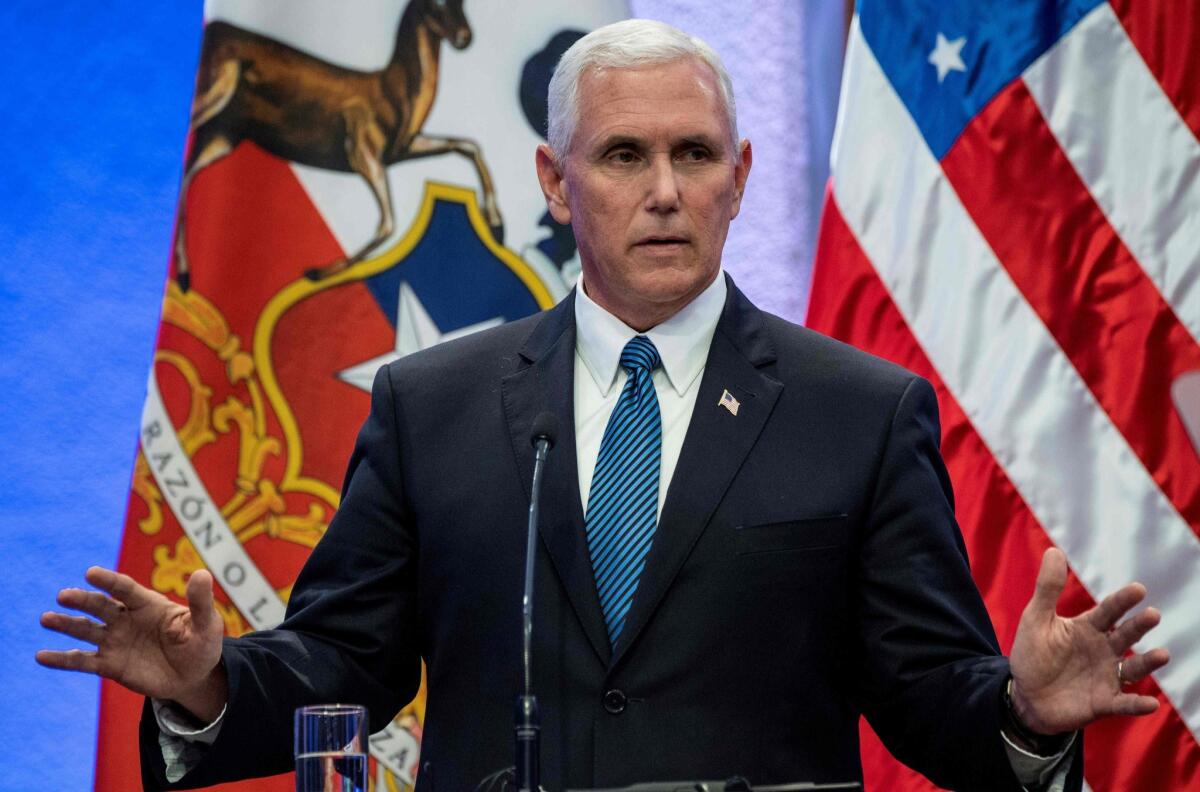
Vice President Mile Pence is cutting short his trip to Latin America so he can join the president at a meeting about North Korea.
The White House announced Wednesday that Pence would travel to Camp David with the president on Friday to meet with the White House national security team to discuss South Asia strategy.
Pence had originally been scheduled to return home Friday afternoon. Instead, he’ll be leaving late Thursday.
Pence is still scheduled to travel to Panama, where he will meet with the country’s president and tour the newly enlarged Panama Canal before returning to Washington.
Campbell Soup CEO Denise Morrison resigns from Trump’s manufacturing council
U.S. military leaders condemn racism following Trump’s comments on Charlottesville violence
America’s top-ranking military officers spoke out forcefully against racial bigotry and extremism, a rare public foray into domestic politics that revealed growing unease at the Pentagon with some of President Trump’s policies and views.
The members of the Joint Chiefs of Staff -- the senior uniformed brass of the Navy, Marine Corps, Army and Air Force -- all posted messages on their official Twitter accounts to denounce the far-right extremists behind Saturday’s violence in Charlottesville, Va.
The messages did not mention Trump, who is the commander in chief, by name. But the rebuke seemed clear in several posts given the bipartisan furor over Trump’s insistence Tuesday that “both sides” were at fault for the violence.
“The Army doesn’t tolerate racism, extremism, or hatred in our ranks,” Gen. Mark Milley, chief of staff of the Army, tweeted Wednesday. “It’s against our Values and everything we’ve stood for since 1775.”
The social media posts suggest the growing discomfort at the top ranks of the Pentagon, which supports Trump’s calls for a new military build-up but has not implemented his sudden call on Twitter last month to block transgender troops from the armed forces.
Since then, the Pentagon has stated that transgender people will continue to serve openly until the White House issues new guidance through proper channels.
In a raucous exchange with reporters Tuesday at Trump Tower in New York, Trump expressed sympathy for those who seek to preserve statues and monuments to Confederate leaders from the Civil War even as numerous communities moved to take them down as a gesture of racial healing.
The planned removal of a statue of Confederate Gen. Robert E. Lee in Charlottesville initially drew hundreds of white supremacists, neo-Nazis and others from across the nation to rally.
The flurry of messages from America’s military leaders had special resonance because several of those who played prominent roles in the far-right rally, or the violence that followed, had served in uniform.
James Alex Fields, the Nazi sympathizer who is accused of killing a woman and wounding more than a dozen others by driving his car into a crowd of counter-protesters, spent four months in the Army in 2015 but failed out of basic training.
In addition, a former Marine who served in Iraq and Afghanistan, Dillon Ulysses Hopper, was identified as the leader of Vanguard America, a group that helped organize the “Unite the Right” rally.
Marine Commandant Gen. Robert B. Neller tweeted Tuesday there is “no place for racial hatred or extremism in the Marine Corps.”
Adm. John Richardson, the Chief of Naval Operations, started the trend on Saturday when he posted a statement on Twitter and Facebook that called the events in Charlottesville “shameful” and “unacceptable.”
“The Navy will forever stand against intolerance and hatred” he said. “We want our Navy to be the safest possible place -- a team as strong and tough as we can be, saving violence only for our enemies.”
Gen. David L. Goldfein, chief of staff of the Air Force, tweeted Wednesday that he stood “together with my fellow service chiefs in saying that we’re always stronger together.”
Separately, the military has moved to publicly disavow white nationalists who were photographed wearing military-affiliated clothing or gear.
The 82nd Airborne Division, whose paratroopers jumped into Europe to defeat the Nazis, used Twitter on Monday to disavow a man photographed giving a Nazi salute while wearing a hat with the division’s insignia.
“Respectfully, anyone who thinks this man represents our culture and values has never worn the maroon beret... and never will,” the 82nd Airborne tweeted.
NAFTA talks begin with U.S. pledging major changes in trade pact
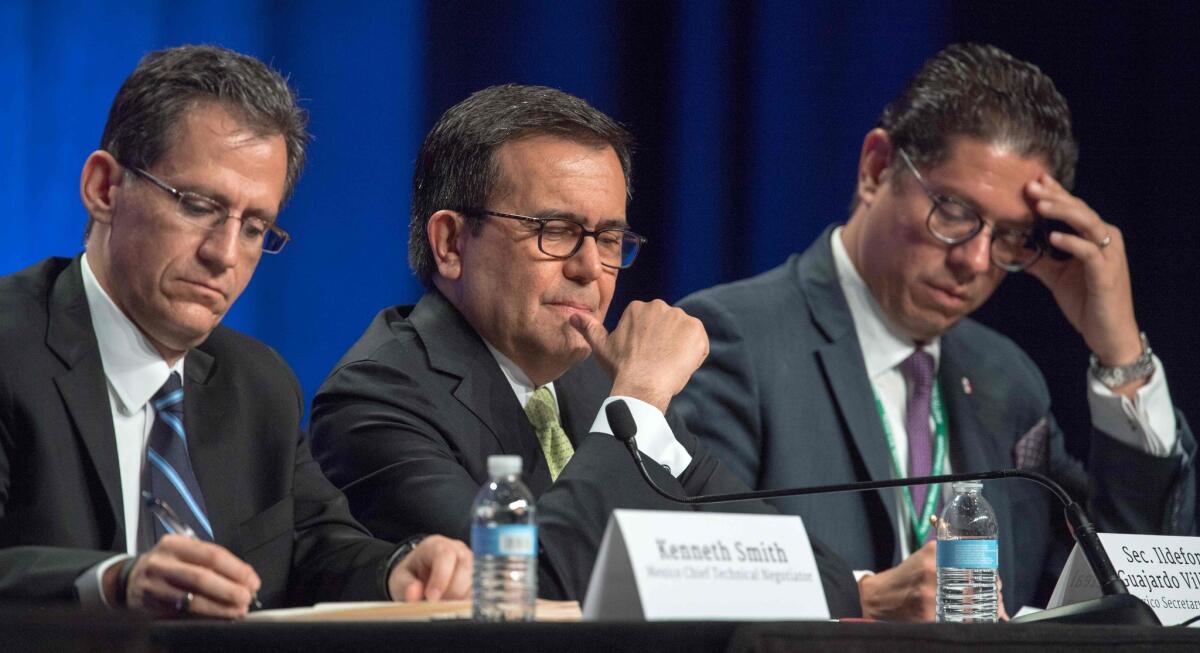
Negotiations to revise the North American Free Trade Agreement began Wednesday on shaky ground, as President Trump’s top trade official insisted that there are fundamental problems with the 23-year-old pact, while Canadian and Mexican officials lauded NAFTA’s substantial benefits to the region and emphasized the importance of protecting those gains.
The contrasting opening statements from U.S. Trade Representative Robert Lighthizer and his counterparts from Canada and Mexico portend the tough bargaining ahead as the three parties, in Washington, began the first of what are expected to be several rounds of talks to renegotiate the landmark free-trade agreement.
Lighthizer acknowledged that many Americans, particularly in farming and those living in border communities, have benefited from NAFTA and that it was paramount to maintain those interests.
But Lighthizer said that “for countless Americans, this agreement has failed.” He blamed NAFTA for the U.S. trade deficit with Mexico, particularly in the auto sector, the closure or relocation of domestic businesses and the loss of at least 700,000 American jobs.
“I want to be clear,” Lighthizer said in a Washington hotel amid trade delegations and journalists. Neither Trump nor he is “interested in a mere tweaking of a few provisions and a couple of updated chapters. We feel that NAFTA has fundamentally failed many, many Americans and needs major improvement.”
Lighthizer briefly reiterated the administration’s trade objectives. They include changes to obtain more balanced trade; to make sure there is a higher percent of North American parts and “substantial” U.S. content in goods that qualify for duty-free trade; to ensure that the U.S. can impose trade sanctions under American laws; and to guard against currency manipulation and to have reciprocity in government procurement.
Seated next to Lighthizer was John Melle, an assistant U.S. Trade representative who will be chief negotiator for the U.S. in the NAFTA talks, and the USTR’s general counsel, Stephen Vaughn.
At separate tables were trade officials from Canada and Mexico. Chrystia Freeland, Canada’s Minister of Foreign Affairs, highlighted the broader cooperative relations among the three countries and the economic benefits that NAFTA have yielded to Canada as well as to the U.S.
Freeland said Canada does not see trade surpluses or deficits as the primary measure of whether bilateral trade relations are working — in contrast to Trump, who repeatedly has talked about U.S. trade deficits as the key data point for bolstering American manufacturing and industrial jobs.
At any rate, she said that U.S.-Canada trade was fairly balanced, with the U.S. actually having a small surplus when services are taken into account. Canada’s objectives, she noted, include modernizing NAFTA and using the negotiations to cut red tape and improve standards on labor and the environment, which were side agreements in the original pact.
“And of course we’re going to seek to uphold the existing elements in NAFTA that are key to our national interests,” she said. Although Freeland did not mention it, one of those top interests is to preserve a dispute-resolution mechanism in NAFTA that the Trump administration wants to eliminate. She summed up Canada’s aim as “bolstering what works and improving what can be made better.”
Mexico’s Secretary of Economy, Ildefonso Guajardo Villarreal, spoke more briefly and took a more defensive posture.
He emphasized the importance of the three countries’ taking a regional perspective in the negotiations, saying that the agreement was about “shaping a common vision of North America.”
“Mexico believes that NAFTA has been a strong success for all parties,” Guajardo said, noting that Lighthizer had told a congressional hearing recently that the objective was to “first of all, do no harm.”
“For a deal to be successful it has to work for all parties involved, otherwise it’s not a deal,” he said.
The first round of talks will run through Sunday. Negotiations are expected to continue next month in Mexico.
Some European leaders denounce Trump, saying he is ‘betraying our Western values’
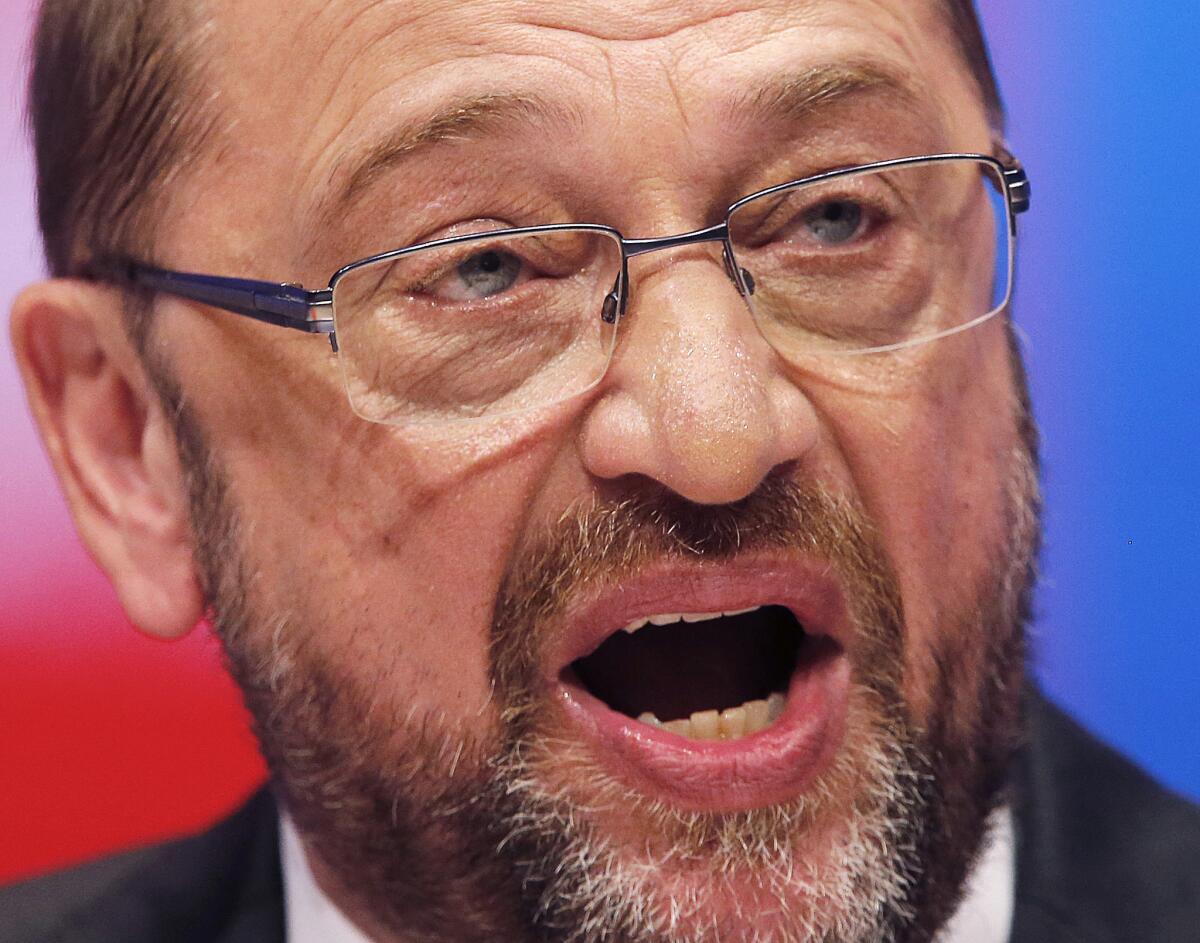
President Trump’s about-face on whom to blame for the violence in Charlottesville, Va., prompted a fresh round of condemnations Tuesday from political leaders across Europe, most of whom usually are reluctant to give any kind of long-distance advice or intervene in the domestic issues of a close ally like the United States.
But Trump’s fresh assertion that “there is blame on both sides” for the deadly violence in Virginia stirred a strong reaction across the continent, especially in Germany, where there is precious little tolerance for hate crime and racism that recall its Nazi past.
“It’s insufferable the way Trump is trying to whitewash the right-wing violence of the thugs in Charlottesville,” said German Justice Minister Heiko Maas. “No one should be allowed to trivialize anti-Semitism and racism by neo-Nazis.”
Martin Schulz, the leader of the center-left Social Democratic party who is trying to defeat German Chancellor Angela Merkel in next month’s election, went further, saying on Twitter: “You have to stand up and fight Nazis. What Trump is doing is extremely dangerous. Those who trivialize violence and hate are betraying our Western values.”
Merkel had earlier criticized Trump’s initial comments, saying: “It’s racist, far-right violence and that requires determined and forceful resistance no matter where in the world it appears.”
British Prime Minister Theresa May, perhaps one of Trump’s few friends in Europe, also condemned the president’s comments, in which he said leftist counter-demonstrators were also to blame for Saturday’s violence.
Speaking in Portsmouth, England, on a visit to a new aircraft carrier, May said: “I see no equivalence between those who propound fascist views and those who oppose them, and I think it is important for all those in positions of responsibility to condemn far-right views whenever we hear them.”
And in Ireland, Foreign Minister Simon Coveney tweeted: “So called white-supremacy is horrible, racist hatred that should be called what it is and condemned.”
Read 3M CEO Inge Thulin’s statement on his resignation from Trump’s manufacturing council
Next up as Trump’s communications director: 28-year-old loyalist Hope Hicks
Hope Hicks, one of President Trump’s most loyal and longest-serving aides, is taking on one of the most thankless jobs in politics: serving as his communications director.
The job is only temporary, according to a White House official who confirmed the appointment to reporters while demanding not to be named. The official promised that a permanent communications director will be named “at the appropriate time.”
Though the president often criticizes reporters for using unnamed sources, the White House announced Hicks’ appointment without allowing reporters to name the source of the information, insisting that they attribute the news as “Per a WH official”
Hicks, 28, who first worked in the Trump Organization and for the president’s daughter, Ivanka Trump, served as Donald Trump’s campaign spokesperson and has been a senior aide in the White House since Trump’s inauguration.
If only on an interim basis, she takes a job that already has a troubled history in Trump’s young White House. Depending on how one counts, Hicks is the fourth or fifth communications director the president has chosen since the election.
Trump’s first pick for the job, Jason Miller, backed out before the president was inaugurated. He was replaced by Sean Spicer, who initially held a dual role as communications director and press secretary starting in January.
Michael Dubke, a veteran Republican media consultant, was brought on as communications director between February and early June.
When Dubke exited, Spicer resumed the dual duties until Anthony Scaramucci was enlisted as communications director last month. “The Mooch” had an explosive 10-day tenure, which ended when he was pushed out after making a number of incendiary comments about other members of the White House team to a reporter. Scaramucci never technically held the job, not making it long enough to get sworn in.
Spicer resigned from Trump’s staff in opposition to Scaramucci getting the job, but he had been filling in at the White House at least through the beginning of this week.
The job has proved especially difficult because Trump tends to ignore communications advice from his aides, tweeting often, holding impromptu news conferences and undercutting media strategies and talking points cooked up by his staff. He is also obsessed with the flood of leaks that have plagued the White House amid internal turf battles.
Trump’s staff members have repeatedly called the president his own best communicator.
But as recently as Tuesday, aides were stunned when Trump turned a planned announcement on infrastructure policy into a free-wheeling news conference in which he drew widespread political criticism for equating the role of white supremacists and those protesting against them in the weekend violence in Charlottesville, Va.
Those factors may make finding a replacement difficult.
“Clearly, nobody else qualified is willing to fill the job,” said Rick Tyler, a veteran Republican media consultant. “Most communications people understand communications and the media and how to be effective in a very different way than Trump does.”
Most political consultants have urged Trump to focus on his policy agenda “Most of the time, he’s focused on petty personal grievances and wars with the media,” Tyler said.
Presidents Bush issue joint statement condemning racism, don’t mention Trump by name
Mitch McConnell: ‘There are no good Nazis’
Senate Majority Leader Mitch McConnell did not name President Trump in a statement on Wednesday, but clearly sought to distance the Republican Party from the White House’s position on white supremacists.
“We can have no tolerance for an ideology of racial hatred,” McConnell said in statement.
“There are no good neo-Nazis, and those who espouse their views are not supporters of American ideals and freedoms. We all have a responsibility to stand against hate and violence, wherever it raises its evil head.”
Organizers of the Charlottesville, Va., white nationalist rally that erupted in violence over the weekend are planning another event in Lexington, Ky., challenging the majority leader in his home state.
Further rallies threaten to deepen the schism in the GOP between Trump, who has sought to defend some of those who participated in the Unite the Right rally in Charlottesville, and Republicans who are reeling from the spectacle of the party of Lincoln being connected with known hate groups.
The issue may also be more personal for McConnell, whose Taiwan-born wife, Transportation Secretary Elaine Chao, was beside Trump as his infrastructure news conference Tuesday erupted in a fiery defense of some of those marching Saturday.
“White supremacist, KKK, and neo-Nazi groups who brought hatred and violence to Charlottesville are now planning a rally in Lexington,” McConnell said. “Their messages of hate and bigotry are not welcome in Kentucky and should not be welcome anywhere in America.”
McConnell did not directly criticize Trump, perhaps hesitant to launch a full-scale confrontation with the president or alienate his supporters.
Mayor of Provo, Utah, likely to fill seat vacated by former Rep. Jason Chaffetz
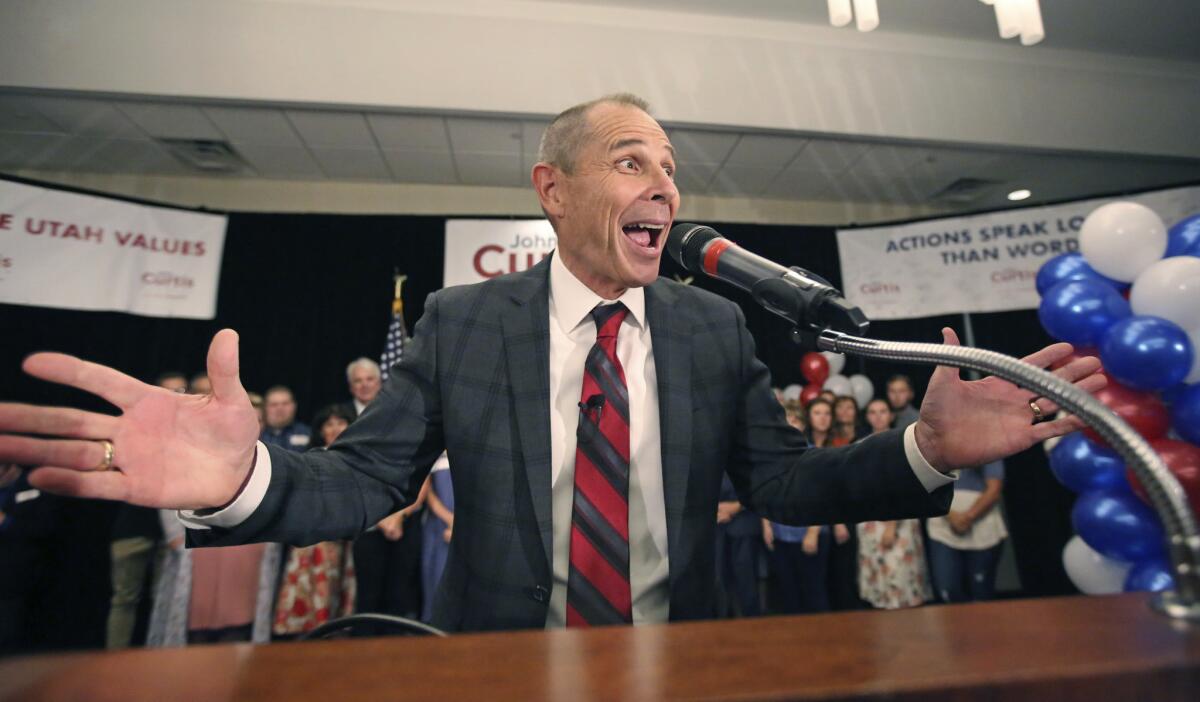
John Curtis, the mayor of Provo, Utah, will likely fill the congressional seat vacated by former Rep. Jason Chaffetz.
On Tuesday, Curtis won a three-way Republican primary in the state’s deeply conservative 3rd Congressional District, which spans much of Provo and portions of Salt Lake City.
Curtis, a Mormon, who has served as mayor since 2010, is widely regarded as a moderate. Last year, he did not vote for then-presidential candidate Donald Trump, citing moral concerns about the Republican nominee. Even so, on Wednesday, Trump retweeted a Fox New alert about Curtis’ win, saying “Congratulations John!”
Curtis’ primary victory is expected to lead to a win in the fall general election; Democrats are significantly under-matched in the district. Republicans have won the seat in every general election since 1998.
Chaffetz had held the seat since 2009, but in June stepped down to begin work at Fox News.
While in Congress, Chaffetz served as chairman of the House Oversight Committee and was a leader among Republicans in investigations of Hillary Clinton’s use of a private email server while she was secretary of State.
Trump provokes new furor by giving foes of white supremacy equal blame for Charlottesville violence
President Trump on Tuesday forcefully blamed counter-protesters as well as white supremacist groups for the weekend’s deadly violence in Charlottesville, Va., abandoning his scripted condemnation just a day earlier of neo-Nazis, the Ku Klux Klan and other racist groups widely seen as responsible.
Trump reverted instead to his initial stance, which he articulated just after a woman died on Saturday when a car allegedly driven by a white supremacist sped through counter-protesters and pedestrians. In that first reaction he faulted “many sides” for the violence — igniting two days of bipartisan criticism that Trump sought to answer with Monday’s unequivocal denunciation of white supremacists.
On Tuesday, the president called his Saturday response “a fine statement.”
President Trump, at another low moment, announces rally in Arizona
President Trump, facing another tough patch in his presidency, will hold his first campaign rally in the West next week, announcing Wednesday that he will travel to Arizona.
The rally could provide a place for Trump to announce a pardon for Joe Arpaio, the former Arizona county sheriff and Trump campaign supporter who was recently convicted of having defied a judge’s order to stop racial profiling of Latinos when he was in office.
Trump told a Fox News contributor this week that he was considering a pardon, which would be broadly controversial but potentially excite some of his core supporters.
The trip west is a departure for Trump, who has previously stuck mostly to Ohio, West Virginia and other areas with traditional white, blue-collar voters for such events. He has seldom traveled west of the Mississippi since becoming president.
Prior presidents have not held campaign rallies so early in their terms. But Trump is energized by his crowds and has relished the opportunity to go off-script amid supporters.
His campaign announced that next week’s rally will take place Tuesday night in Phoenix.
Trump’s standing in polls has declined significantly, but his core supporters have shown the most loyalty.
He caused a major furor Tuesday in comments that blamed both sides for last weekend’s racial violence in Charlottesville, Va., getting rebukes from Republican lawmakers as well as Democrats.
Republicans distance themselves all over again from Trump’s Charlottesville remarks
One by one, Republicans distanced themselves over the weekend from President Trump’s comments that blamed both sides for the violence in Charlottesville, Va.
On Tuesday, they had to do it all over again.
“Good time to re-up,” wrote Sen. Marco Rubio of Florida, retweeting his Saturday message, which read: “Very important for the nation to hear @potus describe events in #Charlottesville for what they are, a terror attack by #whitesupremacists.”
Rubio launched a new six-part reaction to Trump Tuesday.
House Speaker Paul Ryan (R-Wis.) did not name the president, but made clear he does not share Trump’s views.
“We must be clear. White supremacy is repulsive. This bigotry is counter to all this country stands for. There can be no moral ambiguity.
Sen. Dean Heller of Nevada simply pressed retweet on his Saturday tweet: “Racism, hatred, and violence as a means to an end is unacceptable and shameful. There’s no room for it in this country. #Charlottesville.”
And Sen. Orrin Hatch of Utah re-upped his comments from Saturday when he wrote, “We should call evil by its name. My brother didn’t give his life fighting Hitler for Nazi ideas to go unchallenged here at home.”
Trump endured days of criticism after he failed to criticize the neo-Nazis and white supremacists who descended on the college town over the weekend in a rally that erupted in violence, leaving one counter-protester dead and a score of others injured.
Trump reversed course Monday in a carefully choreographed statement disavowing the Ku Klux Klan and other racist groups. But Tuesday, he snapped back to his earlier form during unscripted remarks at a news conference in Trump Tower.
Democrats were quicker and louder in their criticism than Republicans, who have labored to figure out how best to handle - or ignore - Trump.
“This is sick,” wrote Sen. Elizabeth Warren (D-Mass.). “The President of the United States just defended neo-Nazis and blamed those who condemn their racism and hate.”
Wrote Sen. Brian Schatz (D-Hawaii): “As a Jew, as an American, as a human, words cannot express my disgust and disappointment. This is not my President.”
“Charlottesville violence was fueled by one side: white supremacists spreading racism, intolerance & intimidation,” tweeted Sen. Tim Kaine (D-Va.). “Those are the facts.”
Many Republican lawmakers remain reluctant to criticize the president because they have been elected from states and congressional districts where Trump remains popular.
Over the weekend, though, Trump’s failure to take on the neo-Nazis was too much for many Republicans, and Tuesday’s repeat seemed to cross a line for some.
Josh Holmes, a former top aide to Senate Majority Leader Mitch McConnell (R-Ky.) who remains close to Senate Republicans, established a clear marker with a quick, critical reaction to Trump’s reversal.
“The president just erased yesterday’s speech and is now back to Saturday’s position on Charlottesville. Unbelievable,” he wrote.
“The President did everything he could today to defend and deflect criticism from the Alt-right white supremacist movement. It’s a disgrace,” tweeted Evan McMullin, a conservative who ran for president as an independent last year.
Some Republicans feel free to speak their minds.
Rep. Ileana Ros-Lehtinen (R-Fla.), who is retiring after this term, tweeted: “Blaming “both sides” for #Charlottesville?! No. Back to relativism when dealing with KKK, Nazi sympathizers, white supremacists? Just no.”
Others simply focused elsewhere.
The president’s media event at Trump Tower on Tuesday had been intended to showcase his efforts to rebuild the nation’s infrastructure.
Oklahoma GOP Sen. James M. Inhofe stuck with that message.
“I look forward to continuing to work with the president to remove barriers to improving our nation’s infrastructure,” Inhofe tweeted.
4:42 p.m.: This story was updated with Ryan’s tweet.
From blaming ‘many sides’ to ‘racism is evil’ and back again, what Trump has said so far on Charlottesville
First President Trump blamed “many sides.” Then he called racism “evil.” In his latest remarks, “alt-left” and “alt-right” share responsibility.
Here’s a look at President Trump’s circular round of statements following the violence in Charlottesville, Va., that left three people dead and dozens injured.
Saturday
“We condemn in the strongest possible terms this egregious display of hatred, bigotry and violence on many sides,” Trump says from his golf resort in Bedminster, N.J. Then, looking into the camera, he repeated, “On many sides.”
The speech echoed an earlier tweet that denounced hate but didn’t explicitly place blame on any one group.
The ad-libbed and unscripted moment propelled a torrent of bipartisan criticism for not denouncing the far-right groups that initiated the violence, and the man who drove into a crowd of counter-protesters that left one dead.
Sunday
After numerous inquiries from reporters specifically asking whether Trump opposed white supremacists, the White House issues the following statement:
“The president said very strongly in his statement yesterday that he condemns all forms of violence, bigotry and hatred. Of course that includes white supremacists, KKK, neo-Nazi and all extremist groups. He called for national unity and bringing all Americans together.”

Trump speaks on Klan violence in Virginia
Monday
During a scripted appearance, Trump condemns the far-right groups in Charlottesville.
“Racism is evil — and those who cause violence in its name are criminals and thugs, including KKK, neo-Nazis, white supremacists, and other hate groups are repugnant to everything we hold dear as Americans,” Trump says.
For many, his explicit condemnation came too late. Three CEOs stepped down from a White House manufacturing council, and criticism did not subside.
Trump tweeted his take on the continuing criticism:
“Made additional remarks on Charlottesville and realize once again that the #Fake News Media will never be satisfied...truly bad people!”
Later that night, Trump retweets a well-known alt-right media figure who pushed the PizzaGate and Seth Rich conspiracy theories. That tweet asked why there was “no media outrage” about continuing violence in Chicago.
Tuesday
The morning begins with backlash over a cartoon meme Trump retweeted. The image showed a train labeled “Trump” plowing into a person whose face is covered by a CNN logo. A White House official tells The Times that the retweet was accidental and, in an unusual move, it was deleted from the president’s personal account.
Hours later, Trump, speaking off the cuff at Trump Tower in New York, reverts to his original message about blame being shared.
“I think there is blame on both sides. You look at both sides. I think there is blame on both sides,” he said, adding, “You had a group on one side that was bad and a group on the other side that was very violent.”
Trump equates the actions of the “alt-left” protesters to the “alt-right.”
“What about the ‘alt-left’ that came charging at, as you say, the ‘alt-right’? Do they have any semblance of guilt?” Trump said. “They came charging with clubs in their hands.”
The president sharply criticizes the man officials say drove into the crowd of counter-protesters in Charlottesville, killing Heather Heyer.
“The driver of the car is a disgrace to himself, his family and his country,” he said. “You can call it terrorism; you can call it murder. You can call it whatever you want.”
Watch Trump comment on Stephen K. Bannon’s future: ‘We’ll see’

“We’ll see,” Trump says when asked about his chief strategist, Steve Bannon.
We’ll see. Look, look, I like Mr. Bannon. He’s a friend of mine. But Mr. Bannon came on very late. You know that. I went through 17 senators, governors and I won all the primaries. Mr. Bannon came on very much later than that. And I like him. He’s a good man. He is not a racist, I can tell you that. He’s a good person. He actually gets a very unfair press in that regard. But we’ll see what happens with Mr. Bannon.
— President Trump at a news conference Tuesday in New York
‘Alt-left’ charged at ‘alt-right,’ Trump says, again placing blame for Charlottesville violence on ‘both sides’
President Trump’s planned infrastructure announcement unraveled into chaos as he all but erased any credit he got on Monday for condemning white supremacists for the deadly confrontation in Charlottesville, Va.
Trump said it was “a horrible day” but said several times that counter-protesters were not getting enough scrutiny for their role in the confrontation and emphasized his belief that many of the protesters who joined with white nationalists were innocent.
“What about the ‘alt-left’ that came charging at, as you say, the ‘alt-right’? Do they have any semblance of guilt?” Trump said. “They came charging with clubs in their hands,” he said of the counter-protesters.
Trump effectively reopened the debate — saying “there is blame on both sides” — despite insistence from politicians in both parties that white supremacists and other racists deserved to be singled out.
“You had a group on one side that was bad, and you had a group on the other side that was also very violent. And nobody wants to say that, but I’ll say it,” he said.
Trump defended the cause of those who gathered to protest the removal of a statue honoring Gen. Robert E. Lee and the Confederacy.
“Was George Washington a slave owner. So will George Washington lose his status?” he said. “What do you think of Thomas Jefferson? You like him? ... You’re changing history. You’re changing culture.”
While Trump condemned the driver who rammed the crowd and killed a counter-protester, he declined to label the action specifically as an act of terrorism.
“The driver of the car is a disgrace to himself, his family and his country,” Trump said. “You can call it terrorism; you can call it murder. You can call it whatever you want.”
Trump’s choice in Alabama Senate race faces uphill battle in Tuesday’s primary as Republican loyalties split
President Trump’s preferred candidate in the Alabama Senate primary Tuesday faces an uphill battle in a contest that could set the tone for other Republican Party skirmishes ahead of the 2018 midterm election.
Trump endorsed Sen. Luther Strange, who should have had an easy lock on a seat he took over when Jeff Sessions, the state’s longtime senator, resigned to become the Trump administration’s attorney general.
But the race has become an early test of Trump’s power to persuade his most dedicated supporters. Trump’s approval rating remains sky-high in Alabama, but that enthusiasm has not spilled over to Strange, who is also favored by Senate Majority Leader Mitch McConnell (R-Ky.).
Strange is trailing fiery former judge Roy Moore, according to recent polling.
The outcome could foreshadow a deepening feud between the GOP’s base voters and party leaders in the months to come.
Trump rips CEOs ditching his manufacturing council as ‘grandstanders’
President Trump on Tuesday ripped three top corporate chief executives who resigned from his manufacturing council in protest of his handling of the Charlottesville, Va., violence, calling them “grandstanders.”
Trump’s missive came shortly before another member of the council, Scott Paul, president of the Alliance for American Manufacturing trade group, announced that he was stepping down as well.
Trump said on Twitter that “for every CEO that drops out of the Manufacturing Council, I have many to take their place.”
He then said that “grandstanders should not have gone on” the council, which Trump formed shortly after taking office in January.
Trump described former FBI Director James B. Comey as “a grandstander” in a May interview with NBC in explaining why he fired him.
Kenneth Frazier, chief executive of Merck & Co., publicly announced Monday that he was stepping down from the council because he felt “a responsibility to take a stand against intolerance and extremism.”
One of the nation’s most prominent African American executives, Frazier did not mention Trump by name.
But Trump had been criticized for not explicitly condemning white supremacists after violent clashes with counter-protestors turned deadly in in the Virginia college town on Saturday.
Trump lashed out at Frazier on Twitter, criticizing Merck for what he said were its high drug prices.
Although Trump delivered a statement later Monday specifically denouncing “the KKK, neo-Nazis, white supremacists and other hate groups,” that didn’t stop the fallout.
Kevin Plank, chief executive of Under Armour Inc., and Brian Krzanich, chief executive of Intel Corp., announced Monday night that they were stepping down as well.
Then on Tuesday, Paul said he was joining them.
Former Treasury Secretary Lawrence Summers, who was a top economic advisor to President Obama, said Tuesday that all the CEOs on the advisory council should resign.
“No advisor committed to the bipartisan American traditions of government can possibly believe he or she is being effective at this point,” Summers wrote in a column in the Washington Post. “And all should feel ashamed for complicity in Mr. Trump’s words and deeds. I sometimes wonder how they face their children.”
Following Charlottesville violence, Trump’s retweets -- and deletes -- cause a stir
President Trump’s latest off-hours tweets, including one suggesting violence against CNN and another retweeting an alt-right conspiracy theorist, reignited criticism of him as he tries to get past his awkward and belated condemnation of the racially motivated violence in Charlottesville, Va.
The White House took the unusual step of deleting two of the president’s retweets Tuesday morning, including one that depicted the “Trump Train” mowing down a CNN reporter, days after a white supremacist in Charlottesville had driven into a crowd of counter-protesters and killed a woman, Heather Heyer.
The deletions were a rare move for Trump aides given the president’s refusal to admit mistakes in judgment or action. The third eyebrow-raising tweet, from the conspiracy theorist, remains on his Twitter feed.
A White House official, speaking on the condition of anonymity, said the two removed retweets had been “inadvertently posted” and, as soon they were noticed, they were “immediately deleted.” The official would not say who noticed the tweets and advised the president that they should be removed.
The first post came late Monday, when Trump retweeted an alt-right media figure who pushed the PizzaGate and Seth Rich conspiracy theories. That one was not deleted.
On Tuesday morning, Trump retweeted, then deleted, a cartoon image of a man with a CNN logo on his face being hit by the “Trump” train.
Also early Tuesday, Trump retweeted a post from Twitter user Mike Holden, who was responding to a “Fox & Friends” tweet by calling either the president or Joe Arpaio, the former Arizona sheriff, a fascist. The tweet came in response to a report that Trump was considering a pardon for Arpaio, a prominent supporter who was convicted two weeks ago of defying a court order to end his practice while he was sheriff of Maricopa County of racially profiling Latinos and bringing detainees to federal immigration officials.
The retweet was deleted, but Holden appeared to have taken a screenshot.
The social media storm added to the outrage that continued to pour in over the president’s delayed condemnation of white supremacists, neo-Nazis and the Ku Klux Klan following the deadly violence in Charlottesville over the weekend. Trump had initially declined to call out the white supremacists and other hate groups who perpetrated the crimes by name, choosing instead to fault “many sides.”
His more specific statement on Monday, naming the racist groups, appeared strained, as he first boasted about the economy and later called a reporter who asked about his delay denunciation “fake news.” He tweeted later Monday that that “the #Fake News Media will never be satisfied.”
Under Armour CEO quits Trump’s manufacturing council
Kevin Plank, chief executive of athletic equipment maker Under Armour Inc., announced in a tweet Monday that he was stepping down from a White House manufacturing council “to focus on inspiring & uniting through power of sport.”
He indicated that controversy over the criticism President Trump received for not explicitly condemning white supremacists after violent clashes with counter-protestors turned deadly in Charlottesville, Va., on Saturday led to his decision, saying the company “engages in innovation and sports, not politics.”
Plank became the second CEO to step down from Trump’s manufacturing council. Kevin Frazier, chief executive of pharmaceutical giant Merck & Co., publicly resigned from the council Monday morning, declaring he felt “a responsibility to take a stand against intolerance and extremism.”
Soon after, Trump lashed out at Frazier on Twitter.
Pentagon chief says North Korean missile launch toward Guam could quickly ‘escalate to war’
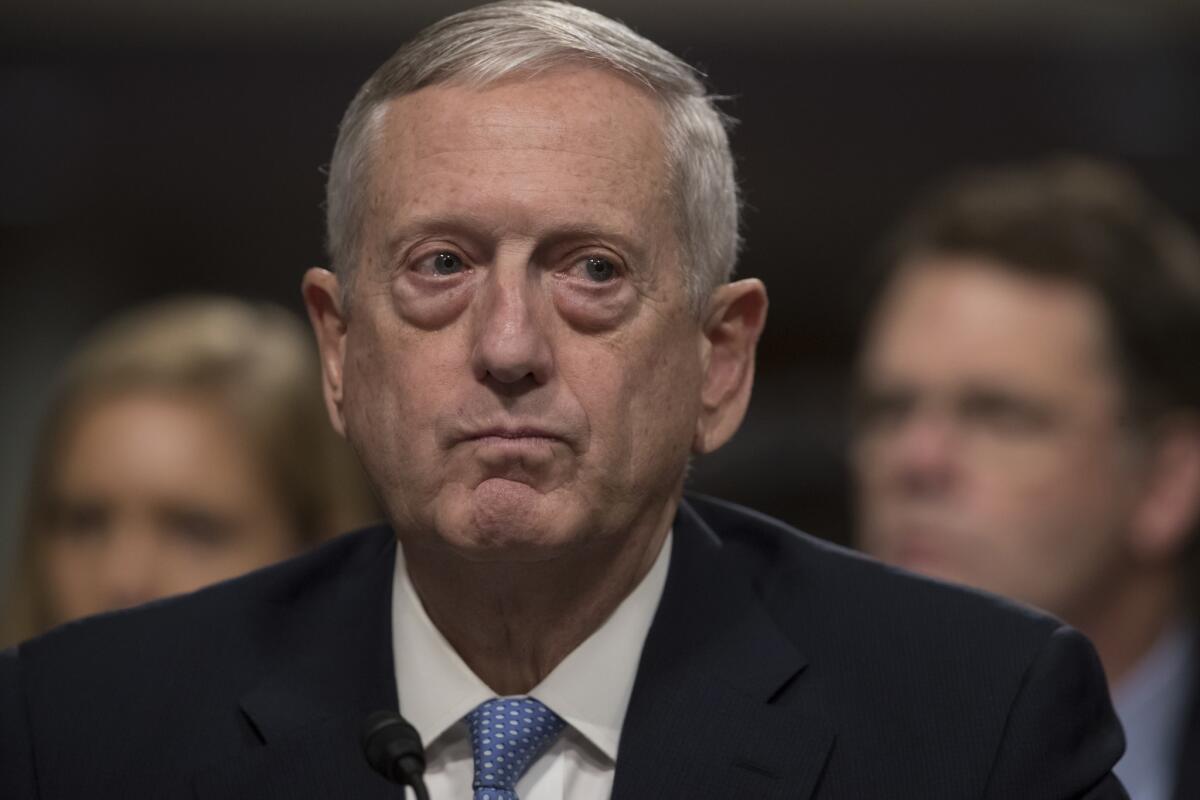
Defense Secretary James N. Mattis warned Monday that if North Korea carried out its threat to launch missiles toward Guam, a U.S. territory in the western Pacific, it could escalate to war.
“If they fire at the United States it could escalate into war very quickly,” Mattis told reporters at the Pentagon. “That’s called war, if they shoot at us.... You don’t shoot at people in this world unless you want to bear the consequences.”
Mattis cited a classic Hollywood political satire about nuclear war to say he wasn’t drawing red lines or making idle threats to spark a confrontation.
“It’s not declaring war -- it’s not that I’m over here, Dr. Strangelove, doing things like that,” he said.
North Korea tested an intercontinental ballistic missile last month for the first time, and U.S. intelligence agencies assess that Pyongyang can build a nuclear warhead small enough to fit atop a long-range missile, although it’s not clear if it can target U.S. cities.
The latest missile tests led to a sharp rise in tensions. The United Nations Security Council voted unanimously to add new sanctions on North Korea and President Trump warned he would unleash “fire and fury” if Pyongyang continued its threats.
On Tuesday, North Korea said its autocratic ruler, Kim Jong Un, had reviewed a plan to fire four mid-range missiles over Japan and into international waters at least 20 miles off Guam, where the U.S. military operates several major bases.
Mattis said a North Korean missile hitting the U.S. territory, or the continental United States, was an act of war and would almost certainly trigger a U.S. military retaliation.
He was ambiguous as to how Washington would respond if Pyongyang launched a missile toward Guam as a show of force, and it landed far offshore.
“War is up to the president, and perhaps up to Congress,” Mattis said. “The bottom line is we will defend the country from attack.”
The U.S. military would be able to determine if a North Korean missile is headed toward Guam “within moments,” he said, because of spy satellites, radars and other high-tech sensors that track missile launches.
If necessary, “we’ll take it out,” Mattis said, suggesting the U.S. military would attempt to shoot it down with anti-missile interceptors on land and ships.
Earlier, Mattis and Secretary of State Rex Tillerson sought to defuse tensions in a Wall Street Journal op-ed that said the Trump administration did not seek “regime change or accelerated reunification of Korea,” issues of special concern to China, which supports Pyongyang.
Gen. Joseph F. Dunford, chairman of the Joint Chiefs of Staff, arrived late Monday in Beijing to meet with Chinese military leaders. Earlier, he met with South Korea President Moon Jae-in at Osan Air Base, a U.S. Air Force base about 40 miles south of Seoul.
Dunford said in Beijing that his goal was to “continue to develop our military-to-military relationships, to mitigate the risk of miscalculation in the region and to have cooperation where those opportunities exist,” according to a Pentagon statement.
Protesters prepare for Trump’s return to New York

A stream of protesters spanning blocks in Manhattan converged on Trump Tower on Monday afternoon as President Trump prepared to stay overnight in the city for the first time since he took office.
Shouting “No Trump, no KKK, no fascist USA,” thousands of protesters jammed sidewalks along Fifth Avenue in advance of Trump’s arrival from Washington.
During a brief visit back to the White House, which is undergoing renovations while he vacations at his golf resort in New Jersey, Trump took a firmer stand on the white supremacist violence that wracked Charlottesville, Va., over the weekend.
“Racism is evil,” he said, calling hate groups “repugnant to everything we hold dear as Americans.”
Yet for many of the protesters, Trump’s remarks were too late, overshadowed by his statement on Saturday that “many sides” were responsible for the Charlottesville violence and his initial failure to name white supremacist groups as aggressors.
Bearing signs with slogans like “White silence is violence” and “Too little, too late,” the crowd took aim at the president as a divisive figure.
For several protesters, Trump’s visit to his hometown provided an opportunity to vent long-standing frustrations.
“I have been grieving for almost a year,” said Janice Erlbaum, 48, of New York, who held up a “This Jew Will Replace You” sign, a response to the “Jew will not replace us” chant heard during the neo-Nazi march in Charlottesville.
“Honestly this is the only thing that makes me feel better,” she said.
For Marvin Knight, 74, of Brooklyn, the presidential visit meant a chance to confront Trump at home.
“Once he came to New York, I knew I was coming,” he said. His one message for the president: “Resign.”
Taylor Almazar, 15, of Queens decided to protest after watching the Charlottesville violence over the weekend.
She had never protested before, she said, but felt that Trump’s election had made prejudice more acceptable, even in her own life. Posters for an LGBT club in her school were recently torn down, she said.
“We need to bring out peace instead of hatred,” she said. “This city should be filled with peace.”
As they have during other events, police converted the blocks surrounding Trump Tower into a security zone, with pedestrians funneled through a network of metal gates. A series of dump trucks filled with sand provided a moveable barrier in front of the tower’s entrance.
Trump Tower has become a focal point for activism since Trump’s election and a symbol of the president’s businesses, with the golden-hued entrance framed by logos for Trump Ice Cream, the Trump Store and Trump Grill. The heavy security has been a source of consternation to New Yorkers working and commuting in the already-congested city center.
The building also remains an object of curiosity for tourists and passersby, who snap photos, sometimes with thumbs up, sometimes with middle fingers extended at the president whose name gleams over Fifth Avenue in gold block letters.
For some protesters, there was unavoidable symbolism in the president in the tall tower.
“They try to make you look isolated and crazy,” said Judith Cuttler of New York, gesturing to the crowd. “But we’re the majority.”
Anti-government extremist arrested in Oklahoma bomb plot

A 23-year-old man who said he hated the U.S. government has been arrested by the FBI for allegedly trying to blow up an Oklahoma City bank with what he thought was a 1,000-pound bomb in a truck.
According to a criminal complaint, Jerry Drake Varnell wanted to start a militia group and admired Timothy McVeigh, the domestic terrorist who was convicted and executed for setting off a massive truck bomb outside a federal building in Oklahoma City in April 1995.
Varnell thought he was dealing with two fellow sympathizers in the anti-government movement but they were a confidential informant and an undercover FBI agent working in a sting operation, according to the complaint.
Varnell, who lives with his parents, was initially charged on Sunday with attempting to use explosives to destroy a building in interstate commerce. If convicted, he would face a mandatory minimum sentence of five years. He was to be arraigned late Monday.
The FBI complaint said Varnell initially said he was interested in targeting the Federal Reserve Bank building in Washington, D.C.
“I’m out for blood,” Varnell wrote to the informant, according to the complaint, saying he wanted to take some action that would “somehow cripple the government.”
Varnell said he had “III percent ideology,” a reference to a militia group called the Three Percenters, which believes the federal government is violating the U.S. Constitution, the complaint says.
Raul Bujanda, the FBI agent in charge of the investigation, said there was no apparent link between Varnell and Saturday’s violence by neo-Nazis, white supremacists and other far-right extremists in Charlottesville, Va.
Bujanda said Varnell was not a member of any militia group, according to video of a press conference posted on NewsOK.Com.
The FBI has been monitoring Varnell since last December, the complaint said.
On Friday, Varnell helped the undercover agent build what he thought was a powerful truck bomb using ammonium nitrate and fuel oil, the materials McVeigh used in 1995 to kill 168 people and injure hundreds more.
The next day, Varnell parked the truck next to a BancFirst building in downtown Oklahoma City.
Varnell also made several cell phone calls that he thought would trigger the blast, the complaint said. The truck and all of the materials, which were inert, were supplied by the FBI.
The FBI said Varnell wrote a statement that he wanted posted on social media after the explosion he expected. Varnell said it was “retaliation against the freedoms that have been taken away from the American people.”
The public wasn’t at risk during the investigation, said Kathryn Peterson, special agent in charge of the FBI in Oklahoma.
“I can assure the public, without hesitation, that we had Varnell’s actions monitored every step of the way,” she said in a statement.
Watch: President Trump condemns KKK, neo-Nazis and white supremacists as ‘criminals and thugs’
Trump’s statement on Charlottesville, which begins about the :50 mark, after his comments on the economy:
The Department of Justice has opened a civil rights investigation into the deadly car attack that killed one innocent Americans and wounded 20 others. To anyone who acted criminally in this weekend’s racist violence, you will be held fully accountable. Justice will be delivered. As I said on Saturday, we condemn in the strongest possible terms this egregious display of hatred, bigotry and violence. It has no place in America. And as I have said many times before, no matter the color of our skin, we all live under the same laws. We all salute the same great flag, and we are all made by the same Almighty God. We must love each other, show affection for each other and unite together in condemnation of hatred, bigotry and violence. We must rediscover the bonds of love and loyalty that bring us together as Americans.
Racism is evil and those who cause violence in its name are criminals and thugs, including the KKK, neo-Nazis, white supremacists and other hate groups that are repugnant to everything we hold dear as Americans. We are a nation founded on the truth that all of us are created equal. We are equal in the eyes of our Creator. We are equal under the law. And we are equal under our Constitution.
Trump: ‘Racism is evil ... including the KKK, neo-Nazis and white supremacists’
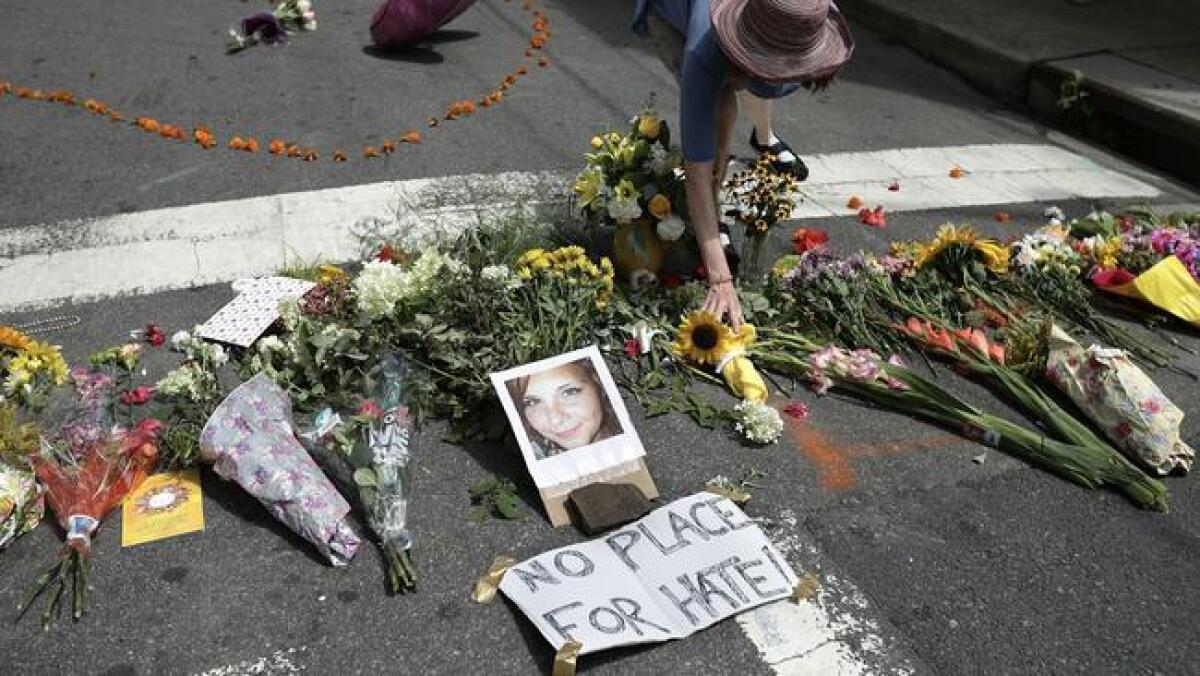
After two days of bipartisan criticism for his failure to single out white supremacists, President Trump on Monday made his most explicit comments denouncing the hate groups responsible for “this weekend’s racist violence.”
“Racism is evil and those who cause violence in its name are criminals and thugs, including the KKK, neo-Nazis and white supremacists,” he said flatly, reading from a teleprompter.
“To anyone who acted criminally in this weekend’s racist violence, you will be held fully accountable. Justice will be delivered,” Trump added.
First, however, he spoke glowingly about the economy.
The hastily arranged statement, from the Diplomatic Reception Room of the White House, will be one of his most scrutinized.
It came after two days of widespread denunciations that Trump had failed to single out white supremacists for fueling the fatal weekend in Charlottesville, Va. Trump’s initial comments instead faulted “this egregious display of hatred, bigotry and violence on many sides, on many sides.”
Before the latest statement, Trump earlier Monday on Twitter criticized the African American chief executive of Merck, who resigned from a White House manufacturing council on Monday in protest of Trump’s failure to explicitly condemn the racists in Charlottesville.
About that press conference you promised us, Mr. President...

Last Friday, President Trump announced a big Monday press conference during his trip to Washington D.C.. That press conference is not happening.
Just three days ago, a seemingly gleeful President Trump promised reporters he’d hold a “pretty big press conference on Monday.”
But on his public schedule -- released just after midnight Monday and then updated about 9:15 a.m. ET -- there is no mention of a press conference. His press team did not respond to an email requesting an explanation.
One can certainly imagine the questions: Why, Mr. President, did you fail to specifically condemn white nationalists who caused a bloody weekend in Charlottesville, Va., that ended with three deaths? Do you disagree with prominent Republicans who called the car attack that killed a counter-protester and injured many others an act of “domestic terrorism” and called on you to unequivocally denounce the racists? Why did you blame “many sides” when you have argued in the past for calling violence by Muslims by name, “radical Islamic terrorism”? Do you believe the anti-racism counter-protesters were equally culpable?
Trump may not answer those questions at other appearances on Monday either. His schedule includes only one event with any potential interaction with the press -- the signing of a China trade memorandum that is open to a small group of rotating reporters known as the press pool. On Saturday, after making his much-criticized response to the Charlottesville violence, Trump took no questions and walked away as reporters shouted queries like those above.
The president only occasionally takes questions at events for signing bills, executive orders and memorandums, and they tend to be brief. His other public events Monday -- arrivals and departures between New Jersey, Washington and New York -- are unlikely to allow for anything more than a photo of a president waving.
One key event on the schedule was added Monday morning, but is listed as closed to the press: an 11:30 a.m. meeting with Atty. Gen. Jeff Sessions and new FBI Director Christopher A. Wray to discuss a Justice Department civil rights investigation of the two days of chaos in Charlottesville.
In the meantime, Trump has continued to tweet, mostly on other subjects. None of those tweets has included a specific denunciation of the white nationalists in Charlottesville.
In one on Monday morning, he attacked the African American chief executive of Merck Pharmaceutical, Ken Frazier, who resigned from the president’s advisory council on manufacturing in protest of the president’s response to Charlottesville.
Atty. Gen. Jeff Sessions says Virginia attack meets legal definition of ‘domestic terrorism’
Atty. Gen. Jeff Sessions told ABC’s “Good Morning America” today that the death of a woman in Charlottesville, Va., “does meet the definition of domestic terrorism in our statute.”
Sessions said the Justice Department is pursuing the case “in every way.”
“You can be sure we will charge and advance the investigation towards the most serious charges that can be brought, because this is an unequivocally unacceptable and evil attack that cannot be accepted in America,” Sessions said.
In a separate interview with NBC’s “Today,” Sessions said that Trump had “explicitly condemned” violence and that “he totally opposes” the values espoused by white supremacy organizations such as those that launched the protest. Trump had initially referenced violence “on many sides.”
An excerpt of the interview was aired Monday.
Sessions said he expects Trump to say more, saying, “I think you’ll hear that again today.” He noted that the White House had expressly condemned white supremacy-driven violence in a statement Sunday.
Sessions told the network, “I think he will do what is correct. ... Facts have come out in the interim.”
Sessions and FBI officials are scheduled to meet with Trump today.
UPDATES
7:28 a.m.: This post has been updated with Sessions’ comments to ABC.
This post originally published at 4:50 a.m.
Merck CEO resigns from White House council ‘to take a stand against intolerance and extremism’ — then Trump slams him
The chief executive of pharmaceutical giant Merck & Co. publicly resigned from a White House manufacturing council on Monday, declaring he felt “a responsibility to take a stand against intolerance and extremism.”
The move by Kenneth Frazier, one of corporate America’s leading African American executives, came after President Trump was criticized for not explicitly condemning white supremacists after violent clashes with counter-protesters turned deadly in Charlottesville, Va., on Saturday.
Trump quickly lashed out at Frazier on Twitter.
“Now that Ken Frazier of Merck Pharma has resigned from President’s Manufacturing Council, he will have more time to LOWER RIPOFF DRUG PRICES!” Trump wrote less than an hour after Merck posted Frazier’s statement on Twitter.
Pence tries to soften Trump’s threat of military action in Venezuela
Cast once again in the role of interpreter of President Trump’s comments, Vice President Mike Pence is touring Latin America and attempting to dispel his boss’ threat of military action against Venezuela.
Trump on Friday said he would not “rule out” a “military option” to confront the crisis in Venezuela, where the increasingly authoritarian practices of leftist President Nicolas Maduro have touched off waves of deadly political violence and humanitarian disaster.
Trump’s threat was roundly decried in Latin America just as Pence headed out for a weeklong, four-nation tour on Sunday.
Speaking at a news conference late Sunday with Colombian President Juan Manuel Santos in the coastal city of Cartagena, Pence said Trump spoke with “resolve” but still wants a peaceful solution.
“President Trump is a leader who says what he means and means what he says, but the president sent me here to continue to marshal the unprecedented support of countries across Latin America to achieve by peaceable means the restoration of democracy in Latin America, and we believe it is achievable by those means.” Pence said.
“You hear in President Trump’s words the resolve of the United States of America to see this through, to restore democracy and constitutional government in Venezuela,” he added.
Most of Latin America has been united in efforts to pressure the Maduro government and to back economic sanctions imposed by the United States against Maduro and several of his associates.
Several Latin American countries have even said they would consider sanctions of their own. Until recently, much of Latin America was reluctant to appear to be intervening in a neighbor’s internal affairs, especially at Washington’s behest.
But oil-rich Venezuela now appears on the verge of collapse, which would send refugees fleeing to other parts of Latin America and cause regional turmoil.
Pence spoke alongside Santos, who sternly warned that no country in Latin America would support U.S. military action.
“I told the vice president that the possibility of military intervention in Venezuela should not be considered,” Santos said.
Trump returns to D.C. to focus on ‘trade and military’
President Trump tweeted Monday morning that he’d be returning to Washington with “much work to do.”
The president flew into New York on Sunday evening. He has suggested he would address the media while there.
Trump also tweeted his endorsement of Sen. Luther Strange (R-Ala.), who was appointed to temporarily fill the seat held by Atty. Gen. Jeff Sessions and now faces a special primary election next week to try to win the office outright.
Absent from the morning tweets was further mention of the weekend’s deadly violence in Charlottesville, Va.
On Saturday, a car driven by a man participating in a white supremacist rally plowed into a crowd, killing Heather Heyer, who was among the counter-protesters.
Also Saturday, a state police helicopter monitoring the protests crashed, causing two deaths.
Criticism from Democrats and Republicans has poured in concerning the president’s failure to explicitly condemn white supremacist groups in connection with the violence. In his statement, Trump blamed the violence “on many sides.”
Citizens and advocacy groups expressed outrage as well, attributing the president’s omission to a reluctance to alienate those in his base sympathetic to the hate groups.
In the face of mounting criticism, the president’s national security advisor, H.R. McMaster, said Sunday that Trump would have more to say on the subject.
“I’m sure you will hear from the president more about this,” he said on NBC’s “Meet the Press.”
CIA chief says it would be ‘unacceptable’ for North Korea to have a nuclear missile capable of striking U.S.
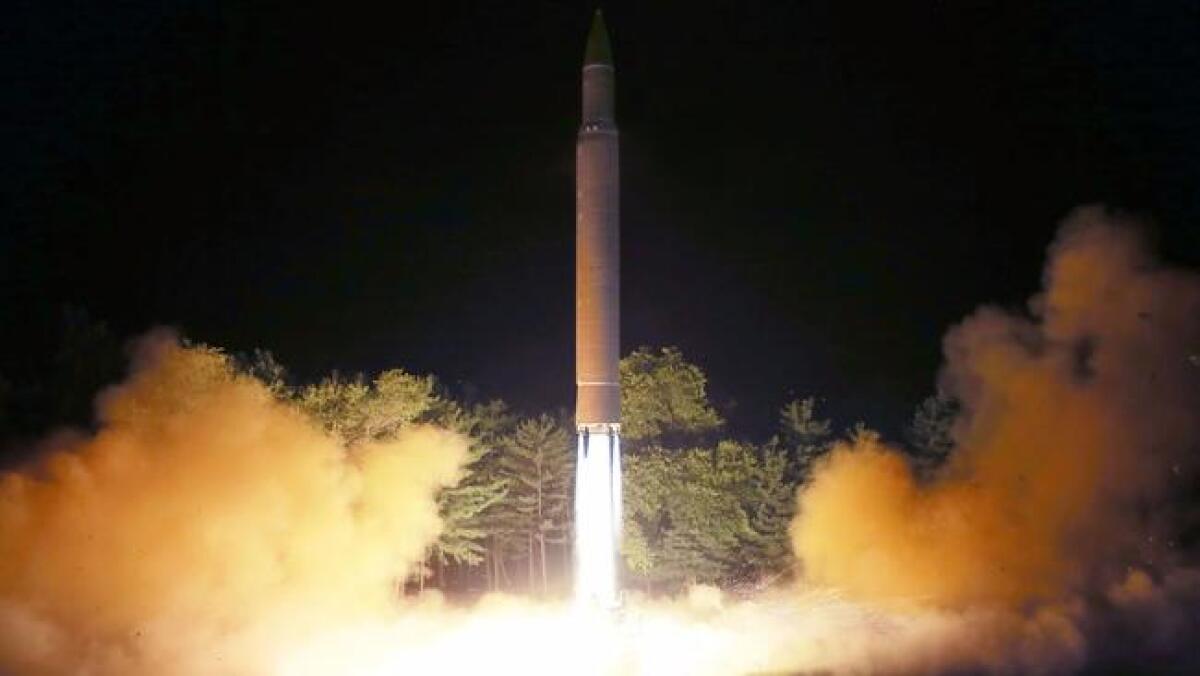
CIA Director Mike Pompeo said on Sunday that President Trump would consider it “unacceptable” for North Korea to possess a nuclear-armed ballistic missile capable of striking the United States — a development believed to be soon within Pyongyang’s reach.
But the intelligence chief also said he saw no imminent threat of North Korea attacking the U.S. with such a nuclear weapon, although he expected the rogue nation’s missile program would continue despite international sanctions.
Speaking on CBS’ “Face the Nation,” Pompeo said Trump had “made very clear that the United States finds it unacceptable for a rogue leader like Kim Jong Un to have the capacity of a ballistic missile with a warhead that is integrated and fully deliverable to the United States and hold America and the world at risk.”
“He’s simply not going to permit it to happen,” he said.
In a separate interview on “Fox News Sunday,” Pompeo was asked about the nature and degree of threat to the U.S. mainland in light of Kim’s continuing drive to develop North Korea’s missile and nuclear capacities.
“There’s nothing imminent today,” he replied. “But make no mistake about it, the continuation — the increased chance that there will be a nuclear missile in Denver — is a very serious threat.”
North Korea is thought to have developed a miniaturized warhead, and a more advanced intercontinental ballistic missile, that would enhance its ability to deliver a nuclear payload against the U.S.
H.R. McMaster, the White House national security advisor, said Trump, who alarmed many with his incendiary remarks about North Korea over the last week, had not drawn any “red line” regarding Kim’s nuclear program.
“The president doesn’t draw red lines,” McMaster said on NBC’s “Meet the Press. “What he does is he asks us to make sure that we have viable options for him — options that combine diplomatic, economic and military capabilities. And so that’s what we’ve done.”
Some former security and defense officials have said that Trump’s rhetoric — including a threat of “fire and fury” and an assertion days later that the U.S. military was “locked and loaded” in the face of North Korea’s provocations — have made a volatile situation worse.
Following Trump’s initial threat, North Korea threatened to target the tiny Pacific island of Guam, a U.S. territory that is home to large U.S. air and naval bases.
Former CIA Director Leon Panetta, also appearing on “Face the Nation,” said Trump’s language had “frankly created even greater tensions in that part of the world.”
An ex-chairman of the Joint Chiefs of Staff concurred. Retired Adm. Michael Mullen, who served under Presidents Obama and George W. Bush, said he was concerned by heated language from both Trump and the North Korean government. Kim himself lately has been largely silent.
Trump’s rhetoric “eliminates maneuver space for him,” Mullen said on NBC’s “Meet the Press,” adding, “It looks like brinksmanship to me.”
White House defends Trump’s response to Charlottesville violence as criticism intensifies
White House officials on Sunday defended President Trump’s failure to explicitly condemn white supremacist groups over deadly violence a day earlier in Charlottesville, Va., suggesting his implicit denunciation of them was clear in his remarks Saturday.
Yet as criticism of the president poured in for a second day, including from some GOP allies, his national security advisor, H.R. McMaster, suggested Trump would have more to say on the subject.
“I’m sure you will hear from the president more about this,” he said on NBC’s “Meet the Press.”
The comments came a day after a car plowed into a crowd, killing a woman, and a state police helicopter crashed, causing two deaths, as white supremacists rallied over two days in the historic Virginia college town to protest the planned removal of a statue of a Confederate general.
Another senior administration official, though, suggested that the president’s omission had not been accidental.
When White House homeland security adviser Tom Bossert was asked about Trump’s emphatic assertion that “many sides” were to blame, suggesting equal culpability for the white supremacist groups and the counter-protestors, Bossert said the president had opted not to “dignify the names” of white nationalist and neo-Nazi organizations.
“This isn’t about President Trump,” Bossert said on CNN’s “State of the Union.” “This is about a level of violence and hatred that could not be tolerated in this country.”
After a lengthy back-and-forth with host Jake Tapper, Bossert eventually made specific reference to white nationalist groups, without suggesting his views were those of the president.
“I think you’ve belabored it, so let me say I condemn white supremacists, and Nazis, and groups that favor this type of exclusion,” he said.
Trump’s aides are often forced to clarify for the president when he declines to address some controversy, or does so in a way that raises additional questions, and McMaster tried to do so on another Sunday program. He suggested on ABC’s “This Week,” that Trump’s Saturday statement from his New Jersey golf club did stand as a condemnation of the white supremacist movement.
“The president’s been very clear,” McMaster said. “We cannot tolerate this kind of bigotry, this kind of hatred.”
The seeming contradiction between that contention and McMaster’s suggestion in the NBC interview — that Trump may have failed to fully articulate his repudiation of specific hate groups — illustrated the frequent difficulty that administration officials have in trying to interpret the president’s controversial remarks or tweets.
“He condemned hatred and bigotry on all sides, and that includes white supremacists and neo-Nazis,” the national security advisor said on NBC. “I think it’s clear — I know it’s clear in his mind.”
Trump himself remained silent, but the White House also took the position that he had already delivered sufficient condemnation of the right-wing hate groups.
“The President said very strongly in his statement yesterday that he condemns all forms of violence, bigotry, and hatred. Of course that includes white supremacists, KKK, neo-Nazi and all extremist groups,” said the statement, given to reporters covering Trump as he vacations in Bedminster, N.J. “He called for national unity and bringing all Americans together.”
McMaster also said that the car attack on a crowd of counter-protesters that killed a 32-year-old woman should be considered an act of domestic terrorism. Trump has publicly made no such suggestion, although the Justice Department said late Saturday that it was opening a civil rights investigation.
A full investigation of the ramming episode, which also left 19 people injured and an Ohio man, the suspected driver, under arrest, needed to run its course, McMaster said on NBC. But he added: “I think we can confidently call it a form of terrorism.”
Reflecting the divisions among Trump’s top advisors, McMaster responded only in general terms to repeated queries as to whether he could work with strategist Stephen K. Bannon, who has promoted hardline nationalist views. The provocatively conservative website that Bannon formerly ran, Breitbart.com, has promoted efforts on the right to oust McMaster.
“I am ready to work with anybody who will help advance the president’s agenda and advance the security, prosperity of the American people,” McMaster said.
Asked whether Bannon did so, he replied that everyone working in the White House “should be motivated by that goal.”
Meanwhile, the mayor of Charlottesville, Michael Signer, offered fresh criticism of the president, saying Trump’s campaign had courted the support of white-nationalist groups.
“It’s now on the president, and all of us, to say ‘Enough is enough — this movement has run its course,’” he said on “Meet the Press.”
“Look at the campaign he ran,” Signer said in a separate interview on CNN’s “State of the Union.” “Look at the intentional courting, both on the one hand all of these white supremacist, white nationalist groups like that, anti-Semitic groups, and then look on the other hand the repeated failure to step up and condemn, denounce, silence, put to bed, all of those different efforts just like we saw yesterday.”
Republican allies advised Trump to actively repudiate white supremacists who describe themselves as his supporters. Sen. Lindsey Graham of South Carolina, appearing on “Fox News Sunday,” said: “I would urge the president to dissuade these groups that he’s their friend.”
Another Republican senator, Cory Gardner of Colorado, repeated calls for Trump to specifically denounce hate groups.
“They shouldn’t be claimed as part of a base,” he said. “Call it for what it is — it’s evil; it’s white nationalism.”
Even disgraced former White House communications director Anthony Scaramucci weighed in with advice to Trump to be more explicit in his condemnation.
“I think he needed to be much harsher as it related to the white supremacists and the nature of that,” he said on ABC’s “This Week.”
The president’s daughter Ivanka Trump, who is a White House advisor, used language more specific than that of her father in condemning the Charlottesville violence. In her first response, a tweet on Sunday morning, she declared that there should be “no place in society for racism, white supremacy and neo-nazis.”
Prominent Republicans distance themselves from Trump’s tepid response to Charlottesville violence

Republican elected officials, who increasingly have been putting distance between themselves and President Trump, jumped quickly away from him Saturday after his equivocating response to the violence in Charlottesville, Va.
Some, including Sen. Cory Gardner, who heads the Republican effort to elect senators in next year’s midterm election, repudiated Trump directly, criticizing him for not condemning the white supremacist groups that marched in the Virginia college town Friday and Saturday.
Sen. Marco Rubio of Florida also critiqued Trump for not directly labeling as a terrorist attack Saturday’s assault by a car, in which at least one person was killed and roughly 20 injured.
Others did not mention Trump directly but did condemn the marchers, many of whom carried Nazi flags and similar regalia.
Sen. Orrin Hatch of Utah, the senior Republican in the Senate, remembered his brother, who died fighting in World War II.
Sen. Dean Heller of Nevada issued a statement in which “condemn[ed] the outrageous racism, hatred and violence. It’s unacceptable & shameful. No room for it in this country.”
Several Republican senators referred to the violence as a case of “domestic terrorism.”
Sen. Ted Cruz of Texas, who has been a favorite of Republican conservatives, issued a statement in which he called on the Justice Department to “immediately investigate and prosecute today’s grotesque act of domestic terrorism.”
Sens. Joni Ernst of Iowa and Rob Portman of Ohio made similar references.
“White supremacy is a scourge,” wrote House Speaker Paul D. Ryan (R-Wis.). “This hate and its terrorism must be confronted and defeated.”
But the reaction was different among Republicans from the South, where a sizable percentage of GOP voters support keeping the sort of Confederate monuments that the white supremacist groups rallied in Charlottesville to protect.
For example, Sen. Luther Strange of Alabama, who faces a close primary election on Tuesday and has been fending off attacks from his right, stuck close to Trump.
Trump says blame belongs ‘on many sides’ amid white supremacist violence in Virginia
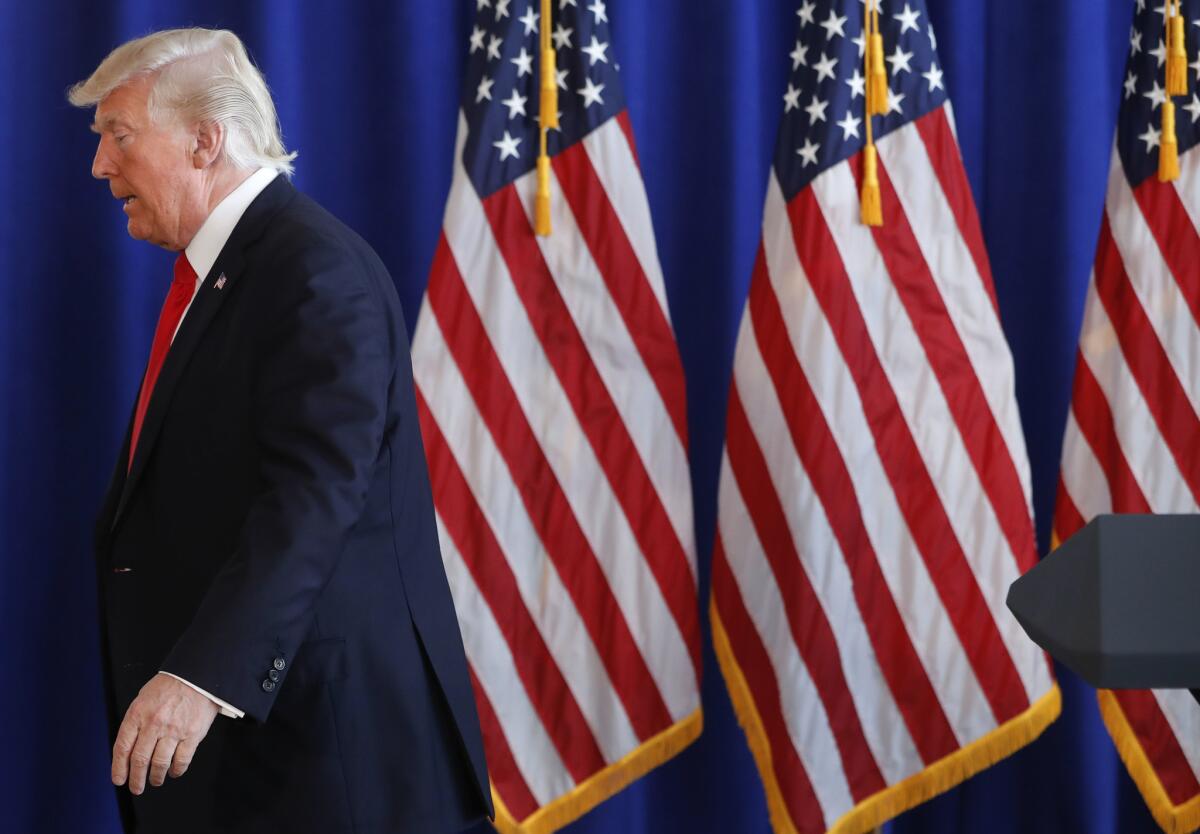
President Trump said blame for violence by white supremacists in Charlottesville, Va., belongs “on many sides,” just after authorities confirmed that at least one person had died in an attack earlier in the day by a car.
The president’s statement Saturday, from his golf club in New Jersey, is sure to enflame criticism that already had built over two days as he first was silent on white supremacist violence and then posted two tweets that generically condemned hate without citing any groups.
“We condemn in the strongest possible terms this egregious display of hatred, bigotry, and violence on many sides, on many sides,” Trump said.
“What is vital now is a swift restoration of law and order and the protection of innocent lives,” he added.
Trump’s appearance had been previously scheduled to highlight his work for veterans and on the economy. The president mostly dealt with those topics during the event, which lasted just over 10 minutes. After a short statement on Charlottesville, he talked about the economy and greeted assembled veterans, before leaving without answering shouted questions from reporters.
Among the questions he ignored Saturday was, “Do you want the support of these white nationalists?” Another asked whether the violence should be considered terrorism.
Trump’s unresponsiveness contrasted with his volubility in the past two days, when in three separate appearances before reporters he took numerous questions on subjects including North Korea. He did so with apparent enjoyment, compared to his evident discomfiture on Saturday.
Earlier in the day, former Ku Klux Klan leader David Duke had hailed the protests as “a turning point” that realized the promise of Trump’s election. He subsequently criticized Trump’s tweets, despite their failure to single out the white supremacists in Charlottesville.
The president should remember that “white Americans” put him in the White House, Duke wrote.
After criticism for his silence, Trump tweets against ‘hate,’ but doesn’t mention white supremacists

President Trump tweeted two statements Saturday responding to the riotous actions of white nationalists and neo-Nazis in Charlottesville, Va.
The first was a generic statement condemning hate and violence, in which he continued for a second day not to comment specifically on the nature of the demonstrations.
That post on Twitter about 1:30 p.m. ET came amid building criticism, including from Republicans, that he had not spoken out against the clashes.
Many critics on social media noted that Trump also has not condemned the bombing of a Minnesota mosque a week ago, though he has been quick to tweet against violence by Muslims in foreign nations.
The president’s failure to mention Charlottesville specifically in his tweet invited further criticism, since other Republicans — including his wife, Melania, nearly an hour before him — had done so. She used the hashtag #Charlottesville that was being used on Twitter by those witnessing and following the violence near the University of Virginia.
A bit more than an hour later, Trump tweeted a second time, specifically mentioning Charlottesville, but not condemning the violence or naming the groups involved in it.
The president’s vagueness stood in contrast to his frequent contention, echoing many on the right, that “radical Islamic terrorism” cannot be defeated if political leaders are not willing to specifically call it that.
Among the prominent Republicans who took to Twitter to specifically condemn the neo-Nazis’ violence in Virginia, were House Speaker Paul D. Ryan, Sens. Marco Rubio of Florida and Orrin G. Hatch of Utah, former Republican Party Chairman Ed Gillespie, who is now running for governor in Virginia, and Ronna Romney McDaniel, the current chairwoman of the Republican National Committee.
Democrats also were quick with their condemnations, and criticism of the president, including Senate Minority Leader Charles Schumer of New York.
“The march and rally in Charlottesville goes against everything the American flag stands for,” Schumer said in a statement. “President Trump must condemn this in the strongest terms immediately.”
Trump’s generic tweet came after the city of Charlottesville and the governor of Virginia, Terry McAuliffe, had declared a state of emergency.
The violence began Friday evening, as scores of mostly men wearing white hoods or black T-shirts, many with racist messages, and carrying Confederate and white supremacist flags, assembled to protest the planned removal of a statue of a Confederate general.
At the site was former Ku Klux Klan leader David Duke, whom Trump declined to criticize during his 2016 campaign for president. On Saturday, Duke hailed Trump in calling the protests “a turning point.”
“We are determined to take our country back,” Duke said. “We’re going to fulfill the promise of Donald Trump. That’s what we believed in. That’s why we voted for Donald Trump.”
After Trump made his statement on Twitter, Duke attacked it, saying that Trump should remember that “white Americans” were responsible for his victory.
The protests come just days after one of Trump’s White House advisors, Sebastian Gorka, on Wednesday complained about criticisms of white supremacists, especially in the media.
“‘It’s the white supremacists. That’s the problem.’ No, it isn’t,” Gorka said on a radio program for the conservative media outlet Breitbart.com, which formerly was run by another White House advisor, Stephen K. Bannon.
Trump opens door to investigating China’s ‘theft’ of U.S. intellectual property
President Trump on Monday will start a process that could lead to action against China, which has been accused of stealing American businesses’ intellectual property, even as he seeks Beijing’s help against nuclear threats from North Korea.
Several administration officials outlined the highly preliminary trade action to reporters Saturday, suggesting — contrary to Trump’s own statements — that trade policy toward China is divorced from any national security concern, including North Korea.
“Trade is trade; national security is national security,” said one official, who, like the others, spoke on condition of anonymity in keeping with administration practice.
As recently as Thursday, the president volunteered a connection between the two, and not for the first time, in remarks to reporters about his weeklong nuclear standoff with North Korea. Trump suggested that if China helped rein in North Korea, which is reliant on Beijing’s economic and security aid, he could lighten up on his attacks on Chinese trade practices, which were a mainstay of his election campaign.
“We lose hundreds of billions of dollars a year on trade with China. They know how I feel. It’s not going to continue like that,” Trump said from his golf club in Bedminster, N.J. “But if China helps us, I feel a lot differently toward trade — a lot differently toward trade.”
The officials would not confirm reports that the trade action Trump plans to initiate on Monday had been delayed more than a week, until the administration secured China’s support last week to win a unanimous vote in the U.N. Security Council for imposing new sanctions on North Korea.
The president’s trade action will be a long way from any punitive move against China, despite his and his advisors’ open talk of Chinese “theft” and “stealing” of U.S. companies’ intellectual property, which broadly includes technological innovations, film and other artistic products, industrial designs and military secrets.
He simply will initiate the latest investigation of intellectual property theft in a long line of them running back through past administrations.
According to Trump advisors, on Monday, the president plans to sign an executive memorandum, which is a step below an executive order, directing trade officials to investigate China’s “acts, policies or practices” that violate international protections for American intellectual property, innovations and technology.
As a prime example of what the officials called China’s “unfair trade practices,” they objected that the country requires American businesses that want to operate there to form joint ventures with state-run companies and share intellectual property with them.
The American companies “should not be forced or coerced to turn over the fruits of their labor,” one official said.
The investigation could take as much as a year, another official said. The advisors did not speculate about further actions, which might result in such things as tariffs on imports from China or a formal complaint and appeal for sanctions to the World Trade Organization.
“We’re at the beginning” of a long process, one advisor said.
In phone call with Trump, China’s Xi reiterates calls for calm
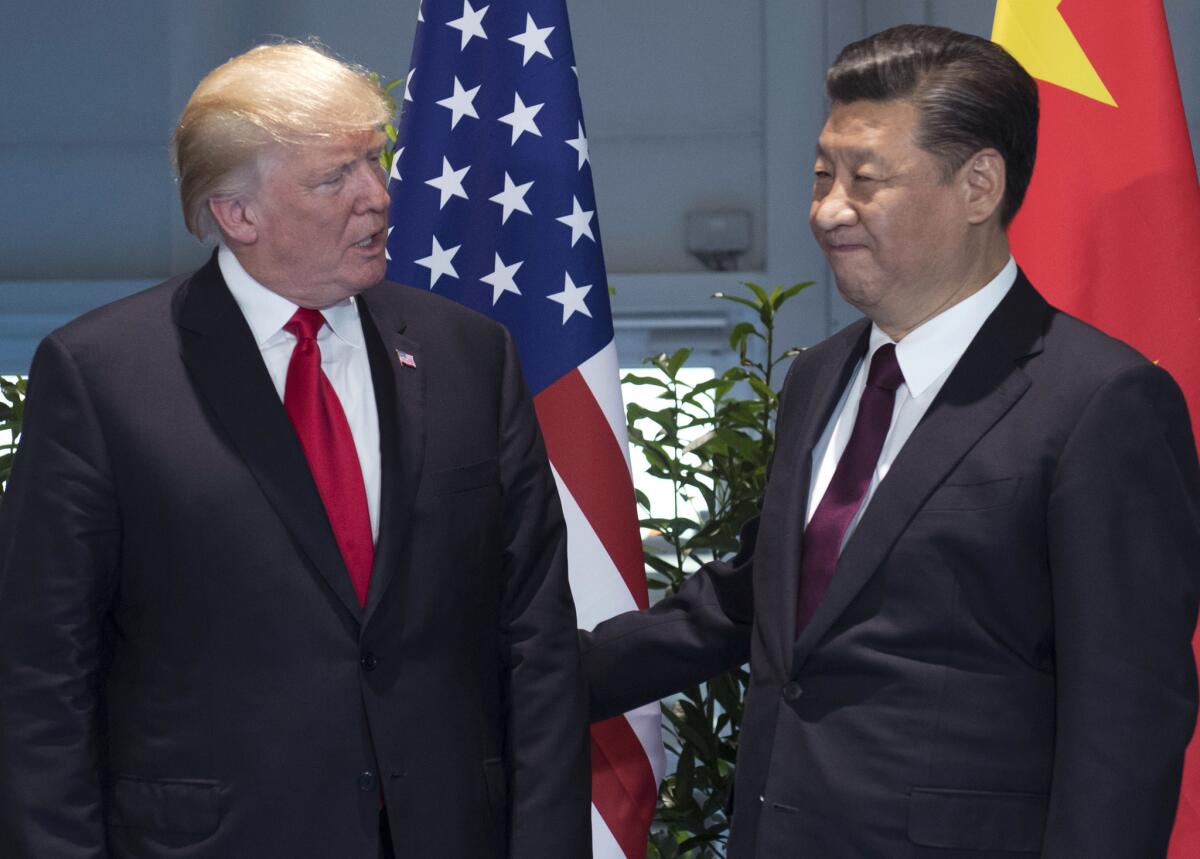
Chinese leader Xi Jinping urged restraint in a phone call with President Trump on Saturday, following a week of blustery rhetoric between North Korea and the U.S.
Xi warned that “concerned parties” should avoid “remarks and actions” that could escalate tensions on the Korean peninsula, according to the state-run New China News Agency. He reiterated China’s desire to work with the U.S., citing “common interests” in preserving stability in the region.
Trump understands China’s efforts to resolve the issue, the report said, and both leaders agreed to keep in close contact. The call took place late Friday evening on the East Coast.
State media portrayed Xi as the voice of calm amid a trade-off of threats this week between Pyongyang and Washington. Trump on Friday said the U.S. military was “locked and loaded” and warned North Korean leader Kim Jong Un would “regret it fast” if he endangered the U.S. or its allies. The isolated nation, earlier this week, laid out a detailed plan to launch ballistic missiles into waters near Guam, a U.S. territory.
China has repeatedly called for negotiations and scorned military action. It agreed to recent United Nations sanctions but fears a refugee crisis and the loss of a buffer state if North Korea’s economy collapses.
The Global Times, a Communist Party tabloid, warned Friday that China wouldn’t assist North Korea if it attacked U.S. territory and America retaliated. But if the U.S and South Korea try to carry out strikes and overthrow the North Korean government, “China will prevent them from doing so.”
U.S. officials painted the call as one of friendly agreement. The two leaders affirmed North Korea must stop “its provocative and escalatory behavior,” the White House said in a statement.
The relationship between the two presidents is “an extremely close one,” the administration added, calling Trump’s upcoming visit to China “a very historic event.”
Their conversation comes as Trump prepares to announce an investigation on Monday into China’s intellectual property practices, according to Politico.
Neither statement mentioned the trade issue.
Trump ‘not going to rule out military option’ in Venezuela
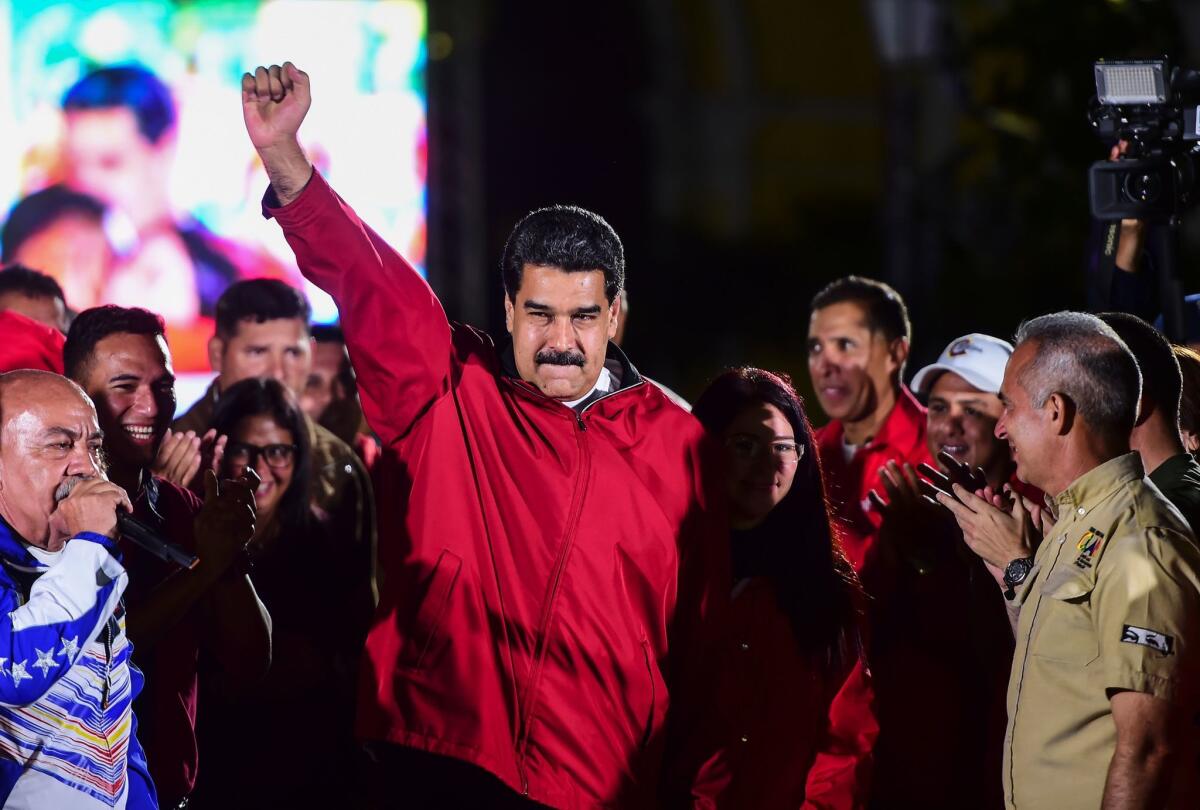
President Trump, in the midst of a week of high tensions with North Korea over its nuclear program, on Friday introduced the possibility of another military confrontation — with Venezuela — surprising most observers.
“We have many options for Venezuela,” he told reporters at his golf club in New Jersey after meeting with United Nations Ambassador Nikki Haley, Secretary of State Rex Tillerson and national security advisor H.R. McMaster. “And by the way, I’m not going to rule out a military option.”
It was unclear how seriously to take the threat, given Trump’s propensity to speak off the cuff and the casual nature of the statement. He often says he does not like to take any options of the table because he believes it keeps adversaries off balance.
But his declaration nonetheless raised concerns of further insecurity at a moment when many around the globe, including allies, are questioning America’s ability to continue providing a stable source of world leadership.
The suggestion that Trump would initiate a military operation in Venezuela — something that no one in the intelligence or diplomatic communities has suggested — awakened old ghosts of U.S. intervention in Latin America and will do little to preserve the hemispheric unity that Washington had until now mustered in opposition to the abuses of the government of President Nicolas Maduro.
Questions over how seriously to take the threat underscore the unusual nature of the Trump presidency. Normally, such a declaration by a United States president would spark extended debate and command the world’s full attention.
“This is not reality TV,” Leon Panetta, formerly both secretary of Defense and director of the CIA, told CNN.
The Trump administration has already imposed new economic sanctions this month against Venezuela and Maduro, following an election that solidified the authoritarian leader’s grip on the South American country’s government.
Trump was elected to office as a fierce opponent of international intervention, frequently criticizing the Iraq war. But this week alone, he has threatened two regimes with military action — Venezuela and Iraq.
North Korea’s threat of ‘enveloping fire’ doesn’t mean what you might think
In threatening to launch an attack on Guam, the Korean Central News Agency, North Korea’s state-run media, used the term 포위사격 (powi sagyuk), which a popular online dictionary translates as “enveloping fire” or “converging fire.”
But “fire” as used by the North Koreans in this instance doesn’t mean flames, as suggested by President Trump’s “fire and fury” remark.
Rather, sagyuk means to fire or shoot in the sense of firing a gun or missile at a target. Powi means to encircle or surround. The phrase powi sagyuk is more of a technical military threat – that missiles will come from all directions – than a blustery rhetorical one as the translation “enveloping fire” might suggest.
In the realm of bombastic rhetoric coming from North Korea – which uses phrases like “sea of fire” and “reduce to a pile of ash” with regularity – this phrase is not particularly incendiary. “Enveloping strike” would be a better translation.
Russian lawmakers see Trump’s gratitude to Putin as a front to his displeasure
If the U.S. diplomatic community reacted in shock yesterday when President Trump said he would thank Russian President Vladimir Putin for ordering the U.S. to cut its diplomatic staff in Russia by 755, Russian lawmakers said they were calling the U.S. president’s bluff.
“The reaction of U.S. President Donald Trump to the expulsion of American diplomats from Russia is, of course, a kind of a ‘good face in a bad game,’” said Leonid Slutsky, the chairman of the Committee on International Affairs in the Russian parliament.
Putin last month announced that the U.S. diplomatic mission to Russia must be cut to 455, the same number of staff in Russia’s embassies and consulates in the U.S. Moscow also seized two diplomatic properties in Moscow used by the U.S. embassy. The move was seen as retaliation for former President Barack Obama’s decision to expel 35 Russian intelligence officers and retake two houses used by the Russian embassy in Maryland and New York.
“I want to thank him because we’re trying to cut down on payroll, and as far as I’m concerned, I’m very thankful that he let go of a large number of people, because now we have a smaller payroll,” Trump told reporters in New Jersey on Thursday.
Without a doubt, the tit for tat between Moscow and Washington over diplomatic staff and embassy properties is a sensitive issue for the new administration, Slutsky said.
“I would even say that Trump’s sarcastic comment that thanked the president of the Russian Federation only confirms this,” the Russian lawmaker added.
Another lawmaker suggested that Trump was showing a bit of a sense of humor toward Congress and Russophobic sentiment in the United States.
“Trump’s statement is pure sarcasm and trolling of the anti-Russian circles in the United States, a hint at the consequences of the Congress sanctions,” Alexei Pushkov, a Russian senator, wrote on Twitter. “And the State Department does not have a sense of humor.”
Meanwhile, the Russian daily newspaper Kommersant quoted its diplomatic sources as saying that Russia should brace for the U.S. to retaliate again by demanding that the Kremlin close one of its consulates in the United States. Russia has one embassy in Washington and four consulates in New York, Houston, Seattle and San Francisco. The United States has an embassy in Moscow and consulates in St. Petersburg, Yekaterinburg and Vladivostok.
The U.S. embassy has not released the exact number of its mission to Russia, but they are believed to be close to 1,279 across the four diplomatic compounds. Many of those on staff are Russians employed as support staff to the mission, including drivers, caterers and administrative staff.
Trump says military ‘locked and loaded’ if North Korea refuses to yield
President Trump on Friday released another provocative statement aimed at North Korea, tweeting “military solutions are now fully in place, locked and loaded, should North Korea act unwisely.”
“Hopefully Kim Jong Un will find another path!”
Trump’s comments, at least some of which have not been scripted with his foreign policy team, have alarmed many allies and members of the foreign policy community, who have expressed concern about enflaming a volatile situation with an unpredictable nuclear foe.
Trump has not been deterred. He appears to be pursuing a carrot-and-stick approach, hoping his sharp language, contrasted with more conciliatory words from his Cabinet, will cow Kim.
So far, the language has only met with increasingly charged language from Pyongyang, which has threatened to attack Guam, the American territory in the Pacific that is home to a large military base.
Trump has appeared restless during his planned 17-day stay at his golf course in New Jersey, tweeting often and holding a pair of impromptu sessions with reporters Thursday, while spending long stretches outside the public eye.
In addition to the “locked and loaded” tweet, Trump also retweeted one from the U.S. Pacific Command with pictures of fighter jets and the statement that “Lancer #bombers on Guam stand ready to fulfill USFK’s #FightTonight mission if called upon to do so.”
In addition, Trump has ratcheted up fights with Congress. He retweeted two “Fox & Friends” tweets directed at lawmakers of his own party, one using a nuclear war metaphor.
“Senators learn the hard way about the fallout from turning on Trump,” read the story link, which included a picture of Sen. Jeff Flake, the Arizona Republican who has been one of Trump’s toughest critics in Congress.
The second Fox retweet took aim at a more powerful target, Senate Majority Leader Mitch McConnell, suggesting a threat to the Kentucky Republican’s job security.
“Trump fires new warning shot at McConnell, leaves door open on whether he should step down,” the tweet read.
That escalating fight, based in large part on who is to blame for the failure of the Republican Party to repeal Obamacare, could further hurt Trump’s policy agenda. McConnell has spent decades mastering Washington’s insider politics and is largely responsible for Trump’s signature accomplishment, the confirmation of Supreme Court Justice Neil Gorsuch.
Trump’s willingness to ignore advice on domestic and foreign policy illustrate the limits on the attempts by his new chief of staff, retired Marine Gen. John Kelly, to impose discipline on the impulsive president.
Read MoreUPDATE
8:34 a.m.:
This article card was updated with later tweets from President Trump and additional background information.This article was originally published at 5:05 a.m.
No plan to fire special counsel, Trump says, while denying any collusion with Russia
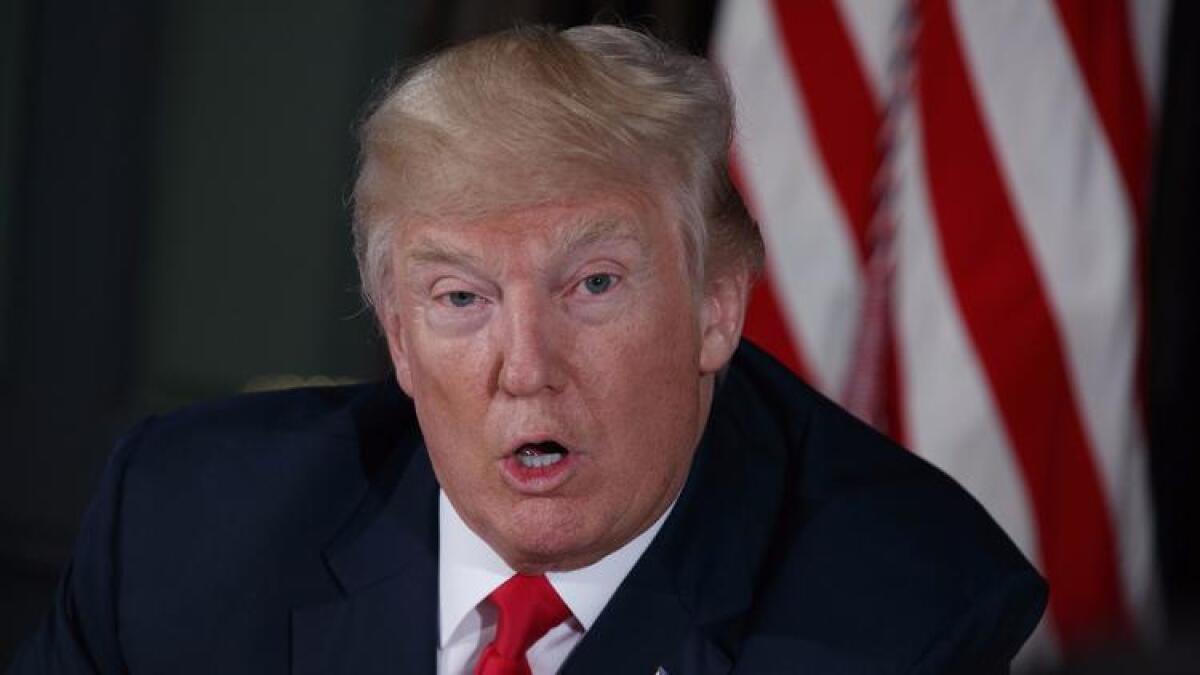
President Trump said he has no intention of firing Robert S. Mueller III, the special counsel investigating his administration’s ties to Russia, a probe that he repeatedly has attacked as a “witch hunt.”
Trump, speaking to reporters at his Bedminster, N.J., club after a meeting with advisors Thursday, again insisted that there had been no collusion between his campaign and Russian leaders, but cooled his fiery rhetoric attacking Mueller and Atty. Gen. Jeff Sessions.
“I haven’t given it any thought,” he said, when asked whether he might fire Mueller.
“You say, ‘Oh, I’m going to dismiss him.’ No, I’m not dismissing anybody. I mean, I want them to get on with the task.”
As for Sessions, Trump gave a tepid endorsement after weeks of publicly dressing down the attorney general.
“It is what it is. It’s fine,” Trump said. “He’s working hard on the border.”
Last month, Trump repeatedly excoriated Sessions for his decision to step aside from supervising the Russia investigation, making it clear that he blamed the attorney general for the fact that he was facing the investigation by Mueller and his team. He called Sessions “very WEAK” on prosecuting leakers and in pursuing an investigation against his former rival, Hillary Clinton.
The barrage of criticism was widely seen as an effort by Trump to pressure Sessions to resign, and it prompted warnings from conservatives and from the Senate not to fire Sessions or Mueller. Sessions has said he has no plans to resign, and last week he announced that the Justice Department was cracking down on leaks.
As Mueller’s probe has picked up steam, the FBI last month executed a search warrant at the Virginia home of Paul Manafort, Trump’s one-time campaign manager.
“I thought it was a very, very strong signal, or whatever,” Trump said when asked about the raid, adding that he had not spoken to the attorney general or FBI about it.
“I have not, but to do that early in the morning, whether or not it was appropriate, you’d have to ask them.”
Trump described Manafort as “a very decent man” but added a pointed comment about his web of business dealings with clients aligned with the Kremlin: “He’s like a lot of other people — probably makes consultant fees from all over the place. Who knows.”
Trump finally comments on Russia’s steps against U.S. diplomats, thanks Putin for ‘cutting payroll’

President Trump waited a week and a half to comment on Russian President Vladimir Putin’s order to cut the U.S. diplomatic staff in Moscow by hundreds of people.
When he did, his response came as a joke.
“I want to thank him because we’re trying to cut down our payroll, and as far as I’m concerned, I’m very thankful that he let go of a large number of people because now we have a smaller payroll,” Trump told reporters Thursday, flashing a small grin.
Shortly after the Russian order, the State Department called the decision “a regrettable and uncalled for act.”
Trump seemed less concerned.
“There’s no real reason for them to go back,” Trump said, referring to the diplomats. “I greatly appreciate the fact that we’ve been able to cut our payroll of the United States. We’re going to save a lot of money.”
The Russian order, made in retaliation for U.S. sanctions ordered in December by President Obama, will reduce the U.S. diplomatic staff in Russia by as many as 755 people, mostly Russian contract workers.
The order will reduce the number of U.S. diplomatic staff in Russia to 455, the same number that Russia has in the United States.
Trump jabs Senate majority leader, again, calls defeat of healthcare bill a ‘disgrace’
President Trump was at it again Thursday, lashing out at Senate Majority Leader Mitch McConnell (R-Ky.) over the Republican Congress’ failure to pass a new healthcare bill.
The escalating attacks, now in a second day, underscore the rocky relationship between the White House and what typically would be the president’s allies from his party in Congress.
“I just want him to get repeal and replace done. I’ve been hearing ‘repeal and replace’ now for seven years,” Trump told reporters.
“They lost by one vote. For a thing like that to happen is a disgrace. And, frankly, it shouldn’t have happened. That, I can tell you — it shouldn’t have happened.”
Trump stopped short of calling for McConnell to step aside, but he made it clear he expects Congress to deliver on his priorities — healthcare, tax reform and an infrastructure bill that is nowhere near even being written yet.
“Well, I’ll tell you what, if he doesn’t get repeal and replace done and if he doesn’t get taxes done, meaning cuts and reform, and if he doesn’t get a very easy one to get done, infrastructure — if he doesn’t get them done, then you can ask me that question,” Trump said when asked if McConnell should step down.
Trump picking a fight with the Senate GOP leader — after his on-again-off-again relationship with House Speaker Paul D. Ryan (R-Wis.) -- shows how difficult it will be for Republicans to reach the goals on their agenda heading into the fall.
Congress has a long to-do list when lawmakers return from their recess in September, with must-pass bills to raise the debt ceiling and continue funding the government. Coordination between the congressional leaders and the White House will be needed to ensure passage and avert a fiscal crisis or shutdown.
But on a summer day in August, Trump appeared less worried about those battles as he rehashed what could have been.
Echoing conservative critics, Trump started the morning complaining on Twitter that McConnell “screamed Repeal & Replace for 7 years, couldn’t get it done.’
Later in the day, as if one attack were not enough, Trump delivered another jab on Twitter, demanding from his vacation that McConnell “get back to work.”
“You can see the president’s tweets. Obviously there’s some frustration,” White House Press Secretary Sarah Huckabee Sanders told reporters Thursday.
“I don’t have anything more to add.”
UPDATES
12:50 p.m.: This post was updated with the president’s additional comments.
12:45 p.m.: This post was updated with a comment by White House Press Secretary Sarah Huckabee Sanders.
10:12 a.m.: This post was updated with Trump’s second tweet.
Trump on his threat to North Korea: ‘Maybe it wasn’t tough enough’

President Trump redoubled his threat to rain “fire and fury” on North Korea, saying Thursday that “maybe it wasn’t tough enough.”
Trump used four versions of the word “tough” in describing his posture toward North Korea for its continued pursuit of a nuclear-armed intercontinental missile, while downplaying the potential for successful negotiations.
“Sure, we’ll always consider negotiations. But they’ve been negotiating now for 25 years,” he said, addressing reporters from his golf club in Bedminster, N.J., with Vice President Mike Pence beside him.
Even as the president reiterated that a unanimous vote of the U.N. Security Council last week for additional sanctions was “a great job,” he suggested they would not work to change Pyongyang’s behavior.
“Probably, it will not be as effective as a lot of people think it can be,” he said.
The president’s bellicose language, in matching that of North Korean autocrat Kim Jong Un, has heightened tensions and fear among Americans and allies of a nuclear confrontation with a volatile adversary. Trump again contended that his predecessors were timid in the face of North Korea’s nuclear program.
“It’s about time that somebody stuck up for the people of this country and for the people of other countries,” Trump said.
He declined to rule out a first strike. “We don’t talk about that. We never do,” he said.
Asked to provide reassurance to Americans concerned by the heated words between the two countries, including North Korea’s threats to the American territory of Guam, Trump pointed to the strength of the military while ramping up his threat to North Korea.
“The people of this country should be very comfortable,” he said.
“And I will tell you this — if North Korea does anything in terms of even thinking about” attacking the United States, its allies or “anybody that we love,” Trump continued, “they should be very nervous. Because things will happen to them like they never thought possible, OK?”
Trump declares opioid crisis a ‘national emergency’

President Trump is officially declaring the opioid crisis a “national emergency.”
Trump made the announcement before holding a security briefing Thursday at his golf course in Bedminster, N.J.
Trump told reporters the drug crisis afflicting the nation is a “serious problem the likes of which we have never had” and says he’s drawing up documents “to so attest.”
A drug commission convened by Trump recently called for a national emergency declaration to help deal with the opioid crisis.
Health and Human Services Secretary Tom Price earlier this week seemed to suggest the president was leaning against the recommendation when he said the administration could deploy the necessary resources and attention without declaring a national emergency.
Still, Price stressed that “all things” were “on the table for the president.”
McCain issues his own military strategy for Afghanistan war amid White House delay
Fed up with what he calls White House inaction in Afghanistan, Sen. John McCain (R-Ariz.) on Thursday unveiled his own strategy for the war-torn country — offering a plan that provides U.S. military commanders with broader authority to pursue militant forces.
McCain, chairman of the Senate Armed Services Committee, has urged the Trump administration for months to submit to Congress a new Afghanistan strategy due to the worsening security situation in that country.
Nine U.S. troops have been killed in the country thus far this year — as many as were killed in all of 2016.
Internal debates among the president’s chief advisors have delayed a White House strategy, according to U.S. officials not authorized to speak publicly on the matter.
“Nearly seven months into President Trump’s administration, we’ve had no strategy at all as conditions on the ground have steadily worsened,” McCain said in a statement. “The thousands of Americans putting their lives on the line in Afghanistan deserve better from their commander-in-chief.”
McCain’s strategy, which was issued as an amendment to next fiscal year’s defense bill, includes providing additional U.S. troops for counter-terrorism missions, allowing U.S. advisors to work closer to the front lines with Afghan officers and giving U.S. commanders broader authority to target Taliban insurgents, Islamic State militants and other militias.
“Adopting a clear policy and strategy in Afghanistan, backed with the authorities and resources necessary for success, would be a critical step toward restoring that kind of leadership, which has been absent for far too long,” he said.
The Pentagon has 8,400 troops deployed in Afghanistan to train and advise Afghan forces; most rarely participate in direct combat. The combined force with other NATO countries is about 13,500.
Gen. John W. Nicholson Jr., the top U.S. commander in Afghanistan, is seeking 3,000 to 5,000 more troops to help train Afghan military and police forces as they battle an array of insurgents in various parts of the country.
That proposal has run into headwinds from some advisors in the administration who question the goal of sending additional forces into a war that has dragged on so long without producing a clear result.
Meanwhile, there have been several high-profile attacks in Afghanistan claiming hundreds of lives among civilians.
McCain, who currently is undergoing brain cancer treatment, intends to return to the Senate in the coming weeks to debate the amendment.
North Korea details plan to strike near Guam by mid-August

North Korea on Thursday laid out a detailed plan to launch a barrage of missiles toward Guam, further escalating its threat against the tiny U.S. territory.
The warning, issued by a high-level general through North Korea’s state media, suggested the isolated nation was crafting a proposal to launch four intermediate-range ballistic missiles into waters around the island by mid-month. Once finalized, he said, officials would wait for the command of leader Kim Jong Un.
The announcement marked the latest in the increasingly muscled rhetoric between Pyongyang and Washington, after the United Nations approved sanctions last week intended to restrain North Korea’s nuclear ambitions. U.S. President Trump earlier this week warned that the hermit kingdom would face “fire and fury like the world has never seen” if it endangered the U.S.
The report from North Korea’s state-run news agency, KCNA, called Trump’s comments a “load of nonsense.”
Even if merely bluster, the latest threat draws global attention to the safety of residents and U.S. military stationed on a small tropical island in the western Pacific many don’t know exists. Should North Korea follow through on its threat to strike, this would become the closest a North Korean missile has landed to American territory.
Officials are drawing up a plan to “interdict the enemy forces on major military bases on Guam and to signal a crucial warning to the United States,” the report from Pyongyang said, citing General Kim Rak Gyom, who leads the Strategic Force of the Korean People’s Army.
The general, in an unusually detailed description, said four Hwasong-12 intermediate-range ballistic missiles would cross the sky over southern Japan before hitting waters 19 to 25 miles from Guam’s coast. The island could serve as an air base for U.S. stealth bombers if war broke out between the two nations.
“We keep closely watching the speech and behavior of the U.S.,” the general said.
Cuban diplomats expelled from Washington over incident that harmed U.S. personnel in Havana, State Department says
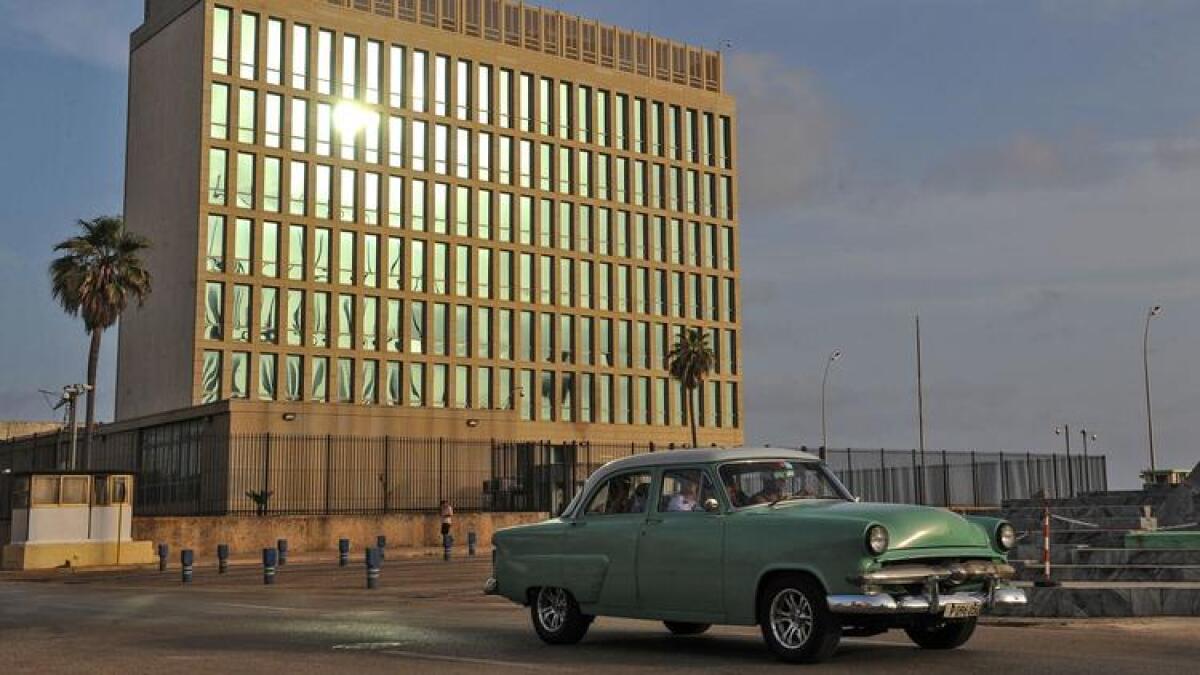
It is a mysterious episode ripped from the pages of a Cold War spy novel.
Despite ostensibly improved ties between the U.S. and Cuban governments, the State Department on Wednesday confirmed it had expelled two Cuban diplomats from Washington because of an “incident” in Havana that harmed U.S. personnel there.
State Department spokeswoman Heather Nauert would not provide details, except to say it had caused medical but non-life-threatening problems for an unspecified number of U.S. Embassy personnel based in Havana.
The Associated Press, one of the few Western news outlets with offices in the Cuban capital, reported from Havana that the injuries may have been caused by sonic equipment that Cuban intelligence officers installed in the U.S. Embassy or residences of its staff.
This would not be unusual. Through the decades, even when the United States and Cuba did not have formal diplomatic relations, Cuban intelligence agencies specialized in surveilling Americans stationed on, or visiting, the island.
That the spy equipment would cause harm, however, is new, and the reason was not immediately clear.
“Some U.S. government personnel who were working at our embassy in Havana, Cuba, on official duty ... reported some incidents which have caused a variety of physical symptoms,” Nauert said. “We don’t have any definitive answers about the source or the cause of what we consider to be incidents.”
She added, “We’re taking that situation seriously, and it’s under investigation right now.”
She said two Cuban diplomats were expelled from Washington in retaliation in late May.
The incidents date to late last year, she said.
The U.S. diplomatic mission in Havana was only elevated to status of embassy in 2015, when then-President Obama and Cuban President Raul Castro reestablished full relations after half a century of Cold War hostilities. Before then it was a low-level facility with a skeleton crew.
The AP said at least one of the diplomatic personnel reported hearing loss.
“What this requires is providing medical examinations to these people,” Nauert said. “Initially, when they’d started reporting what I will just call symptoms, it took time to figure out what it was, and this is still ongoing. So we’re monitoring it. We provide medical care and concern to those who believe that they have been affected by it. And we take this extremely seriously.”
President Trump announced a couple of months ago he was rolling back many of the advances with Cuba that Obama had overseen. However, he has yet to enact anything concrete.
Trump bridles at criticism from GOP Senate leader McConnell, fires back
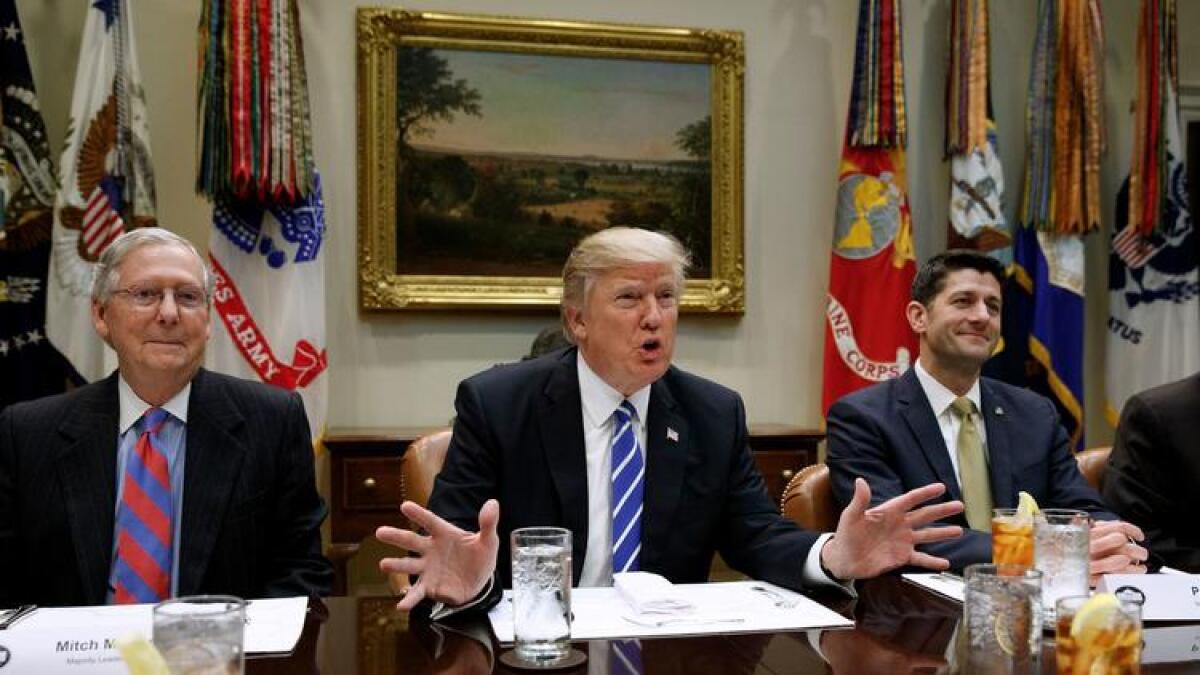
President Trump hit back in an escalating fight with Senate Majority Leader Mitch McConnell on Wednesday over who is to blame for the Republican Party’s failure to repeal Obamacare.
“After 7 years of hearing Repeal & Replace, why not done?” Trump tweeted at McConnell (R-Ky.).
McConnell has served in the Senate all seven years that Republicans have campaigned on repealing Obamacare, while Trump came to office for the first time this year.
The newest Trump tweet was in response to McConnell’s comment to an audience in his home state Monday that Trump had raised expectations unrealistically, in large part because of his inexperience with legislating.
“Our new president has of course not been in this line of work before,” he said at a Rotary club in Florence, Ky. “And I think had excessive expectations about how quickly things happen in the democratic process.”
Trump pointed to those remarks in his tweet. “Senator Mitch McConnell said I had ‘excessive expectations,’ but I don’t think so,” he wrote, before asking “Why not done?”
Republicans remain concerned about political fallout from their core voters, many of whom may be angered by the failure to repeal the healthcare law.
The public nature of the intra-party fight is unusual. While relations between presidents and congressional leaders, even from their own party, are often tense, frustrations seldom break out into the open.
But Trump has been increasingly frustrated with what he sees as a lack of support from Republicans in Congress, while lawmakers have grown increasingly concerned that Trump’s low standing in the polls and lack of legislative accomplishments could hurt them politically.
Dan Scavino, Trump’s social media director, earlier in the day had accused McConnell of making “excuses.”
Sarah Huckabee Sanders, Trump’s press secretary, had attempted to minimize that response, saying in an email that Scavino was responding from his personal account, rather than in his official capacity, “and I’m not going to comment on his personal Twitter account.”
Defense chief warns North Korea against actions that would lead to ‘end of its regime and the destruction of its people’

Defense Secretary James N. Mattis became the latest senior member of the Trump administration to issue dire warnings to North Korean leader Kim Jong Un, declaring Wednesday that Pyongyang “should cease any consideration of actions that would lead to the end of its regime and the destruction of its people.”
He spoke a day after President Trump warned that he would unleash “fire and fury like the world has never seen” if North Korea continued to threaten America, rhetoric that suggested the two countries are edging closer to conflict.
North Korea successfully tested an intercontinental ballistic missile last month for the first time, and U.S. intelligence agencies assess that Pyongyang is capable of producing a compact nuclear warhead and putting it atop a long-range missile.
The Trump administration has used a mix of tough talk and diplomacy to deal with the mounting threat.
Over the weekend, the United Nations Security Council voted unanimously to add new sanctions on North Korea in response to its ballistic missile tests.
And Secretary of State Rex Tillerson has made clear he is open to negotiations if Pyongyang freezes its nuclear and missile programs.
Mattis referred to that two-track policy on Wednesday.
“While our State Department is making every effort to resolve this global threat through diplomatic means, it must be noted that the combined allied militaries now possess the most precise, rehearsed and robust defensive and offensive capabilities on Earth,” he said in a statement.
“The [North Korean] regime’s actions will continue to be grossly overmatched by ours and would lose any arms race or conflict it initiates.”
The warning followed Trump’s tweets earlier in the day that the U.S. nuclear arsenal is “now far stronger and more powerful than ever before.”
White House shifts tone on Obamacare repeal, signals openness to bipartisan ‘fix’
The Trump administration, thwarted in several attempts to repeal the Affordable Care Act, notably shifted tone Wednesday, opening the door for a bipartisan plan to “fix” the law.
“Both folks in the House and the Senate, on both sides of the aisle frankly, have said that Obamacare doesn’t work, and it needs to be either repealed or fixed,” Health and Human Services Secretary Tom Price said on Fox & Friends. “So the onus is on Congress.”
Talk of fixing the law is new. Price and President Trump have long talked only of repealing the law, although they’ve taken various positions on whether a replacement should come later or at the same time as repeal.
The Republican-controlled Congress, despite seven years of campaign promises, has been unable to come up with a repeal plan that can pass both chambers. And Democrats, who see the law as a signature accomplishment for both Obama and the party, have been unwilling to help them.
Both sides do agree that some changes could be made to improve insurance markets, which have been unstable in many places as some large insurers have pulled out of some states, leaving some consumers with few or no plans from which to choose.
White House Press Secretary Sarah Huckabee Sanders did not back away from Price’s wording when asked whether the administration is serious about a plan to fix the law rather than repeal it.
“We are always looking for best ways to improve and fix the broken Obamacare system,” she said in an email.
A spokeswoman for Price, Alleigh Marre, said Price, in his interview, “was characterizing the position of folks in Congress from both sides of the aisle who recognize Obamacare is failing.” She did not provide details of which fixes to the law that Price would find acceptable.
The shift comes soon after lawmakers have intensified their own efforts at a bipartisan plan. Last week, Senate Health Committee Chairman Lamar Alexander (R-Tenn.) and Sen. Patty Murray (D-Wash.), the committee’s senior Democrat, announced plans to begin working on a plan to stabilize the markets.
Industry officials have said a fix could include at least four components:
1) Ending uncertainty over whether the Trump administration will continue to fund assistance that the law offers to low- and middle-income consumers to help offset co-pays and deductibles.
2) Creating a better reinsurance system to protect insurers from big losses in the event they get an unexpected glut of unhealthy and expensive patients.
3) Increasing outreach and marketing to persuade younger and healthier people to buy insurance, because they tend to balance out expensive claims from older and less healthy customers.
4) New plans or incentives to lure more insurers to sell plans in rural areas.
Even as talk of bipartisanship increases, Republicans remain concerned about political fallout from their core voters, many of whom may be angered by the failure to repeal the existing law.
Tension over that problem has prompted infighting between Senate Majority Leader Mitch McConnell (R-Ky.) and the administration.
McConnell told an audience in his home state Monday that Trump had raised expectations unrealistically, in large part because of his inexperience with legislating.
“Our new president has of course not been in this line of work before,” he said at a local Rotary club in Florence, Ky. “And I think had excessive expectations about how quickly things happen in the democratic process.”
That elicited a retort from Dan Scavino, Trump’s social media director, who accused McConnell of making “excuses.”
Sanders said Scavino was responding from his personal account, rather than in his official capacity “and I’m not going to comment on his personal Twitter account.”
Advocacy groups sue Trump over proposed transgender military ban
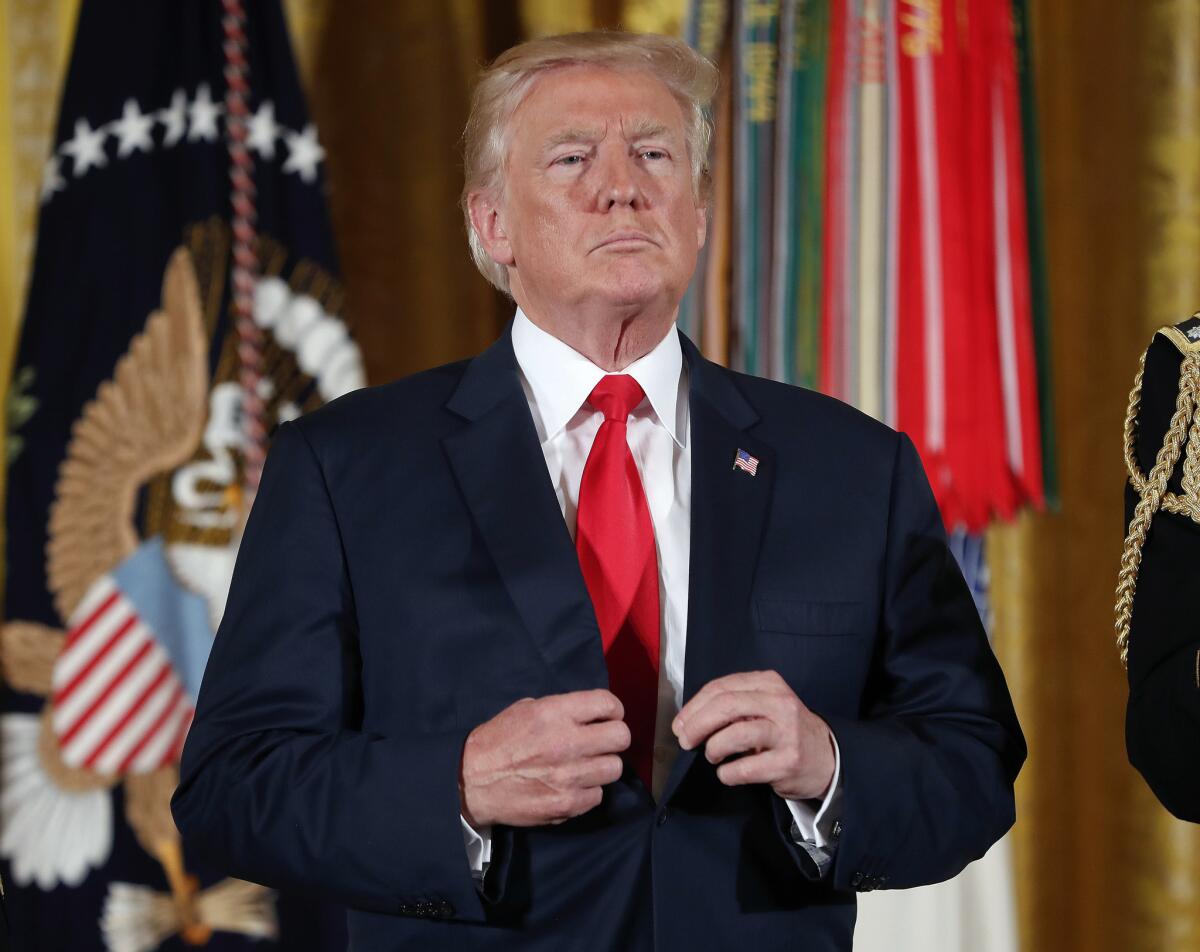
Two advocacy groups sued President Trump in federal court Wednesday over his declaration on Twitter last month that the Pentagon would a reinstate a ban on transgender people serving in the U.S. military.
So far, the armed services have not implemented a ban or moved to discharge anyone, saying that it is awaiting guidance from the White House through formal channels rather than on Twitter.
The National Center for Lesbian Rights and GLBTQ Legal Advocates and Defenders filed a lawsuit in U.S. District Court in the District of Columbia on behalf of five transgender service members who have collectively served for decades in multiple branches of the military.
The lawsuit claims Trump’s ban would violate the equal protection and the due process clauses in the Bill of Rights.
Trump blindsided the Pentagon on July 26 when he wrote on Twitter that the government would not “accept or allow transgender individuals to serve in any capacity in the U.S. military.”
After a lengthy internal review, the Defense Department lifted the longstanding ban last year and allowed transgender people to serve openly in all branches of the military, and to seek hormone treatment and other procedures at military hospitals.
The president said in his Twitter posts that the military “cannot be burdened with the tremendous medical costs and disruptions” of transgender people in the armed service.
A Rand Corp. study commissioned by the Pentagon determined that the medical costs would be relatively minor, and that transgender people had served without disruption for years.
The Pentagon does not count self-declared transgender personnel, but outside groups have estimated that 1,300 to 16,000 members of the military could be affected by a ban.
A Pentagon spokesman told the Los Angeles Times the day of Trump’s tweets that they were considered “guidance rather than an order from the commander-in-chief.”
But Shannon Minter, lesbian rights center’s legal director, said in a statement Wednesday that Trump’s tweets caused a “tidal wave of harms” for transgender service members serving openly, and that many were “scrambling to deal with what it means for their future and their families.”
The proposed ban was met with considerable bipartisan disagreement from Congress, including Sen. John McCain (R-Ariz.), chairman of the Senate Armed Services Committee. Large technology corporations, including Google, Apple and Facebook, and some high-profile celebrities, including Caitlyn Jenner, also publicly denounced the ban.
Trump makes false claims about U.S. nuclear arsenal
Hours after warning North Korea that it will meet “fire and fury like the world has never seen” if its leader, Kim Jong Un, continued to provoke the United States, President Trump said the U.S. nuclear arsenal is “stronger than ever before.”
“My first order as President was to renovate and modernize our nuclear arsenal. It is now far stronger and more powerful than ever before,” Trump tweeted Wednesday morning.
Parts of the president’s claims are false.
He did not order the modernization of the nuclear arsenal. President Obama did that in 2014, despite calling for a “vision of and work for a world without nuclear weapons” just five years earlier.
The plan, expected to cost $400 billion through 2024, would upgrade nuclear weapon production facilities, refurbish warheads and build new submarines, bombers and ground-based missiles. It will likely cost more than $1 trillion over the next 30 years, according to outside estimates.
Because the sprawling nuclear force will take so long to rebuild, the arsenal is more or less at the same level of strength as it was when Trump took office seven months ago.
Trump did launch a top-to-bottom Nuclear Posture Review to determine what the role of nuclear weapons in U.S. security strategy should be, just like each of his recent predecessors did when they took office.
The review has not yet been completed, and it wasn’t Trump’s first order. The directive was issued a week after Trump took office, and was preceded by more than a dozen orders on other topics.
The U.S. nuclear weapons strategy rests on a triad of delivery systems — bombers, submarines and land-based missiles — developed early in the Cold War. The three legs of the triad were designed to ensure that even in a massive surprise attack, at least one leg would survive to deliver a retaliatory strike.
In addition to the review of the nuclear force, the White House has also proposed a $1.4-billion budget increase for the National Nuclear Security Administration, which oversees the nuclear weapons enterprise. That money has yet to be allocated.
It’s unclear what Trump meant when he said that the nuclear arsenal is stronger than before. The Times has written at length on the deteriorating state of various aspects of the nuclear force.
In addition, the U.S. military is limited in how many weapons can be deployed under the New Strategic Arms Reduction Treaty signed in 2010. That agreement requires Russia and the U.S. to reduce deployed intercontinental missiles to 700 and the overall number of warheads to 1,550, each by 2018.
Russia and the U.S. currently meet those limits, according to the latest data released by the State Department.
North Korea threatens to turn U.S. mainland into a ‘theater of nuclear war’

President Trump’s statement that North Korea will meet with “fire and fury” if it continues to threaten the U.S. sent a cascade of anger, anxiety and concern through Northeast Asia’s halls of power on Wednesday.
North Korea responded with vitriol. In a statement, its Korean People’s Army threatened to “turn the U.S. mainland into the theater of a nuclear war,” sending a strong signal that Pyongyang’s nuclear ambitions remain unchecked. A U.S. strike on North Korea missile and nuclear targets would be “mercilessly repelled,” the statement continued.
Pyongyang also organized a giant rally on Wednesday against a strict round of sanctions passed by the U.N. Security Council over the weekend. Tens of thousands of people packed Kim Il Sung Square in downtown Pyongyang; pictures online show them waving propaganda placards, their fists in the air.
China responded with an exhortation to turn down the hostile rhetoric and pursue diplomatic solutions. “Unless there’s a return to reason and a full commitment to a practical and peaceful solution, such a hostile approach will do little but make things worse,” said a commentary on the state-run New China News Agency.
South Korea, meanwhile, has increasingly prioritized a buildup of its defense systems, raising the specter of a regional arms race. On Wednesday, South Korea’s newly elected, liberal president, Moon Jae-in, called for “complete defense reform at the level of a rebirth,” according to the South Korean news agency Yonhap. Japan is also mulling over a military buildup.
The three disparate reactions speak to the depth of the region’s political divides, and the unpredictability of the ongoing crisis.
Washington has been deeply uncomfortable with the idea of a nuclear-armed North Korea for decades. Yet President Trump has proved to be less predictable than his predecessors and more inclined toward violent rhetoric, raising the possibility of armed conflict.
On A-bomb anniversary, Nagasaki mayor says fear of nuclear war is growing >>
North Korean ruler Kim Jong Un prizes his country’s nuclear and missile programs as crucial deterrents against the United States and points of national pride. “It is the instinct of the human being to protect himself or herself from the attack of brutes,” North Korea’s state-run Korean Central News Agency said in a commentary on Wednesday.
China, meanwhile, is invested in preserving the status quo; although Beijing is also uncomfortable with North Korea’s nuclear program, it’s equally worried that instability in Pyongyang would send a flood of North Korean refugees into Northeast China and perhaps result in a reunited Korea, friendly with the U.S., on its northeastern border.
“Pyongyang should suspend its ballistic missile and nuclear programs while Washington and Seoul suspend their joint military drills,” the New China News Agency commentary said.
FBI raid on Paul Manafort’s home demonstrates aggressive pursuit of Russia investigation
An FBI raid last month at one of the homes of Donald Trump’s former campaign manager, Paul Manafort, provides the clearest evidence so far that special counsel Robert S. Mueller III is aggressively pursuing the investigation into the campaign’s dealings with Russia and of possible wrongdoing by Manafort.
Agents served a warrant at the Alexandria, Va., home of Manafort, a lobbyist with a long background of ties to pro-Russia politicians, according to Jason Maloni, a spokesman for Manafort.
“Mr. Manafort has consistently cooperated with law enforcement and other serious inquiries and did so on this occasion as well,” Maloni said in a statement about the raid, which was first reported by the Washington Post.
The early morning search, conducted by FBI agents working on the case supervised by Mueller, came on July 26, a day after Manafort agreed to turn over records to the Senate Judiciary Committee, which is also investigating the Trump campaign’s possible collusion with Russian attempts to influence the 2016 election.
The search is a sign that Mueller, who is working with a grand jury in Washington, has amassed enough evidence to justify a broad warrant seeking records. Unlike subpoenas, which a grand jury can issue on its own, a warrant requires prosecutors to persuade a judge that probable cause exists to believe that a crime may have been committed.
Manafort ran Trump’s campaign during a pivotal period leading up to the Republican National Convention last summer. In June 2016, Manafort attended a meeting at Trump Tower in New York that was set up by Donald Trump Jr., who sent Manafort an emailed invitation to get research on Hillary Clinton that Trump Jr. had been told was provided by the Russian government.
Manafort was forced to leave the campaign after investigators in the Ukraine said they were looking into allegations of more than $12 million in secret payments to him from a political party connected to former Ukraine President Viktor Yanukovych, a pro-Russia figure who was driven from office by a popular uprising in 2014.
Manafort announced in April that he was belatedly registering as a foreign agent.
In addition to allegations related to the campaign and transactions involving Manafort’s work overseas, the FBI also is investigating real estate deals involving Manafort and his son-in-law, Jeffrey Yohai, including Los Angeles ventures involving actor Dustin Hoffman and his son Jacob.
UPDATE
8:48 a.m.: This article was updated throughout with additional details and staff reporting.
What happens if cooler heads don’t prevail on North Korea? A look at the ‘fire and fury’ options
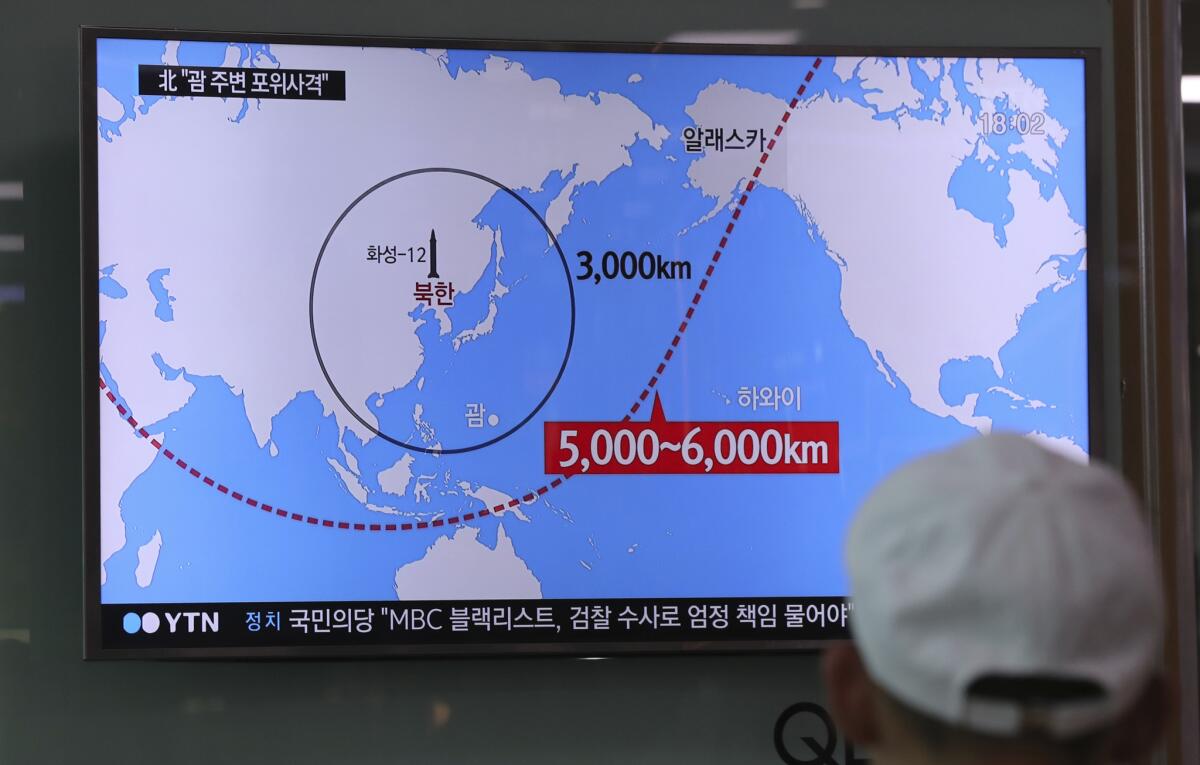
A new round of blustery threats has emerged over North Korea, as President Trump warned that any military action by Pyongyang “will be met with fire and fury like the world has never seen,” and North Korea’s military signaled it was “carefully examining” a plan to attack Guam.
What could possibly go wrong?
Diplomats lately have been warning of a chain of events they fear could escalate into a deadly new Korean War.
Threats and bluster are part of a familiar and long-running game of brinkmanship between Washington and Pyongyang, but this time, it has been made more dangerous by two volatile new players: Kim Jong Un and Donald Trump.
What are the options?
Tillerson says he doesn’t believe there’s ‘any imminent threat’ from North Korea
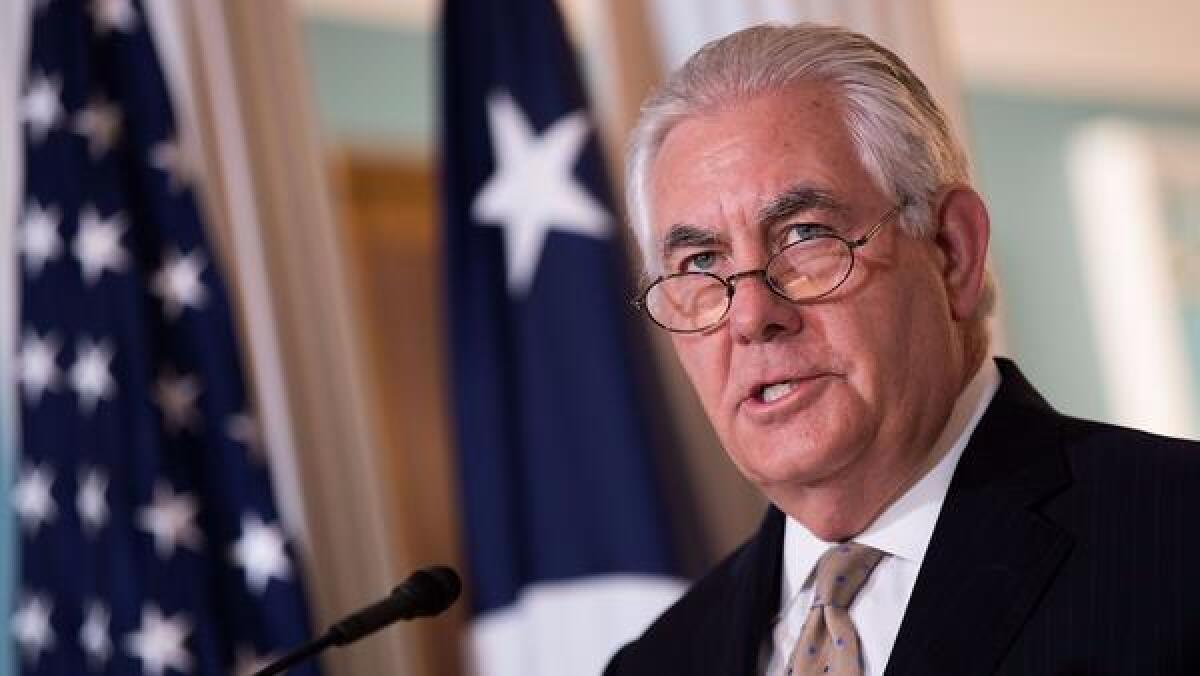
Secretary of State Rex Tillerson said Wednesday that President Trump’s fiery words threatening North Korea were intended as a “strong message” in “language Kim Jong Un would understand.”
Speaking on his flight home as he wrapped up a diplomatic tour through Southeast Asia, Tillerson said he was hopeful a fortified international front would put pressure on Pyongyang and force it to back down from its own belligerent stance.
Tillerson flew into Guam for a refueling stop, spending about an hour in the U.S. territory that the North Korean leader specifically threatened to attack. The secretary said he did not consider rerouting.
Tillerson and the U.S. ambassador to the United Nations, Nikki Haley, managed to secure unanimous U.N. Security Council approval of a tough new round of sanctions against North Korea over the weekend. Chinese and Russian officials have spent the last 48 hours insisting to their North Korean counterparts that the sanctions be obeyed, Tillerson said.
Despite the escalating tensions and explosive rhetoric, Tillerson urged calm, saying he did not believe that there was “any imminent threat.”
“Americans should sleep well at night,” Tillerson said.
“What the president is doing is sending a strong message to North Korea in language that Kim Jong Un would understand, because he doesn’t seem to understand diplomatic language,” Tillerson said. “I think the president just wanted to be clear to the North Korean regime that the U.S. has unquestionable ability to defend itself, will defend itself and its allies.”
Trump on Tuesday, from his private golf resort in New Jersey, warned Kim that he “best not” continue threatening to launch nuclear weapons and attack the U.S.
Otherwise, Trump said, “they will be met with fire and fury like the world has never seen.”
Tillerson said Trump’s threat would ensure there were no “miscalculation” on Kim’s part.
Tillerson downplayed any speculation that the alarming developments suggested the U.S. was moving closer to a military option to dealing with the crisis over the North’s nuclear and ballistic missile programs.
“Nothing that I have seen and nothing that I know of would indicate that the situation has dramatically changed in the last 24 hours,” Tillerson said.
Tillerson concluded several days of what he described as successful diplomacy, pressing Asian countries to join efforts against North Korea. He attended the annual meeting of the Assn. of South Eastern Asian Nations in Manila, became the highest-ranking U.S. official to visit Thailand since the 2014 military coup and met Malaysian leaders in Kuala Lumpur.
The stop in Guam, though a scheduled technical layover, sent a message, coming hours after Kim threatened to attack the island, which houses U.S. military bases and is a common refueling stop for U.S. government aircraft traversing the Pacific Ocean.
“The North Korean missile capability can point in many directions, so Guam is not the only place that would be under threat,” Tillerson said, as he sought to downplay any danger.
Tillerson often finds himself in the position of having to explain, and soften, the words that emanate from the White House and, in this case, mute the chances for public panic. Diplomats warn of the danger of miscalculations on either side spiraling out of control and leading to military action that would prove calamitous.
Tillerson said he believed that the U.S. strategy of talking tough while marshaling diplomatic forces behind the scenes was working.
“I think, in fact, the pressure is starting to show,” Tillerson said. “I think that’s why the rhetoric coming out of Pyongyang has gotten louder and more threatening. Whether we’ve got them backed into a corner or not is difficult to say, but diplomatically, you never like to have someone in a corner without a way for them to get out.”
The U.S. has sought special help from China, North Korea’s chief ally and trade partner, demanding Beijing do more to pressure the reclusive nation economically and diplomatically.
Tillerson has also dangled the possibility of talks with North Korea — but only if Kim’s government gives up its nuclear aspirations, starting with an extended pause in missile tests.
“Talks,” Tillerson said when asked if North Korea had a way out. “Talks, with the right expectation of what those talks will be about.”
Read MoreUPDATES
5:58 a.m.: This article was updated with staff reporting.
4:39 a.m.: This article was updated throughout with additional details and background.
This article was originally published at 4:21 a.m.
State Department’s No. 2 seeks to boost agency morale and dispel criticisms
In a bid to boost morale in the dispirited headquarters of American diplomacy, the No. 2 at the State Department told employees that the Trump administration’s goal is not to destroy the agency but to streamline it.
Deputy Secretary of State John Sullivan held an hourlong town hall Tuesday with more than 450 foreign and civil service officers, as well as hundreds more tuning in via satellite from around the world.
They peppered him with pointed questions about the future of their agencies, diplomatic postings and jobs.
State Department officials acknowledged that Sullivan’s goal in part was to reassure and clarify the objectives and procedures of an ongoing review and reorganization of the vast bureaucracy that oversees foreign policy, much of U.S. international aid and the promotion of American values abroad.
President Trump has proposed slashing the State Department and U.S. Agency for International Development budget by nearly 30%.
Speaking later to reporters, Sullivan also sought to dispel what he said were mistaken interpretations of some of the steps being taken in the review and redesign.
Suggestions that the State Department is being “hollowed out,” he said, were “counter-factual.” Hundreds of senior positions remain unfilled, but it does not mean they will never be filled, he said. Around 50% of the positions at the level of assistant secretary of State have been confirmed, nominated or are in the process of getting security clearances, he said.
“We ... are working on all cylinders, even though we don’t have a full complement of political officers,” Sullivan said.
Of the top 130 State Department posts that require Senate confirmation, 44 had been nominated and 23 confirmed by late Thursday, when Congress went on a monthlong break, according to the Partnership for Public Service, a nonpartisan, nonprofit group that tracks government hiring.
Sullivan said reports that the State Department was revising its mission statement to exclude the word “democracy” were untrue. He said a preliminary draft had been made by a group of officers, but it did not reflect senior department thinking.
He also said that Secretary of State Rex Tillerson’s decision to “rescind” so-called “delegations of authority” was part of the review and did not represent final decisions.
The State Department told The Times last week that Tillerson had rescinded three “delegations of authority” out of hundreds under review. That included, for example, the authority to make numerous management decisions, review congressional reports and related matters, powers delegated years ago to the office Sullivan holds; it was rescinded but immediately replaced with other similar authorities, Sullivan said.
Tillerson’s goal, his aides say, is to make the chain of command and decision-making more clear and transparent.
Sullivan also said a hold that had been placed on hiring spouses for embassy positions where their mates are stationed was partially lifted. Tillerson was refusing to sign off on such hires, which are commonly used in hardship posts, such as the embassies in Afghanistan or Iraq, to be able to encourage diplomats to go and satisfy the demands of secondary positions without having to pay to support other American staffing separately.
“We are trying to organize better, use our people better, help them do their jobs more effectively and efficiently,” Sullivan said.
Trump warns North Korea of ‘fire and fury’
President Trump, facing a growing nuclear threat from North Korea, warned the country on Tuesday against any new provocations and issued his own threat of “fire and fury like the world has never seen.”
“North Korea best not make any more threats to the United States,” Trump told reporters from the clubhouse of his golf course in Bedminster, N.J., where he was being briefed separately on the opioid epidemic. “They will be met with fire and the fury like the world has never seen.”
Trump added that North Korean leader Kim Jong Un “has been very threatening beyond a normal state, and as I said, they will be met with fire, fury and frankly power, the likes of which this world has never seen before.”
The comments came after a report in the Washington Post on Tuesday citing a U.S. intelligence assessment that North Korea has successfully produced a miniaturized nuclear warhead that can be affixed to missiles, greatly expanding the country’s range and power.
Trump’s rhetoric in some ways mirrors his North Korean counterpart’s with its muscularity, though it is also in line with Trump’s blunt style.
In Asia, Tillerson rallies support on North Korea, finds common ground with Duterte
Secretary of State Rex Tillerson seems to have found a bit of common ground with Philippine President Rodrigo Duterte, a man remembered infamously for his obscene insults of previous American leaders.
Tillerson is on a three-nation tour of Asia to drum up support for the campaign against North Korea and its nuclear weapons program.
Showing a certain diplomatic tact, Tillerson appears to have tried to get on Duterte’s good side by skirting the controversy surrounding the Philippine president’s brutal war on suspected drug dealers, which has claimed thousands of lives, including many believed to be innocent.
Instead, Tillerson expressed solidarity with Duterte’s simultaneous fight against Islamic State militants who have made incursions into southern parts of the island chain.
At the end of an hourlong meeting, Tillerson allowed that the two countries also share a serious drug problem, and he suggested there might be better ways to confront it.
The meeting took place Monday and was described to reporters by Tillerson’s chief communications advisor, R.C. Hammond, on Tuesday, as the secretary flew to Bangkok and then Malaysia.
“I see no conflict — no conflict at all in our helping them with that situation [on Islamic State] and our views of the human rights concerns we have with respect to how they carry out their counter-narcotics activities,” Tillerson said.
He said the United States has been providing the Philippines with surveillance instruments, training, information and aircraft to help fight the militants.
The main purpose of Tillerson’s trip has been to galvanize diplomatic and political forces against North Korea.
In Thailand, where Tillerson became the highest-ranking U.S. official to visit since the 2014 military coup, he sought Tuesday to encourage the country’s transition back to democracy and asked Thai leaders to put the squeeze on the North Korean diplomatic mission based there.
Numerous North Korean companies use Bangkok as a commercial hub, and the U.S. wants that to stop as part of international sanctions aimed at choking Pyongyang economically.
Later Tuesday, Tillerson traveled to Kuala Lumpur and met with Malaysian Prime Minister Najib Razak.
Scientists are reportedly worried Trump will suppress a new federal climate report
A federal climate report says the United States is already feeling the effects of climate change, with temperatures rising dramatically over the last four decades.
That’s according to the New York Times, which acquired a draft copy of the report by scientists from 13 federal agencies.
The report says extreme heat waves have become more common and extreme cold waves less common since the 1980s.
It says emissions of greenhouse gases will affect the degree to which global temperatures continue to rise — a claim President Trump and some members of his Cabinet have disputed.
One scientist cited anonymously by the Times said he and other researchers are worried that the Trump administration, which must approve the report’s release, will instead suppress it.
Trump emphasizes tough law enforcement in comments on opioid epidemic
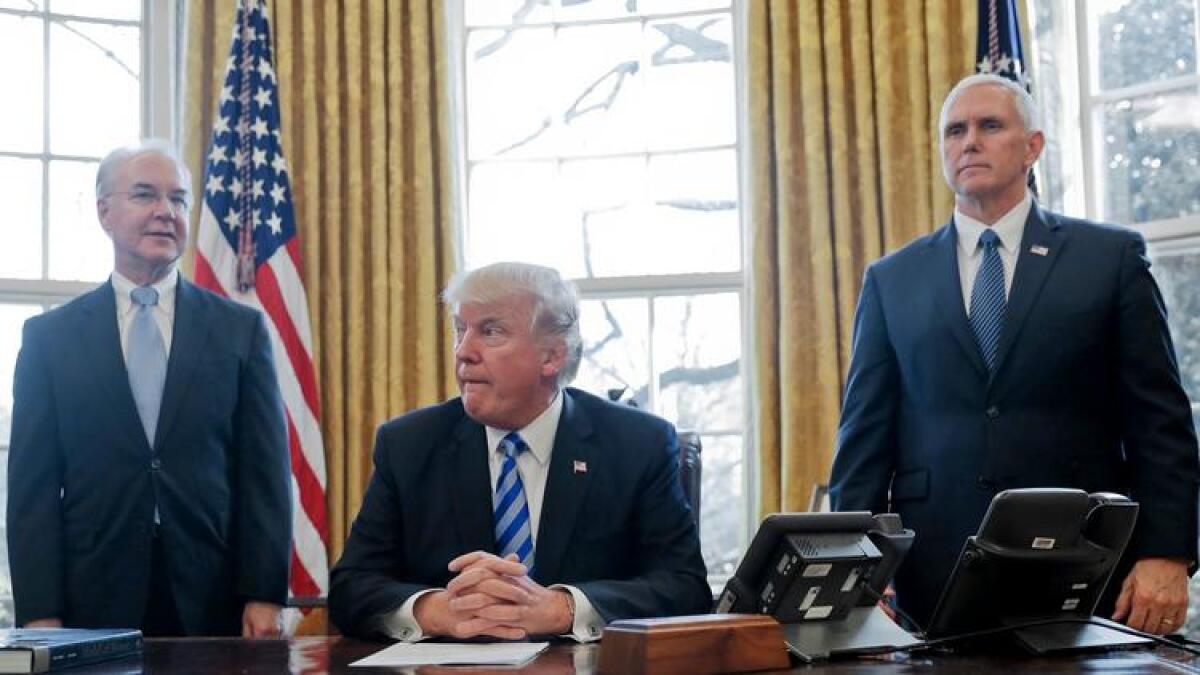
President Trump stressed law enforcement as he talked about the nation’s opioid problem Tuesday, emphasizing an approach that was not addressed in a report released last week by the special commission he appointed to combat opioid abuse.
“At the end of 2016, there were 23% fewer federal prosecutions than in 2011, so they looked at this surge and they let it go by,” Trump told reporters from the clubhouse of the golf club. “We’re not letting it go by.”
“Strong law enforcement is absolutely vital to having a drug-free society,” Trump said. “I have had the opportunity to hear from many on the front lines of the opioid epidemic, and I’m confidant that by working with our healthcare and law enforcement experts we will fight this deadly epidemic and the United States will win.”
Eager to convey a sense that he is working during his two-week stay at his golf club in New Jersey, Trump met with Health and Human Services secretary Tom Price to discuss the opioid crisis.
Trump spoke often on the campaign trail about the devastation that opioid addiction has caused in many communities, particularly rural, lower-income and working-class areas. Trump tended to do well in the regions hit hardest, a reflection of the issue’s importance to many voters.
The commission Trump appointed to study the epidemic, headed by New Jersey Gov. Chris Christie, recommended last week that Trump declare a national emergency, but it’s report stressed medical solutions, not law enforcement.
“We must act boldly to stop it,” the commission wrote. “The opioid epidemic we are facing is unparalleled.”
The interim report, which the authors said will be updated in the fall, included several recommendations to lift restrictions on the use of some federal funds that limit states from using Medicaid money for residential addiction treatment.
Though the issue resonates strongly with Trump’s core supporters, it could be a rare opportunity for bipartisan cooperation, given its widespread impact.
Despite repeated promises from the president to take on the opioid crisis, the Trump administration has taken steps that are likely to undermine efforts to control the epidemic, according to many physicians and other healthcare leaders.
Trump has pushed for deep cuts in federal aid to states for their Medicaid programs even as Medicaid has emerged as one of the most important tools in combating the crisis.
Medicaid, which now insures some 70 million low-income Americans, historically covered primarily poor children, pregnant mothers and the low-income elderly.
But in recent years, funding made available through the Affordable Care Act has allowed states on the front lines of the epidemic, including Ohio, West Virginia and Kentucky, to open Medicaid to poor, working-age adults, a population traditionally not eligible for coverage but often most likely to face substance abuse issues.
In Ohio, for example, more than a third of the approximately 700,000 people who enrolled in Medicaid after the expansion began in 2014 reported some drug or alcohol dependence, according to a recent study by the state. The vast majority did not previously have health insurance.
The Trump administration further rankled physicians and other addiction specialists earlier this year when during a visit to West Virginia Health and Human Services Secretary Tom Price seemed to dismiss the importance of medication assisted treatment for substance abuse patients.
A spokeswoman for Price later had to clarify that the health secretary supported a variety of treatment options.
No, Banksy isn’t the artist behind the West Bank Trump murals
No, it wasn’t Banksy.
When two massive murals featuring President Trump appeared on Israel’s West Bank separation barrier last week, it set off speculation that they were the work of the anonymous British graffiti artist, for whom the wall has previously served as a canvas.
The murals are located steps away from a nine-room guest house that Banksy opened in the town of Bethlehem. Known as the “Walled Off Hotel,” it claims to offer the “worst view in the world.”
But the new works are signed @lushsux, the alias used by a street artist from Melbourne, Australia. Video of the works was posted on the artist’s twitter account last week:
“I just thought Mr. Trump was perfect for the two murals because he loves border walls and the border wall in Palestine is one of the least known but biggest border walls in the world,” Lushsux said in an email.
The artist has made headlines before for provocative depictions of politicians, musicians, athletes and other celebrities.
They include a mural of Hillary Clinton in a skimpy swimsuit that drew the ire of the local council in Maribyrnong, a Melbourne suburb. The artist later covered up the image with a niqab, a type of veil worn by some Muslim women that leaves only the eyes showing.
President Trump, who received five draft deferments, loves attacking Sen. Blumenthal’s military record
President Trump likes to taunt his enemies but he seems to have a special place in his Twitter thumb for Connecticut Sen. Richard Blumenthal, the Democrat who was talking about the Russia investigation on CNN Monday morning.
Trump has mentioned Blumenthal in at least four other tweets, on two separate dates since February, according to the Trump Twitter Archive.
Each time, Trump has maligned Blumenthal for misrepresenting his military service during the Vietnam war, an ironic line of attack from a president who received five deferments from the draft and never served in the military.
Trump’s lack of military service is not unusual for a president.
Presidents Clinton and Obama both lacked military service, and President George W. Bush sparked some controversy with his service in the Texas National Guard during the Vietnam era. He was not deployed abroad.
President Reagan was never sent overseas during World War II, spending some of that time producing training films for the Army Air Forces. President Carter and President Ford both served in the Navy, and President George H.W. Bush was a Navy pilot in World War II.
None of those presidents was as aggressive in calling out others on the issue, though.
Trump called Blumenthal a “phony Vietnam con artist” in one tweet on Monday and said he “defrauded voters” in another. Back in February, he accused him of a “major lie” on the subject. In may, he alleged Blumenthal committed “one of the greatest military frauds in U.S. history.”
“Interesting to watch Senator Richard Blumenthal of Connecticut talking about hoax Russian collusion when he was a phony Vietnam con artist!” Trump tweeted Monday.
Indeed, Blumenthal was forced to apologize in 2010 for saying he had served in Vietnam, when in fact he served in the Marine Corps Reserves during the period and was not deployed.
Trump’s military history has come up several times, including during his public feud with the Muslim family of a fallen soldier during the presidential campaign.
Trump graduated in 1968, with four draft deferments for being a student that allowed him to avoid compulsory service.
After that, he received a fifth for bones spurs in his heels. He called the condition “temporary” and “minor” in an interview last year with the New York Times.
“I had a doctor that gave me a letter — a very strong letter on the heels,” he told the paper.
In a 2015 press conference, Trump forgot which heel had been diagnosed, before his campaign clarified that it was both of them.
Blumenthal, for his part, claimed the “bullying” was not getting to him.
“This issue isn’t about me,” he tweeted. “It’s about the Special Counsel’s independence and integrity.”
When the next crisis hits, will we have a better way to close a failing financial giant?
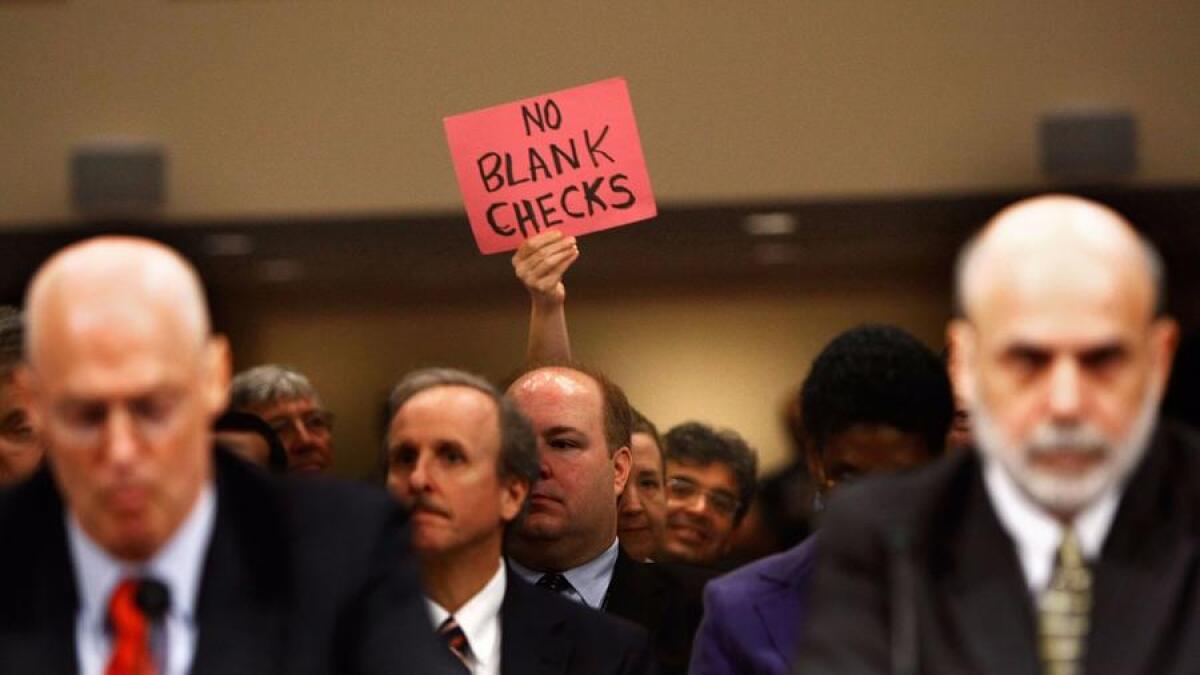
In the aftermath of the 2008 financial crisis, a consensus quickly developed in Washington: No more bank bailouts.
Nobody — lawmakers, government officials, regulators and certainly not average Americans — was happy about the hundreds of billions of dollars of taxpayer money pumped into banks and other firms to prevent a financial meltdown.
Although the money eventually was repaid, with the federal government even earning a small profit, Democrats and Republicans united in the desire to prevent a repeat.
But nearly nine years since the crisis, there’s no agreement on how to accomplish that goal.
The vastly different approaches of the two parties are at the center of the debate about financial regulation as the Trump administration and congressional Republicans target the slew of new rules put in place by Democrats with the 2010 Dodd Frank Wall Street Reform and Consumer Protection Act.
President Trump is tasked with governing, but he keeps harping on these things
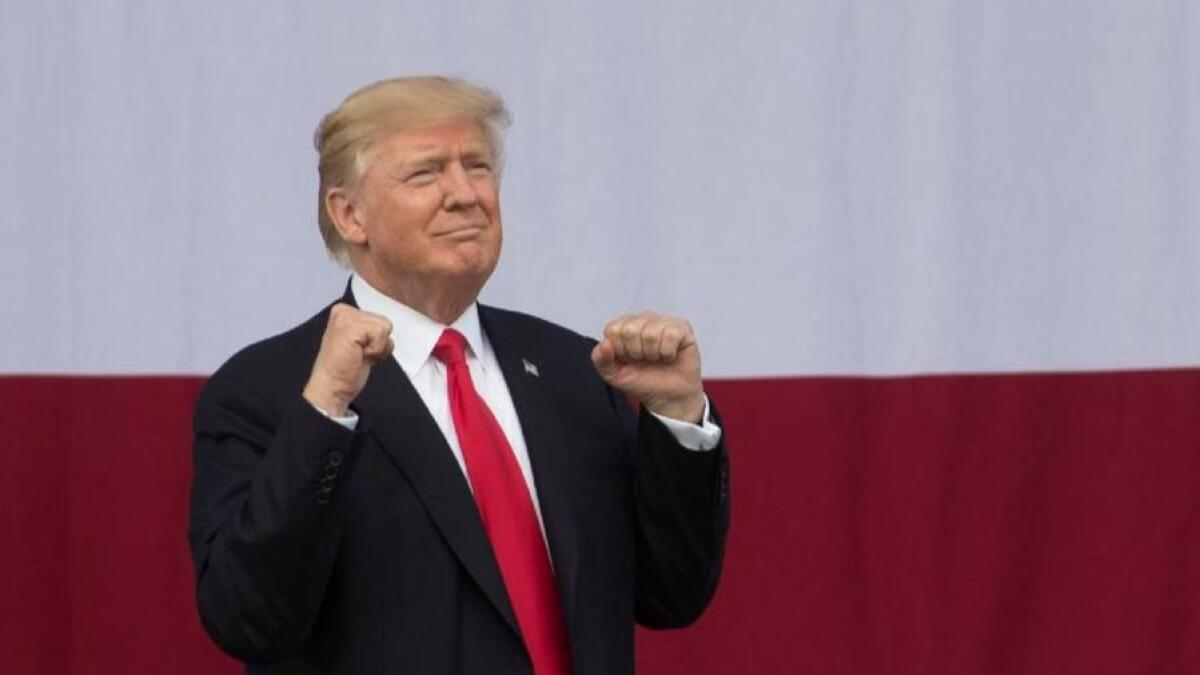
He’s been in office for more than six months, but it often seems he’s still campaigning.
That’s because President Trump, who in recent weeks has used speeches before the Boy Scouts of America and police officers to deliver overtly political remarks at nonpolitical events, continues to be consumed by the same issues.
On social media, during interviews, while speaking before Cabinet members, Trump homes in — obsessively — on a handful of topics and people.
Will that change? Well, at least for now, it seems unlikely.
Here are seven topics and his remarks in recent months.
Pence forcefully denies report of 2020 presidential ambitions
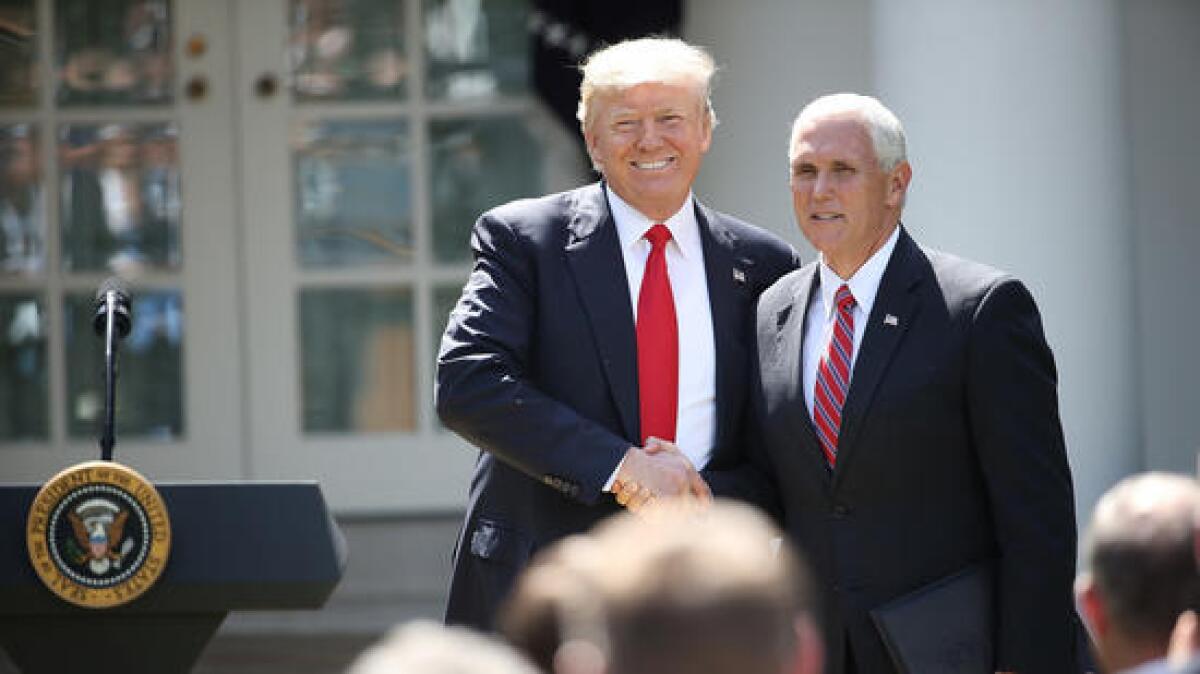
Vice President Mike Pence denied that he is considering a run for the presidency in 2020, issuing a statement the vehemence of which underscores how sensitive the White House is to any questioning of whether President Trump will seek a second term.
In what appeared to be a coordinated message, the White House also hit back Sunday at a report in the New York Times that described steps Pence and other GOP lawmakers have taken that could position themselves for presidential bids.
Pence went so far as to call the newspaper’s report “disgraceful and offensive.”
“The American people know that I could not be more honored to be working side by side with a president who is making America great again,” the vice president said, invoking Trump’s 2016 campaign slogan.
“Whatever fake news may come our way,” he said, citing another favored presidential phrase, “my entire team will continue to focus all our efforts to advance the president’s agenda and see him reelected in 2020.”
While Trump began fundraising for a 2020 campaign almost immediately upon taking office, there are several potential obstacles to a reelection bid:
He was 70 when he took office, the oldest first-term president to be inaugurated, and has since turned 71, and would be the oldest second-term chief executive were he to run again and win the 2020 election.
If age is not enough of an issue, his approval ratings are at a low that is unprecedented at this point in a presidential term.
Moreover, an increasingly complex special counsel investigation, looking at whether Trump’s campaign cooperated with Kremlin interference in the 2016 race, has been gathering momentum. Special counsel Robert S. Mueller III recently began working with a grand jury in Washington.
Mueller has not commented on the course of the probe, but his investigators have sought documents related to several associates of Trump’s, including his former national security advisor, Michael Flynn, and his former campaign manager, Paul Manafort. Investigators are also examining a meeting that Trump’s son, Donald Trump Jr., held with several Russians in early June 2016, a few weeks before the senior Trump received the Republican nomination.
Trump has talked with friends and aides about firing Mueller. Lawmakers from both sides of the aisle have explicitly warned him against trying to do so.
Despite those troubles, most prominent Republicans have avoided hinting at a challenge if Trump does seek the 2020 nomination. The main exception has been Ohio Gov. John Kasich, who opposed Trump to the end in 2016 and has not ruled out running against him.
Some other Republicans, including Sens. Tom Cotton of Arkansas and Ben Sasse of Nebraska, have been making the rounds of political dinners and fundraisers, building the sort of support that they could use for a presidential bid.
The subject is extremely sensitive within Trump’s White House; the president has been known to punish underlings he perceives as engineering too high a personal profile for themselves.
In an appearance that coincided with the release of Pence’s statement, White House counselor Kellyanne Conway said it was “absolutely true the vice president is getting ready for 2020 – for reelection as vice president.”
Appearing on ABC’s “This Week,” she said she had “zero” concern of any presidential aspirations on Pence’s part in the coming election cycle.
“Vice President Pence is a very loyal, very dutiful, but also incredibly effective vice president,” she said.
Trump, who has embarked on a 17-day visit – which he describes as a working vacation – to his golf property in Bedminster, N.J., was uncharacteristically quiet Sunday morning on Twitter. He confined himself to a single tweet: “Make America Great Again.”
With party switch in West Virginia, Republicans now have matched record number of governors’ seats. Will it last?
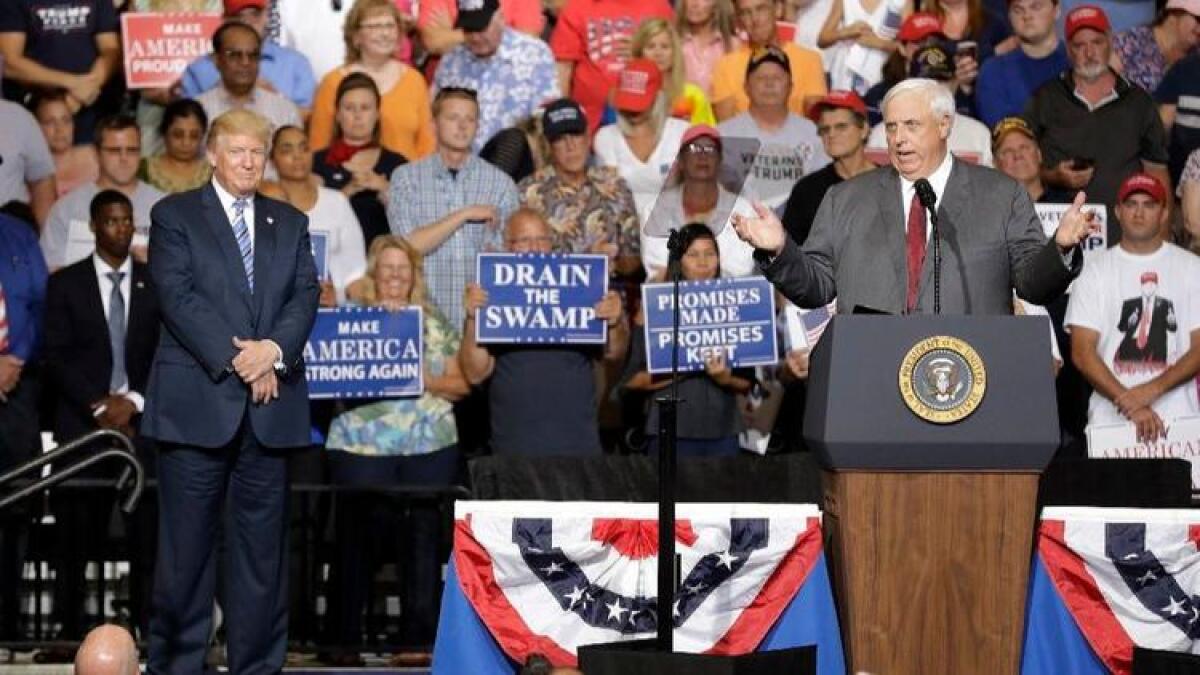
The moment was filled with political pomp and pageantry: Thousands of cheering supporters packed into an arena, a sea of poster-board signs and a big announcement.
“The Democrats walked away from me,” West Virginia Gov. Jim Justice, standing beside President Trump, told his constituents Thursday night. “I can’t help you any more being a Democrat.”
So, Justice said the time for change had arrived: He’ll be joining the Republican Party — a statement that brought a wide smile to Trump’s face.
The move by Justice, who on Friday officially changed his political affiliation, continued a trend in recent years that has seen Republicans dominate gubernatorial offices and state legislatures across the country. During the Obama administration, Democrats invested millions of dollars in bolstering organizational efforts in field operations and technology. But so far, it hasn’t translated into significant victories at the state level.
Banksy weighs in on Trump’s wall? A new mystery mural in Bethlehem
The spirit of a world-class artist blessed with sharp political wit has been emerging lately, as if by magic, in the little town of Bethlehem. It’s not the first time, of course, that an unexplained marvel has appeared here.
Early Friday, two massive murals depicting President Trump made their debut on the wall that separates Bethlehem, which is part of the Palestinian West Bank, from Jerusalem, in Israel.
According to transcripts published Thursday, Trump mentioned the Israeli wall in a phone call with Mexican President Enrique Peña Nieto a week after his inauguration.
In the call, Trump makes reference to his promise to build a wall separating the United States from Mexico.
“You know,” Trump says to his Mexican counterpart, “you look at Israel – Israel has a wall and everyone said do not build a wall, walls do not work — 99.9% of people trying to come across that wall cannot get across.”
Israel Prime Minister Benjamin Netanyahu, Trump said, “told me the wall works.”
One of the new murals on the 25-foot-high wall in Bethlehem shows the American president wearing a kipa and laying his palm on the wall, a gesture Trump decidedly did not make on his highly anticipated visit to Bethlehem in May, when his convoy sped past the wall.
The image appears to depict Trump’s visit to the Western Wall in Jerusalem. It shows him wearing the Jewish head-covering and placing his entire hand on the old stones.
A speech bubble emerging from Trump’s forehead states, “I’m going to build you a brother.”
The murals surfaced a few feet from the Walled Off Hotel, a Palestinian hotel/installation art that opened in March under the sponsorship of the British guerrilla artist Banksy, whose work appears in several locations in Bethlehem.
The hotel offers, it boasts, the “worst view in the world,” and is decorated with Banksy’s work, including a bedroom wall painting depicting a balaclava-wearing Palestinian and a helmeted Israeli soldier having a pillow fight.
The second new mural shows Trump wrapping his arm around an Israeli watchtower as if to kiss it, a shower of pink hearts covering the area between his arm and his mouth.
There has been speculation that the latest murals are the work of Banksy, though they do not display the whimsy of many of his other works, such as a painting he created in an earlier, stealthy visit to Bethlehem that depicts a girl lifted skyward by helium balloons.
The works are unsigned. A man who answered the phone at the hotel said he could not say who painted the murals. “We have no idea,” he said.
Analysis: In Arizona, a potential showdown between a Republican senator and the Republican president
It’s not surprising to find an Arizona Republican smack in the middle of a poke-in-the-eye dust-up with the powerful. The only surprise these days is that the Republican in question isn’t John McCain.
McCain is in a fight of his own, having cast the final blow against the healthcare plan crafted by his fellow Senate Republicans and President Trump. In his home state, references to that vote prompt a shoulder shrug and a common Arizona refrain: “Just McCain being McCain.”
The newest set-to, however, involves the state’s junior Republican senator, Jeff Flake, a first-termer who may have blasted a big hole in his reelection campaign next year by publishing a book.
And not just any book. A book that swiped its name from one published a generation ago by Arizona’s revered veteran Sen. Barry Goldwater: “Conscience of a Conservative.” A book that vented about the Republican Party and what he calls his colleagues’ “abdication” of their responsibility to stand up against the party’s embattled president.
Republicans are in “denial” about Trump’s “erratic executive branch,” Flake wrote, saying that the party’s “unnerving silence” would be as if Noah had watched the flood rising and decided to focus on other things. “At a certain point, if one is being honest, the flood becomes the thing that is most worthy of attention,” he wrote. “At a certain point, it might be time to build an ark.”
For Arizonans, that has set up a question: Will the president, who famously punches back when hit, seek revenge on Flake by summoning a Senate challenger?
Appeals court throws out prison sentences of three Blackwater guards in 2006 Iraq shooting
Federal appeals court overturns Blackwater contractor’s murder conviction in 2007 slayings of 14 Iraqi civilians.
Read the decision here:
Analysis: These voters in Arizona are fed up with Democrats, Republicans and, most of all, President Trump

In Arizona, where the Great Recession cut a deep swath through home prices and shook all facets of the economy, voters are now increasingly buoyant about the fiscal future they envision for themselves and the nation.
They’re saving their ire for politics and politicians.
More than two dozen voters gathered in Phoenix this week delivered a bipartisan broadside against President Trump, Republicans and Democrats, dismissing the political class as serving its wealthy benefactors and abandoning everyday Americans.
Their fiercest disappointment was aimed at Trump.
Their relationship at a low, Trump and Congress cast blame on each other heading into break
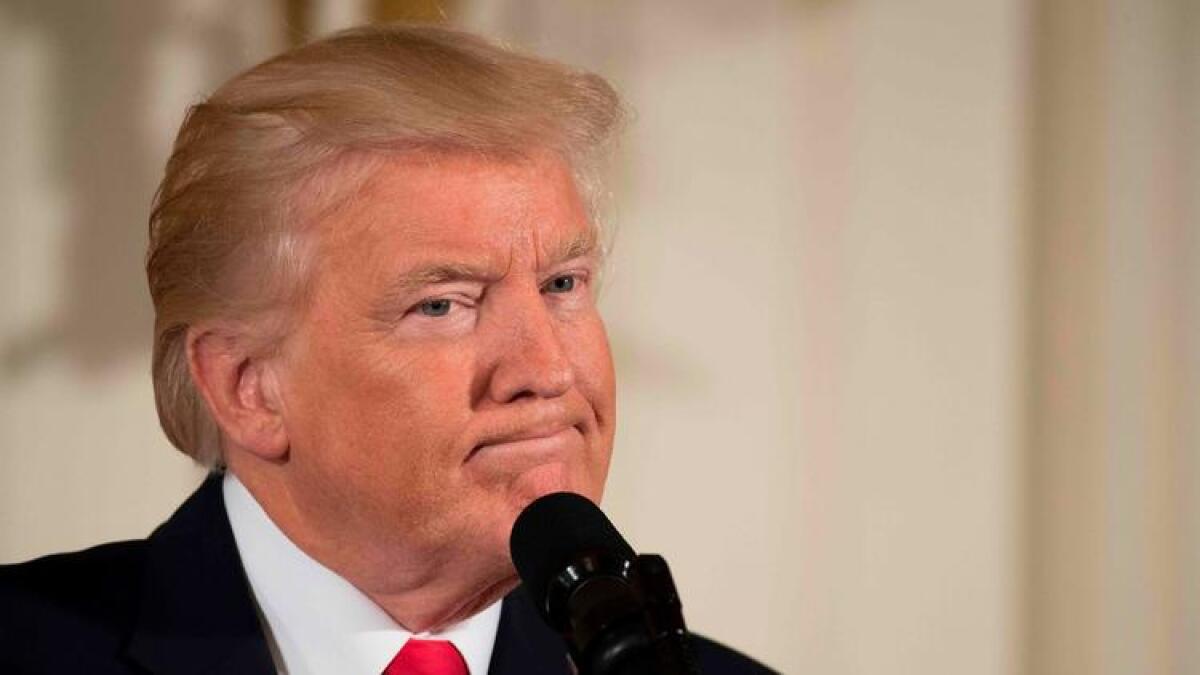
They’re going away mad.
As President Trump and the Republicans who control Congress leave Washington for their separate August breaks, theirs is a marriage on the rocks, an estrangement that bodes ill for their party’s ambitious agenda going forward.
Gov. Jim Justice of W.Va. says he’s switching to the Republican Party
As President Trump visited the increasingly conservative state, West Virginia Gov. Jim Justice announced Thursday that he’s switching parties to join the Republicans.
Justice told about 9,000 Trump supporters at a rally in Huntington that he will be changing his registration Friday. He recently visited the White House twice with proposals on manufacturing and coal.
Neither he nor Trump are politicians and they both ran to get something done, he said.
“This man is a good man. He’s got a backbone. He’s got real ideas,” Justice said of Trump. “He cares about America. He cares about us in West Virginia.”
Trump said they spoke a few weeks ago about working together to open coal mines and create jobs in furniture manufacturing and other forms of manufacturing. “But Gov. Justice did something else very important tonight. He showed the country that our agenda rises above left or right,” he said.
Justice was elected in November with just 49% of the vote, 20 percentage points behind Trump’s total in the presidential contest in the state. Trump won 77% of West Virginia’s Republican primary voters in May.
Michael Flynn files new financial form reporting ties to controversial data firm
President Trump’s former national security advisor, Michael Flynn, is revealing a brief advisory role with a firm related to a controversial data analysis company that aided the Trump campaign, the Associated Press has learned.
The disclosure of Flynn’s link to Cambridge Analytica will come in an amended public financial filing in which the retired U.S. Army lieutenant general also discloses income that includes payments from the Trump transition team, according to a person close to Flynn who spoke to AP on condition of anonymity Thursday to describe details of the filing made to the White House.
The amended disclosure shows that just before the end of the campaign, Flynn entered into a consulting agreement with SCL Group, a Virginia-based company related to Cambridge Analytica, the data mining and analysis firm that worked with Trump’s campaign.
The person said Flynn didn’t perform work or accept payment as part of the agreement with SCL Group. The details of Flynn’s role with SCL weren’t fully laid out, the person said, noting that Flynn terminated his involvement shortly after Trump won the presidency.
Cambridge Analytica was heavily funded by the family of Robert Mercer, a hedge fund manager who also backed the Trump campaign and other conservative candidates and causes. Cambridge Analytica also worked for the successful pro-Brexit campaign in 2016 to pull Britain out of the European Union. Trump administration chief strategist Steve Bannon was a vice president of Cambridge Analytica before he joined the Trump campaign.
Democratic lawmakers and Trump critics have seized on Cambridge Analytica’s role as they’ve pushed congressional investigators to scrutinize the Trump campaign’s data operation as part of probes into Russia’s interference in the 2016 election.
Flynn’s previous filing, submitted to the White House and the Office of Government Ethics in March, listed at least $1.3 million in earnings, including between $50,000 and $100,000 from his consulting company, Flynn Intel Group Inc. The latest filing lists at least $1.8 million in income.
Flynn’s amended filing comes about six months after he was ousted from the White House for misleading the vice president about conversations he had with the then-Russian ambassador to the U.S. It also comes as special counsel Robert Mueller and congressional committees are scrutinizing Flynn’s business deals and foreign connections.
The person close to Flynn said the former military officer is disclosing the information in an amended filing to make sure the “public record is accurate and transparent.” The person noted that Flynn and his legal team have spent months piecing together the information necessary for the filing without the assistance of the White House counsel’s office or the Office of Government Ethics.
In the filing, Flynn reports earning about $28,000 from the Trump presidential transition and more than $5,000 as a consultant to an aborted plan to build nuclear power plants across the Middle East. The consulting connection with a group of companies involved in the power plant proposal had been disclosed in Flynn’s previous filing, but it had not indicated that he had received payment.
Flynn’s new filing also provided more details about his consulting work for NJK Holding Corporation, a firm headed by Iranian American multi-millionaire Nasser Kazeminy. The filing shows that Flynn was paid more than $140,000 for his roles as advisor and consultant to Minneapolis-based NJK.
Flynn also served as vice chairman at GreenZone Systems, a tech firm funded by NJK and headed by Bijan Kian, who was Flynn’s business partner in Flynn Intel Group, a consulting firm that was active last year but is now defunct. Flynn Intel is now under scrutiny by federal authorities and congressional investigators for its role in research and lobbying work for a Turkish businessman tied to the government of Turkey.
In a statement to the AP, NJK said Flynn “played an advisory role to NJK Holding relative to its investment interests in security.” The firm added that in his roles with NJK and GreenZone, Flynn “provided his counsel and guidance on public sector business opportunities for secure communications technology within the U.S. Department of Defense” and with other agencies.
NJK said Kian has no current involvement with NJK or GreenZone.
Earlier Thursday, Rep. Elijah Cummings (D-Md.), the ranking Democrat on the House Committee on Oversight and Government Reform, asked Kian for documents detailing Flynn’s foreign business contacts and travel. Flynn listed Kian as a personal reference in 2016 during his effort to renew his military security clearance. Kian told military investigators that Flynn had several foreign business contacts, but Flynn did not provide any of those contacts to investigators, Cummings said.
As Russia investigation reaches new milestone, Trump lashes out at ‘fake story’ as crowd chants ‘Lock her up!’
President Trump called the Russia investigation “a total fabrication” and “an excuse for the greatest loss in the history of American politics” at a rowdy rally Thursday soon after news broke that special counsel Robert S. Mueller III had convened a criminal grand jury.
Blaming Democrats even as the Justice Department special counsel has advanced his investigation, Trump said, “It just makes them feel better when they have nothing else to talk about.”
He prompted an overflow crowd of supporters in a 9,000-capacity Huntington, W.Va., arena to chant “Lock her up!” and then paused to encourage their taunts at Hillary Clinton, his 2016 Democratic rival, just as he first did more than a year ago at the Republican convention that nominated him for president.
“What the prosecutors should be looking at are Hillary Clinton’s 33,000 deleted emails,” he said, his voice rising as the crowd grew more excited.
Trump had said after the election that he no longer wanted the Justice Department to investigate Clinton, months after the FBI had already declined to do so after a lengthy look at her emails. But as the investigation into his campaign’s potential collusion with Russia’s election meddling, and his own possible obstruction of justice, has gained steam, Trump has renewed his complaints about Clinton -- a unifying villain to his core supporters.
Trump also seemed to narrow the scope of his defense against the allegations, now that it is known that his son Donald Jr., son-in-law Jared Kushner and former campaign chairman Paul Manafort met last year with a Russian attorney said to have incriminating material against Clinton provided by the Russian government.
Trump previously has insisted that no one in his campaign had met with any Russians. On Thursday, he simply said Russians were not in his campaign.
“Most people know there were no Russians in our campaign,” Trump said. “There never were. We didn’t win because of Russia. We won because of you.”
Trump, who propelled his political ascent by tapping into working-class voters’ sense of grievance, hit the familiar themes in West Virginia. Yet he did so in service of uniting his impassioned supporters against Congress, which is led by his party, and against federal prosecutors.
They are not only undermining the legitimacy of his election, Trump said, but in doing so demeaning the voters who put him in office. West Virginia, which he won by more than 40 percentage points, provided a near perfect backdrop.
“Have you seen any Russians in West Virginia or Ohio or Pennsylvania? Are there any Russians here tonight, any Russians?” he said, pausing so the appreciative crowd could take in the sarcasm.
“They can’t beat us at the voting booths so they’re trying to cheat you out of the future and the future that you want,” he said.
It’s a strategy that Trump has used from the beginning of the Russia investigation, to solidify his base of supporters as a bulwark against political and legal threats, and one that he is likely to rely on more heavily assuming the inquiry progresses.
“They’re trying to cheat you out of the leadership you want with a fake story that is demeaning to all of us,” he said. “And most importantly, demeaning to our country.”
Senate confirms dozens of Trump’s nominees in an outbreak of bipartisan productivity after failed healthcare vote
What a difference a little bipartisanship makes.
The Senate wrapped up an unusually productive week after the failed Republican healthcare vote with several smaller-scale legislative accomplishments.
In a flurry of action Thursday, the Senate confirmed dozens of President Trump’s nominees that had been logjammed amid the partisan standoff over the GOP efforts to repeal Obamacare.
Ambassadors, agency staff and officials in the defense apparatus all saw their nominations sail to easy confirmation. More nominees have been confirmed this week than had been previously so far in the entire year, aides said.
Among them were former Texas Sen. Kay Bailey Hutchison to be the U.S. permanent representative on the Council of the North Atlantic Treaty Organization, and Ray Washburne of Texas to be president of the Overseas Private Investment Corp.
Senate Minority Leader Charles E. Schumer (D-N.Y.) offered his party’s cooperation as a gesture of goodwill toward bipartisanship after the failed vote last week to undo the Affordable Care Act. Democrats had mounted an unusually strong wall of opposition that stalled approval of many of Trump’s picks.
In accepting the outreach, Senate Majority Leader Mitch McConnell (R-Ky.) was able to clear the backlog and serve up a win for Trump and the agencies, many in desperate need of staffing.
At one point, McConnell planned to keep senators in session through mid-August. But on Thursday they were poised to salvage the victories they could, and then take a break.
As Trump prepares to leave for a 17-day vacation, his 2012 tweet criticizing vacations resurfaces
There may well be a Trump tweet on the shelf for every occasion, ready to contradict the president in the present.
As President Trump prepares to depart Friday for a 17-day vacation at his New Jersey golf resort, a nearly 5-year-old tweet in which he criticized his predecessor is No. 2 on the front page of Reddit.
He quotes from “Think Like a Billionaire,” his 2004 book about “the billionaire mindset,” which was published at the height of his “Apprentice” fame on NBC.
Trump wrote that tweet while President Obama was on a four-day trip to Asia, where he became the first U.S. president to visit Burma and Cambodia. The trip was intended to help solidify relations between the United States and Asia, a foreign policy priority for the Obama administration.
Trump will be spending what aides are calling a “working vacation” at his Bedminster golf complex. He has visited a Trump-owned property almost every weekend of his presidency.
Trump’s poll standing slips again, while doubts rise over his ability to get things done
President Trump’s standing with the American public, never particularly robust, has taken another hit in the past couple of weeks, with signs of weakness appearing among Republican voters.
The renewed decline comes after a few months of relative stability that followed a drop in early May. The latest decline coincides — as the previous one did — with a period in which the administration’s highly unpopular healthcare plans dominated news coverage.
The latest drop is not huge. It represents a slow leak, rather than a blowout. But the decline is consistent, showing up in a half-dozen recent surveys from a range of nonpartisan polling organizations.
Fewer than 4 in 10 Americans now approve of Trump’s performance in office, the surveys indicate, while nearly 6 in 10 have a negative opinion.
More troubling for the White House than the size of the drop is the nature of who has begun souring on Trump.
In polls by SurveyMonkey, for example, which uses very large samples that allow for analysis of subgroups, moderate Republicans have noticeably started to leave the fold. In February, about 80% of them said they supported Trump; by this past week, that support had fallen to 67%.
At the same time, the share of people who say that Trump “can get things done” has dropped by about 10 points since early March. Only 28% of people in the most recent SurveyMonkey poll said he can. Because that figure is smaller than Trump’s overall job approval, it indicates that even some of Trump’s supporters have begun to doubt his effectiveness.
Similarly, only 19% now say that “keeps his promises” applies to Trump, a big drop from the 35% who said so early in the spring.
In polling by YouGov, about one-third of Americans said Trump “understands important issues in detail,” while about half said he does not. That’s slightly below the share who approved of his performance, 37%, compared with 54% who disapproved.
And in a poll released this week by Quinnipiac University, the public’s view of Trump had soured on a range of personal characteristics. Only a quarter of those polled said he was “level headed,” for example, and only 26% said they were “proud” to have him as president.
Those ratings were below Trump’s job approval — just 33% in the Quinnipiac survey, which was the worst for him of the recent polls. So as with the other surveys, the comparison suggests that a number of people approve of Trump’s overall performance even as they take a negative view of his personal traits.
Finally, the polls show that the share of voters who say they “strongly” approve of Trump’s performance has continued to decline. An increasing number of Republican voters has shifted from offering him strong approval to offering a more tepid level of support.
The decline in strong approval and the doubts about Trump’s personal characteristics all suggest the potential for further weakening of Trump’s support if his recent troubles continue.
Battle between Stephen Miller and CNN’s Jim Acosta fires up right wing
It’s not rare for President Trump or his aides to get into shouting matches with reporters.
Even so, Wednesday’s battle between Stephen Miller, a senior advisor to the president, and CNN correspondent Jim Acosta was one to remember. The two tangled over immigration and the symbolism of the Statue of Liberty.
Miller’s back-and-forth with Acosta and other reporters brought energy to the right wing. Here are some of today’s storylines:
Trump advisor Miller schools Acosta: Statue of Liberty poem on huddled masses added later (Breitbart)
During the press briefing, Acosta, when talking about the United States opening its doors to immigrants, cites a line from a poem – “your tired, your poor, your huddled masses” – written by Emma Lazarus, which is etched on the Statue of Liberty. Miller retorts, saying the poem was not originally on the statue, but added at a later date.
This piece, prominently displayed on the right-wing website Thursday, offers a play-by-play and background on the poem, noting Miller’s correct rebuttal.
Meanwhile, here’s how some on the right responded to Miller’s remarks:
Acosta pulls the media’s mask off (American Spectator)
Trump often labels CNN, the New York Times and other news outlets as purveyors of “fake news.”
In this piece, the writer, George Neumayr, takes Miller’s side in the press room battle.
“Acosta’s hectoring of Stephen Miller on Wednesday — behavior indistinguishable from a La Raza activist at a Trump rally — confirms once again the journalistic bankruptcy of Jeff Zucker’s CNN,” he writes. “Acosta doesn’t need any encouragement to be a demagogic jerk, but Zucker has no doubt flashed that green light to him.”
Transcripts of Trump’s calls with Mexican, Australian leaders reveal president worried about the politics of immigration
President Trump told Mexico’s president that a proposed border wall between the two countries was “the least important thing we are talking about,” according to a transcript of the January call published by the Washington Post on Thursday.
The Post said it obtained the transcripts of Trump’s talks with President Enrique Peña Nieto and Australian Prime Minister Malcolm Turnbull from White House staff.
During the call with Peña Nieto, held just a week after Trump took office, the new president told the Mexican leader to stop saying Mexico would never pay for the wall.
The wall had been a signature issue for the Trump campaign which insisted that Mexico would pay for it.
“If you are going to say that Mexico is not going to pay for the wall, then I do not want to meet with you guys anymore because I can’t live with that,” he said.
Peña Nieto resisted, saying that Trump’s repeated threats had placed “a very big mark on our back, Mr. President.” He warned that “my position has been and will continue to be very firm, saying that Mexico cannot pay for the wall.”
The two leaders also discussed the politics of the border wall and the “tough hombres” that Trump has said are driving the Mexican drug trade.
Here are some of the transcript’s choice quotes from Trump.
Believe it or not, this is the least important thing that we are talking about, but politically this might be the most important talk about.
You have some pretty tough hombres in Mexico that you may need help with, and we are willing to help you with that big-league. But they have to be knocked out and you have not done a good job of knocking them out.
But the fact is we are both in a little bit of a political bind because I have to have Mexico pay for the wall — I have to.
In a Jan. 28 call with the Australian leader, which did not go well and ended abruptly, Trump touched on a different sort of immigration policy.
He said that an agreement by the two countries for the U.S. to resettle as many as 1,250 asylum seekers in Australian custody would “kill” him politically.
But Turnbull reminded the president that a deal for the U.S. to take the asylum seekers had already been agreed to.
“There is nothing more important in business or politics than ‘a deal is a deal,’” Turnbull said. “You can certainly say that it was not a deal that you would have done, but you are going to stick with it.”
Excerpts from Trump’s remarks during that call:
This is going to kill me. I am the world’s greatest person that does not want to let people into the country.
I hate taking these people. I guarantee you they are bad. That is why they are in prison right now. They are not going to be wonderful people who go on to work for the local milk people.
Turnbull responded, “[N]one of these people are from the conflict zone. They are basically economic refugees from Iran, Pakistan and Afghanistan. That is the vast bulk of them. They have been under our supervision for over three years now and we know exactly everything about them.”
When Trump wanted the call to end, half an hour earlier than scheduled, he chastised the Australian leader:
I have had it. I have been making these calls all day and this is the most unpleasant call all day. Putin was a pleasant call. This is ridiculous.
Taking aim at the Clean Air Act, Congress threatens California’s power to fight smog
California is confronting the limits of its power to save federal environmental protections as Congress and the Trump administration take aim at a landmark law the state has relied on for decades to clean the air of noxious smog.
A push by Republicans to roll back parts of the Clean Air Act would affect California more than any other state, rattling its lawmakers and regulators. And their legal authority to pick up the fight against California’s smog on their own is constrained.
The House last month passed a bill fiercely opposed by doctors and public health groups, including the American Lung Assn. and the American Academy of Pediatrics, that would delay for years new anti-pollution standards aimed at ultimately preventing 160,000 childhood asthma attacks and as many as 220 premature deaths in California each year.
Pastor once said mothers do not belong in state office. Now he leads Trump Cabinet in Bible study
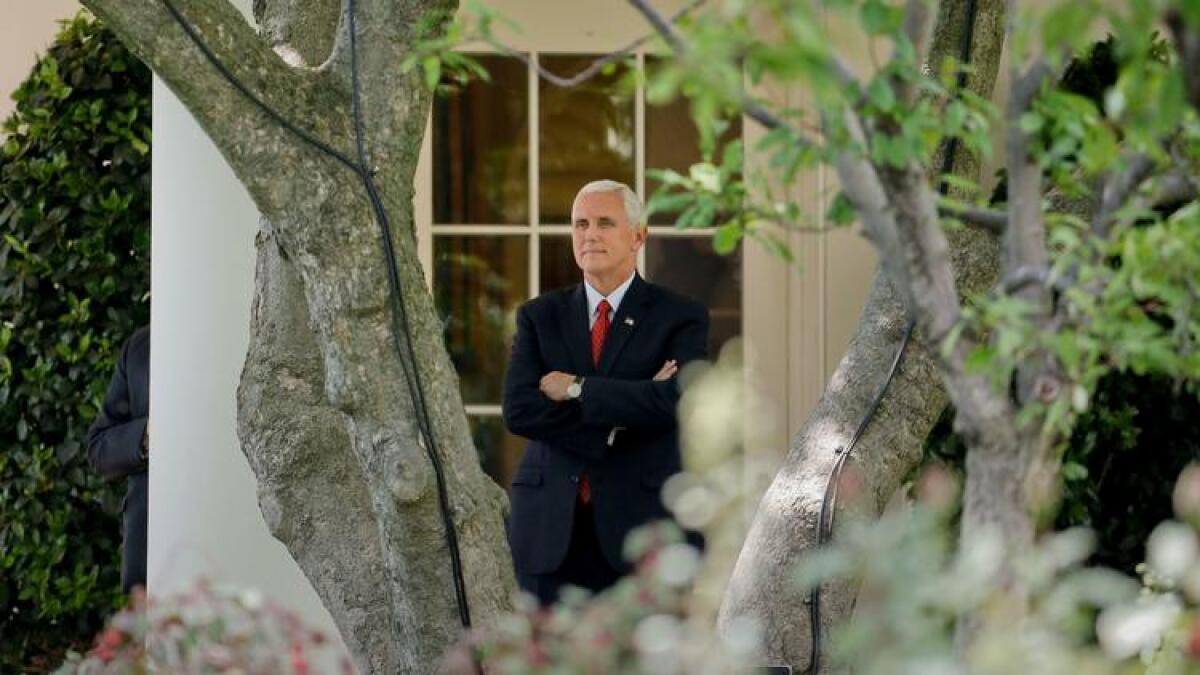
News from the Christian Broadcasting Network that members of President Trump’s Cabinet are attending Bible study sessions together didn’t come as such a shock in Washington.
The shock was who is teaching them.
That teacher, Pastor Ralph Drollinger, is well known to some members in the California congressional delegation. He is the evangelical spiritual leader who once counseled a group of Sacramento lawmakers that female politicians with young children have no business serving in the Legislature. In fact, he called them sinners.
Drollinger also declared that Roman Catholicism “is one of the primary false religions in the world” — precipitating his Bible study group’s move out of a suite of offices controlled by then-Gov. Arnold Schwarzenegger, a Catholic.
Russian lawmaker: ‘Trump is not a puppet’
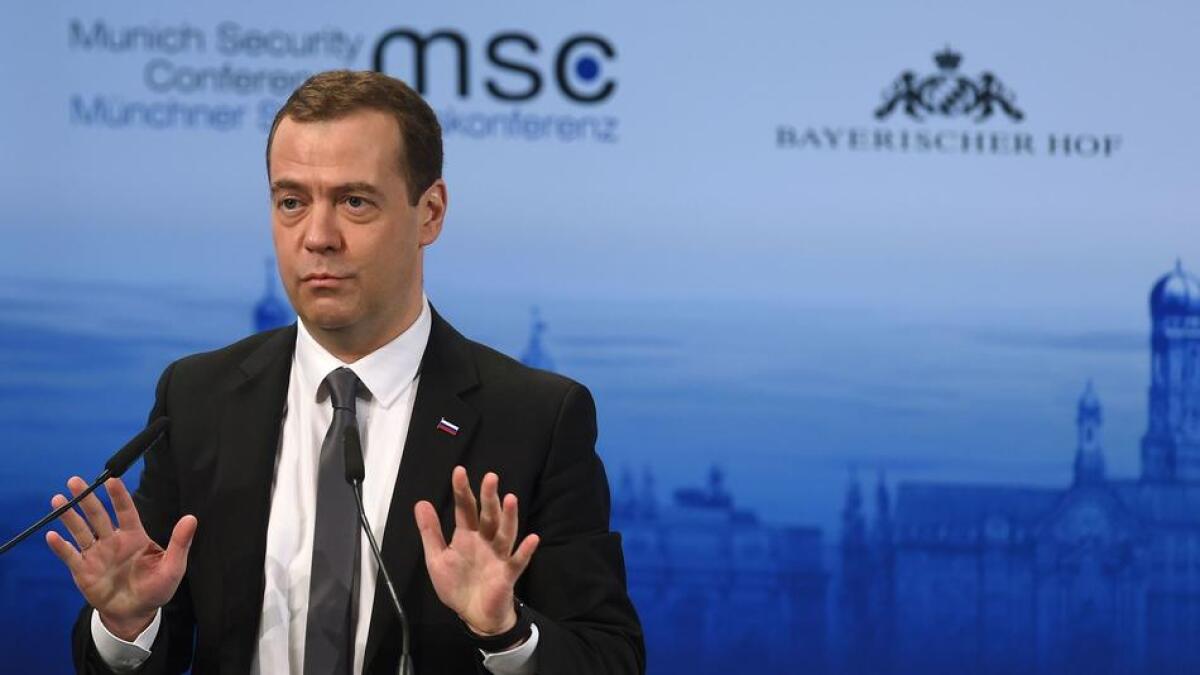
When President Trump signed the latest Russian sanctions bill on Wednesday, he did so in full consciousness and of his own volition, a Russian lawmaker said Thursday.
“The masks are off; Trump has shown his true face,” Alexander Sherin, the first deputy chairman of the Russian parliament’s defense committee, told the Russia’s Life.ru news outlet.
Sherin said Trump tries to shift the blame to others by taking the position that he treats Russia well but is under pressure from the hawks in the Senate, who want to force him to take harsh measures.
But by doing so, Trump is simply shifting the blame.
“Trump is no puppet,” Sherin said.
The Russian lawmaker’s comments came a day after Prime Minister Dmitry Medvedev posted on his Facebook account that the Trump administration had demonstrated “total weakness” by signing the bill into law on Wednesday to extend and expand economic sanctions against Russia.
Sherin said Medvedev was correct to define the current tension between the U.S. and Russia as a trade war.
“To [Trump], U.S. interest is the only thing that matters,” Sherin was quoted as saying to Life.ru. “America needs markets to sell its products. They don’t need Ukraine and have no interest in the Crimean issue. These are all invented excuses that allow them to slap sanctions on Russia and clear the markets for U.S. companies producing energy resources and weapons.”
And that friendly meeting between the two leaders in Hamburg, Germany, last month during the G20 summit? According to Sherin, Trump already had made his mind up about how he would treat Russia.
“They met and talked for two hours, and after that, Trump signs another law that puts an end to the question of whether he intends to improve relations with Russia or intends to continue the economic war against Russia,” Sherin said.
Trump switches former Dodgers co-owner Jamie McCourt’s ambassadorship from Belgium to France
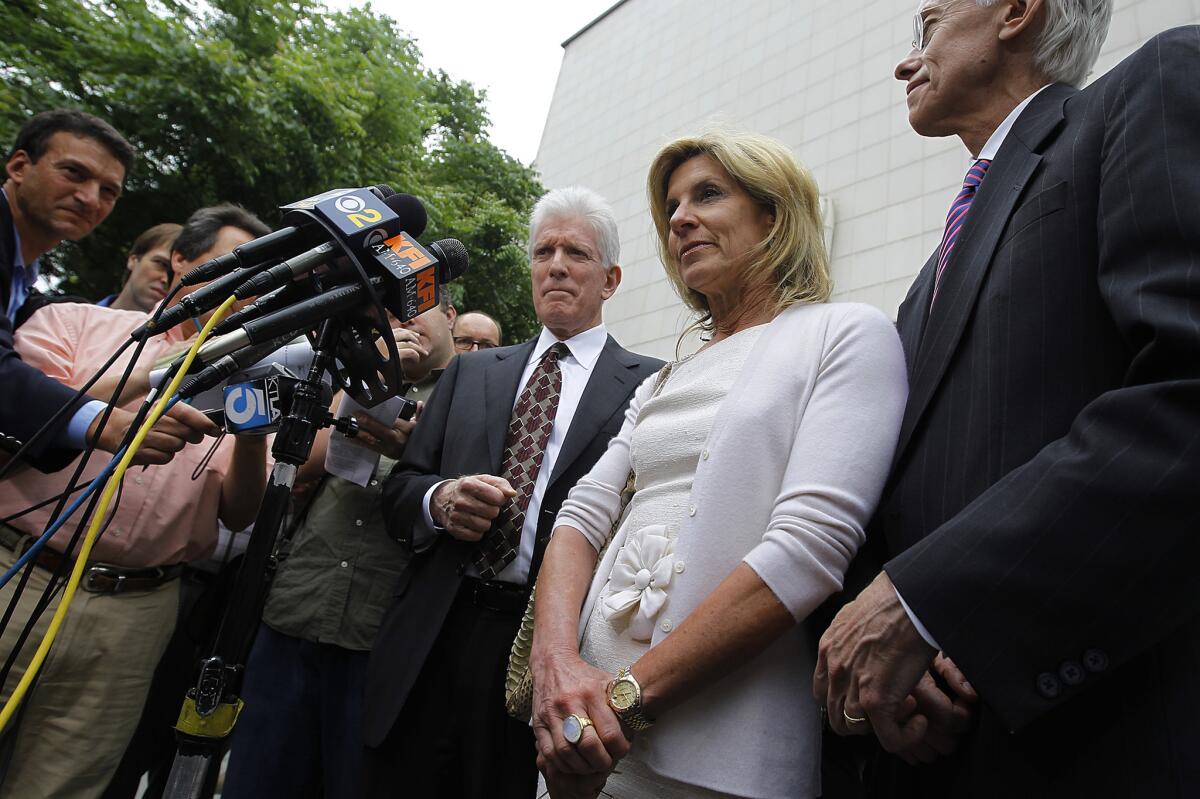
Former Los Angeles Dodgers co-owner Jamie McCourt is now being considered for the ambassador of France rather than Belgium.
President Trump announced Thursday morning his intent to nominate McCourt for the ambassadorship to France and Monaco, instead of Belgium as he had indicated in June.
The White House noted that McCourt, an entrepreneur, attorney and political donor to Trump and other Republican candidates, spoke French but did not indicate why Trump made the switch.
McCourt donated more than $400,000 to the Trump Victory fund, $50,800 to the Trump inauguration and more than $170,00 to the Republican National Committee.
She was an early supporter of Trump, joining 100 other business executives and CEOs in signing a letter championing Trump’s economic plans in October 2016. She was also listed as a 2016 State Victory Finance Chair for Trump’s campaign and helped to host a fundraiser breakfast for Trump’s transition to the presidency.
Trump, like every president, has picked several of his nominations for ambassadorships based on political support and financial backing. So far, he has appointed 14 ambassadors based on their career in foreign service and 20 ambassadors for political reasons. The so-called political appointees are often assigned what are considered more desirable positions, like those in Europe.
Trump is also reportedly considering nominating two other wealthy Southern Californians and major GOP donors to ambassadorships -- former Hollywood studio head Tom Barrack as ambassador to Mexico and businesswoman Kelly Roberts as ambassador to Slovenia.
McCourt previously donated to the campaigns of several other Republican presidential candidates, including John Kasich, Marco Rubio and Carly Fiorina. She also donated $50,000 to former president Obama’s inauguration fund in 2009.
The Senate must confirm all of Trump’s nominations for ambassadorships.
Watch CNN’s Jim Acosta and White House advisor Stephen Miller’s heated exchange over Trump’s immigration policy
CNN reporter Jim Acosta:
The Statue of Liberty says ‘Give me your tired, your poor, your huddled masses yearning to breathe free.’ It doesn’t say anything about speaking English or being able to be a computer programmer. Aren’t you trying to change what it means to be an immigrant coming into this country if you’re telling them you have to speak English? Can’t people learn how to speak English when they get here?
White House advisor Stephen Miller
Right now, it’s a requirement that to be naturalized you have to speak English. So the notion that speaking English wouldn’t be a part of our immigration systems would be very ahistorical. Secondly, I don’t want to get off on a whole thing about history here, but the Statue of Liberty is a symbol of liberty and lightening the world. It’s a symbol of American liberty lighting the world. The poem that you’re referring to was added later. It’s not actually a part of the original Statue of Liberty.
How many false statements did Trump make in his interview with the Wall Street Journal? We count at least five
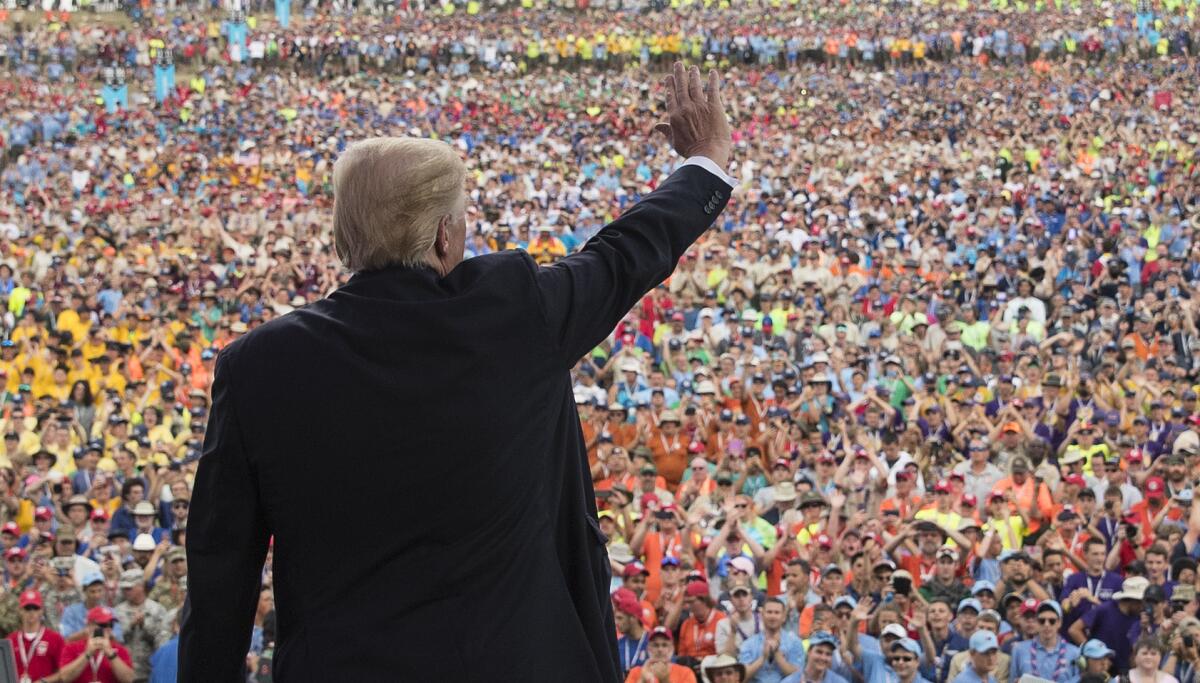
The Wall Street Journal didn’t release the full transcript of the interview its reporters and editors had last week with President Trump, but when Politico obtained a copy and published it, the interview quickly drew attention for several false statements Trump made.
The one that immediately gained notoriety was Trump’s claim that after his speech at the Boy Scout Jamboree last week, “I got a call from the head of the Boy Scouts saying it was the greatest speech that was ever made to them.”
On Wednesday, the Boy Scouts of America released a statement saying “we are unaware of any such call.” The Scouts specifically said that neither the organization’s president, AT&T chairman Randall Stephenson, nor its chief executive, Mike Surbaugh, had made such a call.
In fact, Surbaugh last week issued an unprecedented apology for a presidential speech — Scouts have heard from presidents back to Franklin D. Roosevelt — saying he was sorry that some members of the scouting community had been offended by Trump’s partisanship, language and tone.
In the daily White House press briefing, press secretary Sarah Huckabee Sanders said that other Boy Scout leaders, whom she did not name, had complimented Trump after his speech.
That wasn’t the only call to come into question recently. A few days after the Journal interview, Trump said that Mexico’s president, Enrique Peña Nieto, had paid him the “ultimate compliment” by calling and telling him that “their southern border, very few people are coming because they know they’re not going to get through our border.”
The Mexican government press office issued a statement Wednesday denying that.
Peña Nieto “has not had recent telephone communication with President Donald Trump,” the statement said.
Sanders said that Peña Nieto did compliment Trump, but in a personal conversation, not a telephone call.
“I wouldn’t say it was a lie,” she said of Trump’s statements.
Other false statements involved broader factual matters.
“We’re the highest-taxed nation in the world,” Trump said — a statement that he has repeatedly made and which has repeatedly been debunked. Whether measured by the top tax rate or the overall percentage of national income which is taxed, the U.S. has lower taxes than most of its chief economic competitors.
Trump may have been thinking about the U.S. corporate tax rate, which is higher than most developed countries, although not the highest. Yet few companies actually pay that top rate given various tax deductions, credits and exemptions.
Trump also said “I honestly believe for six months, I have done more than just about any other president when you look at all of the bills that were passed, 42, 43.”
That’s untrue. Many of Trump’s predecessors had signed more legislation, and nearly all recent ones had signed more significant measures by this point in their tenures.
Jimmy Carter had signed 70 bills into law by this point, Bill Clinton 50. Franklin D. Roosevelt had 76 in just his first 100 days.
About one-third of the bills Trump has signed have been ceremonial measures, such as renaming courthouses.
Referring to his top economic advisor, Gary Cohn, Trump said “Gary wrote a check for $200 million” when he entered the government. “He had to pay $200 million in tax.”
Trump has said that before, including in a speech in June. It’s false.
Cohn owned about $220 million in Goldman Sachs stock when he resigned as the bank’s president to become the head of Trump’s National Economic Council. He sold the stock to minimize conflicts of interest, as most appointees do. But he certainly didn’t have to pay $200 million in tax on that sale.
In fact, it’s likely Cohn hasn’t paid any tax so far. He may never have to.
Federal law allows appointees to government positions to defer any tax they owe on assets that they sell to avoid conflicts. The law requires that they put the proceeds of the sale into neutral investments such as Treasury securities. If his securities go up in value, Cohn might have to pay tax on that gain. The top tax rate on capital gains is 20%.
Trump also repeated a false claim about his defeated rival from the election, Hillary Clinton.
“Real crimes are what Hillary did with 33,000 emails, where she deleted them and bleached them after getting a subpoena.”
Trump made that claim more than once during the campaign, and more recently on Twitter.
He is correct that Clinton deleted 33,000 emails from the private server she used for her messages while she was secretary of State. She says that all of those deleted emails were personal and that she had no obligation to keep them. No one has come up with evidence to the contrary.
The evidence from the FBI’s investigation of the emails shows that in December 2014, after she turned over about 30,000 work-related emails to the State Department, Clinton’s aides told the company that managed the server to delete the rest of the emails. The emails were subpoenaed about three months later, on March 4.
The company didn’t actually do the deletion until later in March, but there’s been no evidence that Clinton knew about the delay at the time or that the company knew the messages were under subpoena.
In any case, the FBI declined to recommend prosecution, contrary to Trump’s assertion that Clinton committed “real crimes.”
A poll released Wednesday by Quinnipiac University asked Americans if they believe Trump is honest. By 62% to 34%, a majority said no.
12:30 p.m.: This article was updated with comments by White House press secretary Sarah Huckabee Sanders.
Justice Department to examine race-based admissions in universities

The Justice Department is launching an examination of “race-based discrimination” in college admissions, alarming some civil rights advocates who fear an effort by the Trump administration to roll back affirmative action policies.
In an internal job posting memo obtained by the New York Times, the department’s civil rights division said it was seeking lawyers willing to work on an investigation involving race-based policies in universities.
A Justice Department official said Wednesday that the job posting does not necessarily signal a policy shift toward attacking race-conscious policies in admissions programs.
“Whenever there’s a credible allegation of discrimination on the basis of race, the department will look into it,” said the official, who spoke on condition of anonymity to discuss a pending investigation.
The Supreme Court has upheld the use of race as one factor in evaluating who is admitted to college, most recently in a 4-3 decision last year that upheld an affirmative action policy at the University of Texas.
Some administration officials have histories of challenging such policies. And under Atty. Gen. Jeff Sessions, the department already has moved away from some of the civil rights policies of the Obama administration, ending the department’s opposition to a Texas voter identification law, for example.
The department also filed a brief last month in an employment discrimination case arguing that the Civil Rights Act does not protect people who are fired because of their sexual orientation.
Read President Trump’s statements outlining his concerns about the Russia sanctions bill
Shortly after signing a bill imposing new sanctions on Russia on Wednesday, President Trump released an accompanying signing statement outlining his concerns.
In his statement, he calls the bill “significantly flawed” and raises concerns that it will hinder his ability to negotiate with foreign countries.
In a separate press release, Trump lashed out at Congress in more colloquial terms than in the formal signing statement.
Read the formal signing statement below, followed by the press release.
***
Formal signing statement
Today, I have signed into law H.R. 3364, the “Countering America’s Adversaries Through Sanctions Act.” While I favor tough measures to punish and deter aggressive and destabilizing behavior by Iran, North Korea, and Russia, this legislation is significantly flawed.
In its haste to pass this legislation, the Congress included a number of clearly unconstitutional provisions. For instance, although I share the policy views of sections 253 and 257, those provisions purport to displace the President’s exclusive constitutional authority to recognize foreign governments, including their territorial bounds, in conflict with the Supreme Court’s recent decision in Zivotofsky v. Kerry.
Additionally, section 216 seeks to grant the Congress the ability to change the law outside the constitutionally required process. The bill prescribes a review period that precludes the President from taking certain actions. Certain provisions in section 216, however, conflict with the Supreme Court’s decision in INS v. Chadha, because they purport to allow the Congress to extend the review period through procedures that do not satisfy the requirements for changing the law under Article I, section 7 of the Constitution. I nevertheless expect to honor the bill’s extended waiting periods to ensure that the Congress will have a full opportunity to avail itself of the bill’s review procedures.
Further, certain provisions, such as sections 254 and 257, purport to direct my subordinates in the executive branch to undertake certain diplomatic initiatives, in contravention of the President’s exclusive constitutional authority to determine the time, scope, and objectives of international negotiations. And other provisions, such as sections 104, 107, 222, 224, 227, 228, and 234, would require me to deny certain individuals entry into the United States, without an exception for the President’s responsibility to receive ambassadors under Article II, section 3 of the Constitution. My Administration will give careful and respectful consideration to the preferences expressed by the Congress in these various provisions and will implement them in a manner consistent with the President’s constitutional authority to conduct foreign relations.
Finally, my Administration particularly expects the Congress to refrain from using this flawed bill to hinder our important work with European allies to resolve the conflict in Ukraine, and from using it to hinder our efforts to address any unintended consequences it may have for American businesses, our friends, or our allies.
***
Press release
Statement by President Trump on signing the Countering America’s Adversaries Through Sanctions Act:
Today, I signed into law the “Countering America’s Adversaries Through Sanctions Act,” which enacts new sanctions on Iran, North Korea, and Russia. I favor tough measures to punish and deter bad behavior by the rogue regimes in Tehran and Pyongyang. I also support making clear that America will not tolerate interference in our democratic process, and that we will side with our allies and friends against Russian subversion and destabilization.
That is why, since taking office, I have enacted tough new sanctions on Iran and North Korea, and shored up existing sanctions on Russia.
Since this bill was first introduced, I have expressed my concerns to Congress about the many ways it improperly encroaches on Executive power, disadvantages American companies, and hurts the interests of our European allies.
My Administration has attempted to work with Congress to make this bill better. We have made progress and improved the language to give the Treasury Department greater flexibility in granting routine licenses to American businesses, people, and companies. The improved language also reflects feedback from our European allies – who have been steadfast partners on Russia sanctions – regarding the energy sanctions provided for in the legislation. The new language also ensures our agencies can delay sanctions on the intelligence and defense sectors, because those sanctions could negatively affect American companies and those of our allies.
Still, the bill remains seriously flawed – particularly because it encroaches on the executive branch’s authority to negotiate. Congress could not even negotiate a healthcare bill after seven years of talking. By limiting the Executive’s flexibility, this bill makes it harder for the United States to strike good deals for the American people, and will drive China, Russia, and North Korea much closer together. The Framers of our Constitution put foreign affairs in the hands of the President. This bill will prove the wisdom of that choice.
Yet despite its problems, I am signing this bill for the sake of national unity. It represents the will of the American people to see Russia take steps to improve relations with the United States. We hope there will be cooperation between our two countries on major global issues so that these sanctions will no longer be necessary.
Further, the bill sends a clear message to Iran and North Korea that the American people will not tolerate their dangerous and destabilizing behavior. America will continue to work closely with our friends and allies to check those countries’ malignant activities.
I built a truly great company worth many billions of dollars. That is a big part of the reason I was elected. As President, I can make far better deals with foreign countries than Congress.
UPDATES
9:28 a.m.: This post has been updated with President Trump’s formal signing statement.
This post was originally published at 8:32 a.m.
Boy Scouts: Top leaders didn’t call Trump to praise speech, as the president said
The Boy Scouts denied Wednesday that the head of the youth organization called President Donald Trump to praise his recent politically aggressive speech to its national jamboree.
Trump told the Wall Street Journal in an interview published Wednesday, “I got a call from the head of the Boy Scouts saying it was the greatest speech that was ever made to them, and they were very thankful.” Politico published the transcript of the interview.
“We are unaware of any such call,” the Boy Scouts responded in a statement. It specified that neither of the organization’s two top leaders — President Randall Stephenson and Chief Scout Executive Mike Surbaugh — had placed such a call.
Analysis: How many false statements did Trump make in his interview with the Wall Street Journal? We count at least five >>
The White House had no immediate response to the Boy Scouts’ denial.
Surbaugh apologized last week to members of the scouting community who were offended by the political rhetoric in Trump’s July 24 speech in West Virginia.
Other U.S. presidents have delivered nonpolitical speeches at past jamborees. To the dismay of many parents and former scouts, Trump promoted his political agenda and derided his rivals, inducing some of the scouts in attendance to boo at the mention of former President Obama.
“I want to extend my sincere apologies to those in our Scouting family who were offended by the political rhetoric that was inserted into the jamboree,” Surbaugh said. “That was never our intent.”
Surbaugh noted that every sitting president since 1937 has been invited to visit the jamboree.
Stephenson told the Associated Press two days after the speech that Boy Scout leaders anticipated Trump would spark controversy with politically tinged remarks, yet felt obliged to invite him out of respect for his office.
Hoping to minimize friction, the Boy Scouts issued guidelines to adult staff members for how the audience should react to the speech. Any type of political chanting was specifically discouraged.
Stephenson, who did not attend Trump’s speech, said the guidance wasn’t followed impeccably.
Trump quietly signs Russia sanctions bill
President Trump quietly signed legislation Wednesday that imposes new limits on his ability to lift sanctions against Russia and also adds new sanctions against North Korea and Iran.
Trump signed the bill without cameras, sending out a statement later in the morning saying that despite his belief that parts of the measure were unconstitutional, he was signing it into law for the “sake of national unity.”
He had little choice about signing the bill after nearly unanimous votes in both houses of Congress approved it, all but guaranteeing any veto would be overridden.
The bill prevents American companies from investing in many energy projects that are funded by Russian government interests.
It also prevents Trump from unilaterally lifting the sanctions, giving Congress an extended period of time to review any presidential action that tries to upend or significantly change existing sanctions.
The law marks an unusual move by Congress to tie the president’s hands on foreign policy.
Trump did not want to surrender that authority, and in his statement accompanying the bill signing, he laid the groundwork for potentially challenging the law down the road.
Trump called some parts of the bill “clearly unconstitutional,” although he said he would “expect to honor” its key provisions.
“While I favor tough measures to punish and deter aggressive and destabilizing behavior by Iran, North Korea, and Russia, this legislation is significantly flawed,” he wrote.
Some parts of the bill “displace the President’s exclusive constitutional authority to recognize foreign governments” while others exceed Congress’ authority by imposing time limits on the executive branch, the signing statement said.
Trump wrote that he would nonetheless honor the law’s requirement that he submit to a congressional review before terminating any sanctions, while still reserving the right to enforce the law “in a manner consistent with the President’s constitutional authority to conduct foreign relations.”
>> READ TRUMP’S SIGNING STATEMENT
In a separate press release, in which he made the remark about national unity, Trump lashed out at Congress in more colloquial terms than in the formal signing statement.
He said the new law would make it harder for the U.S. to “strike good deals for the American people, and will drive China, Russia, and North Korea much closer together.”
He also drew a sharp distinction among the three countries sanctioned by the law.
On Russia, he said that “we hope there will be cooperation between our two countries on major global issues so that these sanctions will no longer be necessary.”
By contrast, referring to Iran and North Korea, he spoke of a “clear message” that “the American people will not tolerate their dangerous and destabilizing behavior.”
He also took a characteristic shot at Congress, noting lawmakers’ failure to repeal the Affordable Care Act “after seven years of talking” and contrasting his history of having “built a truly great company worth many billions of dollars” with Congress.
“As president, I can make far better deals with foreign countries than Congress,” he wrote.
The vote in Congress, 98-2 in the Senate and 419-3 in the House, were strong signs that lawmakers do not trust Trump to stand up to Russian President Vladimir Putin, whom Trump has repeatedly praised, amid the widening federal investigation into possible coordination last year between his presidential campaign and Moscow.
Passage of the sanctions bill already has sparked a harsh reaction in Moscow.
Putin announced last week that the United States would need to shed 755 personnel, including U.S. diplomats, from its embassy and consulates in Russia. President Obama expelled 35 Russian diplomats, said to be spies, from the United States last December.
9:01 a.m.: This article was updated with additional quotes.
8:47 a.m.: This article was updated with language from the president’s signing statement.
Trump pushes to sharply cut the number of legal immigrants and move U.S. to a ‘merit-based’ immigration system
President Trump is pushing forward with his promise of a harder line on legal immigration, endorsing a proposal to slash the number of immigrants admitted to the United States while favoring those with certain education levels and skills.
Trump announced his support for such an overhaul of immigration law during an event Wednesday at the White House with conservative Republican Sens. Tom Cotton of Arkansas and David Perdue of Georgia.
The changes proposed in their bill, called the RAISE Act, would be the “biggest change in 50 years” to the immigration system, Trump said, and reflect the administration’s “compassion for struggling American families that deserve an immigrant system that puts their needs first.”
The bill faces dim prospects in Congress, where nearly all Democrats and a sizable number of Republicans oppose its key provisions. But it reflects a central promise of Trump’s campaign and the renewed emphasis the White House has made in recent weeks to appeal to the president’s core supporters.
White House staff have been working closely with Cotton and Perdue for weeks on the legislation, which would restrict how the U.S. admits immigrants and move to what Trump has described as a “merit-based” system similar to that used in Australia and Canada.
The proposal “ends chain migration,” Trump said, referring to the preference for uniting family members in the current immigration system. It would implement a points-based system for awarding lawful permanent residency, or green cards.
Foreign applicants would receive a higher score if they “speak English,” can financially support themselves and have skills that “can contribute to our economy,” Trump said.
The proposal has been praised by groups that advocate reduced immigration, including NumbersUSA and the Federation of Immigration Reform.
Immigration advocacy groups are opposed, as are many economists who say the nation, with an aging population and low fertility rate, should be encouraging an influx of younger workers to spur economic growth.
The current U.S. immigration system favors uniting family members with relatives already in the country. It was built on the premise that any person, regardless of how much education or money they have, can come to the United States and create a productive life for themselves.
Any changes along the lines of the proposed bill would require support from moderate Republican senators such as Sens. John McCain of Arizona and Lindsey Graham of South Carolina, and many Senate Democrats oppose making partial changes to immigration law without creating a pathway to legal status for immigrants who arrived in the country illegally and put down roots.
Trump repeatedly has said he doesn’t want to reduce the total number of immigrants admitted each year, yet the proposal by Cotton and Perdue would cut legal immigration by more than half.
At the same time, Trump during his campaign called for returning the level of foreign-born Americans to their historic norm. The level is currently higher than at most periods in U.S. history. Immigration experts said at the time that Trump’s goal could only be achieved by sharply reducing legal immigration levels.
Trump has also been reluctant to end the Deferred Action for Childhood Arrivals program, started by President Obama, which provides work authorizations to immigrants brought to the U.S. illegally as children. Trump called the program “unconstitutional” during the presidential campaign, but also has expressed sympathy toward people who are in this country illegally through no fault of their own and were raised here.
At a rally in Ohio last week, Trump praised Cotton and Perdue and said he was working with the senators to replace “today’s low-scale system, just a terrible system where anybody comes in.”
“We want a merit-based system, one that protects our workers, our taxpayers, and one that protects our economy. We want it merit-based,” Trump said.
Tillerson: U.S. relations with Russia ‘under considerable stress’ after first six months of Trump administration
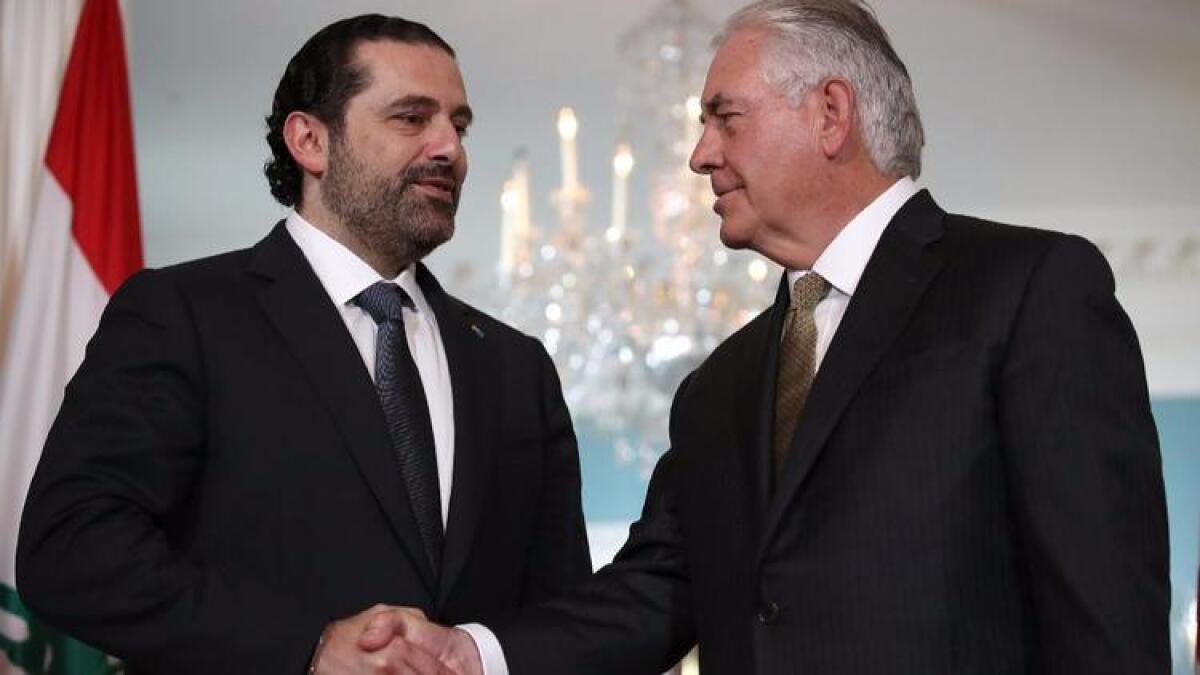
Secretary of State Rex Tillerson said Tuesday that U.S. relations with Russia are under “considerable stress” following Russia’s demand that Washington cut 755 U.S. diplomats and local staff from the U.S. Embassy and three consulates in Russia.
“Of course it make our life more difficult, more difficult,” Tillerson said in a news briefing to mark his first six months in office.
The question, he said, is whether relations are “getting worse or can we maintain some level of stability... and continue to find ways to address areas of mutual interest, and ways in which we can deal with our differences, without those becoming open conflicts.”
Tillerson said he expects President Trump to sign legislation that will impose new sanctions on Russia for its meddling in the 2016 election. The White House previously had said Trump would do so, but has not said when.
The secretary of state said he will meet with Russian Foreign Minister Sergei Lavrov this weekend in Manila at the margins of the Assn. of Southeast Asian Nations conference.
It will be their first face-to-face meeting since Congress overwhelmingly passed the sanctions bill last week and Putin retaliated by ordering deep cuts at the U.S. diplomatic missions in Russia.
Tillerson also revealed that Trump told Lavrov when the two met in the Oval Office in May that “we need some good news” from Moscow. They met a day after the president had fired FBI Director James B. Comey over what Trump said later was the Russia investigation.
The diplomat seemed to try to soften Trump’s threats on Twitter to use trade policies to punish China for what the White House considers its failure to persuade North Korean ruler Kim Jong Un give up nuclear weapons.
“We initiated a sustained and continued intensified campaign for what I like to call peaceful pressure, because the options available to us, I think, as all of you well understand, are limited,” Tillerson said.
He said the U.S. government would be open to dialogue with North Korea but only if it relinquishes its nuclear program. China has sought to initiate talks without those preconditions.
Tillerson also defended a broad reorganization of the State Department that he has undertaken. He rejected criticism that his failure to fill many positions has weakened the agency.
The State Department is “certainly not hollowed out,” he said.
He also was critical of the 2015 international deal that blocked Iran from developing nuclear weapons because, he said, it failed to make Iran’s government change its behavior beyond the “thin slice” of nuclear weapons.
Tehran received benefits “up front,” including return of funds frozen in U.S. banks and the easing of nuclear-related sanctions, depriving Washington of more leverage, he said.
Washington still maintains economic sanctions on Tehran for its ballistic missile program, its support for terrorism and its human rights abuses.
Although international monitors say Iran remains in compliance with the nuclear accord, Trump came close to abandoning it last month and may still do so.
Tillerson said his relationship with Trump is very good despite reports of friction between the two. He said Trump often calls him late at night, on weekends, whenever “something comes into his head.”
Senate overwhelmingly approves Christopher Wray as new FBI director
The Senate easily confirmed Christopher Wray to lead the FBI on Tuesday, approving President Trump’s nominee to succeed James B. Comey.
The vote, 92 to 5, was a reflection of the Senate’s confidence in Wray’s credentials as a Yale-educated former Justice Department official and as a top cop who vowed to maintain the bureau’s independence, resisting interference even from the president.
Trump abruptly fired Comey in May, and his shifting reasons only deepened questions of possible cooperation between the president’s campaign and Russian interference in the 2016 election. The president eventually admitted that he fired Comey because he was displeased with the FBI’s Russia probe.
Wray started his work in Washington during the George W. Bush administration after serving as a federal prosecutor in Georgia. He rose to become an assistant attorney general.
Later, in private practice he represented New Jersey Gov. Chris Christie amid the “Bridgegate” scandal that led to charges against several of the governor’s top aides.
Wray told senators during his confirmation hearing that as FBI director he would not bow to pressure from anyone, even the president. He supports the investigation now underway by special counsel Robert S. Mueller III into Russia’s election interference, he said.
“I would consider an effort to tamper with Director Mueller’s investigation to be unacceptable and inappropriate,” he testified in July.
Five Democrats voted against confirmation: Sen. Kirsten Gillibrand (D-N.Y.), Sen. Ed Markey (D-Mass.), Sen. Jeff Merkley (D-Ore.), Sen. Elizabeth Warren (D-Mass.) and Sen. Ron Wyden (D-Ore.).
Three senators were absent.
White House says Trump ‘weighed in as any father would’ on misleading statement about Donald Jr.’s Russia meeting
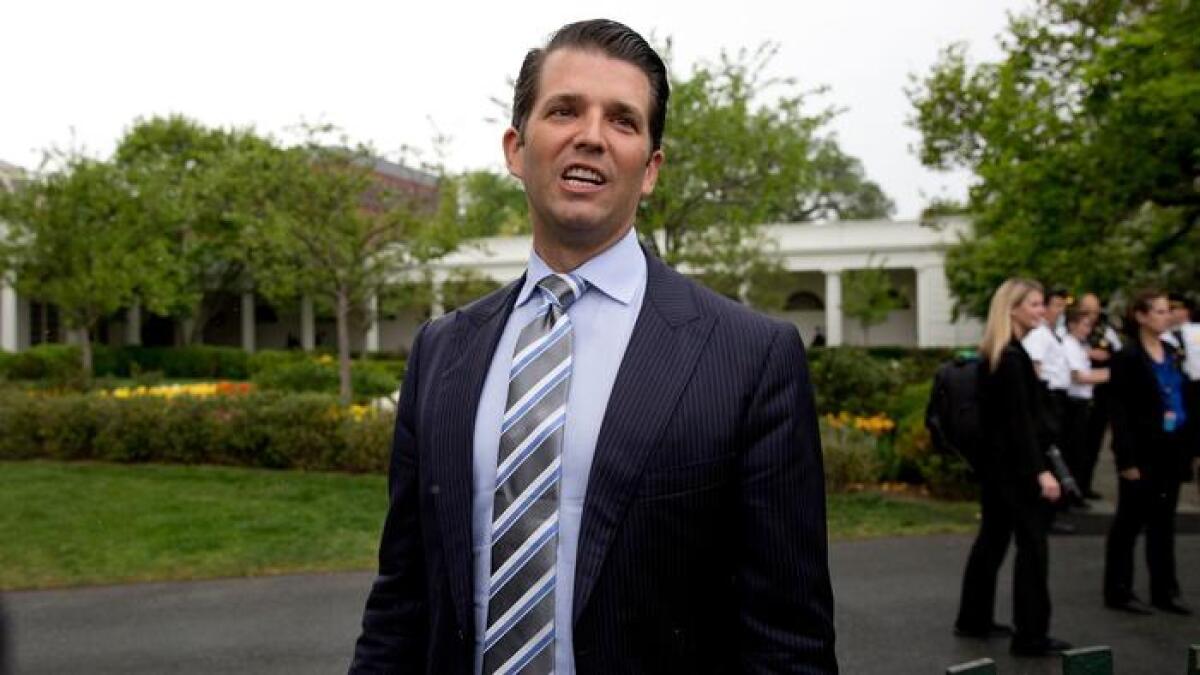
President Trump’s spokeswoman acknowledged on Tuesday that he “weighed in as any father would” in drafting a misleading statement for his son last month about Donald Trump Jr.’s meeting with Russians during the presidential campaign.
By the acknowledgement, White House Press Secretary Sarah Huckabee Sanders seemed to confirm the gist of a Washington Post story, published late Monday, that Trump dictated the statement for his son while aboard Air Force One, overruling advisors who wanted a fuller, more candid explanation of the June 2016 meeting in Trump Tower.
At the same time, Sanders’ comments in effect refuted Trump’s lawyer and frequent spokesman, Jay Sekulow, who said two weeks ago on NBC’s “Meet the Press” that “the president was not involved in the drafting of the statement.” Sekulow also said much the same on ABC’s “This Week.”
Four days after Trump Jr. issued his initial, inaccurate statement on July 8 about the 2016 meeting, his father suggested to reporters that he was largely in the dark about it, and assumed Donald Jr. and his lawyers wrote the statement.
“I only heard about it two or three days ago,” he said. Trump added praise for his son’s “transparency.”
The initial statement for Trump Jr. reportedly written on the president’s plane said that the younger Trump and a Russian lawyer “primarily discussed a program about the adoption of Russian children” and their meeting was unrelated to the campaign.
Sanders insisted Tuesday that “the statement that Don Jr. issued is true. There’s no inaccuracy in the statement.”
Yet the son’s own emails showed otherwise last month. The emails, which he released just as the New York Times planned to publish them, revealed that he came to the meeting with Natalia Veselnitskaya not to talk about adoptions, as his statement claimed, but on an acquaintance’s assurance that she was a Russian government lawyer who had “official documents and information” that would “incriminate” Hillary Clinton, “and be very useful to your father.”
The emails further said the information was “part of Russia and its government’s support for Mr. Trump.”
“If it’s what you say I love it,” Trump Jr. responded to his email correspondent, Rob Goldstone, a music promoter with business dealings in Russia.
Also copied on some of the emails to and from the younger Trump were Jared Kushner, Donald Trump’s son-in-law and advisor, and Paul Manafort, Trump’s campaign chairman at the time. Both men accompanied Trump Jr. to the meeting, which included other Russians.
Trump Jr. and the White House have maintained that nothing came of the meeting. In that spirit, Sanders said on Tuesday that “this is all discussion frankly of no consequence.”
“There was no follow-up,” she added. “It was disclosed to the proper parties.”
McConnell brushes off Trump’s call to get rid of Senate filibuster rule
President Trump railed after the failed healthcare vote that it was time to do away with the Senate filibuster so Republicans could rely on just a simple majority, 51 votes, to pass major legislation.
The problem with the president’s thinking, of course, was that Senate Republicans were already operating on special rules that would have enabled them to approve their Obamacare repeal and replacement with just a simple majority.
Republicans failed when three Republican senators opposed the plan, depriving the majority of the votes needed for passage.
Senate Majority Leader Mitch McConnell made clear Tuesday that he does not side with the president’s approach to Senate procedures.
“It’s pretty obvious on healthcare our problem was not the Democrats,” McConnell said Tuesday. “The votes were simply not there.”
Trump may want to change the rules, but it’s not something McConnell seems inclined to do. Nor does the leader seem to believe it would help.
Trump still hasn’t signed the Russia sanctions bill. Why not?
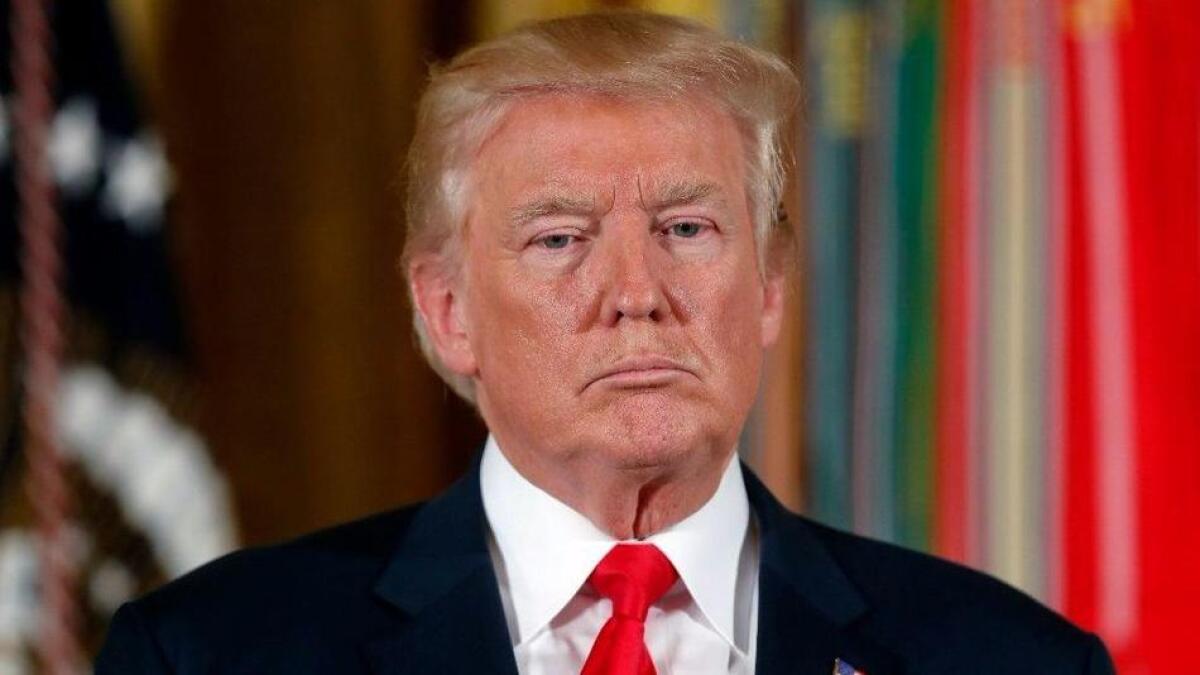
President Trump has been backed into a corner on Russia policy, facing only bad options, pressed by President Vladimir Putin to one side and, from the other, by assertive U.S. lawmakers who don’t trust Trump to stand up to the autocrat.
A near-unanimous Congress last week sent to the White House a sanctions bill that clamps down on Russia, along with Iran and North Korea, and ties Trump’s hands from offering Putin relief from existing sanctions. Putin has retaliated by demanding the United States slash its diplomatic presence by about two-thirds, or 755 people.
Trump is caught in the middle. At home, he’s under pressure to sign the sanctions bill into law and aides say he will, if only because Congress could easily override a veto. Signing the bill, however, could sink his effort to improve relations with Russia and bond with Putin.
Sen. Jeff Flake takes on Republican ‘denial’ over President Trump and the chaos in the White House
Sen. Jeff Flake is among the most endangered Republicans running for reelection next year. But he’s not exactly acting like it.
The Arizona senator unleashed a searing criticism Tuesday of President Trump and, more significantly, the GOP’s unwillingness to confront the chaos at the White House.
Republicans, he writes in his new book, are in “denial.”
“Too often, we observe the unfolding drama along with the rest of the country, passively, all but saying, “Someone should do something!” without seeming to realize that that someone is us,” Flake writes in “Conscience of a Conservative.”
“And so, that unnerving silence in the face of an erratic executive branch is an abdication, and those in positions of leadership bear particular responsibility.”
That’s not the kind of slogan expected from a senator who is second only to Nevada’s Sen. Dean Heller as the most at-risk Republican in the 2018 midterm election.
The first-term senator is channeling his state’s rich tradition of Western outsiders, a mash-up of Barry Goldwater’s conservative legacy and, more recently, the maverick return of Sen. John McCain to cast the no vote last week that doomed the GOP’s failed Obamacare overhaul.
Flake has always been a bit of an outlier in his party.
A strict fiscal conservative, he was tea-party-minded long before the rise of the tea party, railing against government spending and waste as a leading budget cutter in the House.
But he also comes from a Mormon tradition of missionary service, having worked for years in Africa. He has adopted a more welcoming attitude to immigrants than many in his party.
During the height of Trump’s fiery campaign trail rhetoric, Flake delivered a speech during Friday night prayers at an Arizona mosque. He has traveled to Cuba during the Obama administration, favoring more open relations.
Flake was among just a few Republicans in Congress who didn’t vote for Trump, and has been more willing to speak out against White House policies.
In the book, excerpted first in Politico, he lambasts his colleagues who were quick to attack President Obama -- hoping to make him a one-term president -- but today have “maintained an unnerving silence as instability has ensued.”
“To carry on in the spring of 2017 as if what was happening was anything approaching normalcy required a determined suspension of critical faculties. And tremendous powers of denial.”
Those sentences are a not-so-subtle swipe at party leaders, including Senate Majority Leader Mitch McConnell (R-Ky.), who orchestrated that strategy, which Flake indirectly argues left Republicans bereft of their own policy ideas.
Flake acknowledges he shares blame, taking some responsibility for his own willingness to duck the hard questions over Trump.
“I’ve been sympathetic to this impulse to denial, as one doesn’t ever want to believe that the government of the United States has been made dysfunctional at the highest levels, especially by the actions of one’s own party,” he writes.
“But it was also a monumental dodge. It would be like Noah saying, ‘If I spent all my time obsessing about the coming flood, there would be little time for anything else.’ At a certain point, if one is being honest, the flood becomes the thing that is most worthy of attention. At a certain point, it might be time to build an ark.”
What remains unclear, though, as few other Republicans are willing to openly criticize the White House, is how many fellow Republicans might follow his lead.
Republicans in recent weeks have shown an increasing willingness to chart their own course or confront the White House, including passing a Russia sanctions bill and defeating the Obamacare repeal effort. Flake’s Arizona colleague, Sen. John McCain, provided one of the three Republican votes that ended the GOP healthcare plan.
Many have also warned Trump against firing Atty. Gen. Jeff Sessions.
But other than Flake, few GOP lawmakers have spoken so critically about Trump and the situation in the White House.
How White House Chief of Staff John Kelly took charge and booted ‘the Mooch’
Anthony Scaramucci, the brash New Yorker who was announced just 10 days ago as President Trump’s incoming communications director, was ousted on Monday as new White House Chief of Staff John F. Kelly moved quickly to exert control over a chaotic administration.
Kelly pulled Scaramucci aside shortly after 9:30 a.m. EDT and told him he was out of the job that he hadn’t yet officially assumed, according to a person close to the White House. That was just after Kelly, the former Homeland Security secretary, was sworn in as chief of staff to replace the displaced Reince Priebus — and a few hours after Trump had tweeted “No WH chaos!”
After healthcare failures, senior GOP senators serve notice: ‘It’s time to move on’
Trump administration officials continue to push the Senate to take another run at healthcare legislation, but senior Republican senators have pushed back, making clear that they’re done with the topic for now.
“There’s just too much animosity and we’re too divided on healthcare,” Sen. Orrin G. Hatch (R-Utah), the head of the Senate Finance Committee, said in an interview Monday with Reuters.
“I think we ought to acknowledge that we can come back to healthcare afterward, but we need to move ahead on tax reform,” Hatch said.
His remarks were quickly followed by others in GOP leadership positions.
“I think it’s time to move on to something else,” Sen. Roy Blunt of Missouri told CNN. “If the question is do I think we should stay on healthcare until we get it done, I think it’s time to move on to something else.”
Sen. John Thune of South Dakota also chimed in. “Until someone shows us how to get that elusive 50th vote, I think it’s over,” he told reporters.
The remarks seemed a coordinated effort to respond to administration officials, including budget director Mick Mulvaney and Health and Human Services Secretary Tom Price, who said over the weekend that they wanted the Senate to keep working on healthcare.
Tuesday morning, Majority Leader Mitch McConnell of Kentucky completed the list of top Republicans shutting the door for now on the healthcare issue.
In a statement and a series of messages on Twitter, McConnell set out the schedule for the Senate for the rest of August: confirming nominees, veterans legislation and reauthorization of user fees that pay for a large chunk of the Food and Drug Administration.
Healthcare was notably missing from the list.
Last week, the Senate defeated several different Republican plans to repeal all or part of the Affordable Care Act. The votes made it clear to many that with unified Democratic opposition to repeal, and divisions among Republicans, the campaign to overturn the law has stalled out, at least for now.
Congress faces several other pressing issues that will be demanding attention, including deadlines at the end of September to raise the federal debt ceiling and fund government agencies for the coming fiscal year. And the administration is eager to move on tax proposals, with officials rather optimistically saying they hope to see votes by November on a tax package that is not yet written.
9:15 a.m.: This post was updated with McConnell’s statement.
